

Lake Kawaguchiko
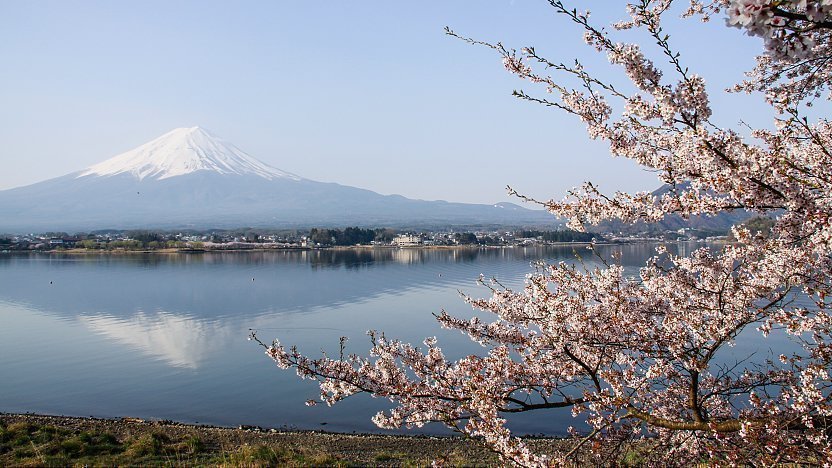
Lake Kawaguchiko (�͌���) is the most easily accessible of the Fuji Five Lakes with train and direct bus connections to Tokyo . A hot spring resort town with various tourist attractions and views of Mount Fuji is located around the lake's eastern end, while the northern and western shores are mostly undeveloped.
The best views of Mount Fuji can be enjoyed from the lake's northern shores and are particularly breathtaking during the cherry blossom season around mid April and the autumn colors around the first half of November. One of the nicest spots for cherry blossoms is the seaside promenade near the Kawaguchiko Music Forest , while photographers will enjoy the "Momiji Tunnel" for autumn colors, a maple tree-covered road section further west.
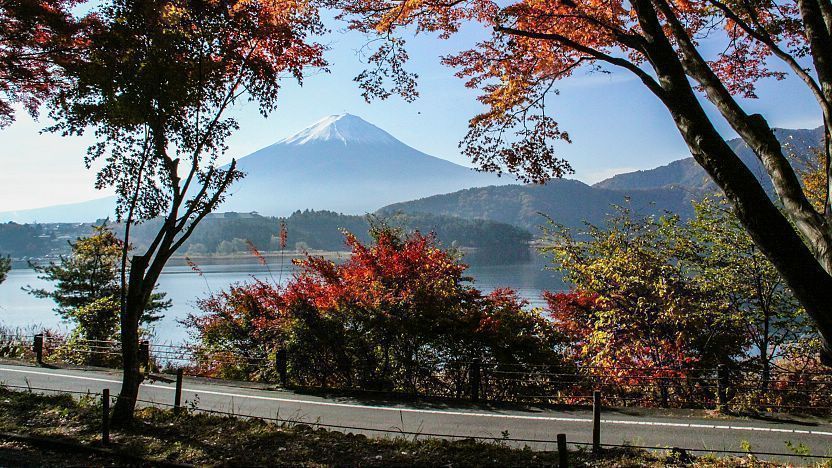
Be warned that even though Kawaguchiko is located right at the base of Mount Fuji , the mountain is not always visible because of clouds. Visibility tends to be best in the early mornings (usually before 9am) and in the late afternoons, while clouds often obstruct the view during daytime even on days with fair weather, and especially during the hazy summer.
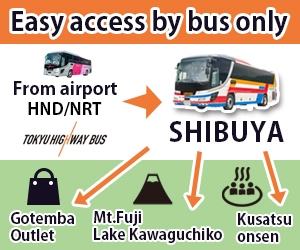
Among the wide range of tourist attractions available around Lake Kawaguchiko are hot spring baths , museums , the Fuji Q amusement park , boat tours and a ropeway leading up a small mountain. Kawaguchiko is also a good base for climbing Mount Fuji , although most people start their ascent from Fuji Subaru Line 5th Station halfway up the mountain these days.
Below is a list of some of the tourist attractions around Lake Kawaguchiko:
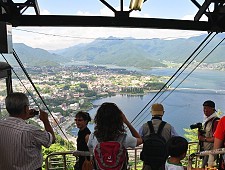
Hot spring baths
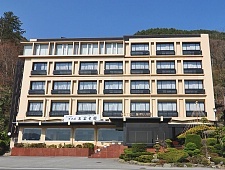
Getting there and around
Kawaguchiko Station is the terminal station of the Fujikyu Railway from Otsuki. The bus terminal for local buses and highway buses to/from Tokyo , Kofu , Gotemba and other destinations is located just in front of the station.
From Kawaguchiko Station, the Omni Bus lines provide tourists with local transportation around Lake Kawaguchiko and neighboring Lake Saiko : the Red Line (or Kawaguchiko Line) operates along Lake Kawaguchi's eastern and northern shores, while the Green Line (or Saiko Line) operates along Lake Kawaguchiko's southern shore before continuing to Lake Saiko .
How to get to and around the Fuji Five Lakes
Questions? Ask in our forum .
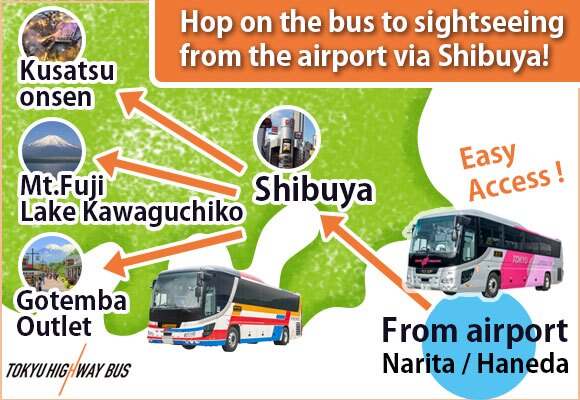
Links and Resources
Yamanashi gem museum, kaiun no yu, mount fuji panoramic ropeway, kawaguchiko museum of art, kawaguchiko herb hall, hotel mifujien, hotels around fuji five lakes.
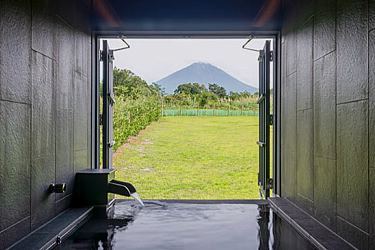
Experiences around Fuji Five Lakes
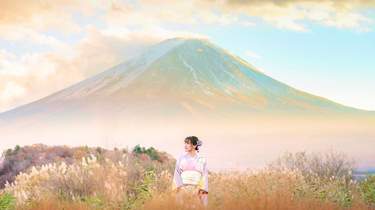
Kawaguchiko Itinerary: Complete 2-Day Itinerary and Must-See Places
快速導覽
Arrange a Kawaguchiko 2-day 1-night itinerary to visit Mount Fuji
I believe that for many people who come to Tokyo to travel, as long as time permits, they will definitely arrange a trip to visit Lake Kawaguchi and Mount Fuji. It may be a trip back and forth to Kawaguchiko Station on the same day, or arrange a two-day one-night itinerary, spend one night staying at the accommodation in Kawaguchiko, so that you have the opportunity to enjoy the sunrise of Mount Fuji and the reflection of Mount Fuji in Kawaguchiko.
However, because there are so many places to visit in the entire Kawaguchiko and Mt. If you plan to arrange a one-day trip to Lake Kawaguchi, or if you want to visit Lake Kawaguchi in depth, and plan to arrange a three-day and two-night itinerary, in Lake Kawaguchi Tourist Information Classification More articles can be found there.
How to arrange the itinerary for Lake Kawaguchi for two days and one night?
If you are starting from Tokyo, Kawaguchiko's itinerary for two days and one night can be very simple. Basically, you only need to buy a round trip to Kawaguchiko Station in Tokyo Fuji tour Tickets, as well as Kawaguchiko tour bus tickets, can solve the transportation budget for the entire Kawaguchiko itinerary.
However, if you plan to combine Lake Kawaguchi, Mt. Fuji, and Hakone into a three-day, two-night itinerary, you may need to purchase the Fuji-Hakone 3-Day Transportation Package , so that you can save more transportation costs in Kawaguchiko and Hakone areas.
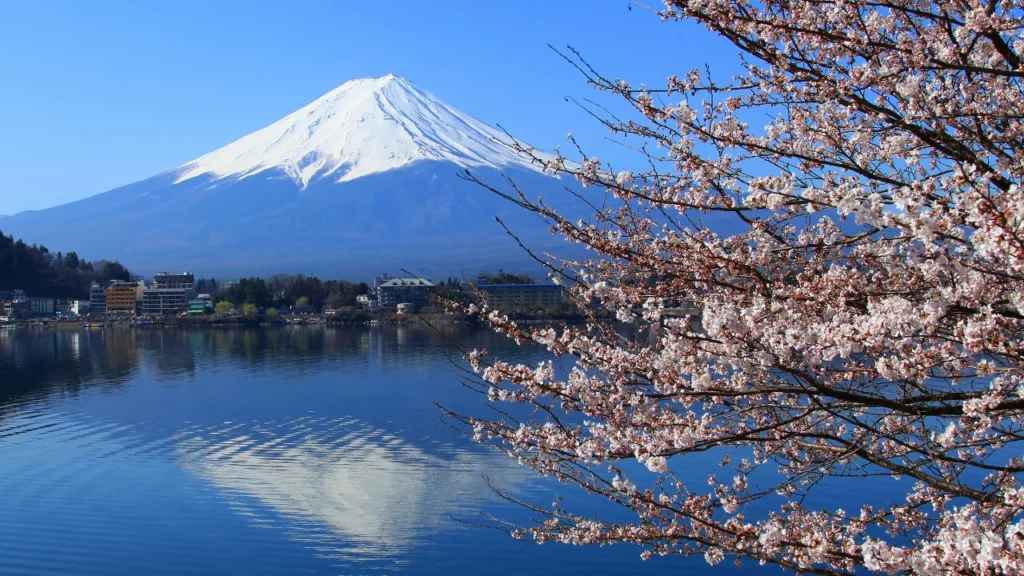
Enjoy the entire Mt. Fuji & Hakone with one set ticket! [Best Offer] Mt. Fuji – Hakone Area 3-Day Tour Pass The best choice to save transportation expenses!
Kawaguchiko two-day one-night itinerary planning from Tokyo
How to store suitcases before departure.
I believe that for many people, one of the most difficult things to deal with in the Kawaguchiko two-day, one-night itinerary is the need to find a place to store suitcases at Kawaguchiko Station and buy time to visit different scenic spots in the Kawaguchiko area.
However, in fact, this problem can also be easily solved. The method is as long as you stay in the same hotel before departure to Kawaguchiko and after returning to Tokyo. In fact, most hotels in Tokyo will provide free luggage storage services. such as Tokyu Stay Shinjuku , APA Hotels in Shinjuku Etc. In this way, it is very easy to start sightseeing in Lake Kawaguchi and Mt. Fuji area, saving extra time and money for handling suitcases.
Itinerary for the first morning
Access to lake kawaguchi.
After you finish checking out of your Tokyo hotel in the morning, you can go to Shinjuku Station and take the limited express train "Fuji Tour", which takes about 2 hours to reach Kawaguchiko Station.
The advantage of choosing to take the Fuji Excursion Limited Express is that you don’t have to worry about traffic jams during the holidays like taking the express bus, which seriously affects the itinerary planning for the whole day in Kawaguchiko. And when you take the limited express train of Fuji Tour, you will have many opportunities to take pictures with Mount Fuji.
Basically, in addition to being a means of transportation connecting Shinjuku Station in Tokyo - Kawaguchiko Station, the limited express train of Fuji Tour is actually one of the attractions of the entire Kawaguchiko itinerary.
However, there are some points that need to be paid attention to when taking the limited express train of Fuji Tour. For example, there are not too many trains departing from Shinjuku Station in Tokyo to Kawaguchiko Station in the morning. On average, there are only 3 sets of trains departing every day. The departure time is about 07:30-09:30, and the journey time also takes 2 hours. If you depart from Shinjuku, Tokyo too late, you may not have enough time to go sightseeing in Lake Kawaguchi.
In addition, the Fuji Excursion Express train is a very popular means of transportation, so if you plan to take the Fuji Excursion Express train to Kawaguchiko Station, you must buy a ticket one day in advance. if you purchased JR Tokyo Wide Area Pass If so, it is also highly recommended to redeem the ticket one day in advance, and buy a ticket for a designated seat if necessary, so as to ensure a smooth departure to Kawaguchiko Station for a two-day, one-night trip.
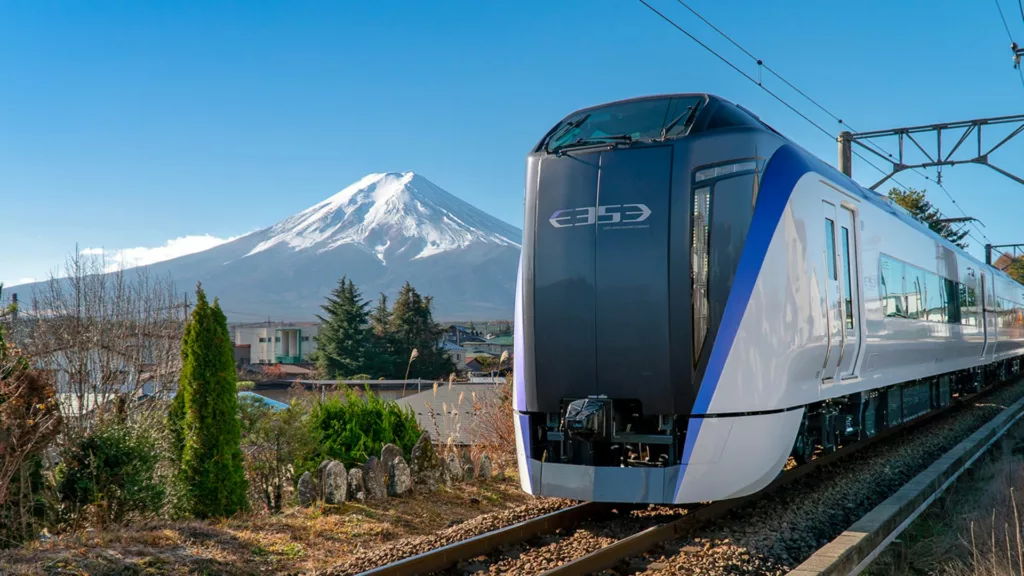
Since it takes 2 hours from Tokyo Shinjuku Station to Kawaguchiko Station, if you depart from Tokyo Shinjuku Station at 07:30, you can arrive at Kawaguchiko Station at about 09:30. If you depart from Tokyo Shinjuku Station at 09:30 , you need to arrive at Kawaguchiko Station at 11:30.
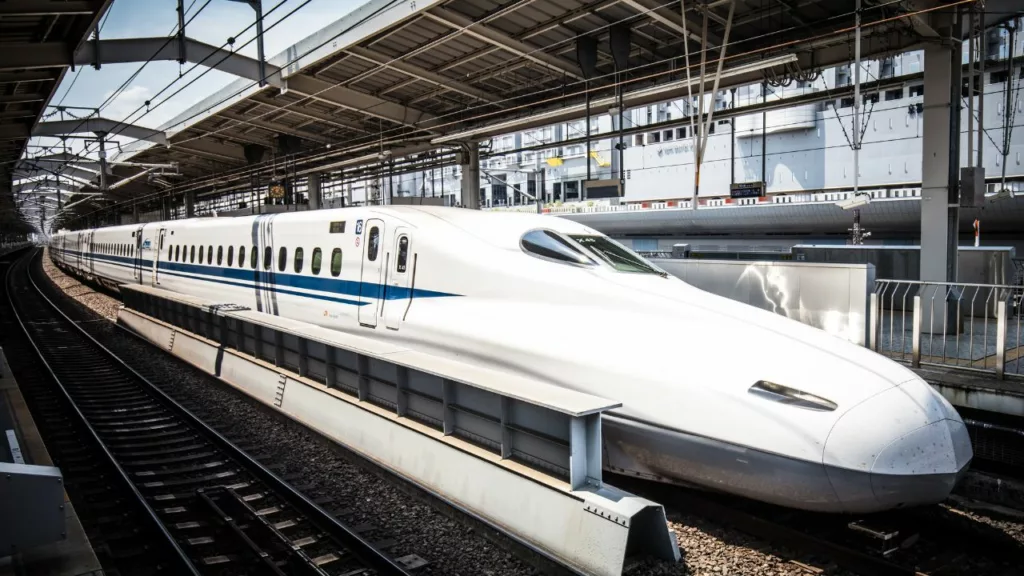
The cheapest way to go sightseeing by Shinkansen? [Best Offer] JR Pass Tokyo Wide Area Pass Unlimited rides on the Shinkansen for 3 days!
Lunch Options in Kawaguchiko
When you arrive at Kawaguchiko Station, you can go to the Fudo Tea House in front of Kawaguchiko Station to have lunch, buy a one-day pass for the Kawaguchiko Tour Bus, and then officially start the two-day, one-night trip to Kawaguchiko.
Itinerary for the afternoon of the first day
When you come to Lake Kawaguchi for a two-day, one-night itinerary, of course you can’t miss the view of Mount Fuji next to Lake Kawaguchi Hot spring hotel , so after lunch, until a few hours before you can check in to the room at the hot spring hotel, you can go to Oishi Park, and Tenjō-Yama Park These two are the most suitable places to take pictures with Mount Fuji.
In addition to setting off to Tianshangshan Park, you can also consider taking Kawaguchiko Excursion Boat Tenharu , starting from Kawaguchiko, passing the Kawaguchiko Bridge, and taking pictures with the reflection of Mount Fuji on the water.
Itinerary for the first night
It is also because one of the key points of the trip to Kawaguchiko is to experience the hot spring hotel next to Kawaguchiko. So at around 16:00 in the afternoon, I left the scenic spot of Kawaguchiko and went to the reserved hot spring hotel room. Get the chance to enjoy hot springs and view Mt. Fuji from your room.
For example, near Lake Kawaguchi Hotel Kaze no Terrace KUKUNA , is a very popular hotel choice that can also enjoy Mount Fuji from the room. Although many people say that the price of this hotel is not cheap, but for some itineraries to celebrate important festivals, being able to face the scenery of Mount Fuji all day is actually the best festival gift .
Itinerary for the next morning
If you plan to enjoy the reflection of Mount Fuji on Lake Kawaguchi, you must grasp the sunrise time of the day. Because only at the moment of sunrise, the reflection of Mount Fuji on Lake Kawaguchi will be the most complete. Generally speaking, the sunrise time of Lake Kawaguchi starts from 04:30 to 06:30, depending on whether you go to Lake Kawaguchi in summer or in winter.
Of course, it will be difficult for many people to get up at 04:30 in the morning, but you can also arrange breakfast at 07:30 in the morning to gain a little more sleep before enjoying breakfast after enjoying the reflection of Mount Fuji.
Around 08:30 in the morning, I believe you have finished the breakfast provided by the hot spring hotel. At this time, you can fight for the last chance to enjoy the hot spring and appreciate Mount Fuji. Then around 10:00 in the morning, it was time to check out.
In the entire Lake Kawaguchi itinerary, being able to slowly appreciate the scenery of Mount Fuji from different angles and at different times is the focus of this two-day, one-night itinerary. So after completing the check-out procedures, you can take pictures with Mount Fuji again before setting off to other Kawaguchiko attractions.
After leaving the hot spring hotel in Kawaguchiko around 11:00 in the morning, you can consider going to Kawaguchiko Music Forest Museum , a scenic spot with a collection of music box exhibitions and Western-style gardens, is also a very suitable place to take pictures and then share them on social media.
However, if you want to go to Mount Fuji for sightseeing, you can return to Kawaguchiko Station first, and then take the bus to the fifth station of Mount Fuji. In this way, you can experience the high-altitude environment at 2400 meters, as well as enjoy the scenery of the entire Kawaguchiko area.
Another option is to visit Fuyue Wind Cave, which is far away from Kawaguchiko Station, but you need to pay attention to the bus schedule connecting Kawaguchiko Station and the opening hours of Fuyue Wind Cave, and try not to leave too late.
Itinerary for the afternoon of the second day
If you choose to go to the Kawaguchiko Music Box Forest Art Museum, you can visit the entire Kawaguchiko Music Box Forest Art Museum in about 2 hours, and then return to Kawaguchiko Station. If you will consider going to Oike Park, Kawaguchiko Herb Museum Over there, you can take pictures with Mt. Fuji again, buy some special products near Kawaguchiko Station, and then take the limited express train Fuji Return to Tokyo.
However, if you choose to visit scenic spots such as Mount Fuji Wumuhe and Fuyue Fengxue, you must pay attention to the timetable of the return bus and calculate when you will return to Tokyo.
Don’t forget that the Fuji Excursion Express train also has a designated departure time, and it takes 2 hours to return to Tokyo by taking the Fuji Excursion Express train from Kawaguchiko. If you return to Kawaguchiko Station too late, you may miss the Fuji Excursion Express train, and You need to take a bus to return to Tokyo, which will also affect your itinerary in Tokyo at night.
Simultaneous departure to Lake Kawaguchi in Hakone two-day one-night itinerary planning
Under normal circumstances, Kawaguchiko's two-day and one-night itinerary will start at Tokyo Shinjuku Station and end at Tokyo Shinjuku Station. However, if you purchase Fuji-Hakone 3-Day Transportation Package If so, this three-day, two-night itinerary can be divided into a two-day, one-night Kawaguchiko itinerary, and a two-day, one-night Hakone itinerary, and experience different hot spring hotels within a few days, as well as from long-distance and close-distance. Enjoy the view of Mount Fuji from different angles.
while using Fuji-Hakone 3-Day Transportation Package The feature is that this package allows you to take unlimited rides on the designated transportation in Kawaguchiko and Hakone, and you can freely choose whether to go to Hakone first or go to Kawaguchiko for sightseeing first, without any restrictions.
To put it simply, you can arrange departure from Shinjuku Station, sightseeing in the Hakone area on the first day, and staying in a hotel in the Hakone area Spa Hotel . Then leave Hakone in the morning and noon of the next day, set off to Kawaguchiko Station and start the trip of Kawaguchiko for two days and one night.
while for the first use Fuji-Hakone 3-Day Transportation Package If you are traveling to Mount Fuji, Lake Kawaguchi, or the Hakone area, you need to pay attention to the fact that it will take a lot of time to travel between Hakone and Lake Kawaguchi. Therefore, when planning the itinerary for the next day, try to avoid arranging to visit too many scenic spots, so that it is easier to manage the schedule of the entire itinerary.
If you are visiting Lake Kawaguchi for the first time, maybe you can consider arranging a trip to visit Lake Kawaguchi and Hakone at the same time. Because compared to simply going to one of Kawaguchiko and Hakone, the itinerary to go to Kawaguchiko and Hakone at the same time can get a better experience in all aspects, and it can also make you remember it many years later. A trip to Mount Fuji and hot springs.
In addition, we are Fuji Hakone Tourist Information Category Here, I have prepared a lot of scenic spot itineraries, accommodation discounts, and ticket discounts for you in Mount Fuji, Lake Kawaguchi, and Hakone. If you are planning to travel to these areas, maybe these articles can help you find some unique experiences. !
More Mt. Fuji and Hakone travel information
Mount Fuji area
Mount Fuji hot spring hotel recommendation: Hotel Room with Hot Spring, Private Bath and Exclusive View on Mount Fuji! Bus Route Guide to Mount Fuji Kawaguchiko Station! JR train from Shinjuku to Kawaguchiko Station? The first choice for railway fans Fuji-Hakone Pass purchase discounts, itinerary planning sharing How to plan the itinerary of Lake Kawaguchi? Attractions, Transportation, Food and Overview The Flower Sea in front of Mt. Fuji Lake Kawaguchi》Annual Lavender Festival ⋯⋯ and MORE
Hakone area
Recommended Hakone Onsen Hotels》A list of high-end hot spring hotels with private baths! How to plan your trip to Hakone? Hakone Attraction Transportation Itinerary Sharing! Fuji-Hakone Pass purchase discounts, itinerary planning sharing Hakone Yumoto Attractions, hot spring hotel selection near the station ⋯⋯ and MORE
More Japan Travel Information: Tokyo | Kyoto | Hokkaido | Climbing Mt.Fuji | Hakone | Lake Kawaguchi Tips for Traveling in Japan | Japan Hotel Deals | Klook Latest Promo Code
Ryu_C@RakuRakuJP
RakuRaku, which is 楽々 in Japanese. This site is committed to providing the most authentic travel information in Japan, bringing you a different Japan travel experience!
Hakone Yumoto Station: Onsen, Shopping Street and Things to Do
Hakone kamakura pass: latest discount and reservation guide, more different travel information, tokyo to kawaguchiko station: complete guide for fuji bus, trains and buying tickets, 10 best ryokan in kawaguchiko with private onsen, kawaguchiko fugaku wind cave & narusawa ice cave" a unique experience of seeing icicles in hot summer, mount kachikachi ropeway in kawaguchiko: best cable car to enjoy mt. fuji, oshino hakkai: reviews, opening hours, transport from kawaguchiko to oshino hakkai, lake kawaguchiko sightseeing boat "appare", kawaguchiko music forest museum: opening hours, review, houtou fudou japanese noodles near kawaguchiko station, kawaguchiko herb festival: enjoy lavender & view of mt. fuji in summer, kawaguchiko herb hall & oike park.
RakuRakuJP , is a website dedicated to sharing articles about in-depth travel experiences in Japan.
I believe that before you travel to Japan every time, you will hope to get the most comprehensive travel information, and then be able to successfully complete the entire travel itinerary.
And our goal is to gather all practical itinerary information, discounted accommodation, and tickets, so that you can plan the entire Japan travel itinerary in the most convenient way.
useful link
- About RakuRakuJP
- RakuRakuJP All Articles
- Privacy Policy
- Website Terms of Use
- Agoda booking offers
- Klook Booking Offer
Editor's Picks
Latest useful travel articles.
©2017- 2024 RakuRakuJP. All Right Reserved.
- Contact us to advertise

Kawaguchiko: Full Guide, Sample Itineraries & Things to Do
Our family frequents the surrounding areas of Mt. Fuji, especially Kawaguchiko — our favorite day trip with our daughter. I just can’t get over how lucky the locals in this area are… snow-capped Fuji-san, beautiful breathtaking views, great food ( houtou noodles is our absolute favorite!), and the people are always nice.
In fact, they’re so nice, I’ve actually lost count of how often the locals have given our daughter gifts just because they find her adorable. All of these things combine to make an ideal location, and one we hope to call home someday in the future. Because of how often we visit the areas around Mt. Fuji, we keep this as sort of a living article, which we update as we find something new and interesting in the area.
Understanding Mt. Fuji and Fuji Five Lakes
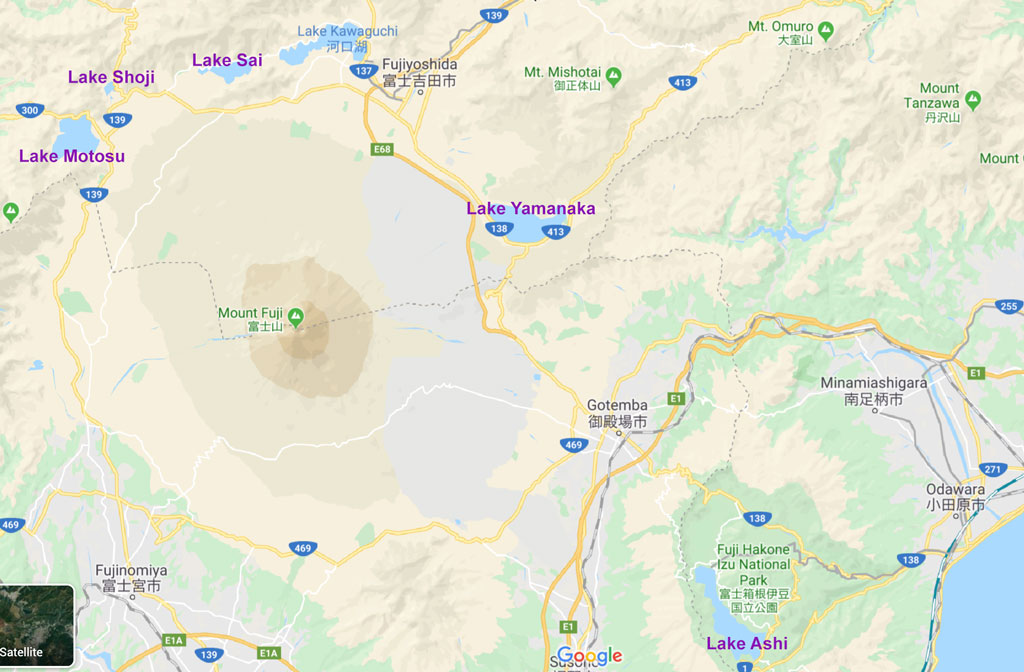
The main sightseeing attractions and in this itinerary guide are in the town of Fujikawaguchiko –the nearest town to Mt. Fuji that is easy to access on a day trip. The TOP tourist attraction here is Kawaguchiko or Lake Kawaguchi, the second-largest lake of the Fuji Five Lakes (or Fujigoko as the Japanese call it).
Fuji Five Lakes (Fujigoko)
The lakes of the Fuji Five Lakes are as follows:
- Lake Kawaguchi (Kawaguchiko)
- Lake Sai (Saiko)
- Lake Shoji (Shojiko)
- Lake Motosu (read our Lake Motosu camping guide ) Lake Yamanaka (read our Lake Yamanaka itinerary and things to do)
‘ko’ means lake in Japanese.
Lake Motosu and Lake Yamanaka, however, are not part of Fujikawaguchiko town. The Fuji Five Lakes were formed when Mt. Fuji erupted during the ancient times. From the (literal) ashes of such an awesome destructive force, these lakes have all become fantastic tourist attractions, an inspiration for artists , poets, and philosophers alike, and some top-notch fishing spots.
Kawaguchiko and Saiko
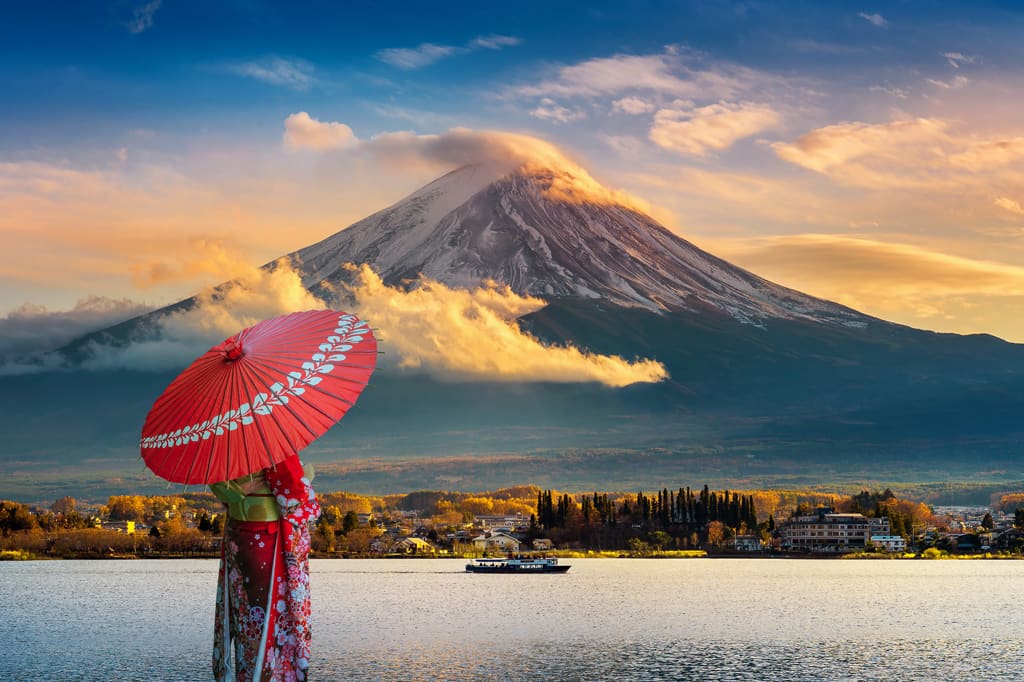
Of these lakes — Kawaguchi and Sai — are the most easily accessible by bus due to the bus frequency from Kawaguchiko Station.
Of the two lakes, Kawaguchiko is the most popular due to the area being better developed, as well as offering many experiences for tourists. Motosuko, Shojiko, and Yamanakako can also be accessed, but buses only run to each lake once every 1-3 hours!
Of course, there are more attractions and things to do around the area such as camping in Lake Motosu , fishing in Lake Shoji, kayaking, visiting the Shiraito Falls, Oshino Hakkai, the peaceful Kitaguchi-Hongu Fuji Sengen Shrine, and others.
But those merit separate posts as they are complicated to access. So in this guide, we will concentrate ONLY on the two popular and easy to access lakes– Kawaguchiko and Saiko .
Kawaguchiko or Hakone: Which is worth visiting?
Kawaguchiko is the BETTER option of the two because of the view of Mt. Fuji is EVERYWHERE in the area. And in terms of great Mt. Fuji views, Kawaguchiko is the very first place that should spring to mind, not Hakone, as the visibility of Mt. Fuji from Hakone is often poor because it’s a fog-prone area.
The food in Kawaguchiko is also much better (and cheaper), not to mention having the amazing hoto noodles ! Some of the best tempura I’ve ever had in my life is also in Kawaguchiko (more on that later), and there are many local restaurants and shops there that can only be found there.
This isn’t to say Hakone is bad, it’s actually a very nice town with many unique attractions and has many popular ryokans with private onsens. Hakone, as we’ve found, is loved by locals as an onsen getaway, but not really for sightseeing Mt. Fuji.
How to get to Kawaguchiko from Tokyo
The highway bus is the CHEAPEST and FASTEST option to get to Kawaguchiko from Tokyo. And if you have a JR Pass , the highway bus is still the cheapest and fastest option for you.
From Shinjuku Expressway Bus Terminal to Kawaguchiko Station it costs around ¥2,000 per adult, with a travel time of about 1.5 hours, depending on traffic. I recommend that you take the earliest bus from Shinjuku, at 6:05 a.m., as the chances of seeing Mt. Fuji in the early morning light is highly likely.
Here are other options to get to Kawaguchiko Station from Tokyo .
Ways to get around Kawaguchiko
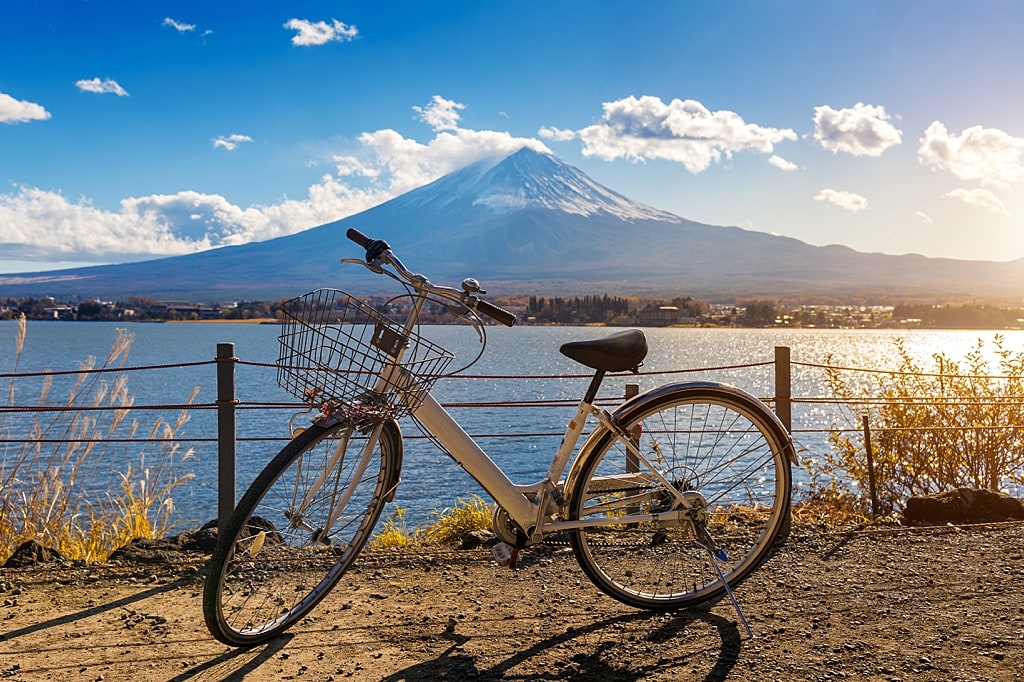
Biking is the best way to explore the entirety of Lake Kawaguchiko as the sightseeing buses always get caught in traffic.
In fact, biking is actually the faster approach if only have a day in Kawaguchiko, since you won’t need to wait at bus stops.
You can rent a bike for a whole day, with prices starting at ¥1,800-¥2,000, and there are many bike rental shops outside the Kawaguchiko Station.
2. By Sightseeing Bus
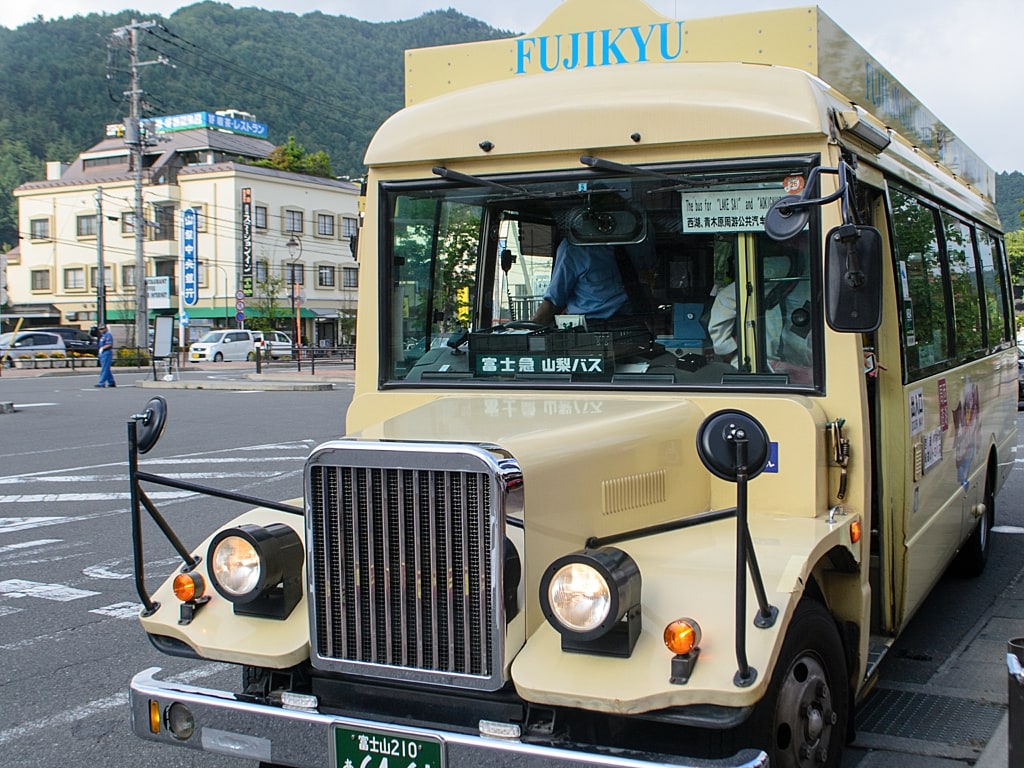
The Sightseeing Bus bound for Lake Kawaguchi and attractions nearby runs every 15 minutes, while the Sightseeing Bus bound for Lake Sai runs every 30 minutes.
These sightseeing buses are also known as Sightseeing Retro Buses because of their, you guessed it, retro design .
Be aware that during peak season (autumn and spring), you’ll experience MASSIVE delays in the bus schedule because of traffic, which can really SLOW DOWN your itinerary.
If you choose to do this option, I highly recommend that you make your trip overnight (2 days) and get the Unlimited 2-Day Ride Pass . You can get the Unlimited Ride Pass at the visitor’s center of Kawaguchiko Station. Check out our recommended accommodations in Kawaguchiko .
Which is better, join a day tour or on your own?
I get this question a lot from my friends who visit me in Japan and want to see Mt Fuji up-close. This is my answer to them:
Join a charter day trip tour if you want to save time and money, and aren’t looking to stay overnight.
It is also the perfect option for solo travelers, families, or large groups. Another advantage of joining a day trip tour is that you also get to visit other areas near Mt. Fuji but are outside of the Kawaguchiko and other Fuji Five Lakes.
Heck, you might not even need to read this article since you are accompanied by a professional tour guide! If you’re in a large group, say, 6-8 people, it’ll definitely be cheaper to just → book a Private Mt. Fuji tour and divide the costs among you.
Some private tour guides can also act as your personal photographer! You can also customize your tour and even go to tucked-away destinations around Mt. Fuji that are not easily accessible by public transport.
LOOKING FOR AN ORGANIZED MT.FUJI TOUR? → Click for best bus tours to Mt. Fuji → Click for private chartered tours to Mt. Fuji (recommended for groups of 6-8 people!)
What about self-driving?
If you can, driving around the areas of Mt. Fuji is the best way to explore as you can explore at your own pace. In fact, this is what we do every time we visit.
If you’re looking to rent a vehicle, then we recommend → Web-Rentacar by White Bear Family Co., Ltd . (Japan-based). We’ve used them a number of times before, and their prices are pretty hard to beat!
If you do decide to drive, we’ll have suggested itineraries for you later. It should go without saying, but there’s no need to buy the Unlimited Ride Pass with this option.
The main advantage of driving in these areas is that parking is free everywhere in the Fujikawaguchiko area, and you don’t need to worry about relying on the buses. We have prepared an itinerary for you below to make the most out of your Mt. Fuji experience!
If you plan to rent a car and you’re not comfortable driving from Tokyo to Kawaguchiko , we recommend that you take a bus and rent the car in Kawaguchiko. You have to make sure that you book in advance online. We have not experienced walking into rental car agencies in Japan, but we’ve never had any trouble reserving a car online.
Please note that unlike the American rental companies, the Japanese tend to be strict on the pick-up and drop off times, and will absolutely charge you.
Know before you go
1. Weather. Mt. Fuji is very dependent on the weather. Cloudy days, obviously, completely obscure your view. And if there’s one thing I’ve learned about climbing Fuji-san , it’s that the skies always seem to be clear and beautiful…on the days you’re not climbing. So the good news is, if you visit outside of the climbing season, you should have many splendid views of the mountain. Unless you visit during the rainy season.
2. Best time to see Mt. Fuji. After years of living in Japan and living in a house that actually had a view of Mt. Fuji, we’ve found that November to February offers the best visibility of Mt. Fuji (and its famous snow cap!) You can still definitely visit year-round, it’s just that you have to time your visit on the sunniest and clearest weather forecast possible.
3. Carry cash . Unlike the cities in Tokyo, most of the small shops and restaurants you’re likely to encounter around Kawaguchiko and Saiko don’t accept credit cards. So make sure you have enough yen before you go sightseeing.
Our Suggested Mount Fuji & Kawaguchiko Itineraries
So you want to do it on your own? Awesome! First off, remember to check the weather forecast for the days you’ll be visiting (if possible).
We admit that it’s a huge DOWNER when Mt. Fuji is not visible. But don’t let that discourage you from visiting! The chances it will be like that if you stay multiple days are slim. Make sure to BOOK your accommodation in Kawaguchiko well in advance.
→ Click to see our recommended accommodations in Kawaguchiko with great views of Mount Fuji .
Here are our Mt. Fuji & Kawaguchiko itineraries that you can copy from Tokyo:
2-Day Kawaguchiko & Saiko
Day 1: Take the early morning bus from Tokyo to Kawaguchiko Station . Upon arrival in Kawaguchiko Station, get the Unlimited 2-Day Ride Pass at the visitor’s center, then hop on the Red-Line (Kawaguchiko Sightseeing Bus).
Your first stop is the Natural Living Center . Explore the Natural Living Center, the Oishi Park is just outside and offers one of the best panoramic views of Mt. Fuji with Lake Kawaguchi.
Next, hop on the Red-Line bound for Kawaguchiko Station as your next stop will be the Itchiku Kubota Art Museum . Pay the entrance fee of ¥1,300 and explore the museum’s entirety!
Once done, why not have some lunch? Try houtou noodles , a popular delicious regional dish from Yamanashi! From Itchiku Kubota Art Museum, walk to Momiji-tei Restaurant and order their beef houtou . You’ll not be disappointed.
After the big lunch, you have the option of exploring this area. Kawaguchiko Music Forest Museum and Konohana Museum are just around the corner. Just choose one or just keep exploring.
Mt. Fuji is actually very visible from this area. The best spot to take photos here is the North Coast trail , which is just behind the Konohana Museum . Admire Mt. Fuji there, and why not have a cup of coffee?
After that, go to the nearest Red-Line bus stop and, if you still have time, go to the Sightseeing Boat/Ropeway Ent. bus stop for the Kachi Kachi Ropeway and ride the cable car going up to Tenjoyama Park , which offers not just another beautiful view of Mt. Fuji, but the town and surrounding mountains as well.
Afterward, depending on where you booked your hotel (which should be just around Kawaguchiko Station), check-in.
Day 2: Eat your breakfast and check out of your hotel. Take the Green-Line Saiko Sightseeing Bus. Your first stop should be the Saiko Iyashi-no-Sato .
Take your time exploring Iyashi-no-Sato, you could easily spend half the day here relaxing while viewing Mt. Fuji. They have samurai costumes to rent during your time here as well.
Next, go back to the bus stop and take the Green-Line again for Kawaguchiko Station. Your next stop is Yagisaki Park , which, depending on the time of year you visit, can be filled with flowers and herbs.
During peak season, you’ll find many food stalls here serving ice cream, dango, and other sweet Japanese street food. Small coffee shops are also scattered around the area. We personally love Milky Way and Cisco Coffee !
After relaxing, hop on the Green-Line bus and head back to Kawaguchiko Station, then back to Tokyo.
2-Day Kawaguchiko & Aokigahara
Pre-booking requirements:
- 2-hour Explore Aokigahara Forest with a Nature guide , book the earliest time if possible. ( This tour must be booked 2 days in advance!
Day 1: Do Day 1 of Itinerary #1.
Day 2: Breakfast and check out. Hop the Green-Line bus and go to Fugaku Fuketsu bus stop to meet up with your nature guide for the beautiful Aokigahara forest exploration.
Afterward, you are free to go explore the rest of your day, you can either visit the Iyashi-no-Sato healing village or head straight to Yagisaki park (see Day 2 of Itinerary #1 for ideas). Head back to Tokyo.
2-Day Kawaguchiko & Fuji-Q Highlands
Day 1: No need to buy the 2-Day Unlimited Pass! Explore Lake Kawaguchi by bike! There are many bike rental shops around Kawaguchiko Station.
Rent a bike for the whole day (usually ¥1,500-2,000 per day) and follow the Day 1 of Itinerary #1.
Don’t forget to grab a map from the shop for the dedicated bike route to the attractions mentioned on the Itinerary 1.
Day 2: From Kawaguchiko Station, take a bus to Fuji-Q Highlands and spend the day riding some of the world’s top roller coasters! There’s plenty more to see and do between rides, so be sure to explore as you go.
When you’ve gotten your fill, head back to Tokyo.
NOTE: For those of you able to spend the 3rd day here, consider relaxing in the nearby Fujiyama Onsen after your day in the Fuji-Q!
2-Day Kawaguchiko & Arakurayama Sengen Park
Day 1: Do Day 1 of Itinerary #3.
Day 2: Take the train from Kawaguchiko Station to Shimoyoshida Station and walk to Arakurayama Sengen Park .
Do some warm-up stretches as you’ll be climbing nearly 400 steps to see the beautiful Chureito Pagoda on top, which offers a breathtaking view of Mt. Fuji and the entire town of Fujikawaguchiko and Fujiyoshida City.
When you’re ready, head back to Tokyo.
1-Day Kawaguchiko (by bike only)
Just follow the Day 1 of Itinerary #3–explore Lake Kawaguchiko by bike!
Top things to do around Mt. Fuji’s Kawaguchiko & Saiko
1. sightseeing retro bus.
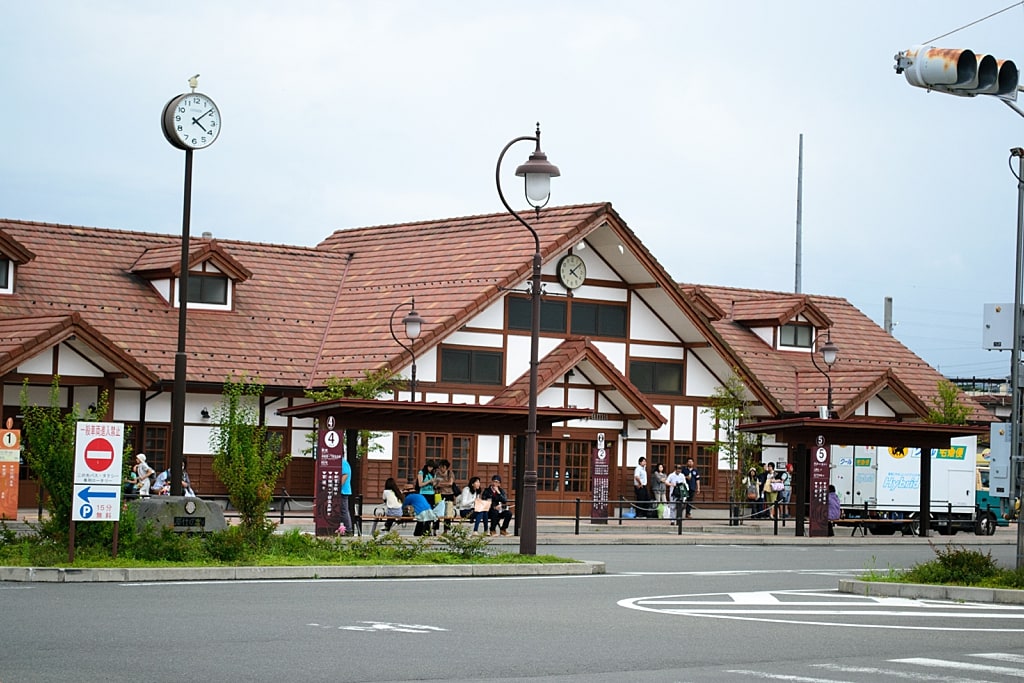
If you’re doing this trip on your own, again, I highly recommend that you stay overnight, ideally near Kawaguchiko Station as the bus starts there.
The Unlimited 2-Day Ride Pass is ¥1,500 . You just have to show the pass to the bus driver when boarding and exiting the Retro Buses. There are two bus lines that take you to the tourist spots around the area.
First is the Kawaguchiko Sightseeing Bus or the “Red-Line” which will bring you to areas around Lake Kawaguchiko. The second one is the Saiko Sightseeing Bus or the “Green-Line” which will bring you to areas around Lake Saiko.
2. Tenjō-Yama Park Mt. Kachi Kachi Ropeway (also known as Mount Fuji Panoramic Ropeway)
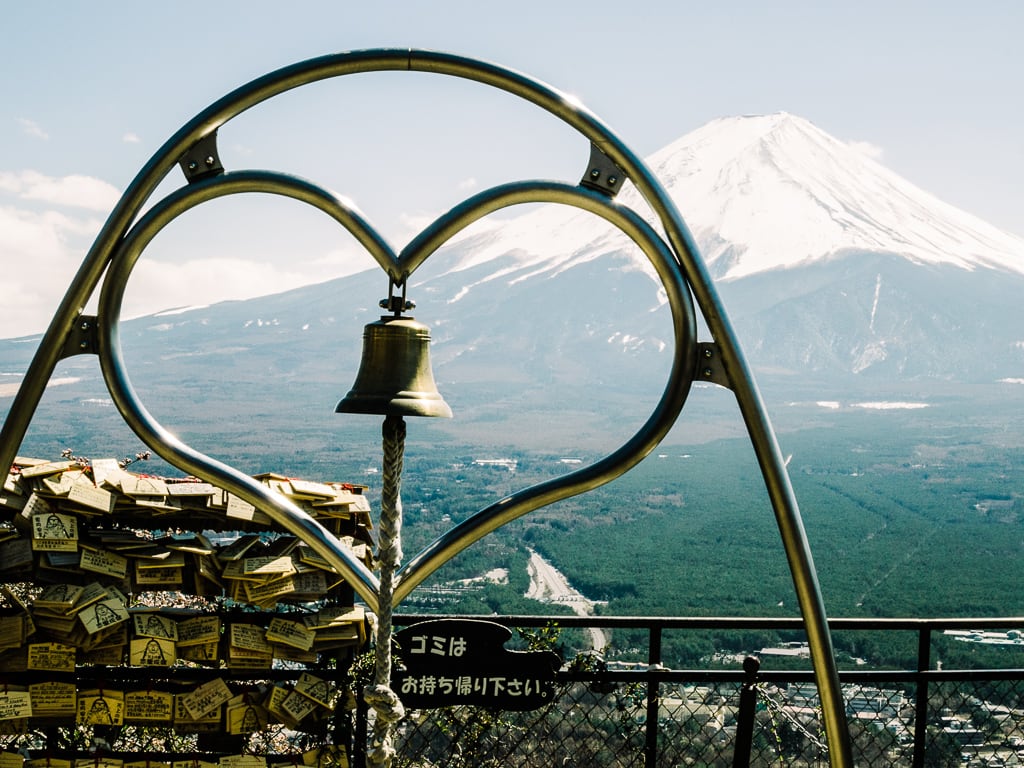
Probably the most popular attraction within this little town, the ropeway provides you with easy access to the top of Mt. Tenjo and gives you a great view overlooking the lake and town with the many mountains surrounding it all.
While you can take the cable car to the top, you also have the option of hiking up the mountain, although it’s a deceptively difficult trail…if you’re carrying a child on your shoulders.
The only real drawback to hiking up is finding the actual entrance to the trail is a bit of a hassle. It honestly took us about an hour to finally find it because, like many hiking trails in Japan, it’s sort of in a weird place, and makes you feel like you’re trespassing at the start.
At the top, there is a small souvenir and snack shop, along with a few trails leading to better views, and other mountains.
We suggest hiking up and riding down the ropeway cable care if you’re feeling up to it, or vice versa. Riding both ways simply robs you of some of the best views of Fuji you’re likely to find, as well as robbing you of an excuse to eat one of the tasty treats found at the top!
3. Kawaguchiko Music Forest Museum
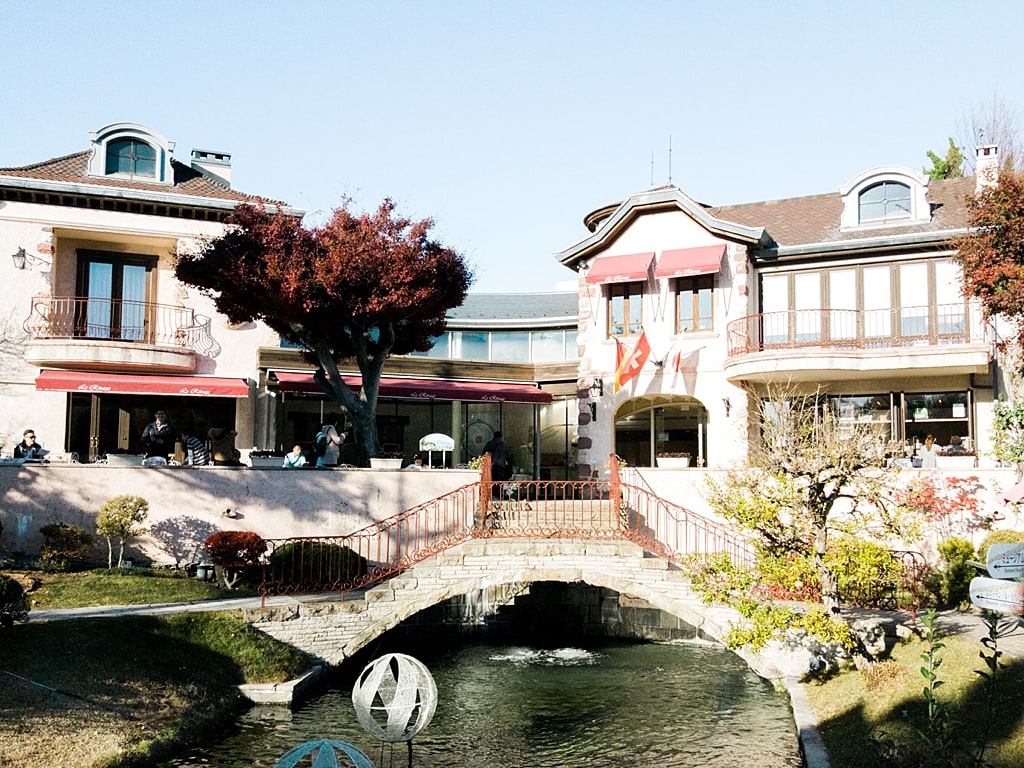
The buildings inside the Music Forest Museum remind me of a European fairy tale setting, with somewhat exaggerated buildings, and lots of pink paint.
The whole “forest” itself is built to resemble a town square of sorts, with a central fountain. So if you’re expecting a walk through a nature trail, it’s not like that. There are two buildings with things to do or see inside, and all the others are some form of a souvenir store. The whole area is handicap and stroller accessible.
The only thing we don’t like about this place is the admission ticket price — ¥1,500 per person. But there are 2 ways to get some discounted tickets for the music forest for about ¥300 off:
- By printing the web coupon screen from their website or;
- By reserving in advance through their website and paying through PayPal.
4. Konohana Museum
Home of Dayan the Cat, the Konohana museum is a fantastical stylized architecture, reminiscent of the Ghibli Museum . Containing the works of Akiko Ikeda, it was built to look like the Tachiel Enit Museum in the fictional Tachiel City, and is as much a part of the artwork as the pieces it houses.
Wachifield is the fictional world created by Ikeda-san, and the love and care that went into making this museum feel as authentic as possible can be felt as you wander its halls. Pictures, sculptures, and dynamic dioramas can all be found inside.
And while the exhibit itself is rather small, that makes it easy to fit into most itineraries!
5. Kawaguchiko North Coast Walking Trail
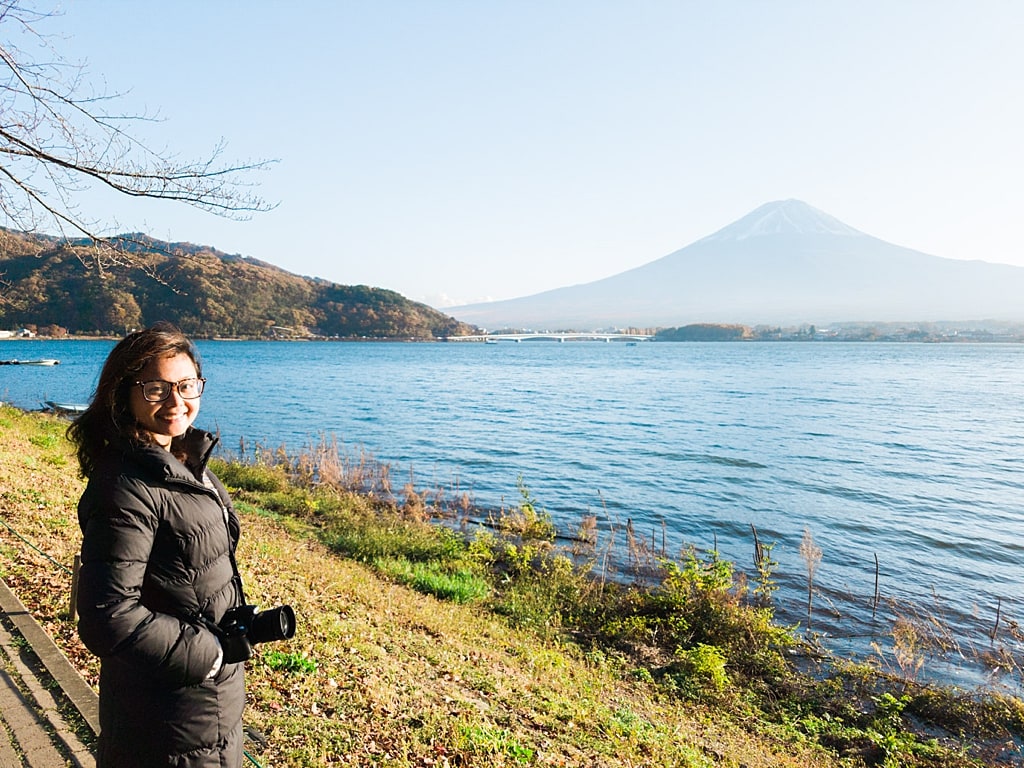
The North Coast Walking Trail is just a 7-minute walk from the Kawaguchiko Music Forest Museum and located behind the Konohana Museum. This short trail offers a 180-degree view of Mt. Fuji and is a place that many tourists are unaware of.
We saw many restaurants as we walked the trail, mostly Italian restaurants (there is a strong European influence here), cafe shops, and dessert shops. But we didn’t dare to try one. They were expensive!
It seemed to me that you are mostly paying for the comfortable seats and view, rather than the quality of the food that you order. So I suggest just enjoying the view and skipping the restaurants, maybe bring a boxed lunch, or just eat at one of the much better options elsewhere.
6. Itchiku Kubota Art Museum
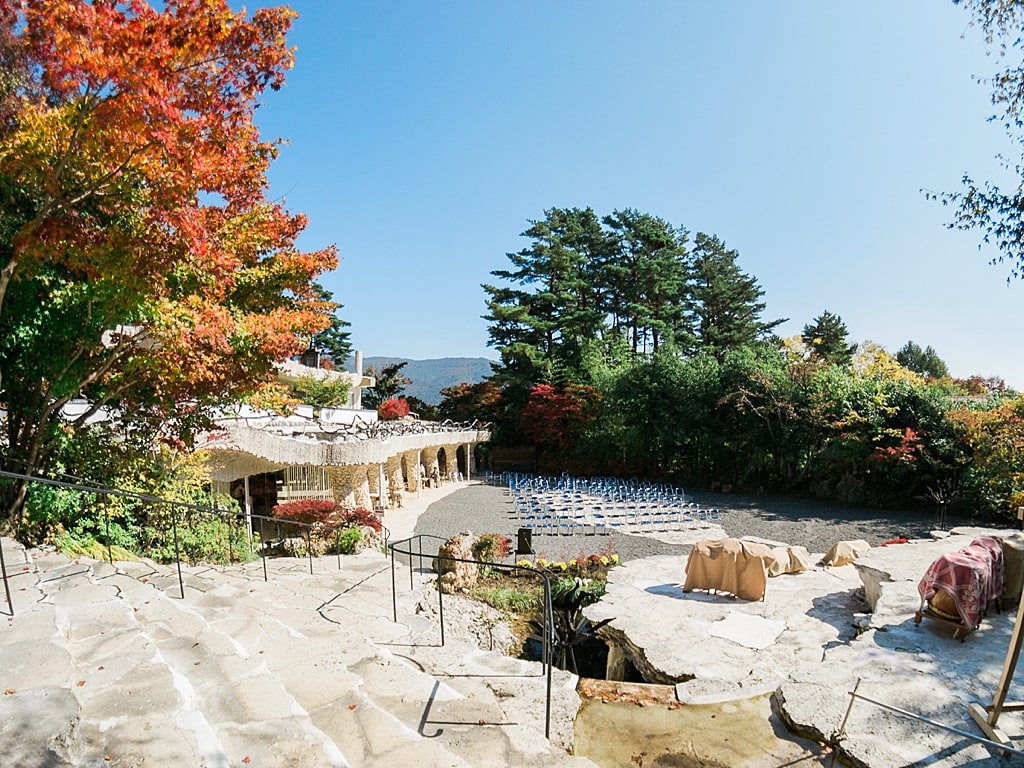
Itchiku Kubota is actually my favorite museum in Kawaguchiko. The museum lies inside a paradise-like forest with breathtaking views of the calm lake of Kawaguchiko and Mt. Fuji. It’s the most fascinating museum I’m ever seen.
It’s because the building is made up of Okinawan corals and limestones, and the foundation of the main gallery building is made from Hiba trees that are more than 1,000 years old. With an entrance fee of ¥1,300 , we were able to learn about the life of Itchiku Kubota and his fascinating artwork “ Tsujigahana. ”
Tsujigahana is a technique of dying kimonos which was prevalent around the period of the 13th to 15th century, or Muromachi Period, and became mostly extinct during the 16th to 17th centuries.
Kubota was 14 when he became a kimono artist. However, when he saw a 350-year old silk fragment, which was a remnant of Tsujigahana in Tokyo National Museum, he became fascinated and devoted his life to reviving it.
Several years after, Kubota was captured by the Soviets and was imprisoned in Siberia during World War II. When he was released, he studied the tsujigahana technique. But, because no instructions survived explaining how to reproduce it, Kubota was forced to experiment on his own for decades. Eventually, Kubota was not only able to reproduce it, but also modernized it.
He had his first exhibition in 1977 at the age of 60, and his works quickly went abroad and received various awards due to their uniqueness and superb quality. I would really recommend visiting this museum when you travel to Kawaguchiko and allow yourself to be inspired by Itchiku Kubota.
When you really want something to happen, the whole world conspires to help you achieve it. ― Paolo Coelho
Seeing his art really left me in awe, and I’m sure it’ll have a similar effect on you.
7. Kawaguchiko Natural Living Center and Oishi Park
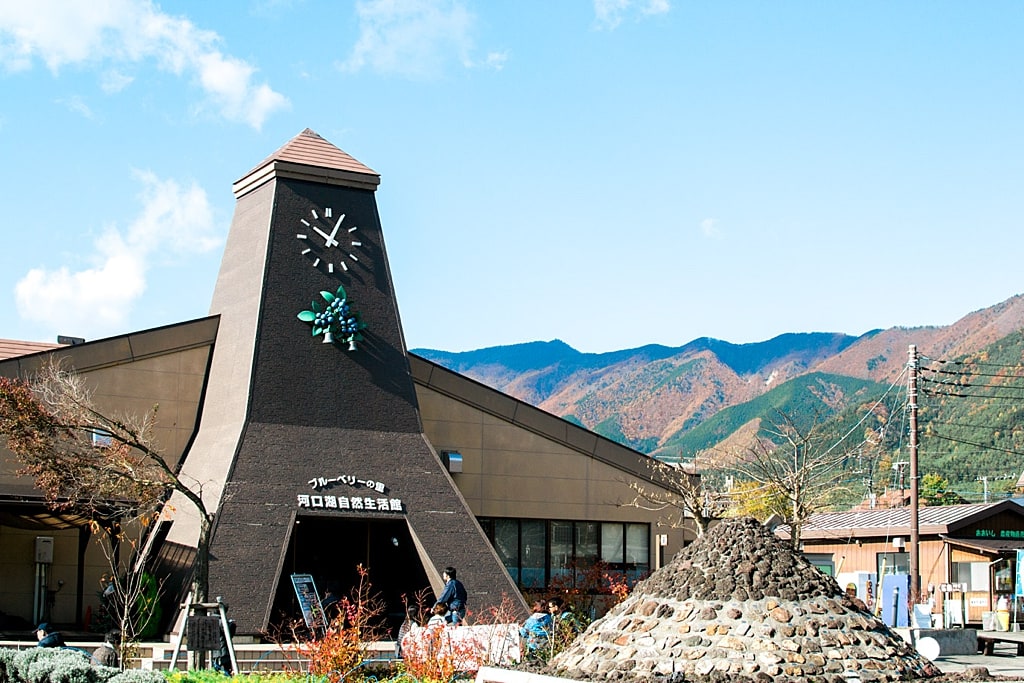
Located on the opposite side of the lake from Yagisaki Park, Oishi Park also takes part in the annual herb festival, and the Natural Living Center acts as a sort of a gift shop for buying herbs and blueberries.
Oishi park is also famous for its Kochia plants, which bloom in early autumn. You really can’t go wrong with either park, so why not just spend some time in both?
8. Yagisaki Park
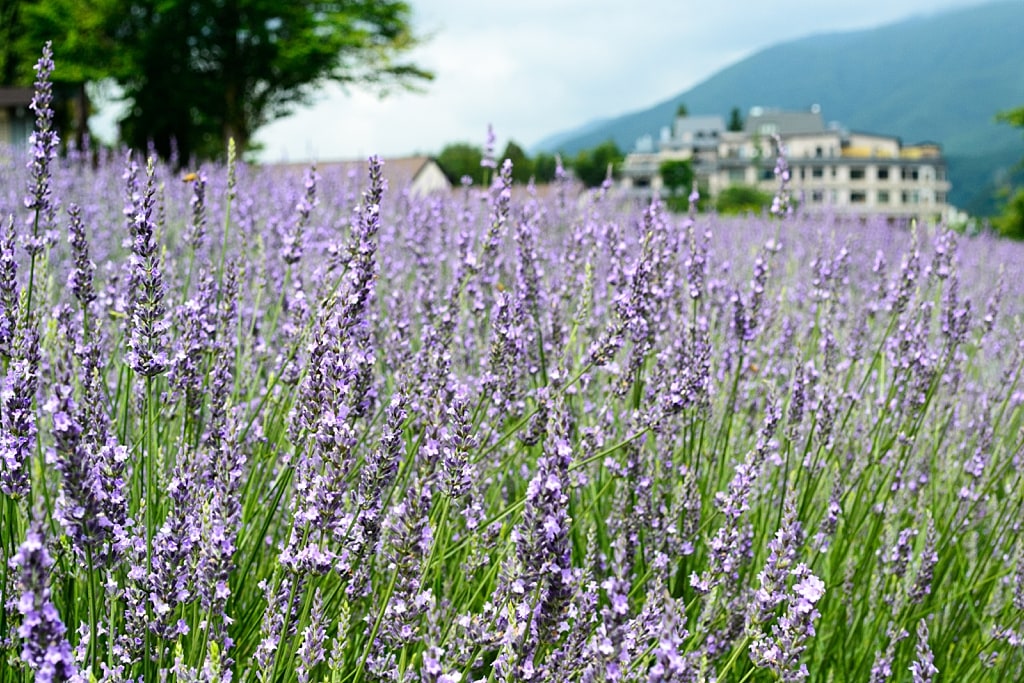
Located along the southern coast of Kawaguchiko, Yagisaki park offers both an incredibly peaceful and relaxing atmosphere, as well as an absolutely gorgeous view of Fuji-san and the surrounding mountains.
I suggest planning your visit to the park between June and July, as the park holds the annual Lake Kawaguchi Herb Festival during that time. The plants will be in full bloom and the entire area will be filled with vendors selling delicious treats and souvenirs.
There is also a popular art museum called Muse-kan (Muse Museum) in the park, which displays the work of Yuki Atae, a famous doll-maker in Japan. There are approximately 90 dolls on display within the museum and are rotated twice a year. There’s also a cafe and gift shop within as well.
9. Saiko Iyashi-No-Sato Nenba (Healing Village)
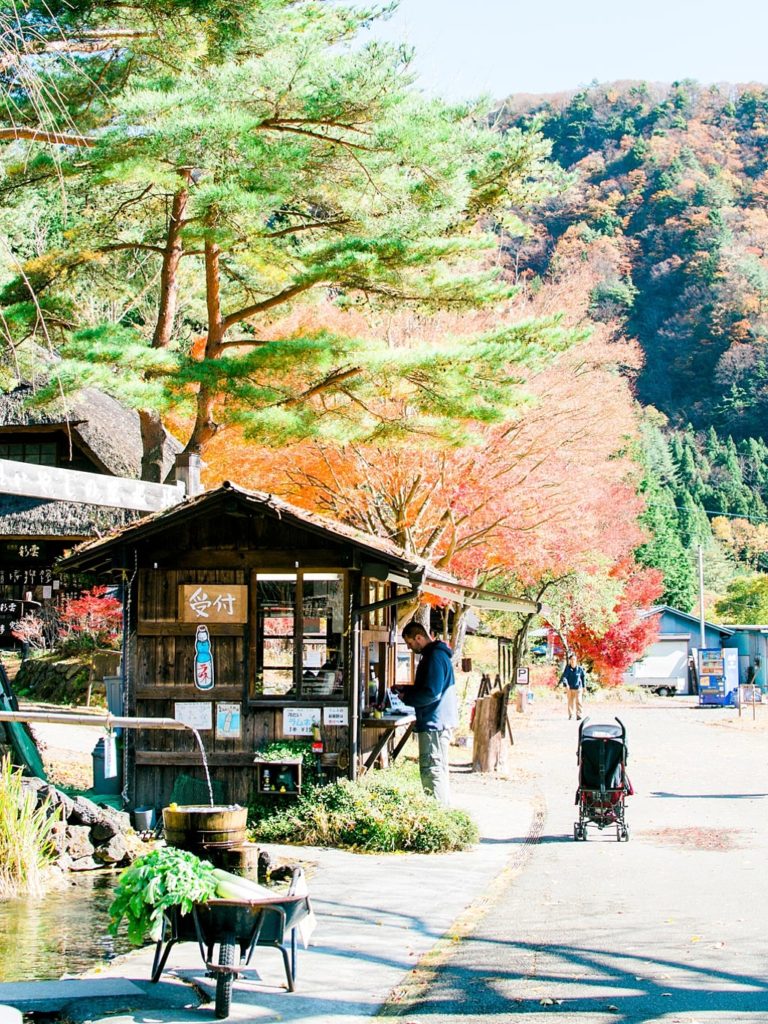
Located near Saiko, Iyashi No Sato Nenba is an open-air museum that features thatched roofed houses that are similar to the historic village of Shirakawa-Go in Gifu Prefecture. These thatch-roof houses were originally built by farmers for raising silkworms back in Showa Period (1926-1989).
A typhoon in 1966 actually destroyed the village, but now, reconstructed 40 years later, there are over 20 thatched houses that were converted into shops offering souvenirs, workshops, or hands-on activities like paper mache, Hina doll making, or weaving.
Each thatched house has its own specialty, including souvenir shops, tea houses, handicraft workshops, and art galleries. This place is beautiful and relaxing and made more beautiful by the surrounding foliage.
This is also one of the best views of Fuji to be found in the five-lakes area. There are also stores near the parking lot with local fruits and vegetables, honey products, and other Japanese street food. In fact, my husband didn’t want to leave because a man was selling huge jars of honey for ¥2,000, which is unthinkably cheap in Japan!
10. Aokigahara Forest (Suicide Forest)
After reading many of the urban legends about this enigmatic forest online, I tended to think it was enough to discourage people from trying to enter this forest.
Exploring the infamous Aokigahara Forest was something I thought would be impossible given the stories surrounding it. But apparently, it’s not. The forest is open to the public and is actually a major attraction for the area.
Upon reaching the entrance to the forest, however, it becomes clear that not all the stories are myths. There are warning signs in Japanese telling you to stay on the hiking trail and avoid going too far from the entrance, as it was believed that people get lost because the GPS doesn’t work in some areas of the forest.
The entrance also has a sign in Japanese talking about suicidal thoughts, as well as listing various help hotlines. It reads:
Life is an important thing we receive from our parents. Think once more about your parents, your siblings, your children. Don’t suffer alone. Please talk to someone.
Aokigahara is both beautiful and creepy , and if you’re interested in seeing it for yourself, you should definitely join a guided nature tour .
Oh, and don’t be a Logan Paul…
11. Arakurayama Sengen Park
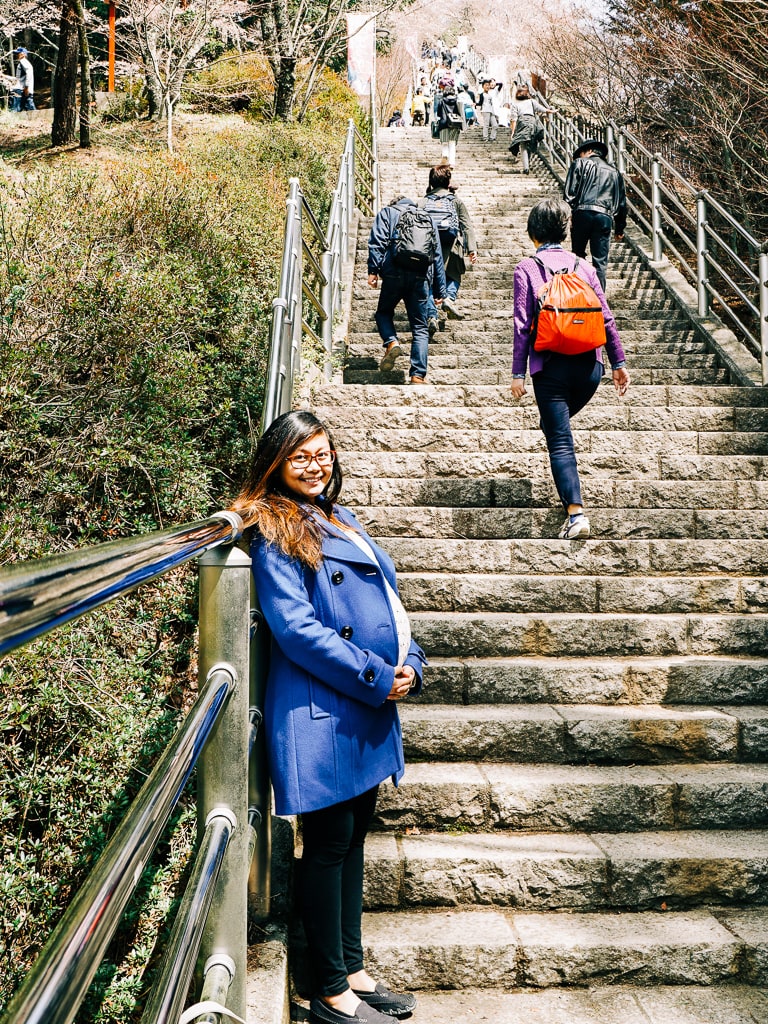
Home to the Chureito Pagoda, this park offers yet another incredible view of Mt. Fuji, while also overlooking Fujiyoshida City. It’s over almost 400 steps to the park, but the way is lined with cherry blossoms, which should take your attention away from your burning thighs.
It’s a hike to the top but you’ll be rewarded by the panoramic views of Mt. Fuji along with the Pagoda, made famous by Japan postcards.
12. Fuji-Q Highland
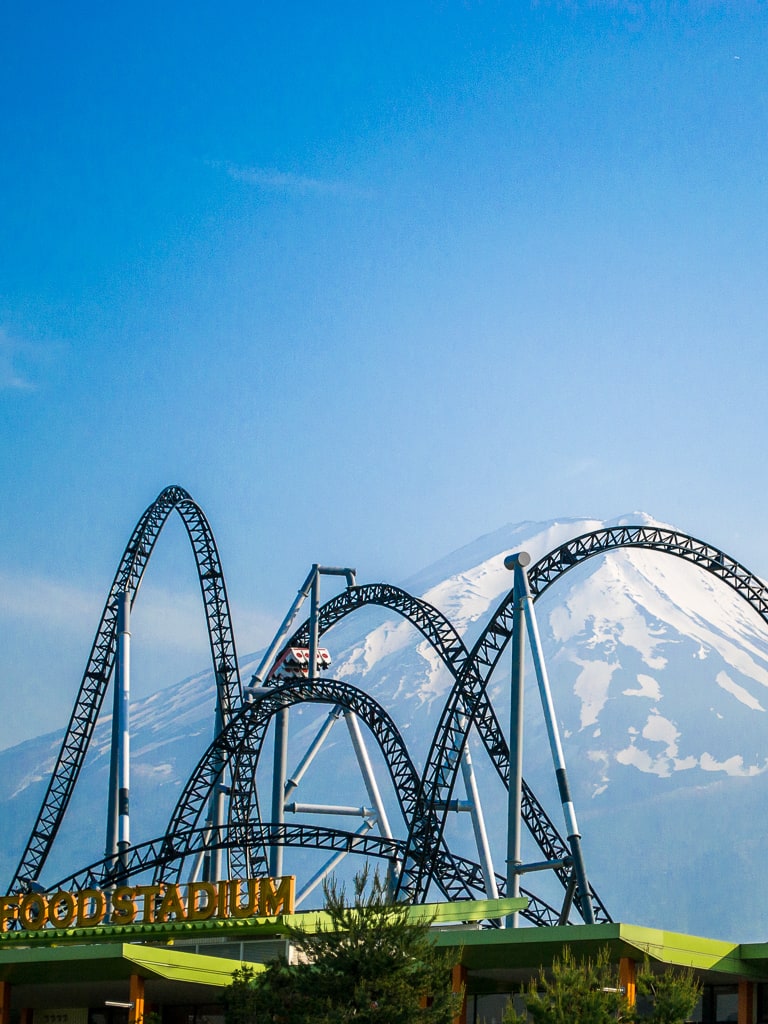
Probably the main attraction for Japanese locals around Mt. Fuji, not named Mt. Fuji, is this amusement park known for its roller coasters and thrill rides. For those less enthusiastic about that sort of thing, the park also offers 3 other areas to explore that don’t focus on rides.
Made up of four separate areas/parks, there is the main park, Fuji-Q, which is where the major rides and attractions are. Thomas Land, based on Thomas the Train, for the kids. La Ville de Gaspard et Lisa, based on the French picture book characters “Risa and Gaspearl.”
As I said before, the area around Fuji has a strong European influence). And it’s the newest area, Fuji Leaf Village, based on the popular manga anime Naruto and Boruto.
I’ve been to the park about 3 or 4 times, but I’ve honestly only been to the main park. Thomas Land was the only other area at that point (and we didn’t have a child at that point), and I haven’t returned since the other areas were built.
This is definitely on our to-do list, and we’ll be sure to get back to you with our thoughts as soon as we do. As for the main park, the roller coasters are incredible and are definitely the main attraction.
Each also affords a great view of Mt. Fuji (except Dododonpa, you’re going too fast), right before you take your first drop. I highly recommend stopping here during your trip if you’re looking for something different than the normal trip to Disneyland or Universal Studios Japan .
After all, you can get those in America as well. But there’s only one Fuji-Q.
Want to See More?
Our 53 Best Places & Things to do around Fuji Five Lakes There are so many things to do around Fuji Five Lakes! Even when you can’t see Mount Fuji, you can still enjoy all the attractions and off-the-beaten spots around the Fuji Five Lakes area.
Read our 53 Best Things to Do in Fuji Five Lakes
Top seasonal attractions in Kawaguchiko
1. Kawaguchiko Herb Festival in summer . Mainly lavender fields in Yagisaki Park and Oishi Park. Lots of Japanese street food, so make sure you try some. Event dates here .
2. Momiji Corridor Festival (Maple Corridor Festival) in autumn. Lots of fiery maple trees lined up with many street foods and souvenir stalls down the road. This is a very popular event in the autumn and is jam-packed with “Leaf-Peepers” (for my Mainers out there). Event dates here .
3. Oishi Park’s Red Kochia in autumn. A great alternative to Hitachi Seaside in Ibaraki, Oishi Park has plenty of Kochia plants that turn a deep red during mid-October . And the best part is it has Mt. Fuji as the backdrop.
4. Oike Park in autumn. Oike Park, a park in front of Kawaguchi Herb Hall, is lined with poplar trees which turn a beautiful yellow in late October to early November . Mt. Fuji isn’t so visible here because it’s partly a residential area, but it’s worth visiting only during autumn.
5. Arakurayama Sengen Park. Although still, very nice year-round, Arakurayama Sengen park is EXCEPTIONALLY beautiful when visited during cherry blossom and autumn season.
Where to Eat in Kawaguchiko
Food is our favorite part of every journey, and Kawaguchiko is perhaps one of our favorite places in Japan as it has really superb food. The Yamanashi area as a whole is most well known for its famous Hoto Noodles, and Kawaguchi has many restaurants specializing in it.
We tend to favor and remember restaurants which offer both great food AND kind staff, so here’s our list:
1. Momijitei restaurant
Momjitei is just a 7-minutes walk from the Itchiku Kubota Art Museum. And it is famous for making the best Houtou noodles in Kawaguchiko, and the best restaurant to go for your lunch.
Just make sure to get there early as it fills up fast! Their homemade miso sauce is aged for two years and is what sets them apart from other houtou noodle restaurants.
We had beef houtou during our visit and it was one of the best meals we’ve ever had! The staff instructed us by pointing to the condiment tray on our table that we could also add some Nanban (miso topping) for an added oomph to the soup flavor.
2. Houtou Fudou restaurant
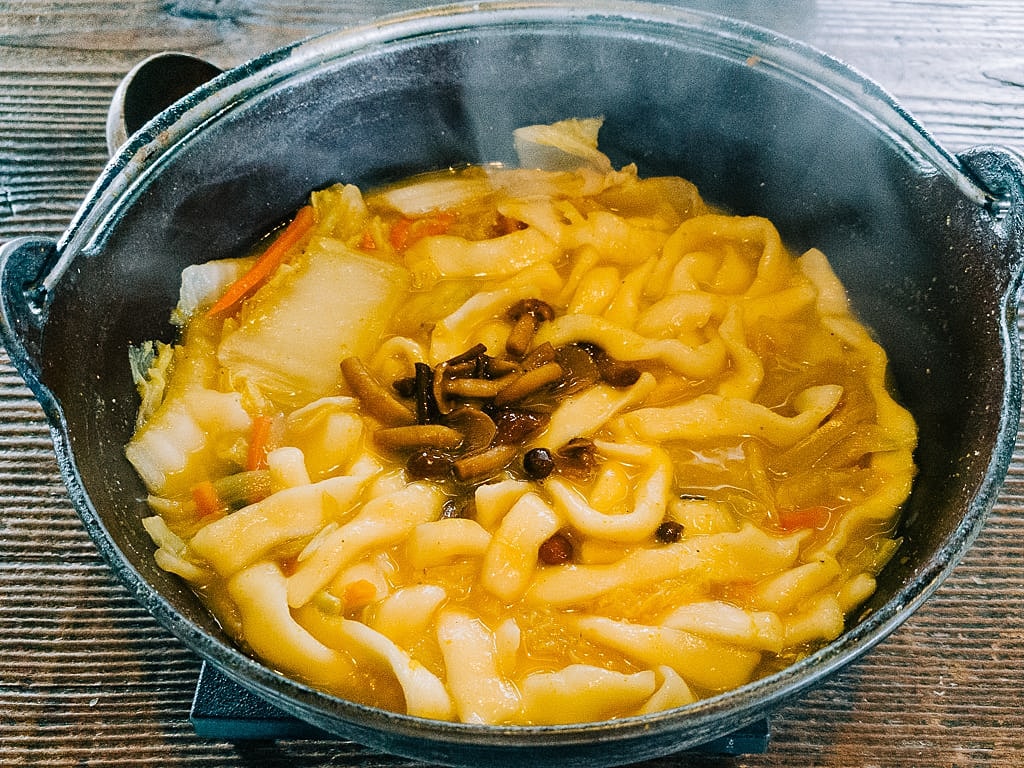
Houtou Fudou has several branches in Kawaguchiko, and we ate at their main branch near the Kawaguchiko Music Forest Museum. All their branches are always extremely busy!
That’s how popular they are. There’s one just in front of Kawaguchiko Station, and of course, due to its location, it’s always jam packed!
Now if you were to ask us which Hoto noodle shop is best, we would personally choose Momijitei Restaurant because the food is great, it comes in a large portion, and the staff was very friendly.
3. Tempura Restaurant Ninja
This restaurant is only a 4 minute walk from Kawaguchiko Station. Now, I don’t usually like tempura because it’s generally greasy, but this is different and has become the only tempura I really like!
Our picky daughter surprisingly ate their tempura as well, which is always a plus. Something about their tempura is unique, I think it might be air fried, but who knows. The staff here are very nice too, and, as usual, our daughter received treats from them.
4. Cisco Coffee
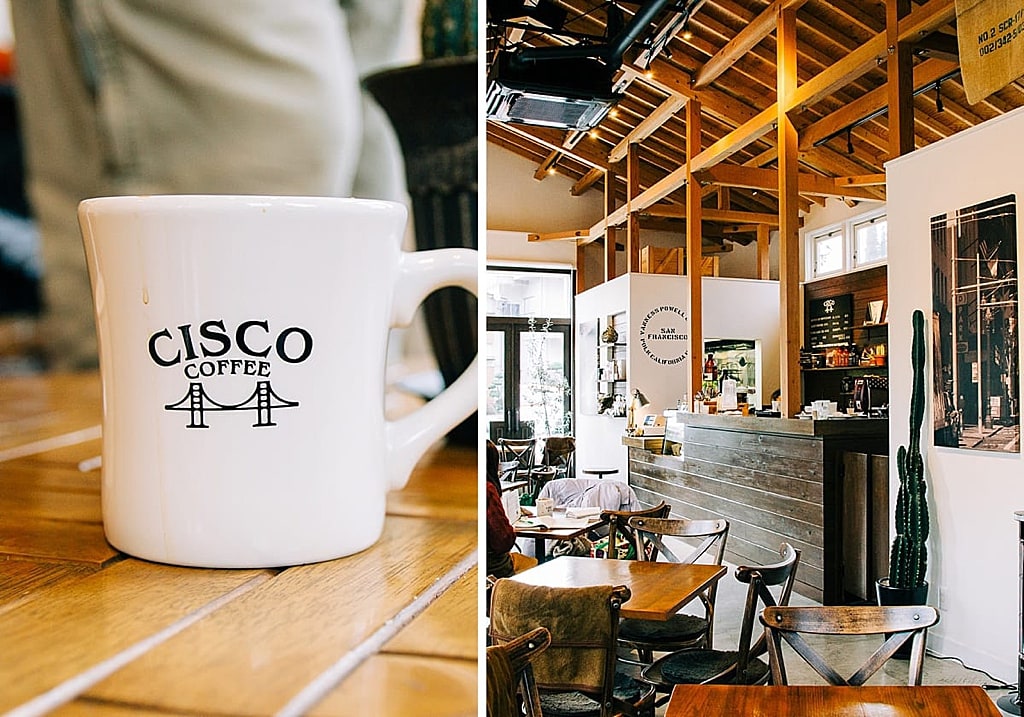
This cozy coffee shop is located near Yagisaki Park is a San Francisco style coffee shop in a relaxing shop to sit and relax with a good book. The menu is pretty simplistic, but the coffee is top notch and really helps warm you up on a chilly morning by the lake.
5. Milky Way
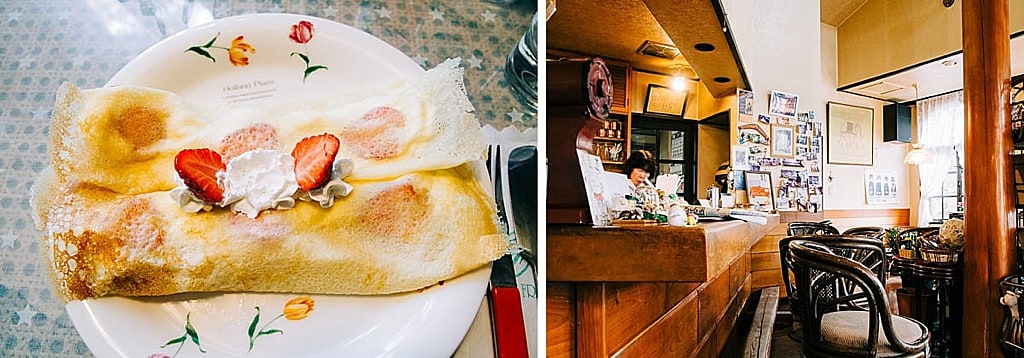
This is a traditional shop that is also located near Yagisaki Park. They have an incredibly cozy atmosphere inside.
Now, I won’t lie, I’m a sucker for Mom & Pop type places, and this shop is clearly a passion project between the joint owners who run it. The desserts here are absolutely incredible, and the owners were super patient with our daughter, who was being rather moody this day.
There are plenty of toys to entertain most kids, but apparently, not enough for ours. I can’t recommend this place highly enough!
6. Troisieme marche
We love this coffee & bakery shop, and we wanted to enjoy it more, but our daughter just wouldn’t sit still. This is located near Kawaguchiko Forest Museum, and is famous for their cake desserts, which were amazing.
And that’s it! Please know that the itineraries presented above are based on our experience, so it’s tried and tested .
If you have any question, please leave you comment below!
11 thoughts on “Kawaguchiko: Full Guide, Sample Itineraries & Things to Do”
Hoping to see your 1 night itinerary for kawaguichiko we are coming from Narita. thank you!
I will be self driving from Narita Airport to Lake Kawa on March 11 . Hopefully we can reach before noon to Lake Kalwant. We will be staying in kawaguchiko Hotel. Can you assist to plan the route for us around the area for the places of interest? We will depart on the 13th. I would also like to know, since we self drive, there is no need for us to buy the bus pass right? Then where do we get the ticket for the cable car and the ferry? Is it still better to get the pass for the Ropeway? Want idea on the cost of the Ropeway and ferry ? Thanks in advance
Hi Ada, I will be travelling from Osaka to Kawaguchiko with my family of 3 by JR pass from 24-25 Apr. We will take the earliest train and hopefully to arrive Kawaguchiko before noon on the 24th of April.
We will be staying in the Hotel New Century. We are planning to rent 2 ordinary bikes & 1 E-bike to cycle around Kawaguchiko & Saiko.
Can you please advise to me where to rent a bike, and should I rent it for 2 days?
Can you also advise to me how to plan my cycling trip to cover all the places below? 1. Natural Living Center. 2. Oishi Park 3. Itchiku Kubota Art Museum. 4. Try houtou noodles 5. Momiji-tei Restaurant and order their beef houtou 6. Kawaguchiko Music Forest Museum 7. Konohana Museum 8. North Coast trail 9. Maples Corridor 10. Nagasaki Park 11. Oishi Park 12. Kawaguchiko Natural Living Center 13. Momiji Tunnel 14. Saiko Iyashi-no-Sato Nenba 15. Saiko Yacho-no-Mori Park 16. Fugaku Fuketsu (Wind Cave) 17. Narusawa Hyoketsu(Ice cave) 18. Ryugu Doketsu(Lava cave) 19. Fuji Omuro Sengen Shrine 20. Yagisaki Park 21. Kawaguchi Asama shrine 22. Mt. Tenjō Ropeway 23. Arakurayama Sengen Park 24. Fuji Shibazakura Festival
Thank you for visiting!
First of all, WOW, you’ve got a ton of places on your wishlist!
Kawaguchiko and Saiko are two separate areas. And most attractions you listed are seasonal and are closed.
For example, you won’t see any red foliage in Maples Corridor in April.
And if you are going to the museums, you can easily spend 2-3 hrs inside.
I recommend that you pick 3 places per day.
For example: April 24: Arakurayama Sengen Park, Fuji Panoramic Ropeway, & Natural Living Center or Music Forest Museum. April 25: One or two museums.
Hi Ada, I will be coming from Tokyo, and either take the Shinkansen or a bus to Kawaguchiko. Where can I rent a car in Kawaguchiko near the Shikansen Station of bus station?
Hi Louie, you should take the bus as the Shinkansen Station is far from Kawaguchiko. The car rental is just a few minutes’ walk from Kawaguchiko Station, here it is: https://goo.gl/maps/hJdrHkwQ1bbm4hNB9
Hi Ada, I can’t seem to find the “Day 1 Typical Tourist itinerary”. How do i go about it?
Hi Ada, I find your information very useful and interesting. Based on what you have written, I bet 2 nights stay is not enough to see all those attractions. Should I book to stay for 3 nights or it is too long? We( my family- 3 adults) are planning to travel from Kyoto to Kawaguchi in May by bus and will arrive early at 7.30am. I wonder what activities are available at night as I read from other blogs that said Kawaguchi is a very rural town. Is there any travel agent in Kawaguchi that organize short trips around here like fruit picking etc. so that we can join them without having to plan on our own?
Since you are arriving early, 2 nights is enough, but 3 nights would be great too. You’re right Kawaguchiko is a rural town. It’s also hard to tell you some suggestions without knowing where you’re staying, so where are you staying?
“follow the Day 1 Typical Tourist itinerary” < I can't find the Typical Tourist itinerary…
Hi Nat, thanks for pointing that out. I forgot to edit the itinerary when I renamed them. I fix it now for you!
Leave a Comment Cancel reply
Save my name, email, and website in this browser for the next time I comment.
The Ultimate Lake Kawaguchi Guide (2024)
05/12/2024 by Kristin Addis 4 Comments
The world-famous volcano rises up like a giant over the island, the iconic slope wearing a hat of snow. Visible from the north end of Lake Kawaguchi, I know I’ve picked the perfect place to watch Mt. Fuji from. My days are spent relaxing, eating amazing food, and watching the stunning view.
Kawaguchiko (Lake Kawaguchi) in Japan’s Yamanashi prefecture is a dreamy escape just a couple hours away from Tokyo. It’s peaceful, full of Fuji views, and home to Ryokans with delicious food and onsen, making it a perfect stop on your Japan itinerary . Here’s everything you need to know about visiting Kawaguchi Lake:
Table of Contents
What to do in Lake Kawaguchi
Although I think one of the best things to do is just chill while gazing at the amazing Mount Fuji, there’s plenty to do and see in Kawaguchiko from hikes to pagodas and more. These were our favorites:
Tenku no torii
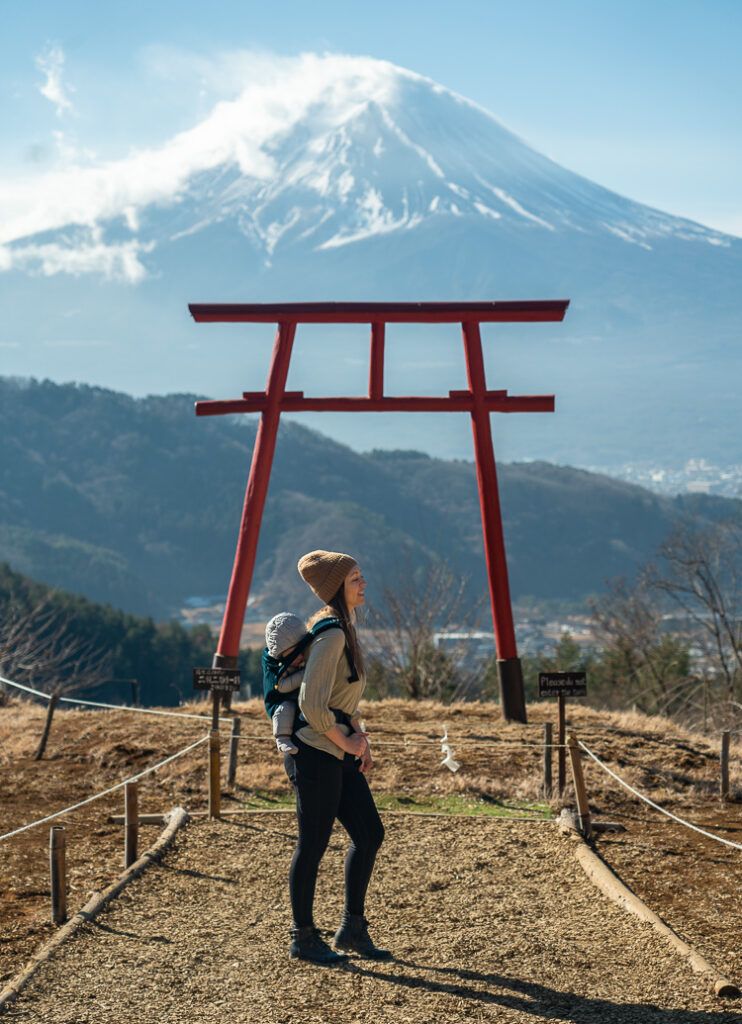
I had seen photos of this iconic torii gate framing Mount Fuji and had to see it for myself. It turns out it’s more like an Insta shot opportunity that costs ¥100 maintenance donation. But despite waiting in a queue for our turn to take a photo and that being all there is to it, they are still some of my favorite photos from the whole trip.
It’s possible to take a bus most of the way and hike 30 minutes or so up, or in our case, take a taxi to the top, walk down, and bus back into town in order to save time. You’ll find the gate in the Kawaguchi Asama Shrine area.
Oishi Park is a famous place to take photos of Mount Fuji with the lake in front. The gardens can be beautiful throughout the year, with different plants in bloom at any given time. Since we visited in the winter, it was the least exciting possible foreground, but I’d definitely visit in the spring or summer. Walk the short walking trail and enjoy an ice cream (I was shocked at how much ice cream we had – Japanese soft serve is delicious!) and coffee. General admission is free.
Chureito Pagoda
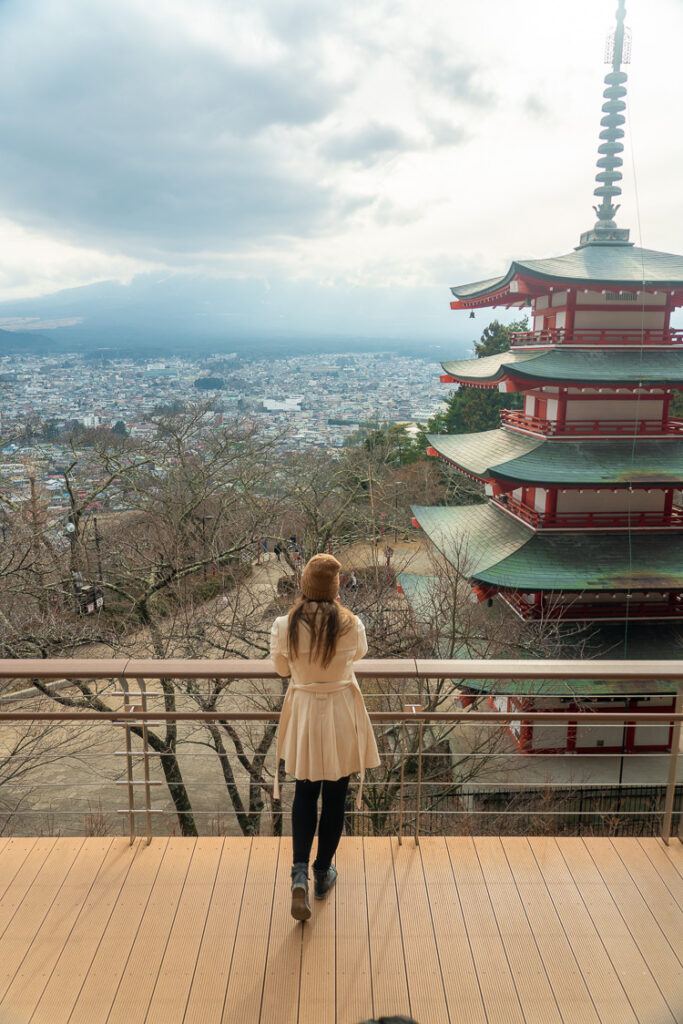
One of the most iconic views of Mount Fuji in the area, or potentially the whole country, the Chureito Pagoda in Arakurayama Sengen Park is a must-see. In the autumn months, the trees have colorful changing leaves and in the spring, they’re brimming with cherry/sakura blossoms.
In the winter months, the trees will not be decorated with foliage, but the winter is typically the best time to see Mount Fuji without clouds. Ironically, the clouds moved in for the only time during our whole visit right as we reached the viewpoint.
It was not crowded when we visited in early February (a big reason why we chose to visit Japan in the winter ), but I’ve heard that the queue to take photos can be hours long during cherry blossom season. Keep in mind that in order to get there, after exiting the train you’ll need to climb quite a few stairs to get to the top, passing through several torii gates on your way up.
North Lake Shore Walk
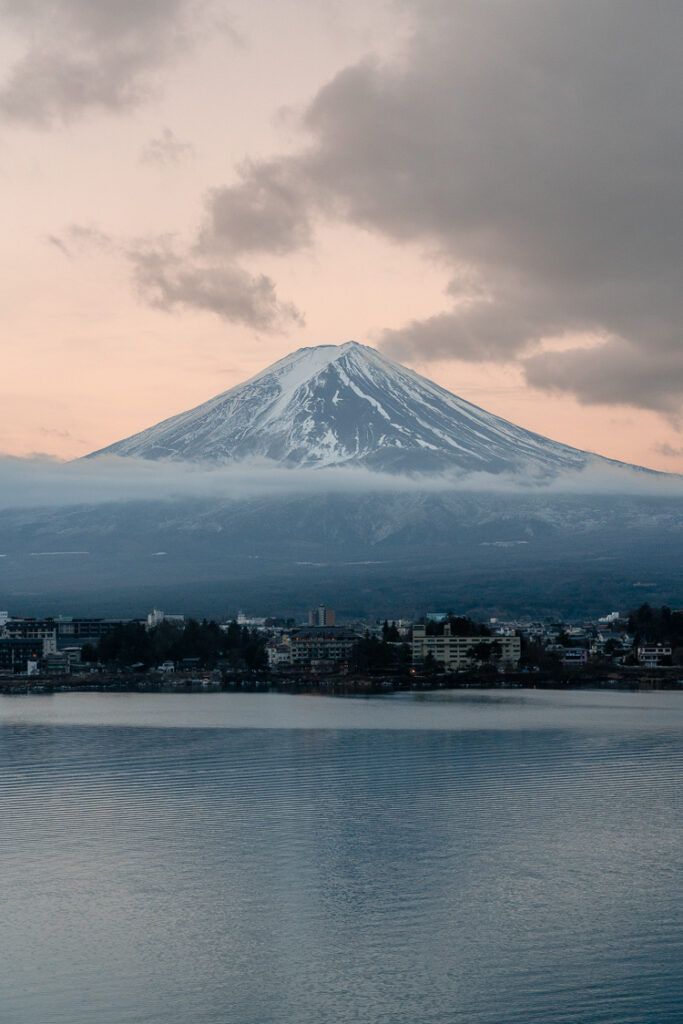
There’s a lovely walking trail along the north shore of the lake with some of the best views of Mount Fuji. It’s easy to walk in or out of it at any point and catch the bus which runs clockwise and counterclockwise back to the main station. One of the best views is in front of the ryokan where we stayed – Kozantei Ubuya (more on that below).
Mt. Fuji Panoramic Ropeway
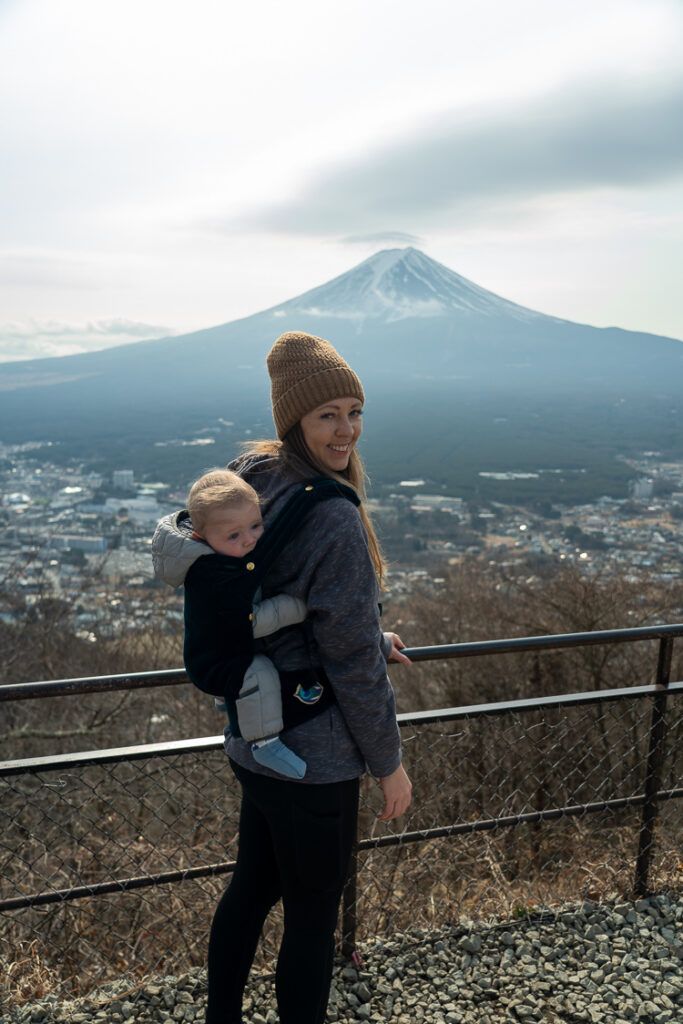
The Mount Fuji panoramic ropeway is one of the most popular things to do in Kawaguchi lake. You’ll ride a small cable car up to the top — or you can hike if desired — for this view of the volcano. It costs ¥900 per person round-trip.
There’s also another iconic photo opportunity swinging on a swing sit in front of a nice view of Mt. Fuji. You’ll also see a queue for the opportunity to get on the swing and it costs ¥500 extra. I didn’t want to do it badly enough and had a baby on my back, but the photo opportunity could be great.
I was honestly underwhelmed by the overall view from the top, which featured a chainlink fence and views of the city buildings in front of the mountain, and feel the views along the north shore of the lake are better. If I could do it again I’d skip this one.
— Read Next —
What to wear in Japan
Fuji-Subaru Line 5th Station
Heading out of town, the Fuji Subaru line 5th station is famous for views of the surrounding area from the base of the mountain. This is a popular place to start the hike to the top of Mount Fuji during climbing season. Although you won’t get views of the mountain, because you’ll be on it, you will see the sweeping views of the surrounding area. There are also souvenir shops and restaurants.
It takes about 50 minutes to get there via direct bus from Kawaguchiko station.
Oshino Hakkai
Located about 30 minutes from Kawaguchiko, Oshino Hakkai is a village named for its eight clear spring water ponds at the foot of Mount Fuji. The charming village is the most photogenic, and popular, during the spring months when the trees are full of cherry blossoms. It’s also a beautiful spot in the fall months with the changing leaves.
Fuji Yurari Onsen
Onsen, or hot springs, are one of the best ways to enjoy Japan during the cooler months. The Fuji Yurari onsen allows day visitors and features several indoor pools as well as two outdoor pools with views of Mt. Fuji.
Since all of the onsen I could find in the area ban tattoos, I ended up booking a room with its own private one (see below), but if that’s out of your budget, this is a great place to visit if you have no ink.
Where to Stay in Lake Kawaguchi
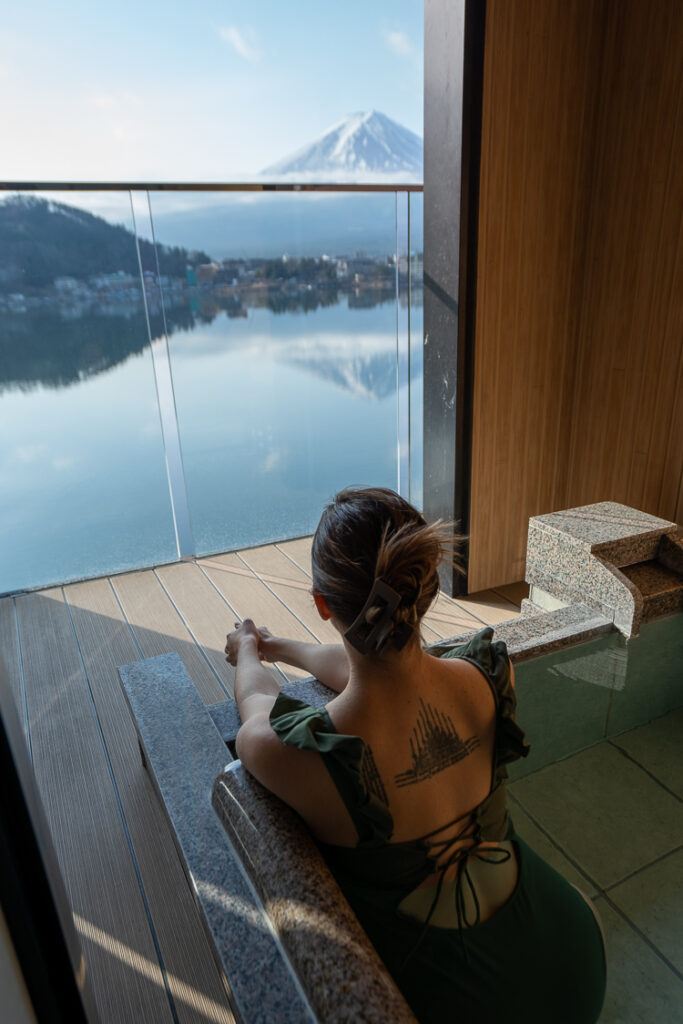
We had quite a variety on our trip in Japan beginning in Kyoto and stopping by Takayama prior to heading to Kawaguchiko and finishing in Tokyo . We had very different accommodation at each stop, and I knew I wanted to stay in a traditional Ryokan at least once during the trip.
From all my research, which took hours, Kozantei Ubuya came out on top. It was consistently rated highly by guests, featured the best views I could find, and many rooms have their own private onsen on the balcony.
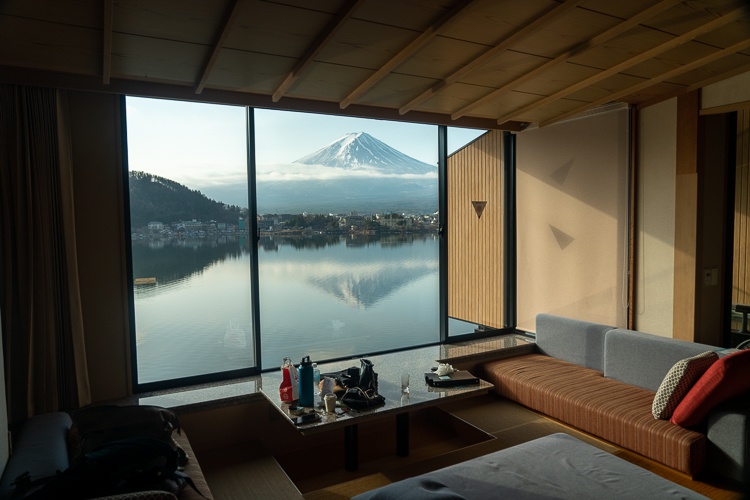
We booked the Superior room, which was quite large for Japanese, and really any hotel, standards. It’s one of few places where enjoying a green tea and a snack in your room is an experience . Dinner and breakfast are also included, and we were even given our own private room to dine in.
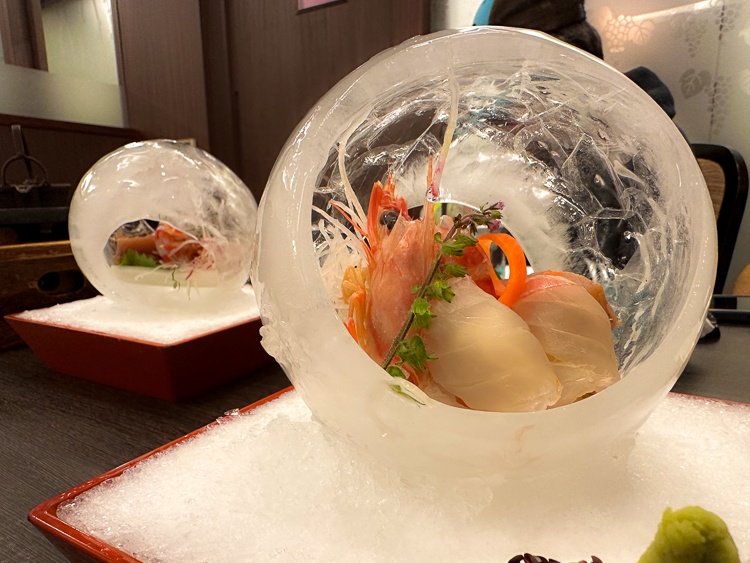
We enjoyed a Kaiseki (multi-course dinner you can read more about here ) each night with delicious, fresh seafood and always featuring tender, marbled beef.
Although it is a pretty penny, it was worth it. The hotel books out pretty far in advance, so if you know you want to go, book well ahead of time !
How to Get to Lake Kawaguchi
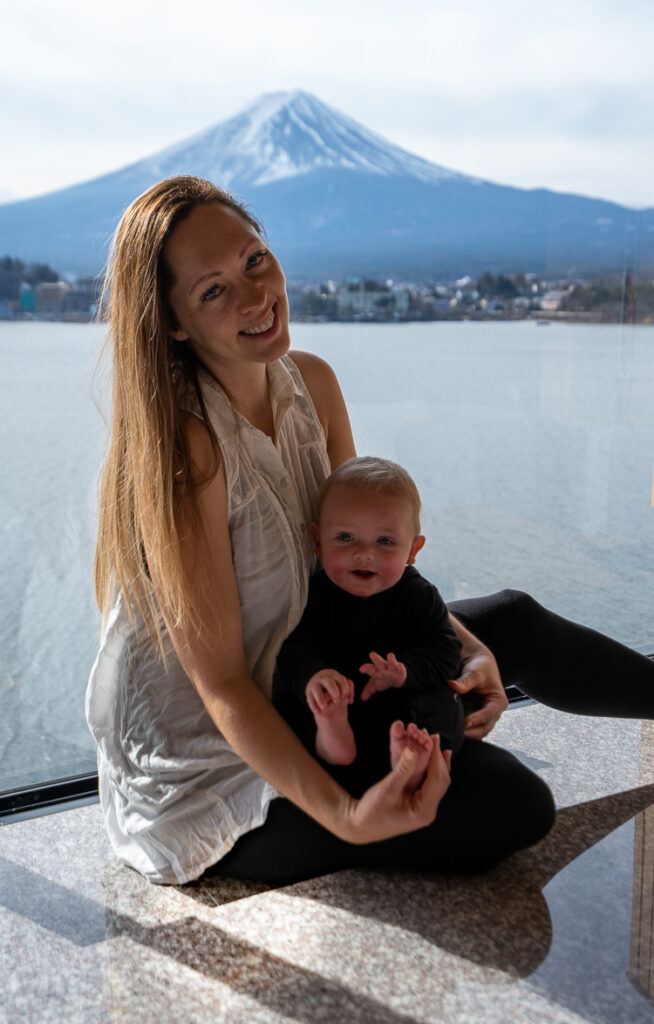
Getting to Kawaguchiko for us meant busing in from Mishima station via Nagoya en route from Takayama. For most visitors, it will probably mean coming from Tokyo. Here are the options:
From Tokyo Station: Fujikyu and JR Kanto Bus operate 1-2 direct buses hourly between Tokyo Station (Yaesu South Exit) and Kawaguchiko Station. The one way trip takes about two hours and costs ¥2000. Reserve a spot ahead of time.
From Shibuya station: Fujikyu operates approximately one bus every two hours between Shibuya, Fuji Q Highland, Kawaguchiko Station and Fujisan Station. Reserve a spot ahead of time.
From Shinjuku station: Take the JR Chuo Line from Tokyo’s Shinjuku Station to Otsuki Station (about 70-100 minutes depending on the line you take). From Otsuki, take the Fujikyu Railway Line to Kawaguchiko Station (55 minutes, ¥1170 one way).
There are also a few direct limited express trains per day between Shinjuku and Kawaguchiko in each direction (about 2 hours, around ¥4000 yen one way, seat reservations are mandatory).
Solo Female Travel in Japan
How to Get Around Lake Kawaguchi
Getting around Kawaguchiko is fairly simple and straightforward. From Kawaguchiko station, you’ll find buses going in just about every direction in the five lakes region, including around the lake in both directions. Amazingly, you can tap your credit card when getting off the bus to pay for fare, which made it so easy!
There is also a train from the same station that can take you to the Chureito Pagoda. Consider getting the Fuji Q highlands pass for local buses, or the Hakone pass for transport around the whole area, including the famous Hakone area, which also has stunning Mt. Fuji views and includes transport to and from Tokyo.
Lake Kawaguchi ended up being one of the highlights of our Japan trip for the beauty and relaxation. For those looking for a city escape from Tokyo, I can’t think of a better place!
*Some links in this post are affiliate links that support us at no extra cost to you when you purchase through them. We only recommend products we love and use ourselves. Your trust always comes first!
About Kristin Addis
Kristin Addis is the founder and CEO of Be My Travel Muse, a resource for female travelers all around the world since 2012. She's traveled solo to over 65 countries and has brought over 150 women on her all-female adventure tours from Botswana to the Alaskan tundra.
Leave a Reply Cancel reply
Your email address will not be published. Required fields are marked *
Save my name, email, and website in this browser for the next time I comment.
subscribe to our newsletter
This site uses Akismet to reduce spam. Learn how your comment data is processed .
05/17/2023 at 10:44 pm
Really have been enjoying your Japan posts and great one with Felix with Mt. Fuji in the background in this post. These photos are stunning and the whole experience in Japan is a big draw! Thanks for these posts (and recommendations on timing to go) and happy belated Mother’s Day!!!
Kristin says
05/19/2023 at 9:49 am
Thanks so much, I’m glad you’re enjoying them!
06/20/2023 at 1:30 pm
Very informative post! May I know how do you get from Ubuya hotel to Nagasaki Park in the north shore without a car? I’d love to minimize walking, if possible? Thank you!
07/01/2023 at 10:41 am
You can take a taxi or bus + walk
Not all functions are available due to JavaScript being disabled. To enable all functions, please enable JavaScript or use your browser's functions.
Skip to main content.
YAMANASHI Home of Mt.Fuji
- Yamanashi Area
- Fujisan and Fujigoko Area
- Otsuki and Linear Chuo Shinkansen Area
- Isawa Onsen, Koshu and Winery Area
- Kofu and Shosenkyo Gorge Area
- Yatsugatake Area
- Minami Alps and Kuonji Temple Area
- STAFF JOURNAL
- Medical net YAMANASHI
- Yamanashi Disaster Prevention Portal
Lake Kawaguchiko
Main content starts here.
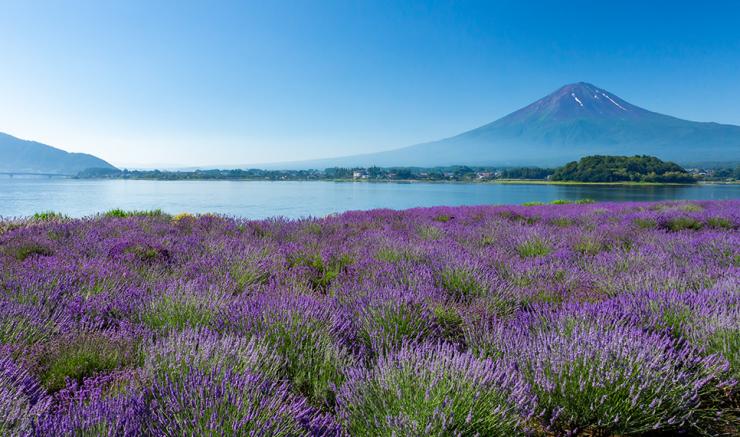
By far the most visited of the Fuji Five Lakes, Lake Kawaguchiko serves as the main point of entry to this famous lake region. It is the second largest of the Five Lakes in terms of surface area and the second most shallow with a depth of only 14.6 meters. It has a surface elevation of approximately 830 meters, which accounts for its relatively cool summers and icy winters. The area surrounding Lake Kawaguchiko is well-developed in terms of tourist infrastructure, with many lakeside hotels, hot springs, windsurfing facilities, campsites, and excursion boats. This makes it a popular weekend destination, with many visitors partaking in outdoor activities such as sports fishing, hiking, yachting, and cycling. Lake Kawaguchiko attracts especially many visitors in spring during cherry blossom season and in autumn when the fall foliage comes out in full force. From late June to mid-July, the lavender fields at Yagizaki Park and Oishi Park are the main draw. Unsurprisingly, the lake is popular with photographers––the observation deck at Tenjoyama Park and the middle of Kawaguchiko-Ohashi Bridge are favorite Mount Fuji photo spots––and is also a major hub for those looking to climb the sacred mountain during the summer months. Other nearby attractions include Fuji-Q Highland, Kawaguchiko Music Forest, and the Itchiku Kubota Art Museum. The museum is especially worth visiting for its quirky architecture and silk kimono displays.
Nature & Outdoors
- Attractions
- Fujisan (Mt. Fuji) and Fujigoko (Fuji Five Lakes) Area
Venue Address
Fujikawaguchiko-machi, Minamitsuru-gun
View on Google Maps
Explore More Uncover Venues
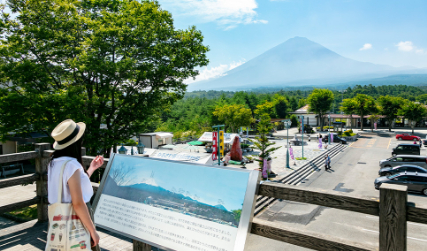
Mt. Fuji Observation Deck
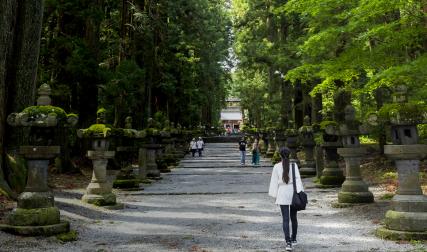
Kitaguchi Hongu Fuji Sengen Shrine
History & Culture
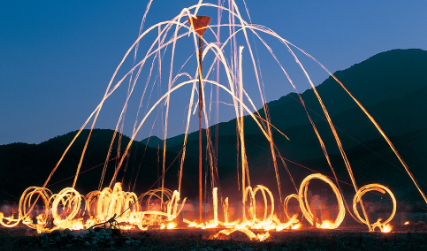
Nanbu Fire Festival
Events & Festivals
Home of Mt. Fuji > Uncover > Lake Kawaguchiko
YAMANASHI Home To Mt. Fuji
Yamanashi Tourism Organization
- Explore by area
- About Yamanashi
- Staff Journal
Part of this website uses machine translation.
Copyright © Yamanashi Tourism Organization All rights reserved.
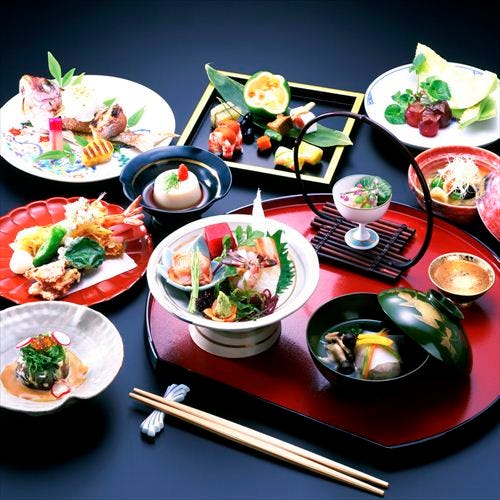
Mount Fuji Day Trip: Complete 1-Day Itinerary for Lake Kawaguchiko
Embarking on a Mount Fuji day trip offers the chance to enjoy Japan's tallest and most revered mountain up close. Mt. Fuji's magnificence draws numerous visitors from across the globe, making it a significant destination. The popularity of Mt. Fuji and its surrounding area of Lake Kawaguchiko continues to soar, with a steady rise in tourist numbers, reaching a staggering 4.5 million visitors in 2017 alone! Amidst this influx, first-time visitors may find it challenging to determine the best places to explore and the must-see sights. To assist in making these decisions, we have crafted the following itinerary, ensuring that day-trippers from Tokyo can fully immerse themselves in the wonders of the Lake Kawaguchiko region!
Overview of the Mt. Fuji Area
Perfect 1-day itinerary for lake kawaguchi, getting to mt. fuji: from shinjuku expressway bus terminal, shinjuku south exit 4th floor, boarding the sightseeing buses: 3 types of buses at lake kawaguchi station, book a mt. fuji tour.
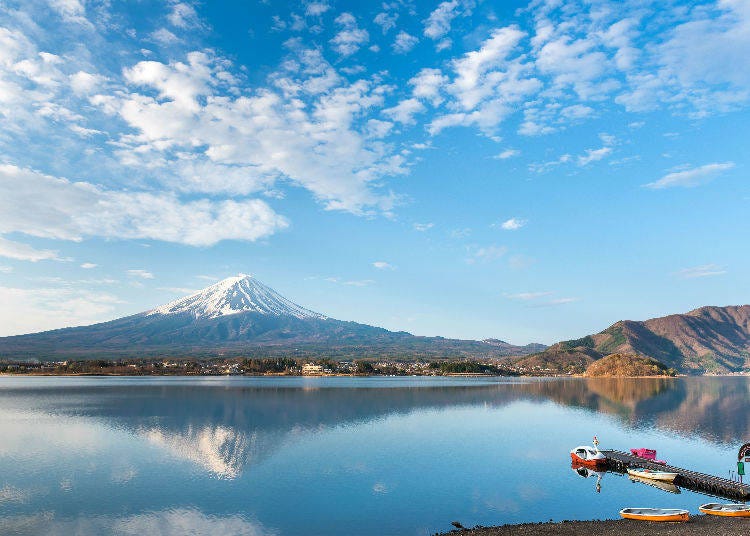
The Mt. Fuji Area: A Symbol of Japan's Beauty Throughout history, Mt. Fuji has stood as an iconic symbol of Japan, captivating the hearts of both the Japanese people and the world. Katsushika Hokusai's renowned series, Thirty-six Views of Mt. Fuji , not only influenced Japanese art but also introduced the legendary mountain to a global audience. As Japan's tallest peak, Mt. Fuji attracts numerous climbers annually. Its summit offers panoramic vistas of the Southern Alps, Izu Peninsula, and shimmering lakes , including the captivating Lake Kawaguchiko. Undoubtedly, it offers Japan's most awe-inspiring views, making it an unparalleled destination for experiencing the beauty of nature . The Enchanting Five Lakes of Mt. Fuji Nestled at the foot of Mt. Fuji are the five lakes that were formed during its last eruption: Lake Motosu , Lake Shoji , Lake Saiko , Lake Kawaguchiko , and Lake Yamanaka . Together, they are referred to as the Five Lakes of Mt. Fuji and were officially recognized as part of the Mt. Fuji Cultural World Heritage site in 2013. Among the five lakes , Lake Kawaguchi stands out for its timeless scenic beauty . In this area, visitors can enjoy attractions like Oishi Park , which provides breathtaking views of the lake and Mt. Fuji. The Kawaguchiko Music Forest Museum offers a remarkable collection of music boxes in a medieval European-style setting. Plus, nearby hot spring resorts offer a perfect chance to relax and soak in the stunning Mt. Fuji scenery.
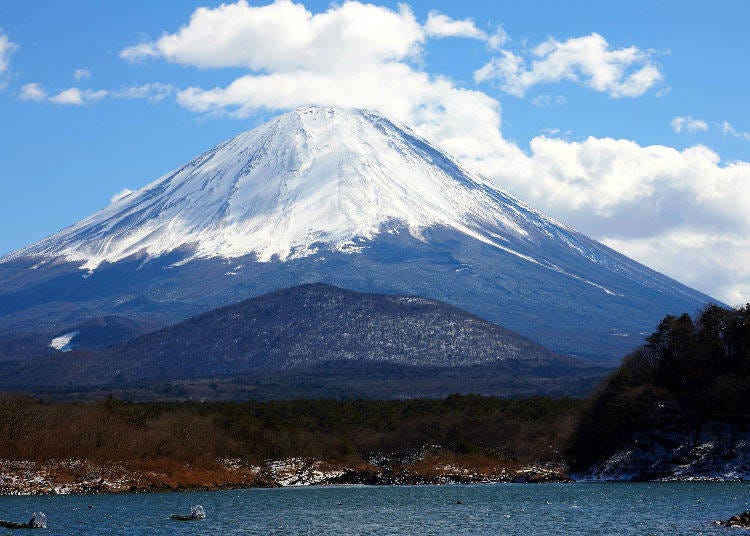
The Journey to World Heritage Status Before starting your Mt. Fuji adventure, let's explore how it became a World Heritage site . Japan joined the World Heritage Convention in 1992, and environmental groups in the Shizuoka and Yamanashi prefectures around Mt. Fuji began working to secure its natural heritage status. However, concerns about litter from climbers temporarily halted these efforts. In 2005, the two prefectures shifted their focus to emphasize the cultural significance of Mt. Fuji and established the Joint Council for its World Cultural Heritage Site registration. Through persistent public relations efforts by Yamanashi and Shizuoka, along with a commitment to managing waste, Mt. Fuji achieved cultural heritage status in 2013. Since then, it has embodied Japan's rich cultural heritage both in name and essence. Supporting the Legacy of Mt. Fuji Today, Mt. Fuji continues to receive unwavering support from Yamanashi and Shizuoka prefectures. When you embark on your Mt. Fuji journey, take a moment to acknowledge the efforts of the local municipalities, which are intertwined within its history. And as a responsible visitor, please ensure to carry away any litter you may have , leaving the mountain pristine for future generations to cherish.
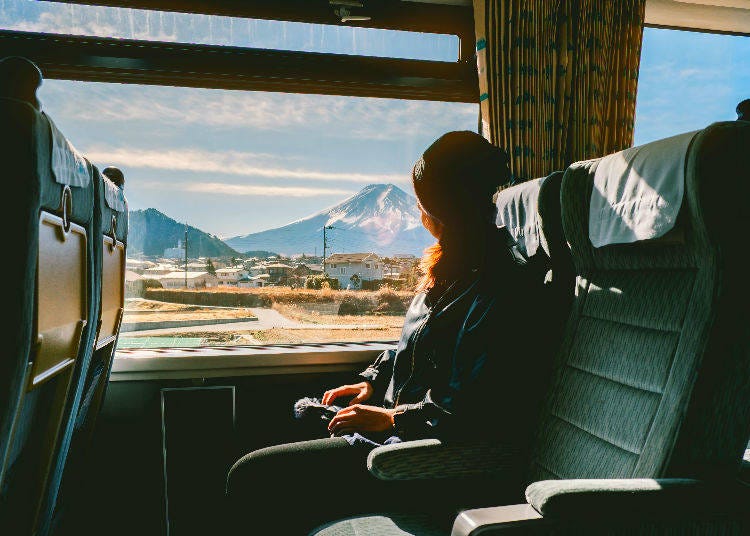
- Depart from Shinjuku Express Bus Terminal (Busta Shinjuku) South Exit, 4th floor at 8:45 AM.
- Arrive at Chuo Expressway Shimoyoshida Bus Stop at Arakurayama Sengen Park at 10:20 AM.
- Depart from Shimoyoshida Bus Stop at 11:00 AM.
- Arrive at Kawaguchiko Station , Houtou Fudou (in front of Kawaguchiko Station) at 11:17 AM.
- Depart from Kawaguchiko Station on the Saiko Sightseeing Bus (Green Line) at 12:10 PM.
- Arrive at Yagizaki Park at 12:22 PM.
- Depart from Yagizaki Park Station on the Saiko Sightseeing Bus (Green Line) at 1:22 PM.
- Arrive at Saiko Iyashi no Sato Nenba (Healing Village) at 1:50 PM.
- Depart from Saiko Iyashi no Sato Nenba (Healing Village) on the Saiko Sightseeing Bus (Green Line) at 2:50 PM.
- Arrive at Kawaguchiko Station and transfer to the Kawaguchiko Sightseeing Bus (Red Line) at 3:45 PM. Depart at 4:00 PM.
- Arrive at Mount Fuji Panoramic Ropeway at 4:11 PM.
- Depart from Mount Fuji Panoramic Ropeway Station on the Kawaguchiko Sightseeing Bus (Red Line) at 5:11 PM.
- Arrive at Kawaguchiko Station , Gateway Fujiyama (at Kawaguchiko Station)
- Return to Shinjuku Express Bus Terminal (Busta Shinjuku) South Exit, 4th floor.

(Depart: 8:45 AM) Upon exiting the south exit of Shinjuku Station, you'll find a four-story building directly ahead, known as the Shinjuku Expressway Bus Terminal. This is where our journey to Mt. Fuji begins. For our one-day excursion to Mt. Fuji today, we will board the Keio Bus Fuji Goko Line, bound for Lake Yamanaka, which departs promptly at 8:45 AM. Our first destination, Arakurayama Sengen Park , is expected to be reached at 10:20 AM. The one-way fare for this 90-minute trip is 1,950 yen. Considering factors such as complicated transfers and cost, the express bus from Shinjuku is widely regarded as the most convenient option for reaching Mt. Fuji. If, by any chance, you miss the scheduled bus departure, there's no need to worry. Apart from the Keio Bus, the Fuji Express Bus also travels to Mt. Fuji, ensuring a bus heads in that direction every 15 minutes. It would be best to ask at the counter about seat availability on the next bus and the possibility of boarding it. Also, if you arrive earlier than the departure time, you can use the waiting room within the bus terminal.
Arakurayama Sengen Park: Gorgeous Views of Mt. Fuji and the streets of Fuji City
(Depart Shinjuku Expressway Bus Terminal at 8:45 AM → Arrive at Chuo EXPWY Shimoyoshida bus stop at 10:20 AM)
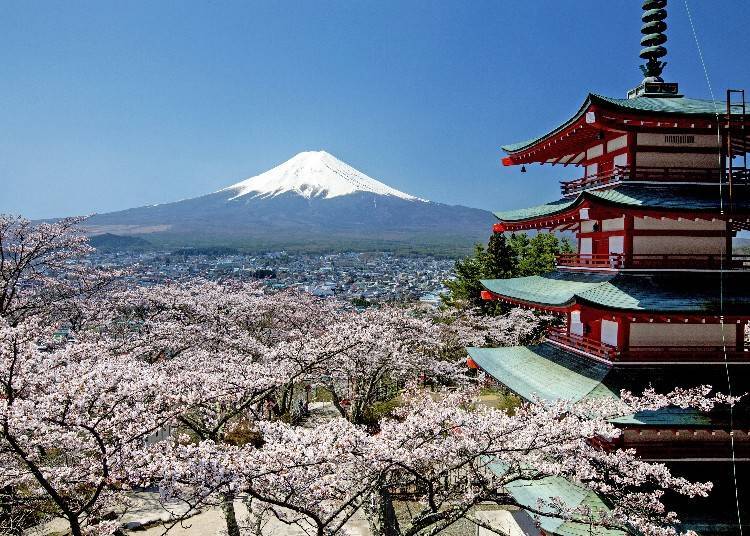
After around an hour and a half journey from Shinjuku , you will reach the Chuo EXPWY Shimo Yoshida bus stop, located in close proximity to Mt. Fuji, where you should disembark. From there, make your way to Arakurayama Sengen Park , offering a remarkable view of both Mt. Fuji and a five-storied pagoda. The park has become increasingly popular among international visitors who flock here to capture breathtaking photographs. Situated around 1 kilometer away from the bus stop, it takes approximately 20 minutes to ascend the gradual slope. As you approach the entrance of Arakurayama Sengen Park , you will pass under a vibrant red torii gate, leading you to the Arakura Fuji Sengen Shrine . Dating back over 1,000 years, the shrine has garnered fame for attracting devotees seeking divine protection from calamities, promoting family harmony, ensuring safe childbirth, and nurturing children. Upon entering the precincts, you will encounter stairs that lead to an observation deck. Scaling the 398 steps of the Sakuya Hime Kaidan, also known as the Blooming Princess Stairs, will bring you to the observation deck. Reaching the observation deck, you will be greeted by the Chureido Pagoda, nestled within Arakurayama Sengen Park . From this vantage point, you can relish panoramic views of the majestic Mt. Fuji, the sprawling streets of Fujiyoshida, and the picturesque five-storied pagoda. The vast landscape with Mt. Fuji as its centerpiece is captivating, often causing visitors to lose track of time. Additionally, the park boasts 650 Yoshino cherry trees, which create a stunning spectacle when they blossom in spring . The peak cherry blossom season generally falls around mid-April, later than Tokyo's cherry blossoms, making it a popular destination for those who missed the blooms in the city. For an enchanting experience combining cherry blossoms and the iconic presence of Mt. Fuji, Arakurayama Sengen Park is an ideal choice.
- Address 2-4-1 Asama, Fujiyoshida, Yamanashi 403-0011
・Telephone: 0555-21-1000 ・Open: 24 hours a day ・Fee: None ・Closed: Open daily
(Depart Shimoyoshida Station at 11 AM → Arrive at Lake Kawaguchi Station at 11:17 AM)
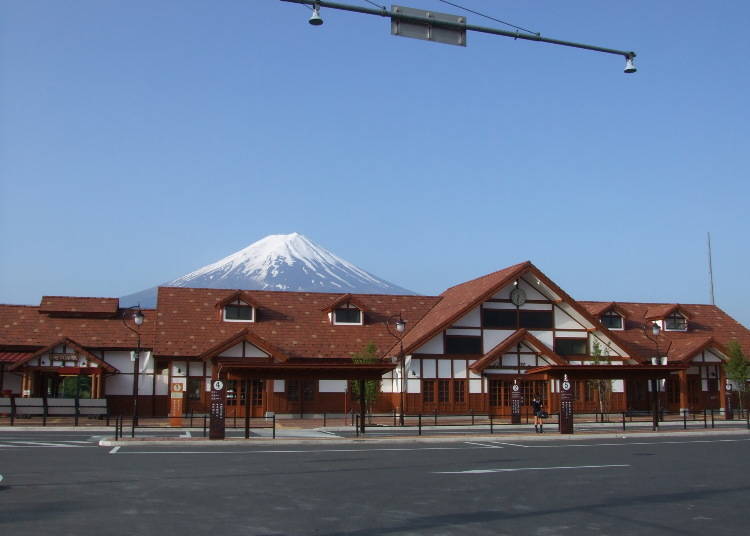
After reveling in the breathtaking view from Arakurayama Sengen Park , the next destination is Lake Kawaguchi Station. This time, you will utilize the Fuji Express Line. Board a local Fuji Express Line train heading to Lake Kawaguchi from Shimoyoshida Station, and in approximately 15 minutes, you will arrive at Kawaguchiko Station. The one-way fare for adults (12 years and older) is 300 yen, while children (between 6 and 12 years old) pay 120 yen. Upon reaching Kawaguchiko Station, it's time to decide how to proceed to your desired locations. From Kawaguchiko Station, you have various options to explore the area. You can visit the Mt. Fuji Panorama Ropeway, enjoy a Lake Kawaguchi Excursion Boat ride, explore the Music Box Forest , and visit the Lake Kawaguchi Museum of Art by taking the Kawaguchiko Sightseeing Bus (Red Line) . Alternatively, you can embark on the Narusawa/Shojiko/Motosuko Sightseeing Bus (Blue Line) to explore the surroundings of Lake Motosu. Another option is to hop on the Saiko Sightseeing Bus (Green Line) to visit Saiko Iyashi-no-Sato Nenba Traditional Japanese Village , Lake Saiko Bat Cave, Fugaku Wind Cave, and Lake Saiko Wild Bird Forest Park . Bus fares range from 150 yen to 1,280 yen, depending on the chosen route. If you plan to visit multiple sightseeing spots, consider purchasing the All Areas Coupon, allowing unlimited rides on all excursion buses for a two-day period. This convenient option saves you from paying individually for each bus ride and reduces travel expenses when exploring numerous attractions. The Adult Free Pass is priced at 1,500 yen, while children can avail it for 750 yen. Let's embark on the Saiko Sightseeing Bus (Green Line) to visit Yagizaki Park and Saiko Iyashi-no-Sato Nenba Traditional Japanese Village . Afterward, we can switch to the Kawaguchiko Sightseeing Bus (Red Line) to reach the Mt. Fuji Panoramic Ropeway, continuing our delightful exploration of the area.
- Address 3641 Funatsu, Minamitsuru-gun, Fujikawaguchiko-machi, Yamanashi, 401-0301
- Phone Number 0555-72-001
・Hours: 6:40 AM to 10:10 PM ・Fare: Depends on the route ・Closed: Open daily
Houtou Futo (Kawaguchiko Ekimae Shop): Popular for its miso soup loaded with delicious ingredients
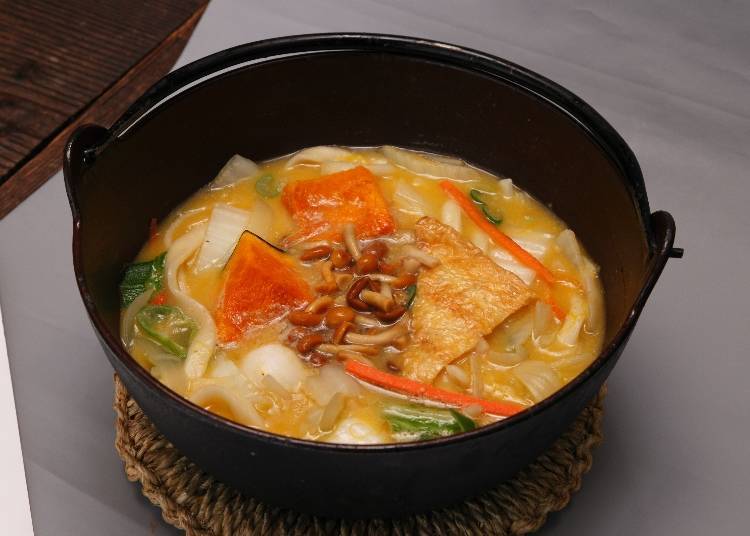
There's more to indulge in than just the awe-inspiring view of Mt. Fuji and exploring the sights around Lake Kawaguchi. The area is also home to numerous delightful dining establishments. One of these culinary gems is the renowned Houtou Futo, conveniently located near Kawaguchiko Station. The shop's signature dish is the Hoto (1,100 yen, tax included), a delectable miso-based soup brimming with locally sourced ingredients cultivated near the foothills of Mt. Fuji, accompanied by hearty, firm-textured noodles. A single sip of this steaming hot soup, infused with the flavorsome essence of the ingredients, is enough to rejuvenate and revitalize you after a morning of activities. In addition to their famous Hoto, Houtou Futo offers an array of other enticing dishes. Delve into the flavors of Japanese cuisine with basashi (thinly sliced raw horse meat) or savor the Kokuto Taki Inari, a delightful combination of flavored boiled rice wrapped in fried bean curd. Don't miss the aburaage (fried bean curd) cooked in brown sugar, lending it a delightful sweetness. Give any of these dishes a try, and I'm confident you will relish the delightful flavors they offer.
- Address 3631-2 Funatsu, Minamitsurugun, Fujikawaguchikomachi, Yamanashi, 401-0301
- Phone Number 0555-72-5560
・Open: 11 AM to 7 PM (If you plan to visit after 4 PM on a weekday, please call the shop in advance to confirm the closing time.) ・Prices: Fudo Hoto (1,080 yen, tax included); Basashi (1,080 yen, tax included); Kokto Taki Inari (432 yen, tax included) ・Closed: Open daily
Yagizaki Park: Spectacular views of lavender blooming with Mt. Fuji in the background
(Depart Kawaguchiko Station at 12:10 PM → arrive at Yagizaki Park at 12:22 PM) (Saiko Sightseeing Bus)
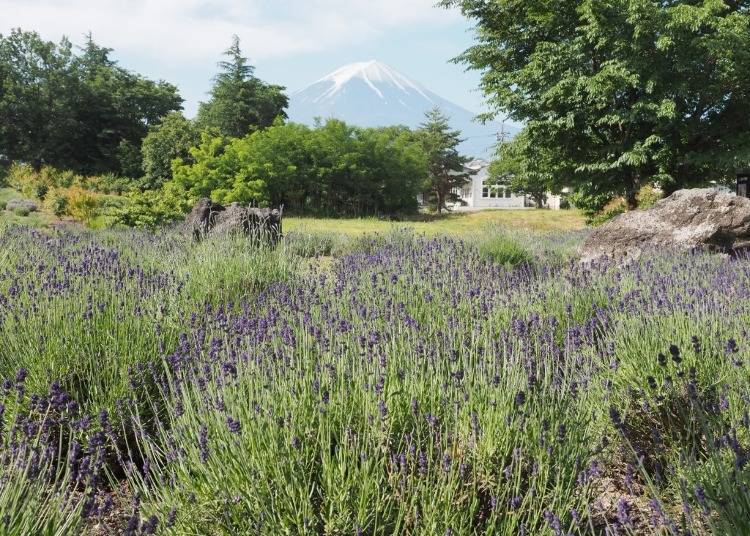
After enjoying a relaxing break at Hoto, our next destination is Yagizaki Park , renowned in the prefecture for its abundant wild bird population. From Kawaguchiko Station, board the Saiko Sightseeing Bus (Green Line) for a delightful 12-minute journey, disembarking at Yagizaki Park . The one-way fare is 150 yen. A pleasant 3-minute walk from the bus stop will lead you to Yagizaki Park . Nestled along the southern coast of Lake Kawaguchi, Yagizaki Park presents a picturesque vista of the Misaka Mountains and the captivating shoreline of the lake stretching before you. The park features an array of shrubs and plants, including lavender, enhancing the scenic allure with the majestic presence of Mt. Fuji in the distance. It's a perfect spot for a leisurely stroll after a satisfying meal. Every year, from June to July, Yagizaki Park hosts the Herb Festival , transforming the surroundings into a splendid purple carpet as the lavender blooms. This captivating sight adds yet another enchanting dimension to the panoramic view of Mt. Fuji, creating a truly mesmerizing experience.
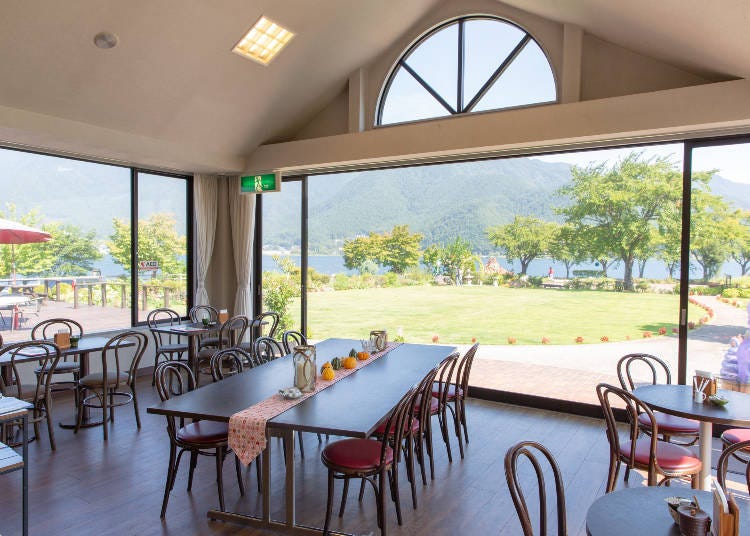
On the western side of the park , you will find the Kawaguchiko Muse Museum - Yuki Atae Hall, showcasing the exquisite artistic creations of renowned doll maker Mr. Yuki Atae. The museum features a permanent exhibition displaying over one hundred dolls meticulously crafted by Mr. Yuki Atae. At different times, the museum also hosts various other captivating displays. Additionally, the museum houses a delightful shop where you can purchase postcards featuring the showcased items and other merchandise like card cases. If you're in the mood for some refreshments, the Doll Cafe offers a delightful culinary experience, serving hearty dishes, delectable desserts, and a selection of alcoholic beverages.
- Address 897-1 Kodachi, Minamitsurugun, Fujikawaguchiko-machi, Yamanashi, 401-0302
- Phone Number 0555-72-1976
・Open: 24 hours a day ・Fee: No charge ・Closed: Open daily
- Address 923 Odachi, Minamitsuru-gun, Fujikawaguchiko-machi, Yamanashi, 401-0302
- Phone Number 0555-72-5258
・Open: 9 AM to 5 PM (Admission until 4:30 PM) ・Admission Fee: - General/University students: 600 yen (540 yen for groups of 8 or more) - Junior and Senior High School students: 400 yen (360 yen for groups of 8 or more) - Free for elementary school age and younger - Half-price admission for those with disability cards ・Closed: Every Thursday from December to March ・Exhibition Change Dates: March, September, and year-end
Saiko Iyashi-no-Sato Nenba: Experience the Charm of a Traditional Japanese Farming Village
(Leave Yagizaki Park at 1:22 PM → Reach Saiko Iyashi no Sato Nenba (Healing Village ) at 1:50 PM)
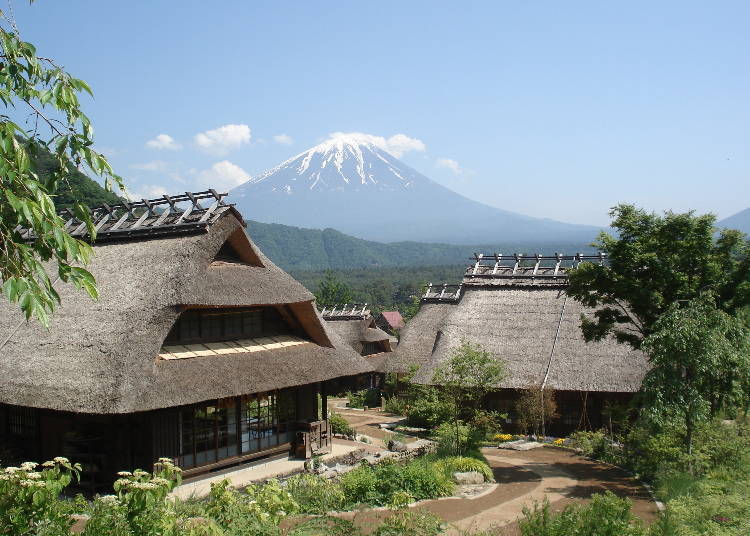
After immersing yourself in the natural beauty of Yagizaki Park , the next stop is the captivating Saiko Iyashi-no-Sato Nenba Traditional Japanese Village . Board the Saiko Sightseeing Bus (Green Line) once again at Yagizaki Park , and after a scenic 28-minute ride, you will arrive at Lake Saiko. The one-way fare for this leg of the journey is 520 yen. Saiko Iyashi-no-Sato Nenba is a meticulously recreated traditional Japanese village , featuring thatch-roofed farmhouses that transport visitors back in time. Established 52 years ago, this village showcases several authentic thatch-roofed farmhouses built in a distinctive style known as Kabuto-zukuri, resembling a samurai's helmet when viewed from the side. This architectural style was once prevalent in the region until a typhoon in 1966 devastated the area, causing the original farmhouses to vanish. Today, it is a rare opportunity to witness faithfully reconstructed traditional farmhouses like the ones found at Saiko Iyashi-no-Sato Nenba Traditional Japanese Village , as they have become scarce in other parts of Japan.
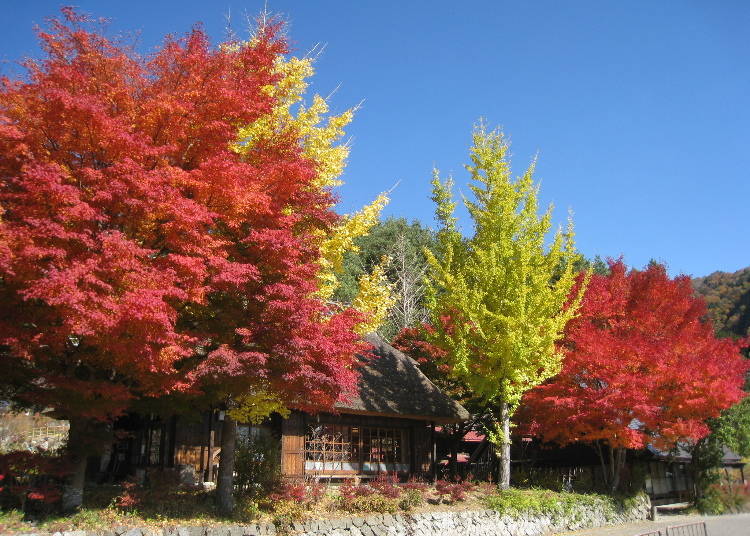
Each building within the village showcases its own distinctive characteristics. For instance, there is the Tokusanhin Kakojo (Special Products Processing Plant), offering locally produced wine and sake. The Omoideya (House of Memories) provides a nostalgic experience, while the Shokuji/Kanmi Saiun (Food and Sweets Saiun) is perfect for enjoying light meals and tea. At the Sabo Shiryokan (Erosion Control Museum ), you can learn about disaster prevention, and the Tsuchi Asobi Fuji Roman Kama (Ceramics Experience) allows you to try your hand at various handicrafts. Moreover, Saiko Iyashi-no-Sato Nenba Traditional Japanese Village provides a unique opportunity to capture the majestic backdrop of Mt. Fuji alongside these charming traditional farmhouses. It is the perfect setting for capturing memorable photos during your visit.
- Address 2710 Saiko Nenba, Minamitsuru-gun, Fujikawaguchiko-machi, Yamanashi, 401-0332
- Phone Number 0555-20-4677
・Open: - March to November: 9 AM to 5 PM (Last admission at 4:30 PM) - December to February: 9:30 AM to 4:30 PM (Last admission at 4 PM) ・Admission Fee: - Adults (high school age and above): 350 yen (300 yen for groups of 20 or more) - Children (junior high school age and below): 150 yen (100 yen for groups of 20 or more) - Adults with disabilities: 150 yen - Children with disabilities: 50 yen (Please present a disability card at the admission counter.) ・Closed: Open year-round (*Occasional unscheduled closures may occur)
Mt. Fuji Panoramic Ropeway: Experience the Breathtaking Panorama from 1,075 Meters Above!
(Leave Saiko Iyashi-no-Sato Nemba Stop at 2:50 PM → Reach Lake Kawaguchiko Station at 3:45 PM → Depart Lake Kawaguchiko Station at 4 PM → Arrive at Mt. Fuji Panoramic Ropeway at 4:11 PM)
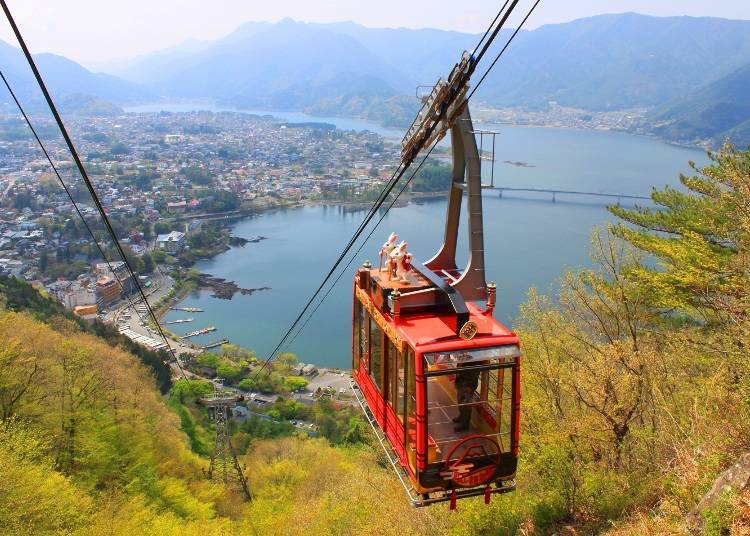
Once you've soaked in the charming atmosphere of an old Japanese village at Saiko Iyashi-no-Sato Nenba Traditional Japanese Village , our next destination is the Mt. Fuji Panoramic Ropeway. To return to Kawaguchiko Station, we'll hop on the Saiko Sightseeing Bus (Green Line) for a 35-minute journey (700 yen one way). Upon reaching Kawaguchiko Station, we'll then board the Kawaguchiko Sightseeing Bus (Red Line) for a 10-minute trip (150 yen one way) to the Excursion Boat and Ropeway Entrance. After reaching the entrance, we'll take the ropeway to the mountain 's summit. From the observation deck situated at the peak, which stands at an altitude of 1075 meters, you'll be greeted with a breathtaking panoramic view if the weather permits. This magnificent vista encompasses Mt. Fuji, Lake Kawaguchi, as well as the Southern Alps' Mt. Akaishi and Mt. Arakawa. During autumn , the mountain 's trees adorned with crimson leaves create a captivating spectacle alongside Mt. Fuji and the surrounding shores of Lake Kawaguchi. While there are various spots in the area to appreciate the beauty of Mt. Fuji, this particular location offers a unique advantage—the only 360-degree panoramic view available.
- Address 1163-1 Asakawa, Minamitsuru-gun, Fujikawaguchiko-machi, Yamanashi, 401-0303
- Phone Number 0555-72-0363
・Hours: - Normal times: 9 AM to 5:20 PM (Last trip up at 5 PM) - Winter season (December 1 to February 28): 9:30 AM to 4:40 PM (Last trip up at 4:20 PM) ・Fares: Individuals: - Adult: Round trip 800 yen (400 yen); one-way 450 yen (230 yen) - Child: Round trip 400 yen (200 yen); one-way 230 yen (120 yen) *Fares in ( ) are for the disabled Groups (15 or more people): - Group Adult: Round trip 720 yen; one-way 410 yen - Group Child (Elementary school age and younger): Round trip 360 yen; one-way 210 yen - Student Adult: Round trip 640 yen; one-way 360 yen - Student Child: Round trip 320 yen; one-way 190 yen ・Closed: Open year-round (*Occasional unscheduled closures due to weather conditions.) Light meals and souvenirs are available at the Tanuki Jaya.
- Address 1163−1 Asakawa, Minamitsuru-gun, Fujikawaguchiko-machi, Yamanashi, 401-0303
・Hours: 9 AM to 4:30 PM ・Prices: Snacks and drinks are approximately 500 yen each. ・Prices: Souvenirs - Mini Osembei: 550 yen (tax included) - Osembei: 400 yen (tax included) - Gondola-shaped Fujiyama Cookie: 700 yen (tax included) - Usagi Jinja Omamori: 620 yen (tax included) - Tobidashi Mascot: 380 yen (tax included) - Frame Magnet: 270 yen (tax included) - Ema [Votive picture] for fulfillment of love: 410 yen (tax included) - Ema for family well-being: 410 yen (tax included) - Mt. Fuji Pilgrimage Ticket: 500 yen (tax included) - Lake Kawaguchi ~ Mt. Fuji Panoramic Ropeway Limited Edition Medallion: 200 yen (tax included) ・Closed: Open year-round (*Occasional unscheduled closures may occur)
Gateway Fujiyama Lake Kawaguchi: Perfect souvenirs of your sightseeing around Mt. Fuji and Lake Kawaguchi
(Leave Fuji Panoramic Ropeway at 5:11 PM → Reach Kawaguchiko Station)
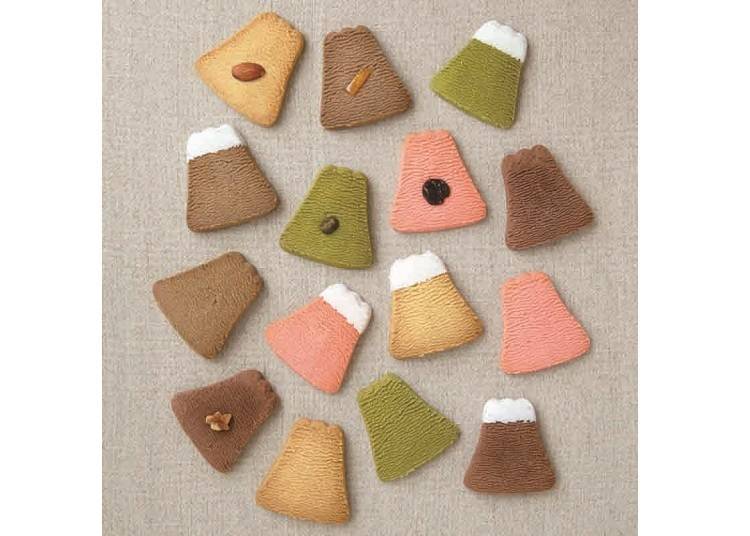
As we leave the Mt. Fuji Panoramic Ropeway, our day trip to the Kawaguchiko area and its spectacular scenery draws to a close. We board the Kawaguchiko Sightseeing Bus (Red Line) (150 yen one way) and return to Kawaguchiko Station.
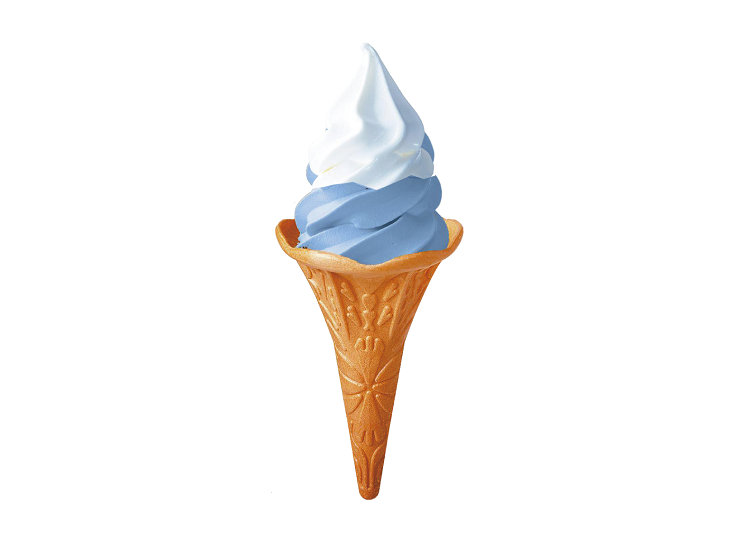
Before we depart from Kawaguchiko Station and head back to Shinjuku , we have one final opportunity for shopping. Gateway Fujiyama Lake Kawaguchi is an antenna shop that boasts a wide array of locally renowned products and souvenirs. Among them, the Fujiyama Cookie, shaped like the iconic Mt. Fuji, holds particular appeal for tourists. This delectable treat is crafted using Japanese flour, honey sourced from Mt. Fuji, cheese, and other carefully selected ingredients, resulting in a beautifully baked cookie. Its exquisite flavor lingers with each bite, leaving a delightful taste in your mouth. The cookie's charming depiction of Mt. Fuji, combined with its aromatic texture and taste, contribute to its immense popularity. Within the same establishment, you'll find the Fujiyama Cafe , a section dedicated to rustic cuisine and beverages prepared with locally sourced ingredients. Here, you can savor the specialty of the region, Yoshida Udon (650 yen, tax included), a country-style noodle dish. Additionally, you can indulge in Fujiyama Soft (370 yen, tax included), a double-layered soft ice cream cone designed to reflect the vibrant colors of Mt. Fuji.
- Phone Number 0555-72-2214
・Open: Monday-Friday: 9 AM - 6 PM; Saturday & Holidays: 9 AM - 7 PM ; Sunday: 8 AM - 7 PM ・Prices: Vary depending on the product. ・Closed: Open year-round from July to September; Unscheduled holidays from October to June.
Experience the wonders of Mt. Fuji like never before by booking a Mt. Fuji Tour! For visitors who prefer a guided experience over a self-directed one, these tours offer a fantastic opportunity to explore the iconic mountain with the expertise and insights of knowledgeable guides. Sit back, relax, and let the professionals take care of all the logistics while you immerse yourself in the breathtaking scenery and rich history of Mt. Fuji.
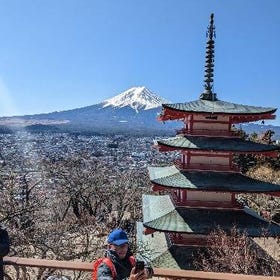
Written by Tomoya Nakazawa
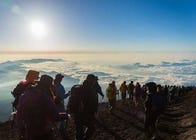
- Area Mt. Fuji
- Category Forests & Mountains
- How To: Visiting Popular Spots
Share this article.
Limited time offer: 10% discount coupons available now!
Recommended places for you.
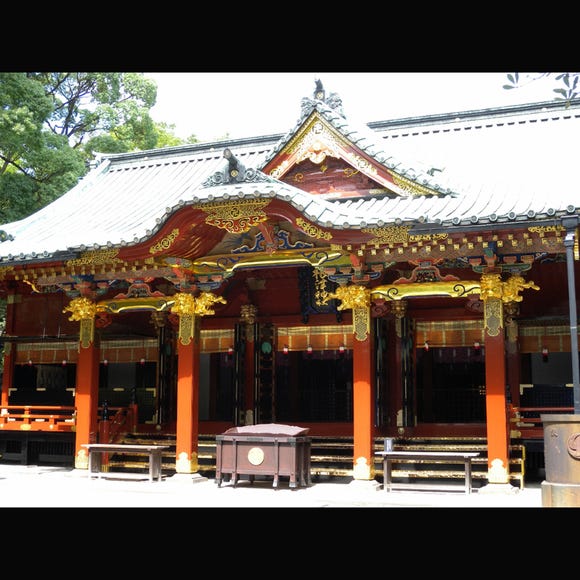
Nezu Shrine

TOKYO SKYTREE®
Ryogoku / TOKYO SKYTREE(R)
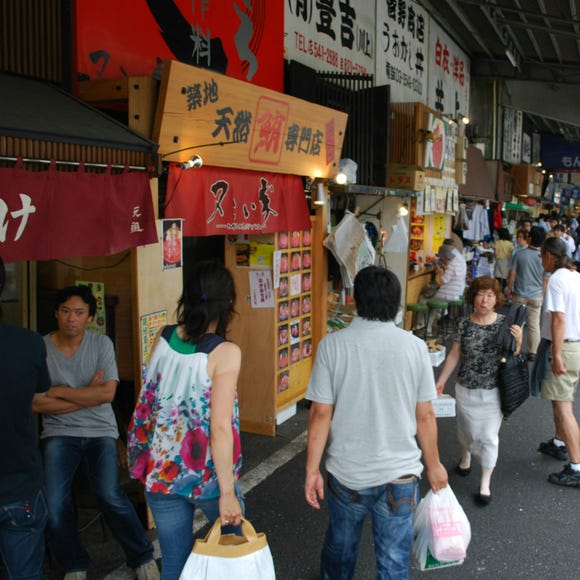
Tsukiji Outer Market
Old Towns (Shitamachi)

Tokyo Tower
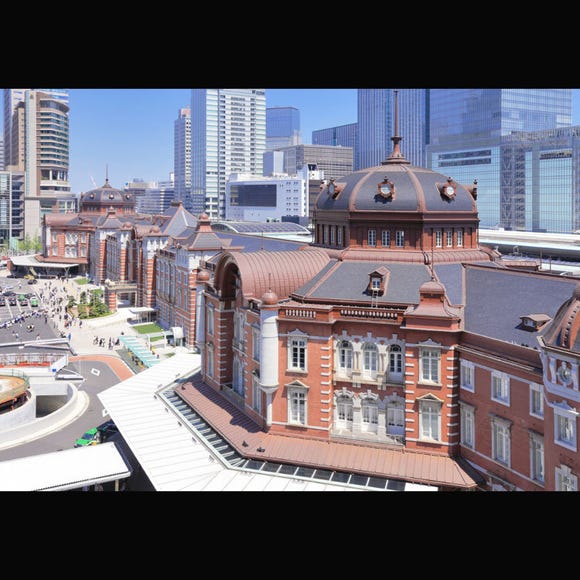
The Tokyo Station Marunouchi Building
Tokyo Station

Senso-ji Temple
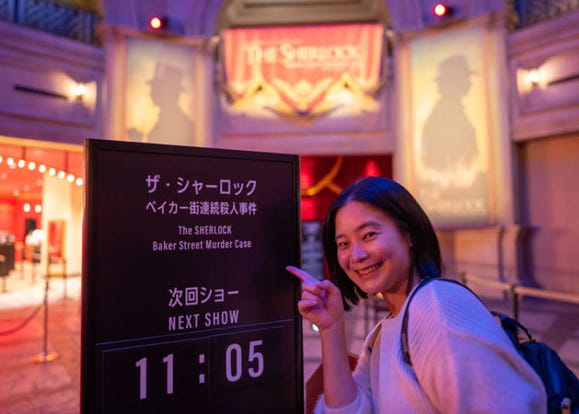
Step Into the Story: Inside Immersive Fort Tokyo
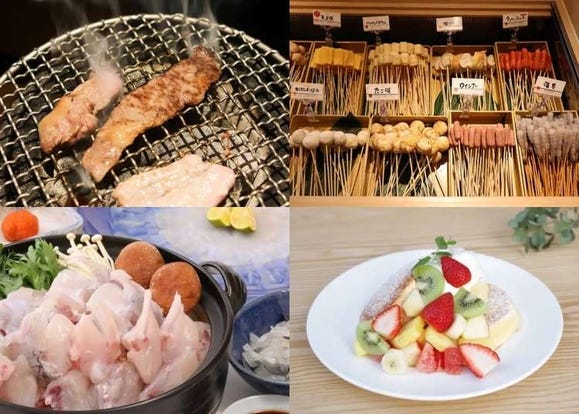
15 Must-Try Restaurants in Ikebukuro: From Aged Yakiniku to All-You-Can-Eat Sushi, Plus Adorable Animal Cafés
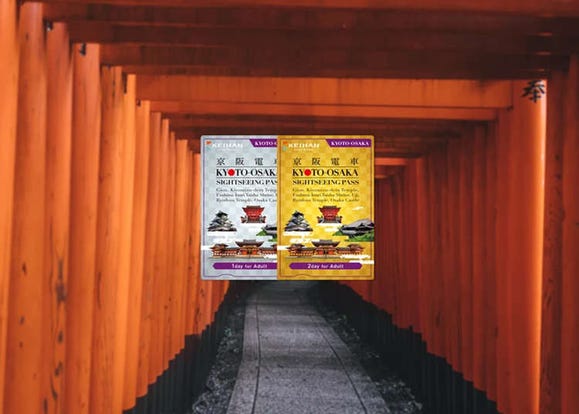
Everything You Need To Know About the Kyoto-Osaka Sightseeing Pass
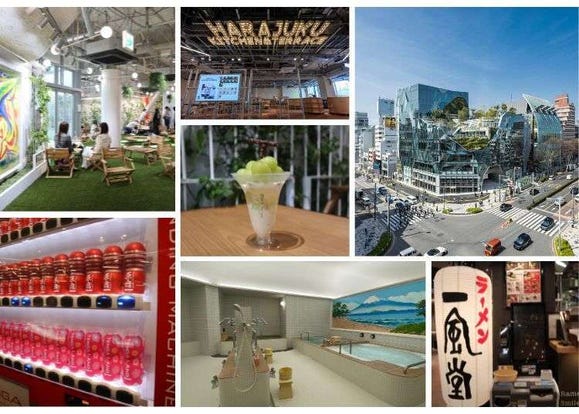
Opened in Spring 2024! What to do at Tokyu Plaza Harajuku Harakado
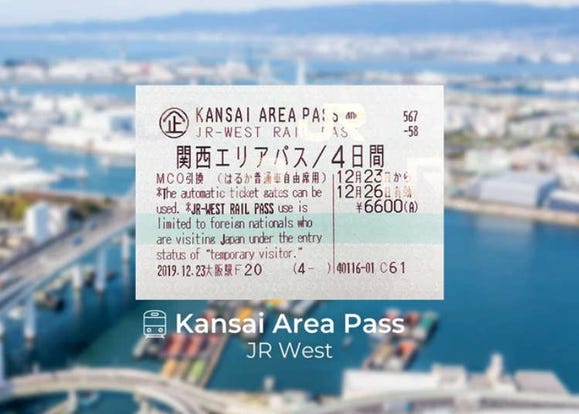
A Complete Guide to the JR West Kansai Area Pass

Tokyo Summer 2024: Snooze with Snorlax in a Pokémon Sleep Suite!
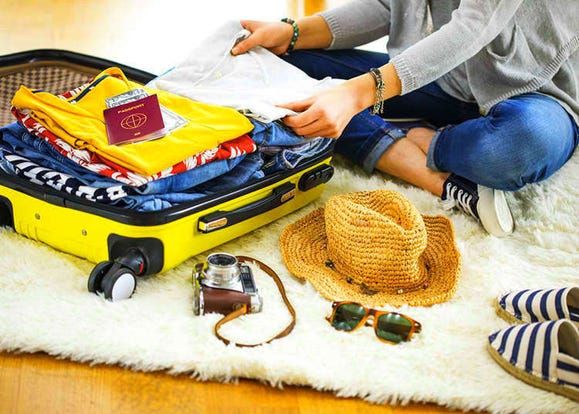
What to Pack for Japan: 8 Essential Things for a Hassle-Free Trip
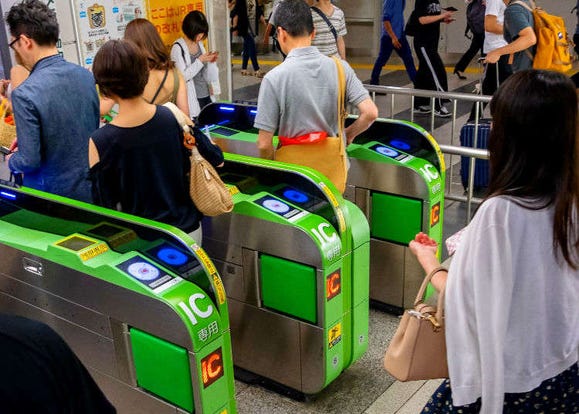
JR Edition: Visit all of Tokyo in one Day with the Tokyo Metropolitan District Pass!
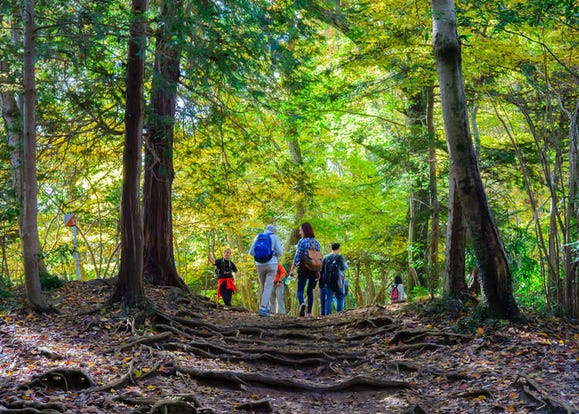
Day Hiking Near Tokyo: 6 Easy Hikes You Can Do While Visiting Japan
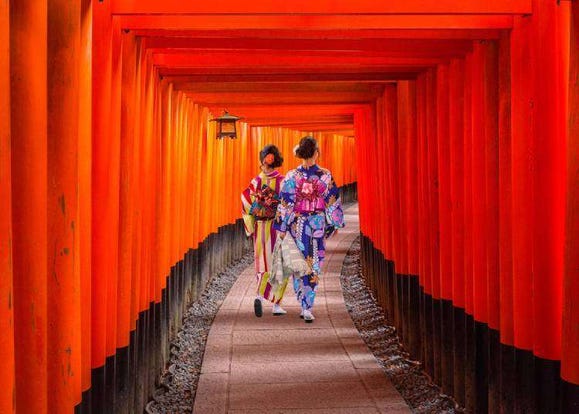
10 Major Cities in Japan: Which One Should Top Your Bucket List?
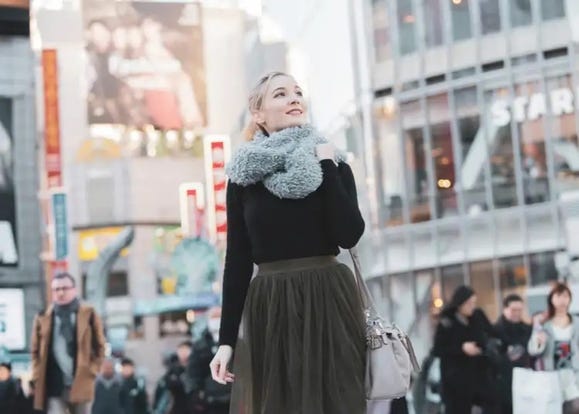
Secrets to Shopping in Japan: Guide to Annual Sales in Japan & Where to Shop
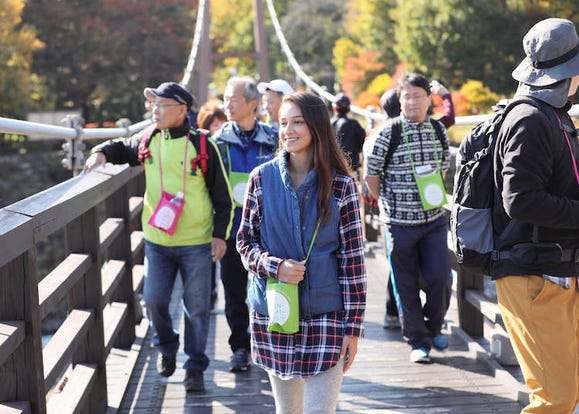
Explore, Eat, Relax - Welcome to the World of Onsen Gastronomy! Travel Japan's countryside, expand your culinary horizons, and soak in sumptuous hot springs
- #best ramen tokyo
- #what to buy in ameyoko
- #what to bring to japan
- #new years in tokyo
- #best izakaya shinjuku
- #things to do tokyo
- #japanese nail trends
- #what to do in odaiba
- #onsen tattoo friendly tokyo
- #best sushi ginza
- #japanese convenience store snacks
- #best yakiniku shibuya
- #japanese fashion culture
- #best japanese soft drinks

Exploring Fuji Five Lakes: 3 Days in Kawaguchiko Guide
A short journey from Tokyo will lead you to the foothills of Mount Fuji, where the captivating Fuji Five Lakes region awaits. Exploring the five stunning lakes and their breathtaking views of Mount Fuji during our 3 days in Kawaguchiko was one of the highlights of my most recent Japan trip.
In this guide, I cover all you need to know about exploring Fuji Five Lakes, including the ultimate Fuji Five Lakes itinerary. From all you need to know to get around, to an optimised 3 day itinerary to cover the best of the region (plus some lesser-known gems!). This travel guide has all you need to know to plan your own unforgettable adventure in this remarkable corner of Japan.
Table of Contents
About the Fuji Five Lakes Area
Fuji Five Lakes is arguably the best place to view Mt Fuji from – it felt like every corner I turned, Fujisan was there standing tall in all it’s glory.
Unsurprisingly, the Fuji Five Lakes area is made up of, yep you guessed it – five lakes!
The area comprises five lakes: Lake Kawaguchiko, Saiko, Yamanakako, Shojiko, and Motosuko. These lakes all offer stunning views of Mount Fuji.
Most visitors to the area stay in Kawaguchiko, as it is the most developed and accessible for tourists. Lake Yamanakako is the largest of the five Fuji lakes and has a small number of accommodation lodgings.

How Long to Spend in Fuji Five Lakes
I’d recommend spending at least 2 nights in Kawaguchiko.
In April 2023, I stayed 3 nights which was a decent amount of time, though we still left with a few activities and sights we didn’t quite manage to fit in!
It’s also possible to explore Fuji Five Lakes on a day trip from Tokyo.
Some popular tour options are included below which explore the main sights near Kawaguchiko. However, if you have the time, I highly recommend spending at least a couple of nights in Kawaguchiko.
Day Tours from Tokyo
These are the most popular day tours from Tokyo to Kawaguchi
- Scenic 1 Day Tour: Chureito Pagoda, Oishi Park & Lake Saiko Traditional Village
- Mt Fuji Sightseeing Trip: Oishi Park, Chureito Pagoda, Fuji Fifth Station & Oshino Hakkai
- Private Customisable Day Trip from Tokyo (up to 5 People)
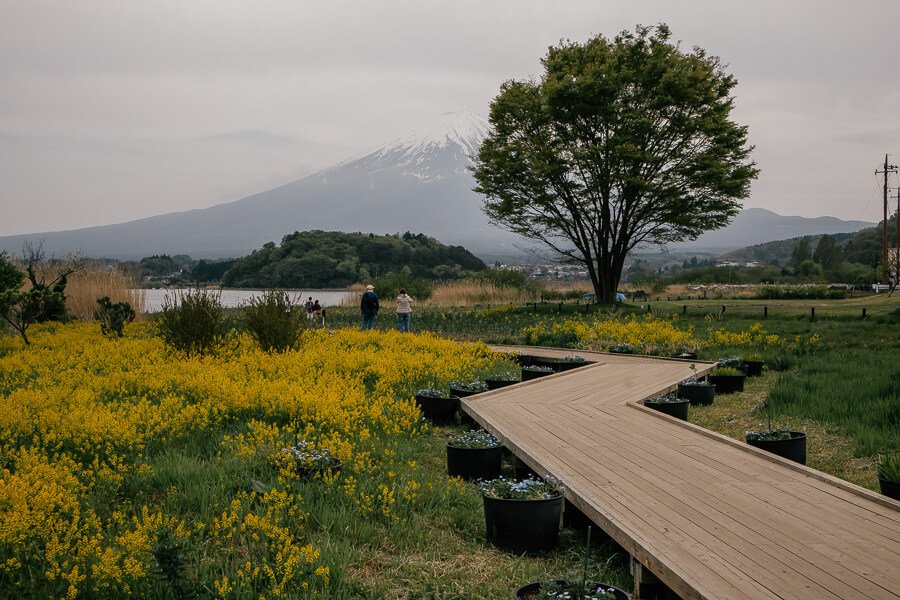
Best Time to Visit
You can visit the Fuji Five Lakes area all year round, however, the best time to visit for clear views of Mount Fuji is between November to April.
As Japan has a hot and humid summer, there are more often clouds to obstruct the view. This is why I’d recommend spending at least a few days in Kawaguchiko, to give you the best chance of seeing Mount Fuji on a clear morning.
During our 3 night, 4 day stay in Fuji Five Lakes in April, we had clear views for three of those. One morning we woke up and we couldn’t even see Mount Fuji as it was heavily obscured by clouds!
Cherry blossom season in early-mid April is a very popular time to visit – while it’s beautiful to see Mount Fuji framed by cherry blossoms , it’s also extremely busy.
Read my dedicated guide for the best viewpoints of Mount Fuji .

Where to Stay
Following my itinerary, you’ll base yourself around Kawaguchiko. For stays longer than three nights, you could consider spending a night or two at Yamanakako.
- Budget – Hostel Michikusa : this small, family-run guest house was wonderful. We booked the private tatami mat triple room with a Mount Fuji view. It was incredible waking up to see Mount Fuji each morning. There is a small common area and modern, clean shared bathrooms.
- Mid-Range – Fuji View Hotel : Overlooking Lake Kawaguchi, this hotel is surrounded by Japanese gardens and has a public onsen (hot spring bath).
- Luxury – La Vista : A short walk from the lake, this hotel offers rooms with clear views across to Mount Fuji plus a sauna, hot tub and onsen hot spring bath.
Explore all accommodation options in Kawaguchiko
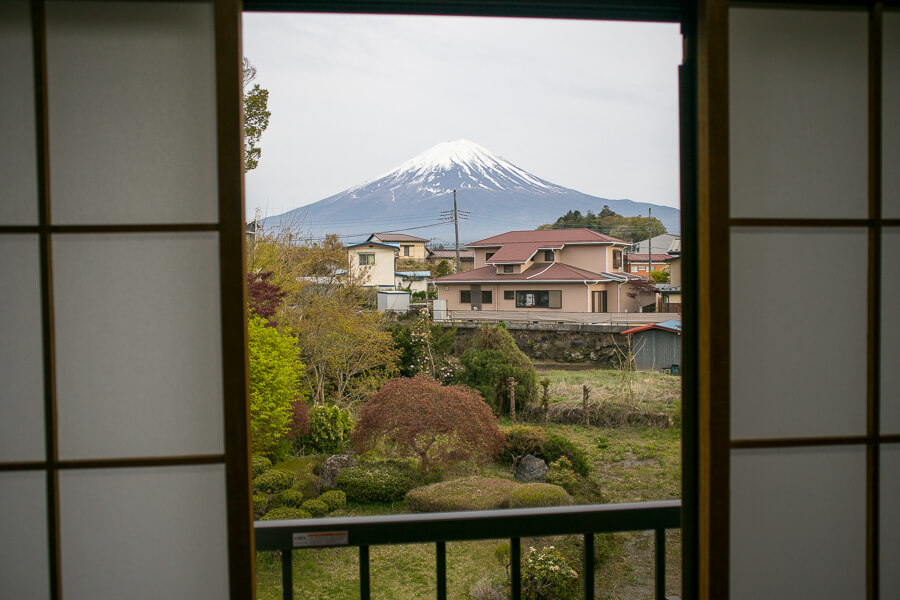
Where to Eat
Below are my tried and tested recommendations from our trip:
- Tanpopo : Unique family-run izakaya where the wife speaks to you via a hand-held translator. There are no menus and they serve you fresh seasonal local cuisine! Bookings required.
- Kosaku : A busy restaurant serving the regional specialty, Houtou noodles. Word of warning, the seating is traditional tatami mat style so wear stretchy clothes!
- FabCafe Fuji : A great coffee spot after a visit to the nearby Chureito Pagoda
- Ramen Kaneyuki : One of the few ramen restaurants in the middle of town. Meals are served in this casual, open-air restaurant out of a food truck.

After a few long days exploring and eating lunch out, we had some quick, easy and tasty grab-and-go dinner meals from the Ogino supermarket in town which we ate at our guesthouse.
How to Get to Fuji Five Lakes from Tokyo
Getting to Fuji Five Lakes from Tokyo is straightforward. I found it easiest (and cheapest!) to get the direct highway coach bus, but you can also catch the train.
I booked the highway bus from Tokyo Station to Kawaguchiko Station (buses also depart from Shinjuku Station). The bus travels directly between the two stations, with no transfers required and takes around 2 hours.
I purchased our tickets with Fujikyu Bus from Japan Bus Online and simply showed the driver our electronic tickets when boarding. This cost ¥2,060 per adult (2023 pricing).
By Train
Catching the train to Kawaguchiko will usually require at least one transfer .
Catch the JR Chuo Line from Shinjuku Station to Otsuki Station, and transfer to the Fujikyu Line to Kawaguchiko Station. This takes around 2 – 2.5 hours and costs ¥3,530 on the Limited Express train from Shinjuku.
There are also limited departures a day on a direct train which varies in length, depending on whether it is a Limited Express. It’s pretty easy to work out the best option, as both bus and train times and routes are synced into Google Maps.
In summary, getting the highway bus is often the cheapest and quickest route . Book your tickets a few days in advance, especially if travelling during peak periods.
How to Get Around Kawaguchiko and Fuji Five Lakes
The easiest way to get around the Fuji Five Lakes area is by rental car, especially if you’re planning to visit the other lakes or other attractions.
It’s also possible to get around by bus, but as we wanted to visit some attractions early in the morning and visit the other lakes, we decided for the convenience it was worth the cost to hire a car for our 3 days in Kawaguchiko.
Renting a Car in Kawaguchiko
We hired a car from Toyota Rent a Car near Kawaguchiko Station, however, the booking form was in Japanese which was quite challenging and a bit convulated to navigate. Step by step instructions are available here if you’d like to give it a go.
For an easier option, you can book a rental using Rental Cars with pick up from Mt Fuji Station / Fujiyoshida Station (as shown in the image below), which is only one stop further from Kawaguchiko Station.

Getting Around by Bus
Getting around Kawaguchiko by bus is another option. The tourist bus Omni Bus has three lines (red, green and blue) that run around Lake Kawaguchiko, Lake Shojiko and Lake Motosuko.
There is also the Free retro bus Fujikyu Loop Shuttle Bus (brown line).
You can purchase an Unlimited Ride Pass for 1,700 JPY per adult which covers 2 days of unlimited rides in all areas, or most buses accept Suica or Pasmo.
Click here for an easy-to-follow Omni Bus route map. For more information, timetables and all bus routes, you can find them here .
3 Day Kawaguchiko Fuji Five Lakes Itinerary

Day 1 of your Kawaguchiko itinerary will be spent exploring the northern side of Lake Kawaguchi .
Assuming you’ve come from Tokyo today, this might only be a half day, so if you run out of time you could always spend your last morning before departing Fuji Five Lakes to squeeze in any attractions you don’t get time for today.
Mt Fuji Panoramic Ropeway
I recommend visiting this panoramic lookout of Lake Kawaguchi and Mt Fuji early in the morning.
When visiting around midday, the lines were pretty long! This popular attraction involves catching a short cable car ride up the mountain to take in the incredible views from the Observation Area.
You can either hike or catch the cable car down. The hike down Mount Tenko is called the “Hydrangea Route,” due to the blooms of hydrangeas from mid-July to August. The trail is a great way to soak in extra views of Mt Fuji, without the crowds!
Open: Daily 9 am – 4 pm Entrance: ¥900 return cable-car trip, purchase at the counter or online
Continue around the edge of the lake to reach Oishi Park .
This spot has some spectacular views of Mount Fuji across the lake and is a lovely spot to go for a stroll and admire the gardens and seasonal flower fields. You’ll find a couple of cafes here and the Kawaguchiko Natural Living Centre, with a large range of Fuji-themed souvenirs and ice cream.

Kawaguchiko Music Forest Museum
We skipped this one, but one of the highly-rated museums and unique attractions in Kawaguchiko is the Kawaguchiko Music Forest Museum .
You might feel like you’ve stepped into a fairytale, the mediaeval-style buildings, a large collection of music boxes playing and an art garden on the shore of Lake Kawaguchiko.
Open: Friday – Monday, 10 am – 6 pm Entrance: From ¥1,800 on weekdays, ¥2,100 on weekends
Kawaguchi Asama Shrine & Tenku no Torii
In need of a coffee stop, we set out for the nearby Nagasaki Coffee Roasters . This was one of the best hand-drip coffees we had during our one month in Japan ! You’ll find this spot in a small hut near the entrance of the Kawaguchi Asama Shrine .

This shrine is impressive for its towering giant cedar trees that line the path to the shrine, and was a very serene and peaceful sanctuary to wander through after our coffee.
You can hike through the forest from the shrine to reach the Tenku no Torii viewpoint, which has become a popular Instagram photo spot, and costs ¥100 to enter with a timed stay of 3 minutes to reduce the length of the line of people queueing for a photo.
We’re not a big fan of queuing or over-commercialised attractions, so decided to skip this one (but the photos are pretty impressive).
I was SO excited to begin our second day in Kawaguchiko by seeing the famous Chureito Pagoda – this iconic spot has become a photo on postcards and tourism brochures worldwide, synonymous with Japan.
Luckily, we awoke to clear skies and views of Mount Fuji, so we quickly hurried to get to the pagoda before it got too busy.
Chureito Pagoda
Chureito Pagoda is located within Arakurayama Sengen Park and is reached via a steep 398-step climb part-way up the hill. It’s worth it though for the views that await – it felt like a dream come true to finally capture this iconic view through my own camera lens.
I recommend visiting as early as possible to get the best photos, as it’s a popular spot – for good reason!
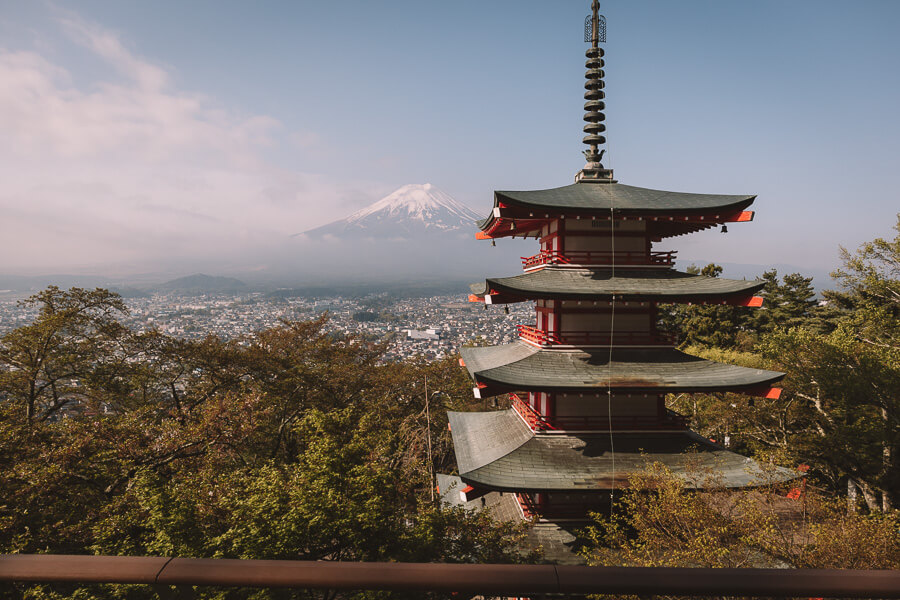
When visiting in late April, parking was free, however during peak periods like Cherry Blossom season, there is limited parking and a fee payable. After visiting the observation deck with the viewpoint of the pagoda and Mount Fuji, we walked for a further 10 minutes up the hill for another great viewpoint of Fujisan – and we had it ourselves!

At the base of the hill, there is a small shrine and an orange torii gate, and some food trucks were beginning to set up as we left around 9 am.
Shimoyoshida Street
In need of caffeine after our early start, we drove over to FabCafe Fuji for coffee and breakfast.
Outside the cafe, there were signs and even a traffic controller to stop people from walking out into the middle of the busy road to take photos of the picturesque street with views of Mount Fuji in the background.
I was excited to see this scenic street for myself after having seen some beautiful photos online, but it was pretty disappointing to see a lot of people jumping out onto the road to take photos in front of cars, and the obvious impact it was having on local businesses and residents with signs up everywhere encouraging people not to do this.
Kitaguchi Hongu Fuji Sengen Shrine
A short 5-minute drive took us to Kitaguchi Hongu Fuji Sengen Shrine.

My favourite part about this shrine was walking up the path through the forest to reach the shrine, surrounded by towering ancient cedar trees. Hikers seeking to scale Mount Fuji visit here before beginning the trail for a prayer for safety.

Open: Daily, 8.30 am – 5 pm Entrance: Free
Onshirin Garden
After spending some time wandering the shrine complex, we set off in search of a potential hidden gem near the shrine. Onshirin Garden wasn’t a spot listed on any tourist maps, and looking at the Google reviews it seemed more to be a popular playground for families.
What intrigued me though was a few photos of an incredible viewpoint of Mount Fuji, with fields of blue nemophila . This beautiful spring flower is most notably seen at the Hitachi Seaside Park near Tokyo, but I hadn’t heard of it in Fuji Five Lakes.
Our hunting paid off, and we came across this spectacular, quiet and free photo spot just near the entrance to Onshirin Garden.

Fujisan World Heritage Center
On the way back to Kawaguchiko, consider stopping in at Fujisan World Heritage Center.
This free visitor centre is a must-see if you are interested in learning more about Mount Fuji. Facilities include a 4D Theater, a 15-metre wide model of Mount Fuji, interactive exhibits and an observation viewing deck.
Ide Sake Brewery
In the centre of Kawaguchiko, you’ll find Ide Sake Brewery tucked away down a side street.
As big sake lovers (pretty much the reason we visited Takayama on this same trip!), we loved it.
This small family-run brewery produces both sake and whisky. You can do a self-pour tasting for ¥550 and sample a few different varieties of their products. There is also a small shop, where we picked up our own sake set to take home with us!
Ide Sake Brewery also runs guided tours in both English and Japanese – unfortunately, they were already fully booked on the day of our visit, but we would have loved to do this.
You can enquire online here .

On your third and final day of exploring Fuji Five Lakes, we’ll be exploring attractions outside of Lake Kawaguchi.
Fuji Shibazakura Festival
During my visit in the spring of 2023, the Fuji Shibazakura Festival was being held near Lake Motosu to the west of Kawaguchiko.

Typically held from mid-April to late May, this festival is popular for the incredible fields of bright pink moss phlox that cover the landscape, with breathtaking views of Mount Fuji in the background.

Even if you aren’t visiting during the festival period, the rest of the itinerary is still relevant as there are some unique things to see in this area to the west of Lake Kawaguchi.
Read my detailed guide on all you need to know about visiting the festival .
Lake Motosuko
After spending a few hours walking the grounds, taking many photos and having morning tea at the cafe onsite, we headed off to our next stop, Lake Motosuko.
Lake Motosu is featured on the 1000 yen bill. It’s also known as the mirror lake , due to the stunning mirrored reflection of Fuji – this is what we set off in search of.
Driving around the lake, there were camping grounds and campers set up right on the lake’s edge. Coming to Motosukotenbo Park , we pulled over and took these incredible photos of Mount Fuji and the lake. If you have a car, it’s well worth the short detour to visit this viewpoint.

Fugaku Wind Cave and Narusawa Ice Cave
On the highway driving towards Kawaguchiko, you’ll pass two ice caves, the Fugaku Wind Cave and Narusawa Ice Cave. There are thought to be over 100 caves at the base of Mount Fuji, as a result of volcanic eruptions creating lava caves.
We decided to stop and explore the Fugaku Wind Cave . Descending into the cave, you instantly feel the point that the temperature drops – it stays consistently around 0 degrees Celsius throughout the year in the cave. Due to this, the cave was used as a natural refrigerator and used to store silkworms.

It takes around 15 minutes to explore the cave, with the highlight being the impressive ice stalactites illuminated in the depth of the cave.
When you resurface, there is a 30-minute forest trail that connects the two caves.
We followed this trail, going for a walk in the serene Aokigahara Forest in favour of visiting the second ice cave.
There’s also a third cave a short drive away, the Bat Cave, which is also the largest of the three caves open to the public in the Fuji Five Lakes area.
Onsen with a View of Mount Fuji
As you head back to Kawaguchiko, you can stop at the Fuji Yurari Onsen for a blissful afternoon of relaxation.
With 16 hot springs including 2 outdoors with views of Mount Fuji, this is a great way to unwind after a busy few days exploring Fuji Five Lakes. Plus for an extra fee, you can also book a private onsen. Just note that no tattoos are allowed.
Alternative Day 3
An alternative option for a day trip from Kawaguchiko is visiting Oshino Hakkai .
Also a popular day trip from Tokyo, visitors can explore the small traditional village reconstruction surrounded by eight ponds, fed by spring water from the snow on the slopes of Mount Fuji.
As we had just visited the similar Hida Folk Village open-air museum in Takayama , we decided to skip this one, but it is an enjoyable (if somewhat touristy) alternative.
Another option for thrill-seekers is to spend the day riding the gravity-defying roller coasters at Fuji-Q Highland . This park is best known for its four giant roller coasters and anime-themed rides.
Buy your tickets online in advance for a discounted admission price.

Final Thoughts – Mount Fuji Itinerary
That wraps up this complete guide to Mt Fuji Lake Kawaguchi and the Fuji Five Lakes region. With this itinerary, you’ll uncover the highlights of the region plus a few unique things to do that aren’t possible on a day trip.
Let me know in the comments below if you have any questions about this Kawaguchiko guide, and check out my other articles to help you plan your Japan trip.
More Japan Guides:
- How to Easily Visit the Chureito Pagoda from Tokyo
- 10 Most Mesmerising Views of Mt Fuji from Kawaguchuiko
- An Exciting 4 Days in Osaka Itinerary for First-Timers
- Koyasan Temple Stay: Essential Travel Guide & Tips
- A Fun 7 Day Tokyo Itinerary: Complete 1 Week in Tokyo Guide
- A Perfect 4 Weeks in Japan Itinerary: Ultimate Travel Guide
- Takayama Itinerary: 2 Days Discovering Traditional Japan
TRAVEL PLANNING RESOURCES My tried and tested recommendations to make your next trip easier
🛡️ Travel Insurance: For my fellow Aussies, I use CoverMore for domestic and overseas travel insurance and they've been great to deal with. Travel with peace of mind knowing you're covered for unexpected events, ensuring a worry-free journey.
🌐 Stay Connected: After trying an eSim for the first time when travelling Japan & Europe for over 4 months in 2023, I'm officially converted! Thanks to Airalo , gone are the days of needing to physically swap plastic sim cards every time you enter a new country. Stay connected wherever you go by easily and affordably purchasing an eSim for all your travel destinations.
🚗 Easy Car Rental : Enjoy hassle-free car rentals on DiscoverCars with a wide range of options, competitive prices, and excellent customer service. I often find it's cheaper than booking direct, and I can compare a large range of suppliers to make sure I'm getting the best price.
💱 Access Local Currency: I've been using Wise in my business and on my travels to save on currency exchange and it's been a game changer! Wise provide a transparent and cost-effective way to access and manage local currency, with minimal fees and the best exchange rates compared to the traditional travel cards which sneakily charge extra fees and usually give you a poor exchange rate. Find out more here .
🏨 Accommodation: I book all my accommodation through booking.com . Discover their vast selection of accommodations worldwide, with great deals and flexible booking options. Plus, if you join their Genius Loyalty program, you get special benefits and discounts on selected stays.
🌟 Attractions & Tours: GetYourGuide is my preferred platform as they make it super easy to compare different tours, book experiences and get the best prices for tours across the world. I've downloaded their mobile app to have all my bookings in one place to easily pull up details when I've got multiple tours booked.
📸If you're wondering what I've used to capture the photos in this article, you can see what's in my camera bag here .
☕ Finally, if you found this free guide useful, you can buy me a coffee to say thanks :)
Just a quick note to let you know this post may contain affiliate links . At no extra cost to you, I receive a small commission on purchases made through these links. By doing so, you are supporting this blog and allowing me to continue providing you with free high-quality travel guides. Thank you!
2 thoughts on “Exploring Fuji Five Lakes: 3 Days in Kawaguchiko Guide”
Thank you. The link to book bus ticket from Tokoyo to fuji doesn’t show up kawaguchiko in the locations
Hmm, that’s strange I can see it when I look. Here’s the direct link (to/from Tokyo Station): https://japanbusonline.com/en/CourseSearch/11500410001?AreaCd=313
Leave a Comment Cancel reply
Save my name, email, and website in this browser for the next time I comment.
- Tokyo Cheapo (繁體中文)
Tokyo to Kawaguchiko: Take a Day Trip to Fuji's Nearest Neighbor
Kawaguchiko has some of the best views of Mount Fuji in Japan — reflected across a lake, or foregrounded by fields of lavender — and there’s no shortage of things to do there, either. Here are a few tips for a day trip from Tokyo to Kawaguchiko.
The second biggest and most accessible of the Fuji Five Lakes, Kawaguchiko has a wealth of natural resources, with stunning autumn leaves, cherry blossoms, and flower festivals galore. With direct transport — a two-hour bus or train — from Tokyo to Kawaguchiko, it’s an unsurprisingly popular spot, and well worth a day trip.
The need to escape city streets can be strong, and there is nowhere better to get in touch with nature, as well as tick off the biggest sight in Japan. If you are planning to size up the beast before you climb , there are buses to Fuji’s 5th station available from Kawaguchiko too. With onsen , art museums, and seasonal delights, there are plenty of things to do throughout the year, so add Kawaguchiko to your bucket list!
Getting from Tokyo to Kawaguchiko
We’ve given a quick overview below but for more information, please see our Tokyo to Mount Fuji transport guide .
Private driver
If you’re happy to pay a bit more for convenience and flexibility, then this very reasonably priced private driver service costs ¥ 66,000 for 4-7 people and is the smoothest way to enjoy the Mount Fuji area. Having a private driver pick you up from your hotel and not having to figure out schedules/queues for buses makes for a nice hassle-free day!
From JR Shinjuku Station, you have three options. The fastest is the direct Limited Express Fuji Excursion service, which takes just under 2 hours and starts at ¥ 4,000 . Tickets sell out superfast, so it’s recommended you book at least 1-4 weeks in advance, either on Klook or Eki-net .
For a middle option on price and time, you can take a Limited Express Kaiji to Ōtsuki and then hop on the Fujikyū railway to Kawaguchiko — this takes just over two hours and costs ¥ 3,530 . If you want to save your cash, you can catch a local train (possibly changing at Takao, depending on the times) to Ōtsuki instead, which brings your travel time up to about 2.5 hours but costs ¥ 2,510 .
To avoid the inevitable line at Kawaguchiko Station, you could catch a highway bus from stations across Tokyo, including Shinjuku, Shibuya, and Tokyo. Tickets start around ¥ 2,000 and the ride takes about two hours, stopping at Fuji Q Highland on the way. You can book the return trip here .

Tours from Tokyo to Kawaguchiko
If you can’t be bothered to delve into the intricacies of public transport, then it’s worth hopping on a day tour from Tokyo. This highly rated day trip on Viator which includes the famous Chureito Pagoda Mount Fuji view, Kawaguchiko, and a visit to a traditional thatched roof village . Also worth mentioning is this tour where you ride the bus to Mount Fuji 5th Station, then to Hakone and transfer to take the bullet train back to Tokyo (NB there’s no stop at Kawaguchiko). If you need any more ideas, there’s a wide range of Mount Fuji excursions here on Viator .
Getting around Kawaguchiko

The easiest option to access most sights around Kawaguchiko is to make use of the sightseeing buses. There are three main bus lines: Red, Green, and Blue, all departing from Kawaguchiko Station. You can purchase a two-day ticket for ¥ 1,700 . There are also passes that include the ropeway and sightseeing boat for ¥ 2,800 . IC cards also work on trains and local buses. Another option is to rent a bicycle — there are a few stores dotted around the area.
Top things to do in Kawaguchiko
Since everything in Kawaguchiko comes with the bonus of Japan’s most famous mountain in the background, you can’t really go wrong, no matter what you decide to explore. If you decide there’s too much to cram into a single day, then check out the options for spending a night in the shadow of Mount Fuji . There’s plenty to see in the area, but here is a selection of some of the top spots.
Mt. Fuji Panoramic Ropeway
Sightseeing Boat/Ropeway Entrance Stop (No. 9) via the Red Line Bus

The ropeway gives fantastic views of both Mt. Fuji and Lake Kawaguchiko, reaching an altitude of 1075 meters (3527 ft) at its highest point. It runs up to Fujimidai Station on top of Mt. Tenjō within three minutes. The observatory has grown in recent years and has plenty of photo spots and even some games to try out. The ropeway is the setting for a story written by one of Japan’s literary masters, Osamu Dazai, which describes raccoons and rabbits being placed on gondolas and around the observatory to welcome guests.
If you’re looking for more views of Fuji, we have some great alternative hikes with stunning vistas to consider!

Oishi Park and Kawaguchiko Natural Living Center
Kawaguchiko Natural Living Center Stop (No. 20) via the Red Line Bus

To view Mt. Fuji from fields of lavender and blueberries is a pretty awesome experience and one you can get at the Kawaguchiko Natural Living Center and nearby Oishi Park. The lavender is in peak bloom in mid-June, which is also when the nearby herb festivals take place. From July to mid-August, you can pick your own blueberries and other fruit at nearby farms. This can be organized by the center. But no matter when you go, the view will still be spectacular.
Kawaguchiko Natural Living Center
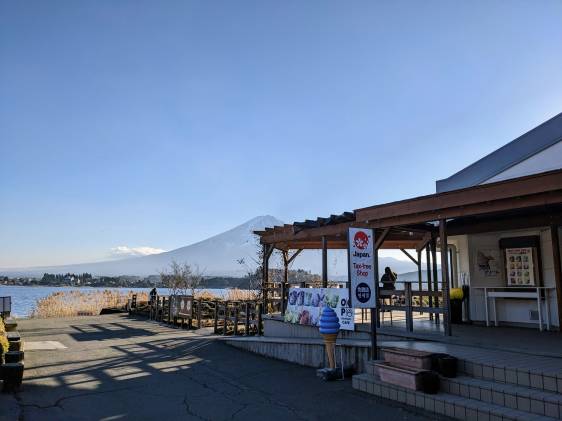
Itchiku Kubota Art Museum and The Maple Corridor
Itchiku Kubota Art Museum Stop (No. 17) via the Red Line Bus

The museum has numerous examples of work by Itchiku Kubota, a world-renowned specialist in the ancient art of fabric dyeing. This includes beautiful kimono, as well as a tearoom with stunning views across the lake of Mt. Fuji. There are gardens surrounding the museum, with mini waterfalls and forests. The museum is also close to the Maple Corridor , one of the best spots in the whole area for autumn leaves — it even has its own festival . The Momiji Tunnel is a little closer to the lake.
If you fancy more day trips for autumn leaves, see our guide to fall day trips from Tokyo for ideas.
Itchiku Kubota Art Museum
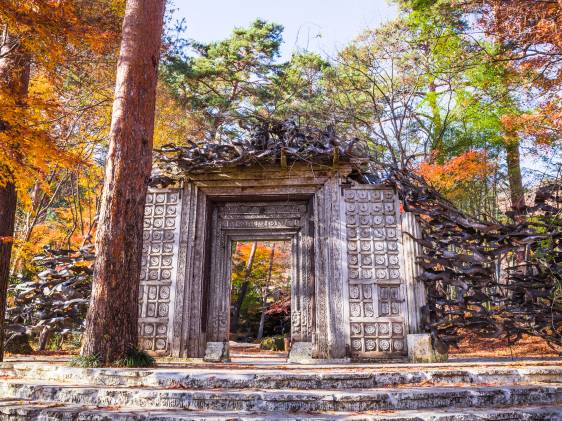
Fuji-Q Highland Amuseument Park
Fuji-Q Highland Stop (No. 105) via the local route bus (included in bus pass) or train to Fujikyu Highland Station

A theme park so dedicated to breaking world records it builds a new rollercoaster every five years just to do so, Fuji-Q Highland is a great place if you want to be scared out of your wits. There are multiple ways to achieve this, of course, from the terrifying drops and knee-buckling speeds of the rides to the horrifying haunted house. With views of Fuji-san as you rocket at speeds of up to 172km/hr, this is a different way to enjoy the greatest sight of Japan. A direct bus from Tokyo is also available.
Pro tip: If you’re keen on Fuji-Q, it’s worth considering a Mt. Fuji Pass — this covers your entrance, plus a bunch of other attractions and transport.
Fuji Q Highland
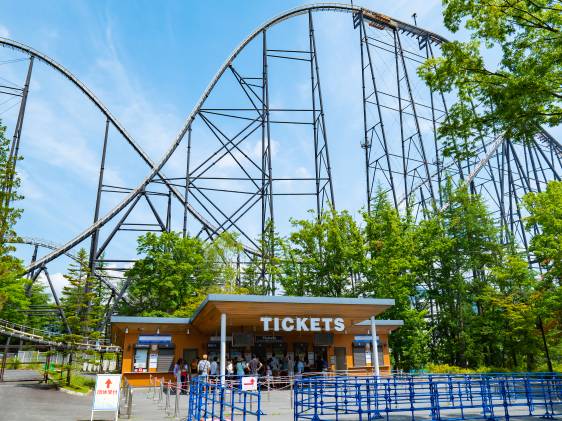
Kawaguchiko Music Forest Museum
Kawaguchiko Music Forest Museum Stop (No. 15) via the Red Line Bus.

A slightly strange attraction but popular nonetheless, the Music Forest Museum is dedicated to a mostly European collection of automatic musical instruments. The biggest attraction is the French fairground organ from 1905 which plays every 30 minutes. There are European-style gardens with views of Mt. Fuji, as well as shops, a chapel, rose garden, and restaurant. The stylized design of the museum and gardens creates quite a surreal setting and it’s very pretty — reminiscent of a fairytale cottage.
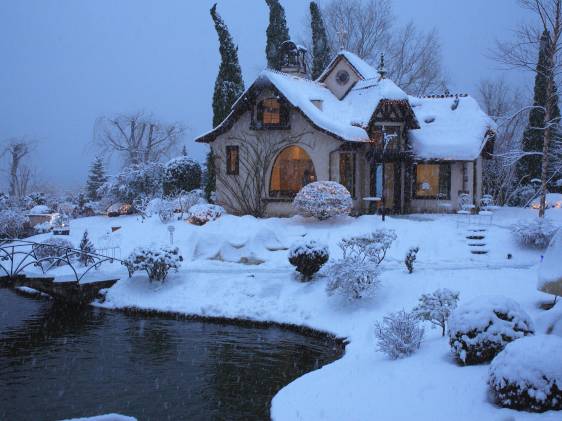
Eat hōtō noodles: the local specialty
Various spots on the Red Line Bus route, including at Kawaguchiko Station

While you’re in Yamanashi Prefecture, you’ll want to try the local noodles to complete your experience. These unusually flat noodles are cooked in a miso soup with vegetables to create a nourishing bowl of hearty goodness, similar to a stew. Despite looking like udon (albeit flatter), the noodles are prepared similarly to dumplings. There are plenty of places to try the dish — just keep your eyes peeled as you pass restaurants. If you want to plan ahead, the restaurant chain Hōtō Fudō has restaurants around the lake and a great reputation for high-quality noodles.
Hōtō Fudō Kawaguchiko Station
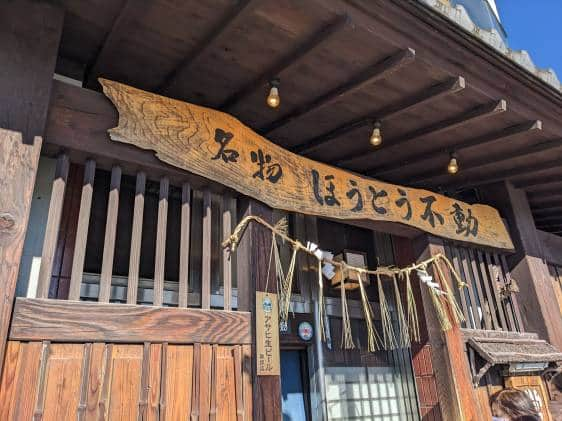
Soak in the sights at a hot spring

There are two primary onsen towns on the Red Line Bus route: Funatsu-Hama and Azagawa, each with plenty of hotels and public onsen which welcome day guests into their relaxing baths. Hotel Mifujien has good views of Mt. Fuji, although it is not the fanciest of onsen. Entry costs ¥ 1,200 . Yurari has great views from the second-floor baths, with a range of bath types and entry from ¥ 1,200 to ¥ 1,700 depending on day and time — they also have private onsen bookable from ¥ 2,500 for one hour, with views of that mountain we keep mentioning. You can also try Yamanakoka Hot Spa-Beni Fuji no Yu , which has good views and a nearby morning market to boot.
Pro tip: You can combine your hot spring experience with shopping and a stop-off at Mt. Fuji's 5th station, on an [affiliate id="viator" text="all-in-one tour from Tokyo" link="https://www.viator.com/Tokyo/d334-ttd/p-2142TYO_BUSS10"].-->
Things to do around Kawaguchiko
Chūreitō pagoda.
Train from Kawaguchiko Station to Shimoyoshida Station

No doubt you’ve seen this photo a thousand times in research for your Japan trip. It’s a photo that can’t be shared widely with fears that people will accuse you of mishandling Photoshop. But you deserve to take it — I mean you did have to climb 400 steps to get there. This spot is so popular that they have recently built a large platform — no more elbowing people out the way — and there’s free Wi-Fi.
Tip: If you board a limited express train to Shimoyoshida, it costs ¥ 400 extra on top of your regular ticket. Alternatively, if coming from Tokyo, you can hop off the train early and put your luggage in the station’s lockers.
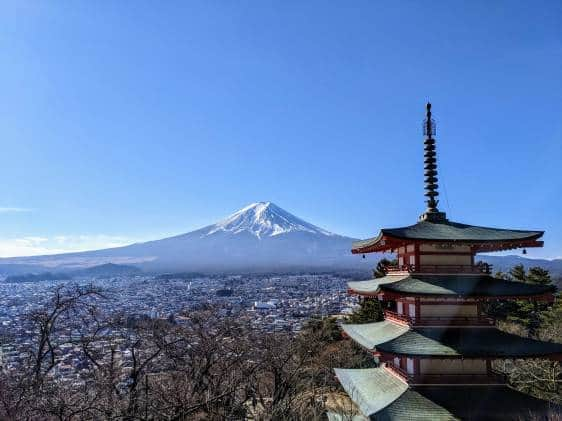
Ice and Wind Cave
Narusawa Hyōketsu Ice Cave Stop (No. 80) via the Blue Line Bus Fugaku Fūketsu Wind Cave Stop (No. 51) via the Green Line and Blue Line Bus.

For an interesting geo-thermal phenomenon check out the Narusawa Hyōketsu Ice Cave and Fugaku Fūketsu Wind Cave. It takes around 30 minutes from Kawaguchiko Station to reach the caves, and they are both within a 10-minute walk away from each other. The ice cave is the more interesting of the two and is cold all year round with icicles sprouting from the ceiling. You’ll need to wear a helmet in both. They are also right next to Aokigahara Forest; you’ll get a glimpse when you walk from one cave to the other.
Narusawa Hyoketsu Ice Cave
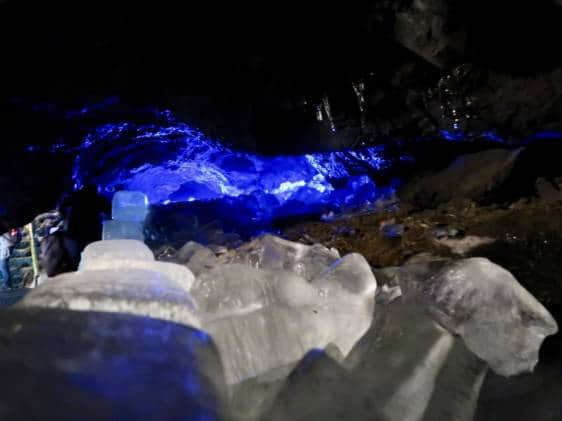
Saiko Iyashi-no-Sato Nenba Healing Village
Saiko Iyashi-no-Sato Nenba Stop (No. 48) via the Green Line Bus

Visit the Saiko Iyashi-no-Sato Nenba Healing Village with thatched buildings, each containing a local craft demonstration. You can wear samurai armor, dress as a geisha, buy some wind chimes, and chow down on local delicacies (wasabi ice-cream, anyone?).
Saiko Iyashi no Sato Nenba (Healing Village)
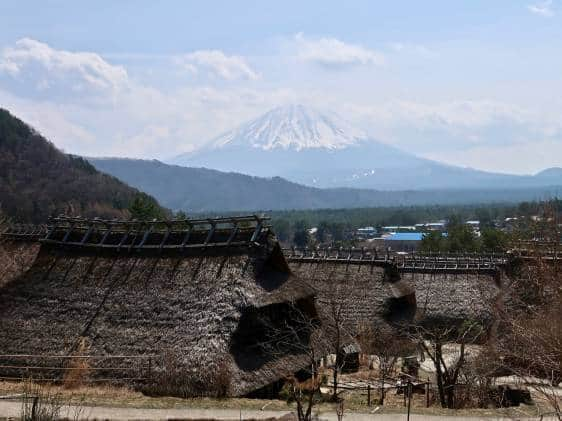
Fuji Moss Phlox Festival
40-minute shuttle bus from Kawaguchiko Station

Carpets of over 800,000 shibazakura cover the ground before Mount Fuji from mid-April to late May, creating stunning views with contrasting colors from flower to mountain to sky. There are good-value, all-in-one tour packages available during the festival period, but if you’re not keen on those you can easily access the site by shuttle bus from Kawaguchiko Station (approximately 40 minutes).
Fuji Shibazakura Festival
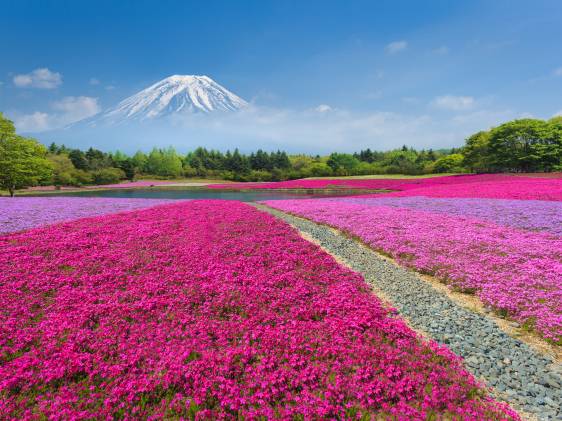
Oshino Hakkai
30-minute local bus from Kawaguchiko Station

Oshino Hakkai is known for its magical eight ponds, quaint windmills, and stunning views of Mount Fuji. In the past, devout individuals would cleanse themselves in these ponds before making their way up Mount Fuji. Nowadays only the Waku Pond holds great significance, with visitors encouraged to bottle up the water and drink.
While it can get quite busy during tourist season, heading there will treat you with a breathtaking vista, especially during the Diamond Fuji phenomenon .
Bonus sights
In case that wasn’t enough for you, there is plenty more to see dotted along the lake shore and in the main town of Kawaguchiko.
- The area is known for its museums, so if you fancy it, visit the Yamanashi Gem Museum , Kawaguchiko Museum of Art , and Kawaguchiko Konohana Museum .
- Head indoors and escape the heat or cold at Fuji-san World Heritage Center .
- For shrines, you could visit the Fuji Omuro Sengen Jinja Shrine on the east side of the lake, a few stops down from the Itchiku Kubota Art Museum listed above.
- And for atmospheric fire-pit cooking ( robotayaki ), we recommend the restaurant Sanrokuen — only a 10-minute walk from Kawaguchiko Station.
Where to stay in Kawaguchiko
If you’ve just realized that 24 hours isn’t enough time to see everything in and around Kawaguchiko, then there are many fabulous places to stay over at — and some come with unforgettable views of Mount Fuji. One such hotel is the Fuji View Hotel , but we have plenty more in our dedicated article.
While we do our best to ensure it’s correct, information is subject to change. Post first published in April 2017 and last updated in January 2024.
- Fuji five lakes
- Kawaguchiko
- Theme parks
- Weekend-getaway
Get our Tokyo Cheapo Hacks direct to your inbox

TOP 20 Things to Do in Shinjuku, Tokyo

Asakusa: A Guide to Tokyo's Traditional Center
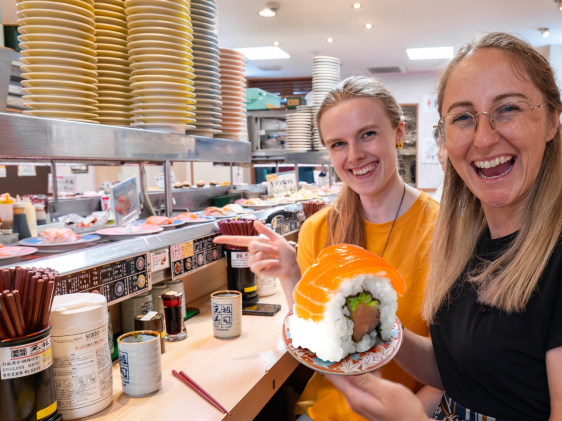
Best Budget Sushi Restaurants in Tokyo

Hidden Gems: Tokyo's BEST Underrated Shrines and Gardens

Top Japanese Phrases You Need Before Traveling to Japan

When is the Best Time to Visit Japan?

Narita Airport to Tokyo

The Tokyo Wide Pass: Everything You Need To Know
This discount pass is available to foreign residents and tourists alike. See what you can do with it.

Tokyo Events This Week: Sanja Matsuri, Sumo, and Design Festa
Tokyo events for Monday, May 13 to Sunday, May 19, 2024.

Taste of Hakone: Easy Day-Trip Itinerary
From hot springs and museums to shrines and pirate ships, here's our DIY guide.

May 2024: 5 Events Not to Miss in Tokyo
May is the official start of festival season in Tokyo. With mega-fests like Sanja Matsuri and the Golden Week holiday, you're spoiled for choice!

7 Things To Do in Harajuku's Hottest New Attraction, Harakado
From rooftop bars to public baths, art spaces, and more — there's lots to keep you busy.

New Video: Hidden Gems — Tokyo's Most Underrated Shrines and Gardens
Tokyo is often described as busy, crowded and futuristic, but there are also traditional shrines and gardens where you can swap the hustle and bustle of the city for peace and quiet.

3 Hidden Sound, Art and Poetry Experiences in Tokyo
A different way to tune into the city.

Where To See Yaezakura: Late-Blooming Cherry Trees in Tokyo
8 perfect picks, from parks to shopping streets.

Recommended hotels located nearby

Close without accepting

Kawaguchiko
Mount fuji’s beautiful lake.
Kawaguchiko is one of the five lakes surrounding Mount Fuji, in Fujikawaguchiko City in the heart of Yamanashi prefecture. Located to the north of the sacred mountain, the view on Fuji-san is breathtaking which makes the surroundings of this body of water a privileged tourist destination.
Climbing Mount Fuji 🗻 is only the start of the area's discovery. At its foot is a set of five lakes called " Fujigoko ", of which the most famous, aside Lake Ashi in Hakone , is certainly Kawaguchi. We went on a day-trip at the later sometimes in mid- November when the momiji 🍁 , the Japanese maple trees foliage, is at its peak.
To get there, take a bus from the same company serving Fuji-san: Keiô (not covered by the Japan Rail Pass ). The office is located at Shinjuku station west exit, in front of the Yodobashi Camera 📷 store, and buses depart just in front of it. The journey to Kawaguchiko lasts 1h45, but the trip back is not guaranteed due to the heavy traffic on Highway 20 to Tokyo .
Get off the bus at Kawaguchiko station, which is about a 10 minutes walk from the lake. Treading in Kawaguchi City feels like being in an outdated place; despite its many sightseers, the antiquated buildings look washed-out and rusty. However, nature is superb especially during the fall season.
To travel around Lake Kawaguchiko , it is a good idea to rent electric bicycles . The most interesting company in terms of location and price is probably Sazanami, adjoining the eponymous restaurant. You can find them on the road between the Ropeway and the bridge. Even if the lake is "only" 20km of circumference, there are many spots with views of the momiji and on Fuji-san , so 3 hours aren't too much. Tall people should be careful though: the bikes’ size are adapted to the Japanese people’s!
You can then enjoy a nice ride, in search of the most beautiful momiji viewing spots! Do not forget to stop at the famous " Koyo " spot (called " maple corridor " on maps provided by the tourist organization at the station) which gathers some of the most beautiful ones.
For those who don't wish to rent a bike 🚲 or in case of bad weather, sightseeing buses ( shûyû basu 周遊バス) can drop you to famous places around Kawaguchiko, although they don’t fully circle the lake.
- Flights and Airports
- Accommodation
- Transportation
- Internet & Phones
- Budget and money
- Japanese Food
- Visit with Kids
- Seasons: spring / summer / autumn / winter
- Weather forecast
- Time in Japan
- Holidays & Festivals
- Natural Disasters
- Customs and Duties
- Works and Closures
- June 6 -- Beginning of the rainy season (Tsuyu) in Japan
- June 21 -- Summer starts in Japan
- From July 1 to 31 -- Gion Matsuri Festival in Kyoto with float processions on July 17 and 24
- July 1 -- Season start for climbing Mount Fuji
- July 15 -- Sea day / Umi no Hi in Japan (holiday)
- July 17 -- Tokyo Day
- Tokyo : Shinjuku , Shibuya , Harajuku , Asakusa , Akihabara , Odaiba , Ikebukuro , Ueno , Roppongi , Chiyoda , Ryogoku ...
- Around Tokyo: Kamakura , Nikko , Hakone , Mount Fuji , Mount Takao , Yokohama ...
- Kansai: Kyoto , Nara , Osaka , Mount Koya , Himeji , Kobe , Kinosaki , Kumano Kodo , Ise ...
- Japanese Alps: Kanazawa , Matsumoto , Takayama , Shirakawa-go , Nakasendo ...
- West: Hiroshima , Miyajima , Shikoku , Onomichi , Naoshima , Izumo , Kurashiki , Matsue ...
- South: Kyushu , Okinawa , Yakushima ...
- North: Hokkaido , Tohoku ...

- Temples and Shrines
- Gardens and Parks
- Hiking and Trekking
- Observation Decks
- Public Baths (Onsen and Sento)
- Festivals (Matsuri)
- Amusement Parks
- Visit on a Budget / Luxury

Keikaku is a travel agency specialist of Japan and providing different kind of services:
- Japan Rail Pass
- English speaking Guides
- Pocket Wi-fi
- Japan Nightlife
- Working in Japan
- Religion and Spirituality
- Arts and History
- Movies / Animated Movies
- Japanese Music
- Studio Ghibli
- Photos / Videos
- Weird Japan
- Translations
- Kana & Kanji
- Japanese Swear Words
- Honorific Suffixes (san, kun, chan...)
- Introducing yourself
- Thank you / Apologize
- Count / Say Your Age
- Say the Date / Tell the Time
- Happy birthday
- Enjoy Your Meal
- Writing your name

Kanas are the much-needed basic characters of written Japanese language. Memorize them at a fast pace with our method.
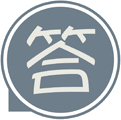
Ask any kind of question and share your knowledge about Japan in Kanpai’s community space, our Q&A section Kotaete.
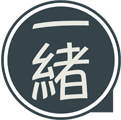
Isshoni means "together" in Japanese: share your trip details (dates, places you would like to visit) and find companions to travel in Japan.
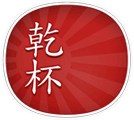
Create your Kanpai account to manage your profile and view your participation history (questions, answers).
Lake Kawaguchiko Guide: 15 BEST Things To Do In Kawaguchiko
Lake Kawaguchiko is one of the most popular destinations in Japan for a day trip or a weekend getaway from Tokyo.
There are many awesome things to do in Kawaguchiko with something for everyone to enjoy in this picturesque lakeside region.
The view of Mount Fuji across the lake is undoubtedly the main attraction, however, there are many other things to do near Mount Fuji that you should add to your list.
Let’s dive into this comprehensive guide to the attractions in Lake Kawaguchiko and everything else you should know!
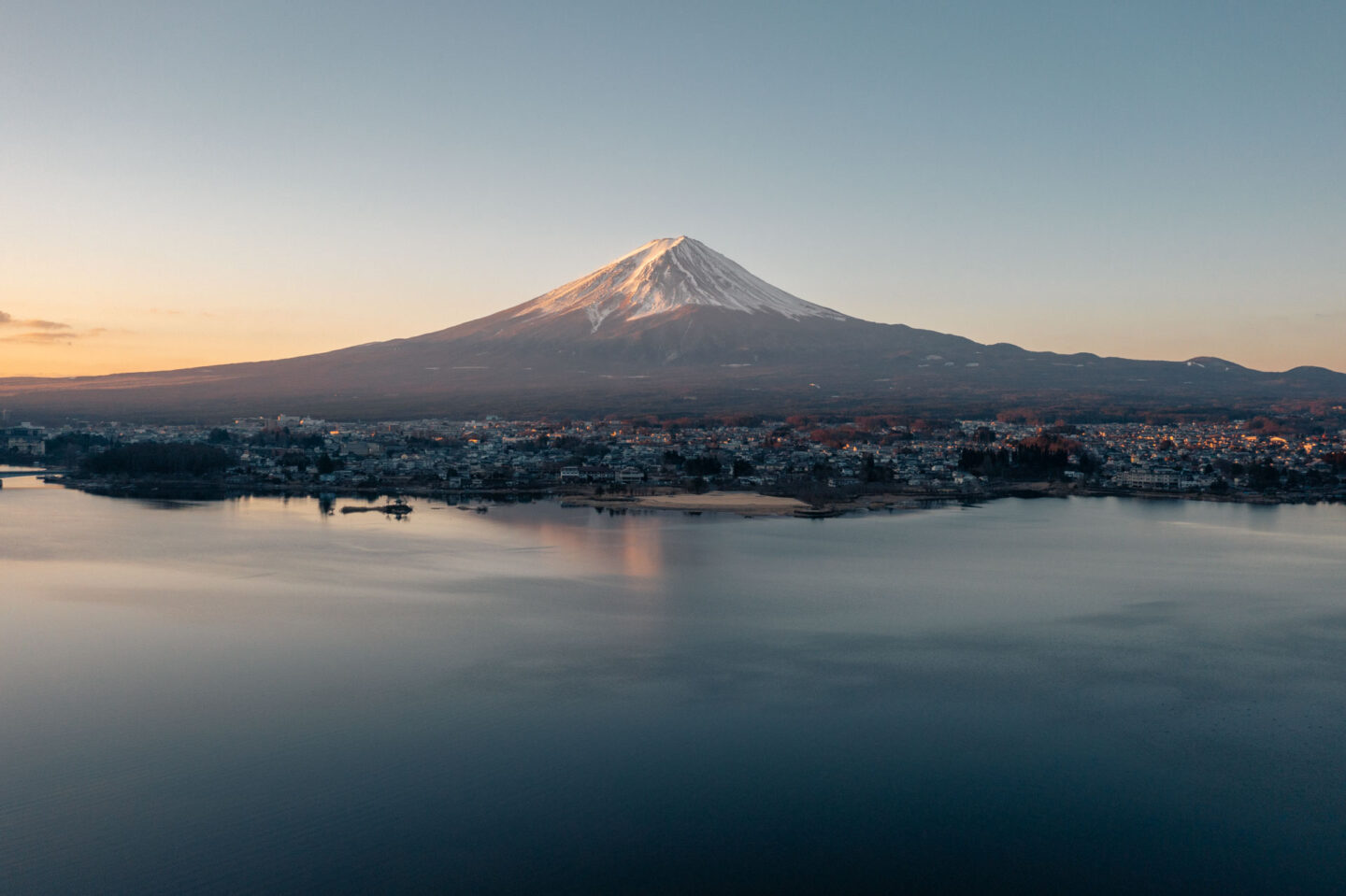
Table of Contents
QUICK ANSWERS: LAKE KAWAGUCHIKO JAPAN
To give you a bit of an overview of Kawaguchiko town, the lake, and the surrounding region, here are some quick answers to the most frequently asked questions from first-time visitors.
WHERE IS LAKE KAWAGUCHIKO?
Located near the foothills of Mount Fuji in Japan, Lake Kawaguchiko is a beautiful small town about 100km west of Tokyo, located in the southeastern Yamanashi province.
Kawaguchiko is also 100km north of Shizuoka City, about a 1.5-hour drive.
There are 5 Fuji Lakes where you can stay to see the views, and Kawaguchiko is the second-largest.
Click here or on the image below for an interactive map of Kawaguchiko Lake.
IS LAKE KAWAGUCHIKO WORTH VISITING?
Absolutely! Lake Kawaguchiko is one of the most beautiful and captivating places in Japan, with incredible views over Mount Fuji.
Of course, the town is known for the impressive views of Fuji-san, but there are also many other awesome things to do in Kawaguchiko during your visit.
Wander around the different parks, sit down and chill at some cafes, take in the Japanese culture, and visit the museums in town.
Despite being a small town, you’ll love spending a couple of days here.
Have you got travel insurance for your trip?!
We all know accidents can happen and having Heymondo Insurance will save you thousands of dollars if something goes wrong.
Heymondo offers low-cost Travel Insurance to keep you covered on all your adventures.
HOW TO GET TO LAKE KAWAGUCHIKO FROM TOKYO?
From Tokyo to Kawaguchiko town, you can use public transportation or rent a car. The former is cheaper but takes longer, and the latter is more convenient.
OPTION 1: PUBLIC TRANSPORT
Head to Shinjuku Station and take the JR Chuo Line to Otsuki Station. You can use the JR Pass up until here.
Once you’re at Otsuki Station, change to Fuji Kyuko Line bound for Kawaguchiko Station. The cost is 1,170 Yen per adult and the journey time is 55 minutes.
OPTION 2: RENT A CAR
The second option is to rent a car in Tokyo and head out to Kawaguchiko Lake at your own pace. The distance is 115km and approximately a 1.5-hour drive.
Renting a car gives you more freedom and flexibility to move around, however, train travel in Japan is the most convenient and affordable when using the JR Pass .
READ MORE: JR Pass Japan
Travel japan with the jr pass.
Get a 7-day, 14-day, or 21-day JR Pass for your trip to Japan and enjoy unlimited travel on trains and buses!
The JR Pass is valid on the Shinkansen (bullet train), Limited Express, Local Trains, Monorail, and JR Buses.
HOW TO GET AROUND LAKE KAWAGUCHIKO?
Kawaguchiko is relatively walkable and you can easily stroll around town and along the lake while taking in the views of Mount Fuji.
Alternatively, if you want to go further and discover all the hidden corners, you can rent a bicycle and bike around Lake Kawaguchiko.
Some hotels offer free bike rental, otherwise, the best place to rent a bike is from NaturaBase and the cost is 1500 Yen per day.
You can also book a taxi to get you around the things to do in Lake Kawaguchiko, which is pricier yet practical.
THINGS TO DO IN LAKE KAWAGUCHIKO
If there’s a popular spot in Japan, it’s definitely Mount Fuji, and Kawaguchiko is by far the best place to take photos.
But there’s so much more to do here, so let’s go through the best things to do in Lake Kawaguchiko.
ENJOY THE VIEWS AT CHUREITO PAGODA
Let’s kick off this list of things to do in Kawaguchiko with the world-famous Chureito Pagoda, a five-story pagoda located just outside the town.
Surrounded by the majestic Mt. Fuji and the traditional buildings, standing at the Chureito Pagoda very well could be the highlight of your trip to Japan.
The Chureito Pagoda is inside the Arakura Sengen Shrine and you’ll have to hike 400 steps up to get there.
Note that you can’t walk from Kawaguchiko to Chureito Pagoda as it’s 7km away, but you can call a taxi or take a train to Shimoyoshida Station from Kawaguchiko Station, which takes about 13 minutes.
RELATED GUIDE: 7-Day Japan Itinerary
MT. FUJI PANORAMIC ROPEWAY
The Mount Fuji Panoramic Ropeway is a cable car that takes you 1000 meters above sea level.
From here, you can see Lake Kawaguchiko and Mount Fuji, and the views are simply spectacular.
Once you get here, you’ll be greeted with a long walkway where you can take photos, as well as a vast terrace where you can enjoy the views from.
Most visitors go up and down the mountain on the ropeway, but there is also a hiking trail that goes from the observation deck down the mountain. It takes about 30 minutes to walk down this trail.
The cable car starts working at 9:30 am and there are departures every 5 to 10 minutes, which is pretty convenient.
Note that it can get pretty crowded, and you may have to wait up to 30 to 45 minutes to get in.
The admission will set you back 900 Yen ($6.60) for a roundtrip or 500 Yen ($3.70) for a one-way ticket.
VISIT AOKIGAHARA FOREST
One of the most intriguing and free things to do near Mount Fuji is an excursion through the Aokigahara Forest.
Nicknamed “the Sea of Trees,” this lush forest covers 14 square miles at the northern base of Mt. Fuji.
An excellent destination for hikers and nature lovers alike, visitors are enthralled by its silence.
It’s one of the quietest places in Japan with enigmatic caves, massive trees, and diverse wildlife.
With established trails and fascinating legends, this is your chance to explore the Japanese countryside far from the crowds.
HAVE FUN AT FUJI-Q HIGHLAND AMUSEMENT PARK
The area near Mount Fuji is known for its lakes and beautiful shrines.
But if you’re looking for a unique way to experience Japanese culture while having fun, then Fuji-Q Highland Amusement Park is your place.
Located in Yamanashi, this amusement park is home to some of the most thrilling roller coasters in the country.
Other than the amazing rides, there are several restaurants around as well as street food, which I recommend!
As you can expect, many tourists are here too, and entering each ride might take up to 30 minutes.
I recommend spending at least half a day here to enjoy the roller coasters, the food, the walk around, and everything else!
I recommend booking your ticket in advance , especially when visiting around the cherry blossom or during the summer. Get it here below:
BOOK HERE: Fuji-Q Highland Amusement Park
SPEND SOME TIME AT OISHI PARK
Oishi Park is another awesome spot in town that I recommend visiting, and I guarantee you’ll fall in love as soon as you arrive.
The park offers stunning views of Mt. Fuji, which are comparable to those you get at Chureito Pagoda, but you can enjoy the reflection of Mount Fuji on the lake and the lavender flowers too.
Other than taking photos and roaming around, there are two ice cream stores inside the park where you can buy a small snack.
Unlike other places and parks near Mount Fuji, Oishi Park isn’t as crowded and, when it gets busy, there’s enough space around for everyone to enjoy. So make sure to come over and relax!
The BEST Affordable Camera For Travel
If you’re on the hunt for a professional camera for traveling, check out the Canon G7 X Mark II .
This tiny camera fits in your pocket, captures high-quality photos and videos, and has Wi-Fi so you can instantly transfer to your phone!
TAKE A STROLL AT MOMIJI CORRIDOR LAKE KAWAGUCHI
Taking a stroll at Lake Kawaguchi is sure to make for a memorable experience near Mount Fuji. It reminded me of the Philosopher’s Path in Kyoto , and I’m sure it won’t disappoint!
The lake is lined with over 1,000 maple trees forming a colorful path – locally known as Momiji Corridor – making it an enchanting natural scenery you can’t find anywhere else.
If you’re staying for the night, I suggest you come in the evening and take a photo of all the illuminated trees and paths!
With its blooming seasonal colors and incredible mountain views of Mount Fuji, walking along Momiji Corridor is one of the must-see attractions in Lake Kaqaguchiko region.
TAKE PHOTOS AT SHIMOYOSHIDA HONCHO STREET
Located in Fujiyoshida town, just 5 minutes walk from Fujiyoshida station, is this idyllic shopping street with an incredible view of Mount Fuji looming in the background.
If you’re an avid photographer and want to capture a unique photo of Fuji-san, then head on over to Shimoyoshida Honcho Street and put your composition skills to the test!
Related Article: Best Affordable Camera For Landscape Photography
RELAX AT OSHINO HAKKAI SPRINGS
Another impressive place you can’t miss out on is the Oshino Hakkai Springs, nestled between Lake Kawaguchiko and Lake Yamanakako.
The springs consist of eight interconnected ponds set among green surroundings and a peaceful environment.
The eight ponds are fed by snow melt from Mount Fuji. The snow melts and then filters down the mountain through porous layers of lava.
Note that the springs have become pretty popular with tourists and, therefore, don’t expect raw, untouched nature as you’d get at Aokigahara Forest.
Nonetheless, it’s an incredible spot that you can’t skip while being near Mount Fuji.
The Most Functional Day Pack EVER!
The Nomatic 20L Travel Pack is perfect for everyday use and for those shorter 1-3 day adventures.
With 20+ innovative features and a minimalist design, this functional day pack gives you confidence for life on the move!
KUBOTA ITCHIKU MUSEUM
Kubota Itchiku was a local artist that revived the art of Tsujigahana silk dyeing, which is nowadays used to decorate kimonos in the Muromachi Period (1333-1573).
Itchiku loved the textile displayed at the National Museum in Tokyo and devoted his life to it, hence this museum.
Here, you can learn about the silk history in the region, roam around the beautiful garden at the entrance, and see some of the best kimonos he created back in the day.
The museum is open from 9:30 am to 5:30 pm and the entrance fee costs 1300 Yen ($9.50).
HAVE LUNCH AT MIYAKI UDON
For a quick break in a traditional, delicious restaurant, Miyaki Udon has got you covered.
This unassuming restaurant is renowned for its traditional udon dishes, all made using handcrafted noodles. On top of that, you should know that the place is famous for horsemeat.
The place is mostly for locals, so they don’t have a menu in English, but a little translation from Google Translate will do.
For just 350 Yen ($2.50), you’ll get a delicious bowl of noodles and that’s really all you need after a day exploring around!
SEE THE YAMANASHI GEM MUSEUM
The Yamanashi Gem Museum, located just a short walk from Lake Kawaguchiko, showcases an array of precious gems and stones from all over the world.
Here, you can see the various types of gems on display, like diamonds, sapphires, and rubies.
The museum also features interactive exhibits that allow visitors to learn more about the history and science behind these beautiful stones.
It’s not an activity for everyone but it’s definitely a nice thing to do near Mount Fuji if you’re interested in gems.
The museum opens at 9:00 am and closes at 5:30 pm, and the admission will set you back 600 Yen ($4.50).
Check Out This Must-Have Travel Accessory!
When arriving in a new country, not being able to charge your phone and gadgets is a nightmare.
Equip yourself with a Universal Travel Adapter which works in 150+ countries around the world.
ONSEN AT HOTEL MIFUJIEN
There are different onsens in town, but a hotel that opens to non-staying guests is Hotel Mifujien.
Here, the hot springs are on the top floor and you can see Mount Fuji while relaxing in the tub. Note that the onsen has 2 pools, one indoor and one outdoor, which are separated for men and women.
Apart from that, they also have towels so you don’t need to bring your own, which is super convenient.
All in all, out of all the activities near Mount Fuji, this is one of the coolest, so make sure to add it to your itinerary.
DRINK SAKE AT IDE SHUZO BREWERY
Experience the unique taste of sake at Ide Shuzo Brewery, a family-owned brewery that will keep you entertained when visiting.
Located just a short walk from Kawaguchiko Station, Ide Shuzo offers 2-hour sake-tasting sessions for only 500 Yen ($3.70)!
And if you want to include the brewery tour, that will cost you 1500 Yen ($10). What is so unique about this brewery is that they make the sake with water sourced directly from Mount Fuji.
For this reason, you can’t find the same taste anywhere else in the world!
The brewery is open daily from 9:00 am to 12:00 pm and from 1:00 pm to 5:00 pm. What to say, it’s just one of the coolest things to do near Mount Fuji!
HAVE A BREAK AT LAKE SIDE CAFÉ KU
Tired of walking around and want a quick break? Lake Side Café Ku is a fantastic option – It’s cheap, it’s delicious, and it’s photogenic.
They have chairs near the window where you can sit and take in all the views over the mountains. Plus, the food they offer is as tasty as it gets.
And if you’re in the mood for it, make sure to try their matcha tea, it’s to die for!
SIGHTSEEING BOAT TOUR ON KAWAGUCHIKO LAKE
Last but not least on this list of things to do in Kawaguchiko is a sightseeing boat tour on the lake.
It’s a short 20-minute boat ride that departs from the shores of Lake Kawaguchi and will take you across the lake for breathtaking views of Mount Fuji and the surrounding landscapes.
Operating hours are Monday to Sunday from 9 am to 4:30 pm. The cost is 1000 Yen per adult and 500 Yen per child.
BEST TOURS IN LAKE KAWAGUCHIKO
Other than joining a tour to Lake Kawaguchiko, I also recommend taking a day trip from Tokyo to Hakone , which is also worth it.
These are the best tours you can join to Kawaguchiko!
WHERE TO STAY IN LAKE KAWAGUCHIKO
There are dozens of hotels in Kawaguchiko, so I have narrowed it down to a few of the best places to stay to suit the needs of luxury travelers, budget backpackers, and everyone in between.
Luxury: La Vista Fujikawaguchiko
Mid-Range: Mount Fuji Panorama Glamping
Budget: Haleluya Guest House
OTHER PLACES TO STAY IN FUJIKAWAGUCHIKO
Didn’t find the perfect accommodation above to suit your needs.
Use the interactive map below to search all the available hotels in Lake Kawaguchiko. Simply enter your dates of stay and hit the search button!
WHAT TO PACK FOR JAPAN
When visiting Japan, here are some items I highly recommend taking with you:
Must-Have Travel Essentials
Hidden money wallet.
Keep your cash and other valuables safe with this anti-theft hidden money wallet!
Reusable Water Bottle
The GRAYL GeoPress is the best reusable bottle that allows you to purify water from anywhere!
Travel Backpack
The Nomatic Travel Backpack has 20+ innovative features, perfect for everyday use!
Quick-Dry Travel Towel
The most compact, lightweight, and quick-dry towel for traveling!
Portable PowerBank
Keep your phone, laptop, and accessories charged while you’re on the go with the Anker PowerBank!
More Japan Travel Guides
Click the button below to view all articles related to Japan!
FINAL THOUGHTS
I hope you enjoyed reading this article about things to do in Kawaguchiko and if you have any questions, please drop me a comment below this post and I will get back to you as soon as I can.
For a quicker response, be sure to join Jonny Melon’s Travel Tribe on Facebook and post your questions or recommendations to our awesome community.
TRAVEL RESOURCES FOR YOUR NEXT TRIP
Whether you’re a seasoned traveler or it’s your first trip overseas, here are some useful travel resources to help you kick-start your next adventure!
Search and book accommodation worldwide.
Compare and book cheap flights to anywhere.
Find tickets, tours, and experiences around the world.
Book buses, trains, and transfers online in advance.
Search all rental cars in your next destination.
Need travel insurance for your next trip?
THANKS FOR READING
Hey friend, thanks for reading this guide!
Please know this post may contain affiliate links. When making a purchase through one of my links, I earn a small kickback at no extra cost to you and it’s a big help to keep the site up and running. Rest assured, I only promote products and services that I personally use and recommend.
Click here to find out how you can support the site organically .
Many thanks!
Leave a comment Cancel reply
Notify me of follow-up comments via e-mail.
Plan Your Trip
Travel Guides
Destinations
Hotel Guides
Find Best Tours
Travel Gear
Travel Resources
How To Start A Blog
Photography Guides
Support the site
Follow On Socials
© 2024 Jonny Melon Adventure Travel Blog. All rights reserved.
Privacy Policy | Terms | Sitemap

19 Best Things to Do in Kawaguchiko | Ultimate Travel Guide
- August 23, 2023
There’s a magical quality to Kawaguchiko that’s hard to put into words.
For me, Kawaguchiko is a place where memories are made and hearts are touched. Where one can witness nature’s masterpieces, this charming town offers experiences that stay with you long after you’ve returned home.
One of the reasons why people visit Kawaguchiko is to see Mt. Fuji in various stunning backdrops so be forewarned that you’ll be seeing a lot the old majestic mountain throughout this post.
In this guide to Kawaguchiko, I want to share with you not just a list of activities but also the emotions and sensations that you too can experience.
From the changing season that paint the region in different hues to the simple joy of a lakeside walk, these are the moments that define a trip to Kawaguchiko.
So what are you waiting for?
Table of Contents
What to Know About Kawaguchiko
Kawaguchiko, or Lake Kawaguchi, is part of the scenic Fuji Five Lakes region, located at the base of Mt. Fuji , Japan’s iconic and highest peak. The lake’s origin is geological, formed by the lava flow from Mt. Fuji’s multiple eruptions over the millennia.
The area around Kawaguchiko has been a place of inspiration for centuries. Early historical records depict pilgrims making their way to Mt. Fuji, often stopping at Kawaguchiko to admire the breathtaking reflection of the mountain in the lake’s calm waters. Which is quite similar to the scenery found in Sayama and Hakone !
The landscape around Kawaguchiko was also a favored subject for ukiyo-e artists, like Hokusai and Hiroshige, who captured the beauty of Mt. Fuji from various viewpoints.
Best Places to Visit in Kawaguchiko
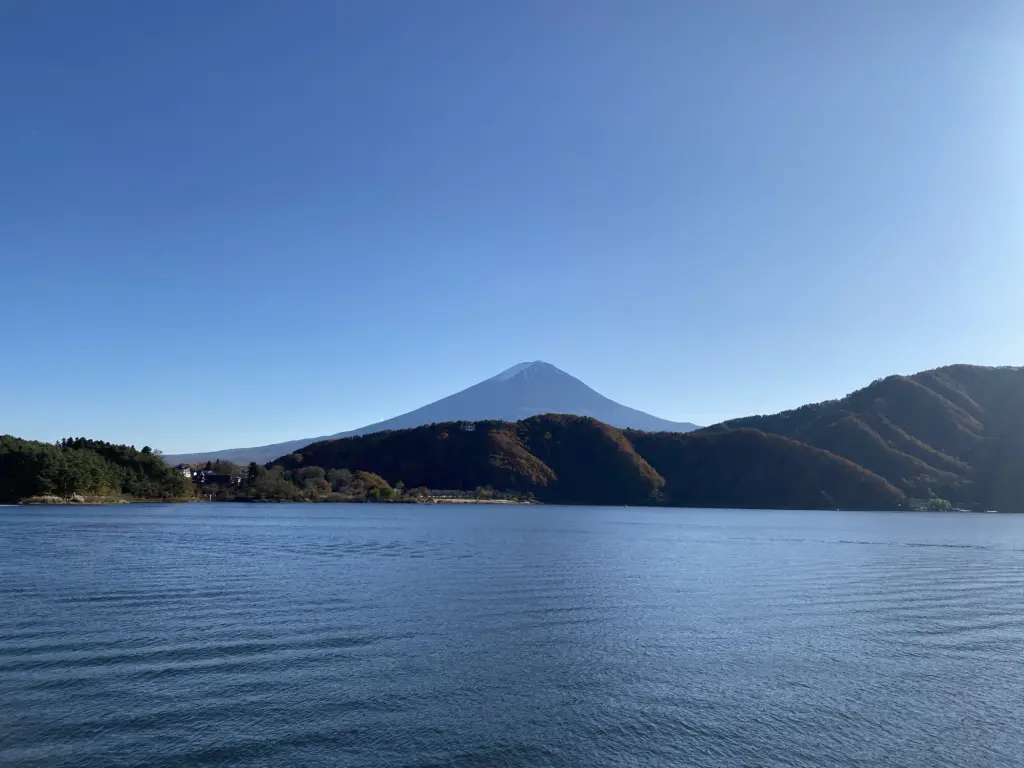
1. Lake Kawaguchi
Lake Kawaguchi is the largest and arguably the most famous of the Fuji Five Lakes.
With a surface area of approximately 15.8 square km (6.1 sq m) and a depth reaching up to 44 m (144 ft), it offers one of the best views of Mt. Fuji. People flock to its shores to capture photographs of Mt. Fuji’s reflection in the water.
The surroundings of Lake Kawaguchi are marked by beauty and seasonal changes. In the spring, cherry blossoms bloom along the lake’s shores, while autumn sees the area enveloped in rich, fiery colors.
It’s a scene that constantly evolves, offering something new with each passing season.
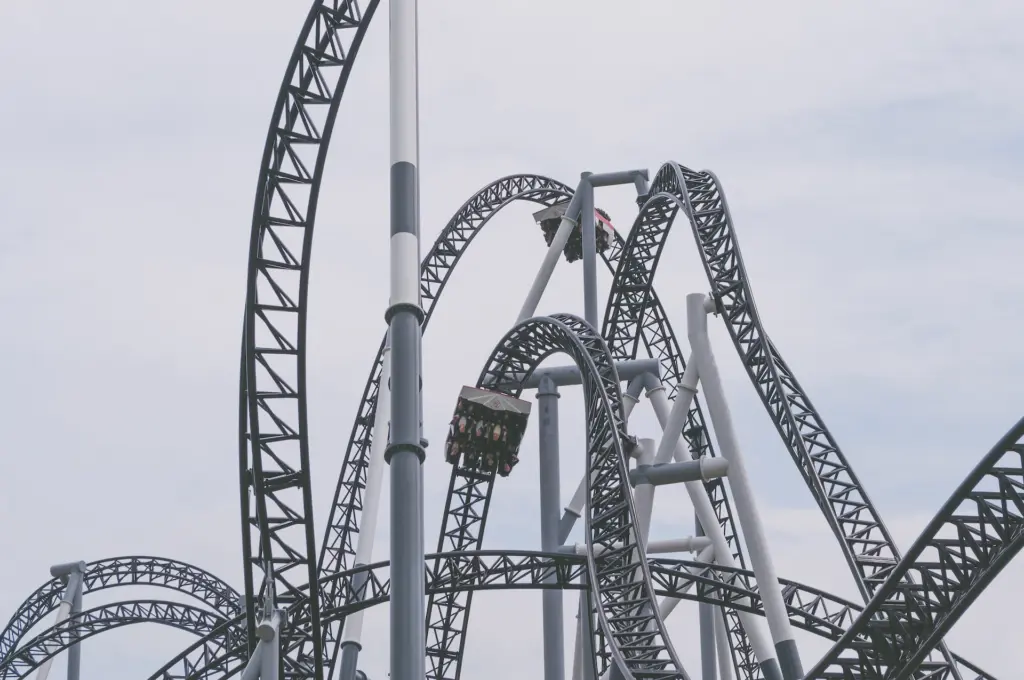

2. Fuji-Q Highland
In for a thrill? Fuji-Q Highland is an exhilarating amusement park that hosts four major roller coasters that will definitely put your bravery to the test.
Fujiyama, once the world’s tallest roller coaster, offers an impressive 79-meter height and reaches speeds of 130 km/h.
Dodonpa is known for its intense acceleration, going from 0 to 180 km/h in just 1.56 seconds.
Eejanaika is a unique 4D coaster that rotates riders a full 360 degrees, while Takabisha holds the record for the steepest drop in the world at 121 degrees!
In addition to its thrill rides, Fuji-Q Highland caters to fans of popular anime, including “Evangelion” and “Attack on Titan,” with themed attractions and interactive exhibits. There are also gentle rides kids so there’s something for everyone!
Click the link to get your 1-Day Pass Ticket for Fuji-Q Highland if you’re keen on trying out the monster rides.
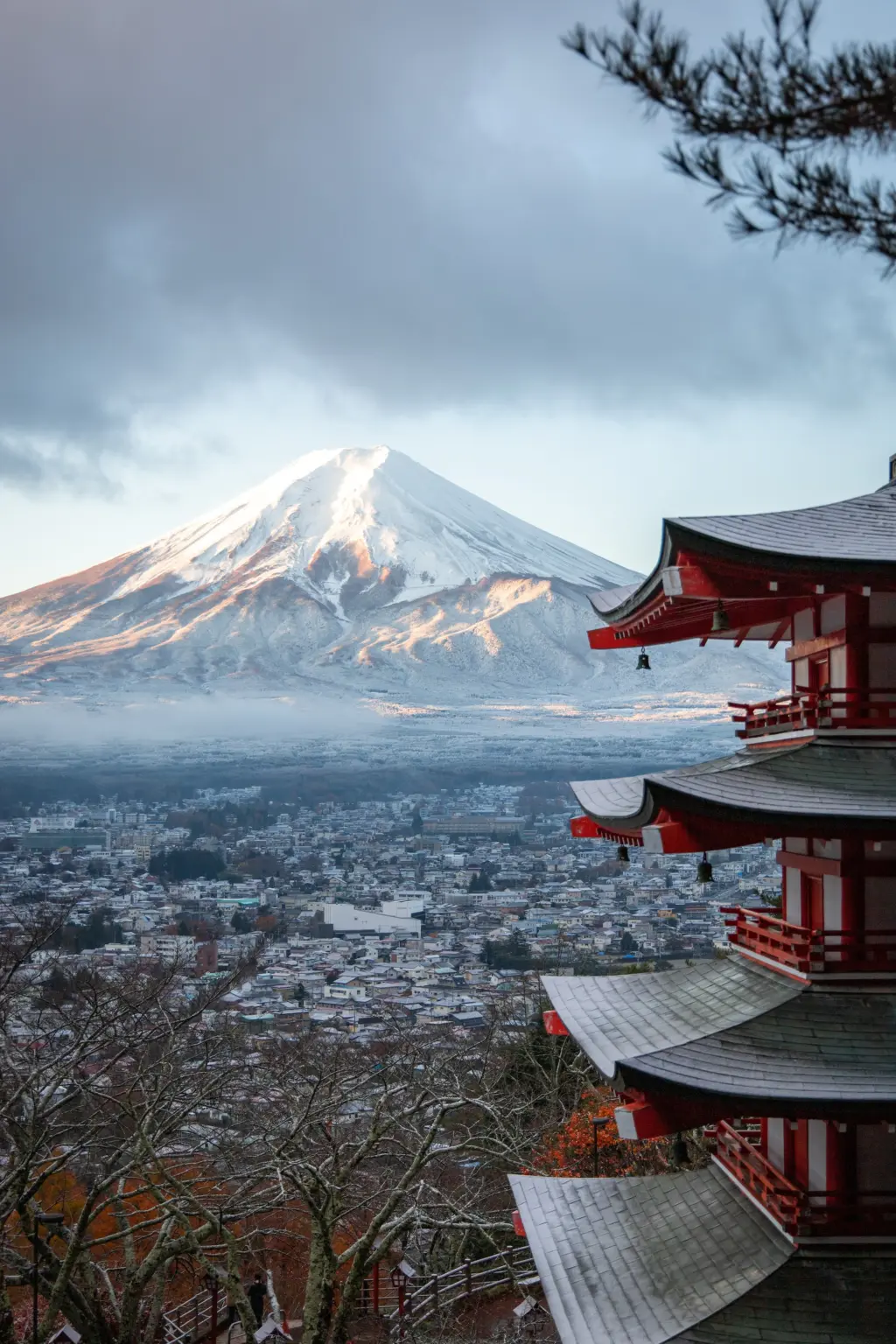
3. Arakurayama Sengen Park
Arakurayama Sengen Park is home to the Chureito Pagoda, a five-storied pagoda that was built as a peace memorial in 1963.
It is part of the Arakura Sengen Shrine complex, a Shinto shrine dedicated to the worship of Mt. Fuji, and it offers one of the most iconic views of Mt. Fuji, particularly during the cherry blossom season when over 600 cherry trees bloom around the pagoda, or during the autumn when the leaves change colors.
It has become one of the most photographed spots in Japan , and I’m sure everyone has seen that shot at one point whether it’s on a post-card or a cover of a magazine.
Reaching the Chureito Pagoda requires a climb of 398 steep steps, but the reward is a view that captures the essence of Japan.
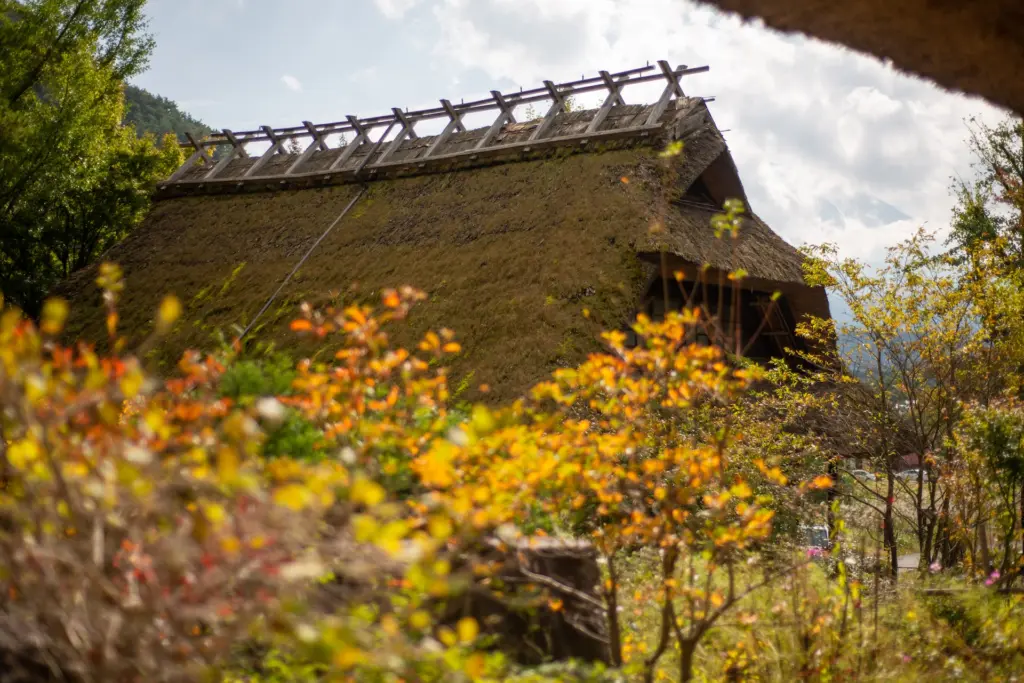
4. Saiko Iyashi-no-Sato Nenba
Saiko Iyashi-no-Sato Nenba is a picturesque open-air museum located on the banks of Lake Saiko, another one of the Fuji Five Lakes.
This charming village offers an incredible insight into traditional Japanese culture, as well as the stunning natural beauty of the area.
Originally, Saiko Iyashi-no-Sato Nenba was a farming village until it was destroyed by a typhoon in 1966.
In an effort to preserve the cultural heritage, it was reconstructed into a museum that showcases over 20 traditional thatched-roof houses.
Within these historical structures, various workshops are conducted, allowing you to dive into the world of traditional Japanese arts and crafts. From pottery and indigo dyeing to weaving and papermaking, you have the opportunity to learn and create with the guidance of expert artisans.
Furthermore, the village itself is designed as a living exhibit, as you’ll find gardens with native plants, koi ponds, and stone pathways that add to the calming atmosphere.
A walk through the village can feel like stepping back in time, allowing you to appreciate the slow and careful life that once dominated this region.
Cost: 500 JPY
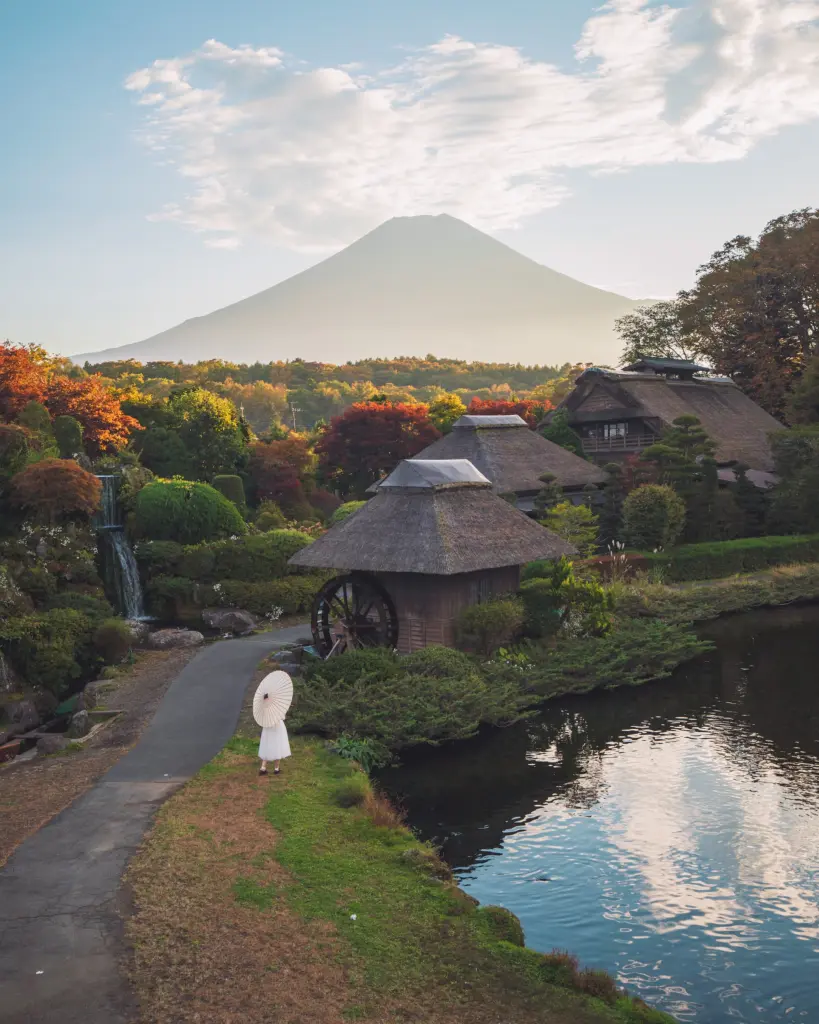
5. Oshino Hakkai
Oshino Hakkai is another tranquil village, renowned for its eight natural springs.
These springs are fed by the melting snow of Mt. Fuji, and the water that filters through the volcanic rock over decades emerges in Oshino Hakkai as crystal-clear ponds, filled with unique aquatic plants and fish.
The water is so pure that it’s considered one of the 100 Best Springs of Japan!
Each of the eight ponds has a distinct character, with different depths and clarity, and they are all connected through a network of gentle streams. Walking paths meander through the village, allowing you to explore these natural wonders at a leisurely pace.
The largest pond, Wakuike, is particularly famous for its exceptional clarity and amazing aesthetic with the traditional houses as a backdrop.
The village itself, framed by traditional thatched-roof houses, offers a snapshot of rural Japanese life, preserving the customs and architecture of a bygone era.
Many of the old farmhouses are now shops or restaurants, and you can sample local specialties, like the fresh-water delicacies cooked to perfection or the renowned “yokan,” a sweet bean jelly.
You can join Mt. Fuji tours that include Oshino Hakkai through here .
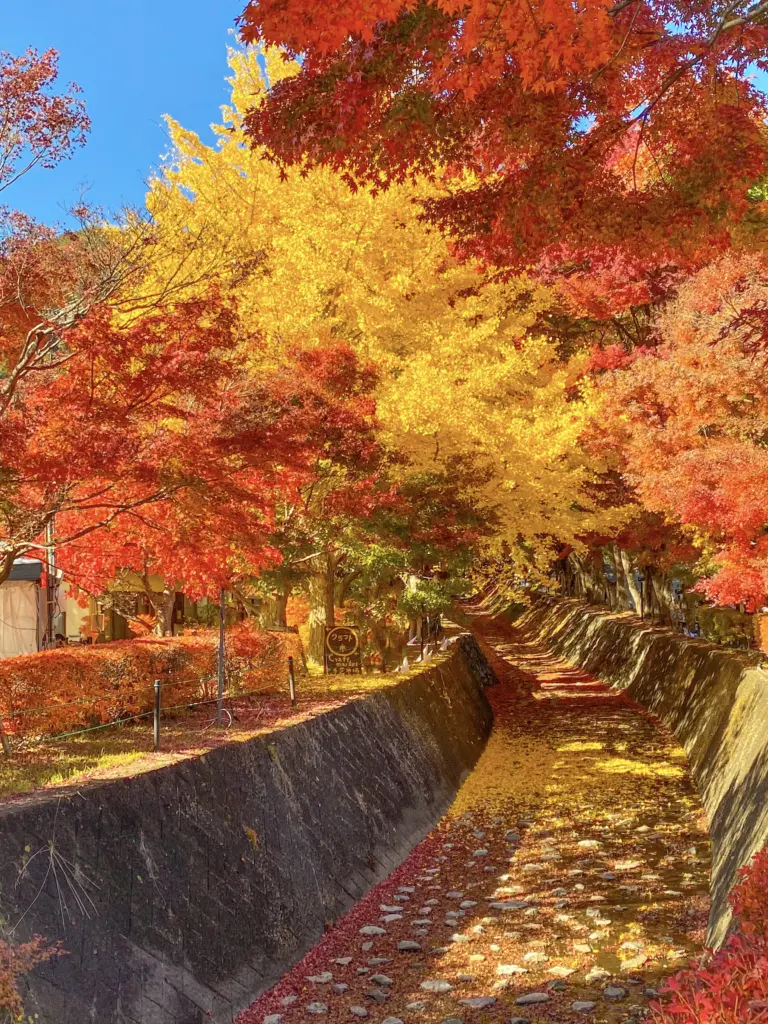
6. Momiji Corridor
If you’re planning on visiting in autumn, then the Momiji Corridor is where you have to go.
It’s actually the place that drew me in the first place.
The Momiji Corridor, Momiji meaning Maple, is a picturesque pathway lined with brilliant maple trees on both sides. Though the crowds can be quite daunting, going through this fiery canopy of red, orange, and yellow is a beautiful experience. The trees arch over the pathway, forming a natural tunnel that’s a feast for the eyes.
During fall, the corridor hosts the Kawaguchiko Momiji Festival, an event celebrating the autumn colors. Stalls selling local food and crafts line the streets, and the area is illuminated at night, creating a magical ambiance that extends into the evening.
7. Kitaguchi Hongu Fuji Sengen Shrine
Tucked away in the dense forest at the base of the Mt. Fuji, this Shinto shrine is a place steeped in a mystical aura that seems to permeate the entire complex.
Originally established over 1900 years ago, the Kitaguchi Hongu Fuji Sengen Shrine is one of the starting points for the Yoshida Trail, the route that countless pilgrims and hikers have taken over the centuries to reach the summit of the sacred mountain.
The shrine’s architecture is stunning, with its intricately carved wooden gates, moss-covered stone lanterns, and timeless buildings that wear the patina of history with grace. The main hall, built in the traditional Nagarezukuri style, is designated as a cultural property.
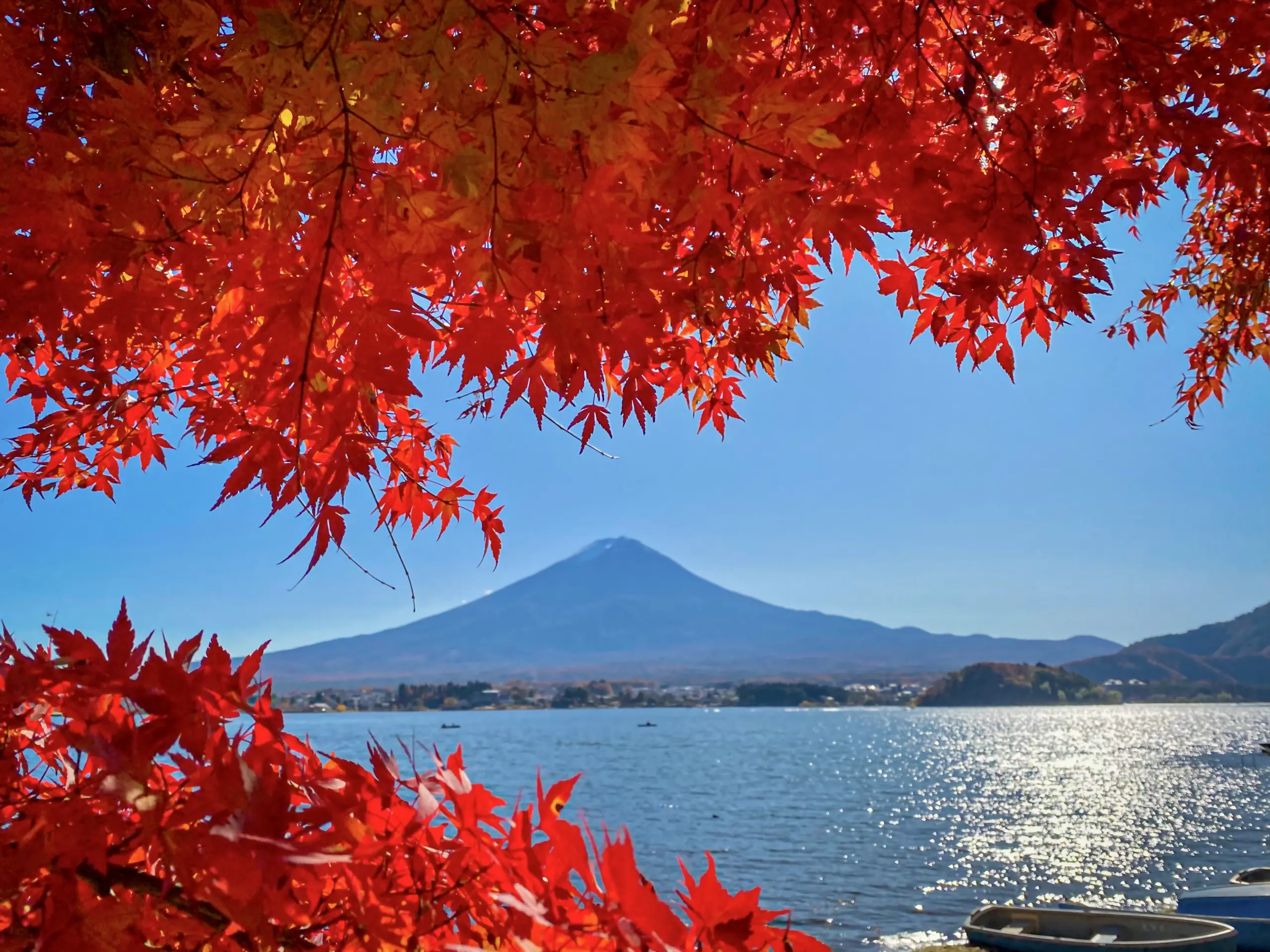
8. Oishi Park
Nestled on the northern shores of Lake Kawaguchi, Oishi Park offers a panoramic spectacle that’s forever etched in many hearts.
Oishi Park is a sensory delight that changes with the seasons. During spring, the area blooms with colorful tulips, while summer brings on the fragrant lavender fields.
Autumn transforms the park into a kaleidoscope of reds from the kochia and in winter, you can see the snow-capped summit of Mt. Fuji in all its glory.
No matter what draws you to Oishi Park, whether it’s the seasonal blooms, the striking landscape, or simply the calm that comes from being in a beautiful natural setting, it always seems to offers an enriching experience.
It’s also one of the few places where I found a restaurant while cycling around Lake Kawaguchi.
Where to Stay in Kawaguchiko
Kawaguchiko is home to some of the most home-y and not to mention tranquil establishments, most of them offer unparalleled views of Mt. Fuji with Lake Kawaguchi just right in front of your window.
During the summer, when it’s the peak time to climb Mt. Fuji, Kawaguchiko’s prices tend to sky-rocket so it would be best to book accomodations at a less busy season.
Nevertheless, here are some of my curated recommendations if you’re staying in the area:
Best Hotels in Kawaguchiko :
- Fujikawaguchiko Resort Hotel – offers a range of amenities including a garden, free private parking, and an on-site restaurant. You can benefit from free shuttle services, luggage storage, and complimentary WiFi throughout the property. The hotel’s air-conditioned rooms come equipped with practical amenities like a desk, electric tea pot, fridge, safety deposit box, flat-screen TV, and a private bathroom with a bidet. The multilingual staff, speaking English, Japanese, and Chinese, are readily available to assist.
- Fuji Osenji Yumedono – this luxurious ryokan offers an exclusive experience with features such as in-room hot springs, traditional Japanese cuisine in the dining area, and a beautiful garden. The ryokan’s well-appointed suites boast private outdoor hot-spring baths (onsen), flat-screen cable TV, DVD player, and essential amenities like a bathtub and hairdryer in the private bathroom.
- Hananoyado Yumefuji – offers a unique accommodation experience with each room featuring a private garden with a terrace.This villa ensures you’ll have modern conveniences, with air-conditioned rooms that include a wardrobe, flat-screen TV, private bathroom with free amenities, and a kitchenette complete with a fridge. Breakfast is thoughtfully provided daily as a morning basket (bento).
Best Hostels in Kawaguchiko :
- Hostel Michikusa-ya – enjoy the convenience of free private parking and the relaxation of a shared lounge and garden. The air-conditioned rooms, equipped with shared bathrooms, come with complimentary WiFi access. The property features a shared kitchen, along with free shuttle service and luggage storage.
- Kagelow Mt. Fuji Hostel – designed to cater to travelers from across the globe. Once an old hotel, it has been rebuilt into a hostel that embraces a modern Japanese-style concept, infusing it with a touch of traditional Japan. The renovation of the hostel involved using wood from a 150-year-old Japanese house, retaining the charm of old Japanese materials and traditional items, such as Tatami mats, which add a relaxed feel to the rooms.
- Dot Hostel & Bar – this hostel is built on the concept of encouraging everyone to meet new people, explore new cultures, and have new experiences, the property offers a lively and inviting atmosphere. The wide lobby space, filled with many board games and a big screen, serves as a common area to socialize. There is also a bar on-site where guests can indulge in local beer and Japanese sake.
Hidden Gems in Kawaguchiko
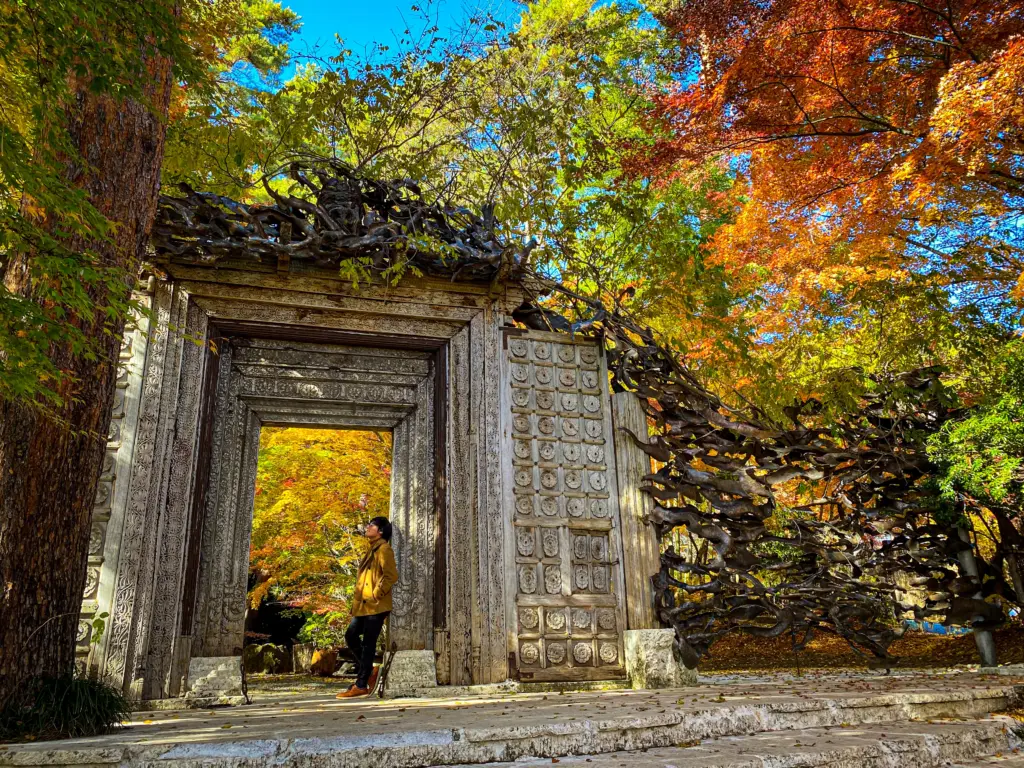
9. Kubota Itchiku Art Museum
The Kubota Itchiku Art Museum stands as a showcase for the works of Itchiku Kubota, an extraordinary textile artist who revived and transformed the ancient kimono-dyeing technique known as “Tsujigahana.”
The museum itself is a piece of art, from the decidous main gate to the elegant wooden architecture that blends seamlessly with the surrounding natural beauty.
Inside, the main exhibition hall holds an awe-inspiring collection of Kubota’s masterpieces. His most famous work, the “Symphony of Light,” is a series of kimonos that together form a stunning panorama of Mount Fuji across different seasons.
Cost: 1,300 JPY
10. Lawson At Kawaguchiko Station
A Lawson might seem like an odd recommendation, as it’s essentially a convenience store located near the Kawaguchiko train station.
Yet, it has become something of a local landmark and its aesthetics.
What sets this particular Lawson apart from others is its strategic location and spectacular view of Mt. Fuji. Positioned just right above the store stands an unobstructed, picture-perfect view of Japan’s iconic peak.
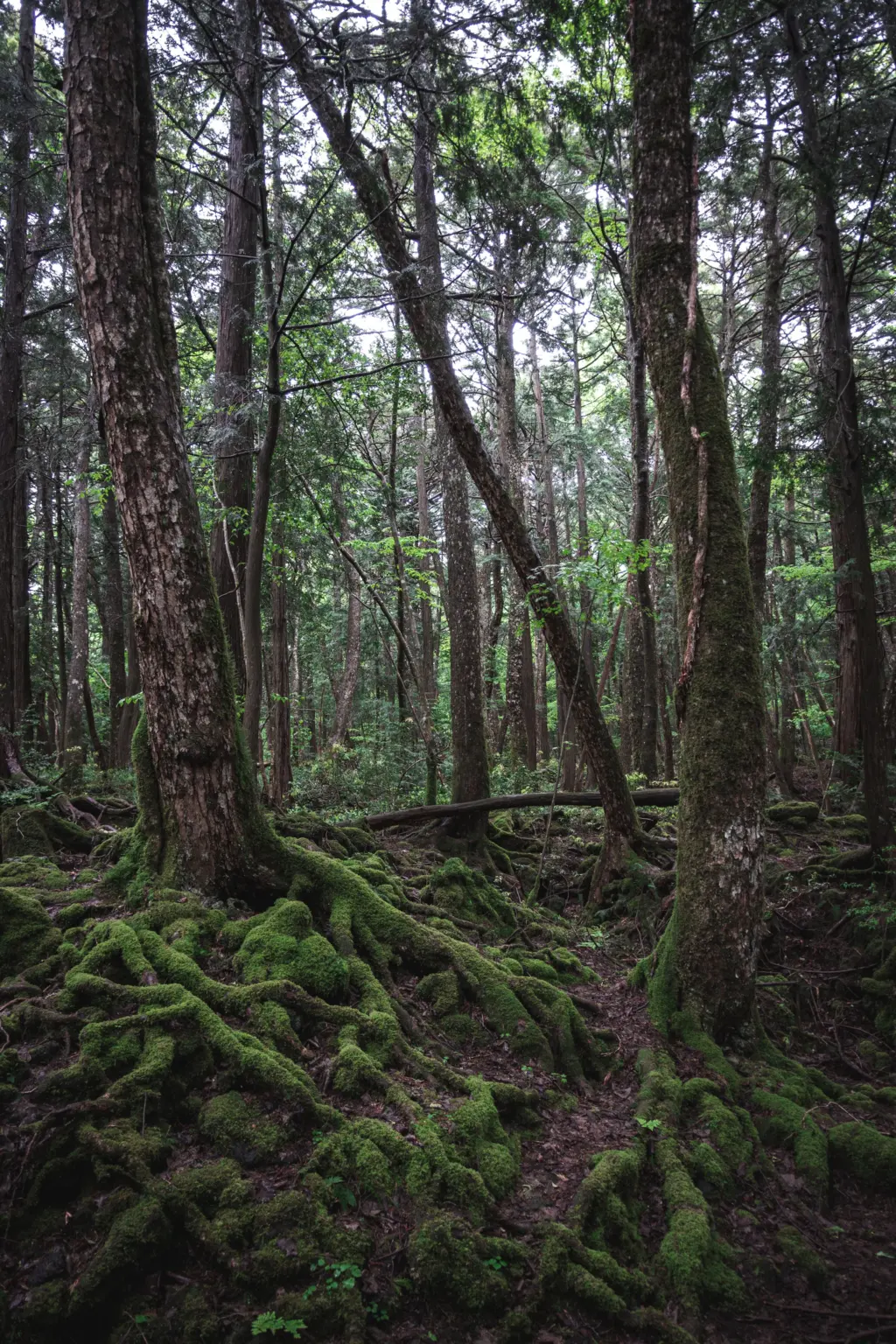
11. Aokigahara Forest
Aokigahara Forest is lovingly known as the “Sea of Trees”. It’s a vast forest that sprawls at the base of Mt. Fuji.
Covering an area of around 35 sq km (14 sq mi), Aokigahara Forest is unique in its terrain. The ground is uneven and filled with caverns and crevices since it formed on top of hardened lava following an eruption of Mt. Fuji over a millennium ago.
The forest is so dense that it can become nearly dark in broad daylight, and the absence of wildlife creates an uncanny silence.
As many might know, this beautiful forest has a darker side. Aokigahara has become known as a place where people go to end their lives, and this reputation deeply overshadows the forest’s natural beauty.
Nevertheless, there are plenty of trails that are safe for public use, you can also join guided tours as well if you’re afraid of getting lost.
12. Narusawa Ice Cave
The Narusawa Ice Cave was formed over 1,150 years ago following an eruption of Mt. Fuji. Legend has it that it’s connected to the Iwaya Caves of Enoshima , all the way in Kamakura !
As you descend into the depths of the cave, the temperature drops significantly, and the walls become adorned with these striking icicles even during the summer months.
The cave maintains a constant temperature of around 3°C (37°F), preserving its icy features year-round. The passage through the cave leads you through narrow and twisting paths, and the glistening ice contrasts beautifully with the dark, rocky surroundings.
In the past, the ice from the cave was considered sacred and used in various ceremonies at the Imperial Court. It was also utilized to store silkworm eggs, as the constant cold temperature provided the ideal conditions for preservation.
Though the walk is not particularly long (10 minutes), the cave’s low ceilings and narrow passages can still make it a very memorable experience.
Cost: 350 JPY
Top Things to Do in Kawaguchiko
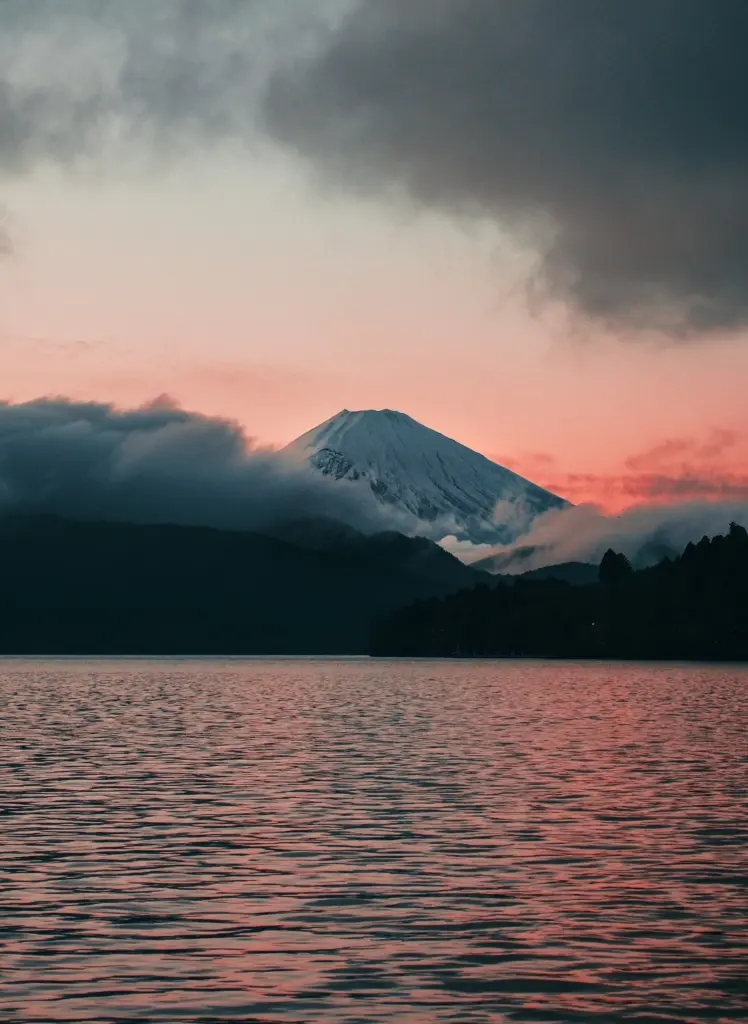
13. Take Beautiful Photos of Mt. Fuji
Capturing the grandeur of Mt. Fuji is an experience that many travelers to Kawaguchiko yearn for, and it’s easy to see why.
As Japan’s highest peak and an iconic symbol of the country, Mt. Fuji presents a majestic sight that inspires anyone who catches a glimpse of it. I can never get tired of Mt. Fuji, no matter how many times I’ve already seen it.
The region around Lake Kawaguchi provides numerous vantage points to frame Mt. Fuji in all its glory. Depending on the season and weather conditions, the mountain’s appearance can change dramatically, offering unique opportunities to practice your photography composition .
During the early morning, when the air is crisp, you might capture Mt. Fuji with a perfect reflection in the calm waters of Lake Kawaguchi. In the autumn months, the colorful foliage of the nearby forests adds a vibrant contrast to the snow-capped peak.
Winter brings clear skies and a stark, monochromatic beauty, while spring offers a chance to photograph the mountain with cherry blossoms in the foreground.
14. Shred Some Powder at Fujiten Snow Resort
If you’re visiting Kawaguchiko in the winter and have a love for snow sports, Fujiten Snow Resort is a destination that should not be missed. It’s one of the few snow resorts that can be easily done as a day trip from Tokyo.
Fujiten Snow Resort boasts well-maintained slopes that cater to various skill levels, its got gentle trails and some challenging runs. It’s here that I first tried to ride a snowboard, only to fail miserably. I later tried my hand at it again at Niseko , where I was finally able to thrive !
The resort’s elevation ensures good snow quality throughout the season, and the modern snowmaking equipment supplements the natural snowfall, keeping the trails in excellent condition.
There’s also an indoor “Kids Land” where little ones can play with sleds and other snow toys.
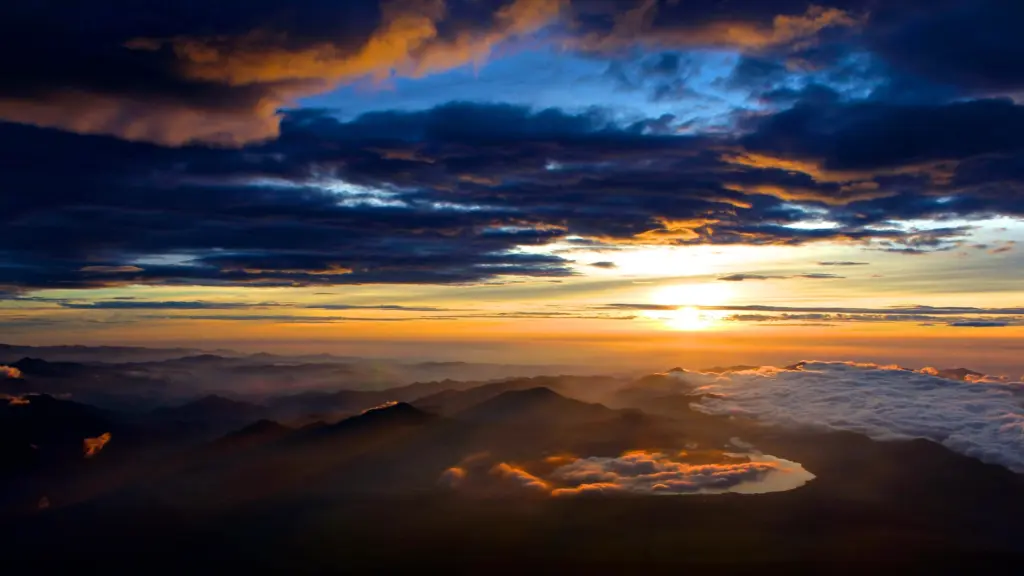
15. Paraglide Around Mt. Fuji
The Asagiri Kogen Paragliding School provides the unique opportunity to soar through the skies, with Mt. Fuji as the awe-inspiring backdrop.
Located on the Asagiri Plateau, this school offers paragliding experiences for both beginners and seasoned fliers. The professional and highly experienced instructors guide will guide you through the entire process, ensuring safety and comfort at all times.
For those new to paragliding, tandem flights with an instructor are available. These allow you to enjoy the thrill of flight without the need for prior experience. Strapped securely to a qualified instructor, you’ll launch from the gentle slopes of the plateau and rise into the air, carried by the wind and thermal currents.
As you ascend, the view of Mt. Fuji becomes increasingly breathtaking, appearing almost surreal as it dominates the horizon.
16. Relax in an Onsen with a View
Relaxing in an onsen while enjoying the majestic view of Mt. Fuji is one of the quintessential experiences you can have in Kawaguchiko. Here’s a look at some onsens where you can indulge:
Fuji Yurari Onsen: Enjoy breathtaking views of Mount Fuji from the outdoor baths at this location. The unique setting offers exceptional vistas, particularly during sunset.
Benifuji no Yu: Bathe with a spectacular view of both Mount Fuji and Lake Yamanaka. This onsen allows you to connect with nature and enjoy the tranquility of the surroundings, all while indulging in soothing hot spring water.
Ishiwari no Yu: Known for its rocky interior, this onsen is surrounded by the beautiful forests of the Yamanaka area. It’s an ideal place to unwind and take in nature.
Koraku Onyado Fujiginkei: For an authentic ryokan experience, this traditional onsen ryokan offers beautiful garden views. The outdoor baths are set within a tranquil garden, adding to the charm.
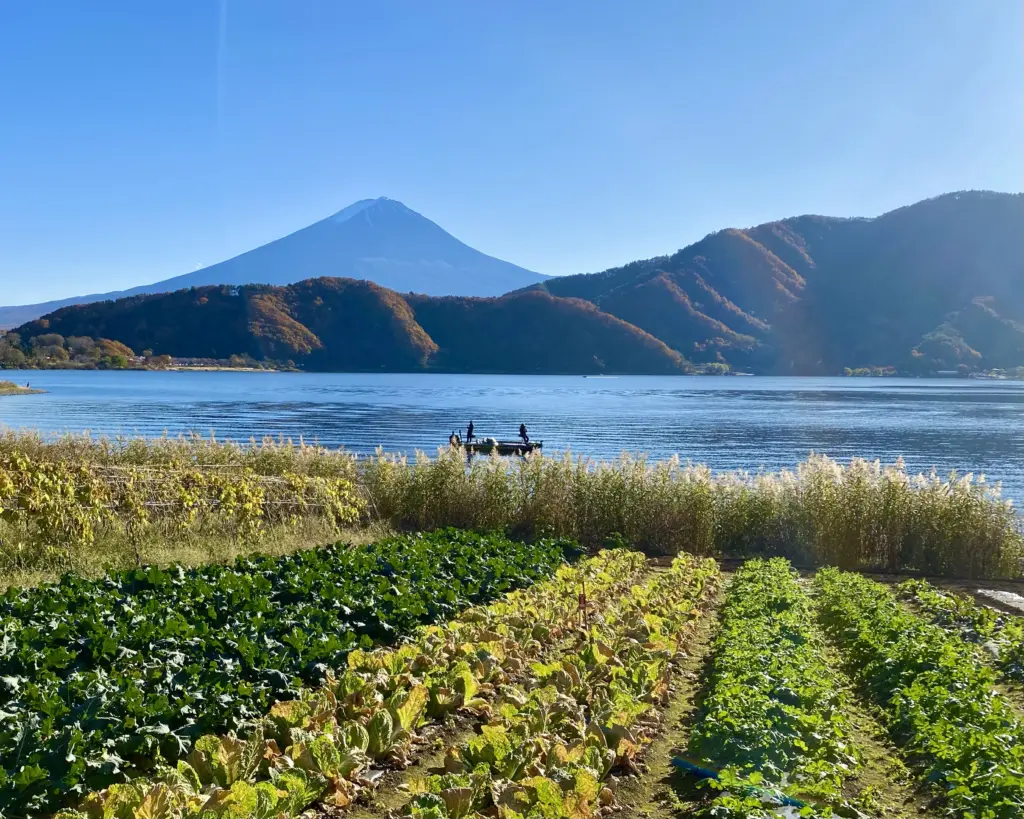
17. Cycle Around Lake Kawaguchi
The natural beauty of Kawaguchiko is something that not only can be seen but also felt as you pedal your way around the shimmering lake.
The cycling path around Lake Kawaguchi is approximately 20 km (12 mi) long and offers a pleasant route that’s suitable for riders of all levels. You can take it at a leisurely pace, pausing to take in the landscapes and going down at the various hot spots around the area.
Rental bikes are available near the station, with options ranging from standard bicycles to e-bikes. You might have to call to make a reservation or get there earlier to secure yourself a bike.
I did the cycling trip around autumn which is one of the best times to do it, in my opinion. You can read more at my post on Cycling Around Lake Kawaguchiko .
18. Ride the Mt. Fuji Panoramic Ropeway
Starting from the eastern shore of Lake Kawaguchi, the Mt. Fuji Panoramic Ropeway lifts you up to an elevation of about 1,075 m (3,525 ft), leading to the observatory at the summit of Mt. Tenjo.
The ascent itself is an exciting part of the experience, as you find yourself smoothly gliding over lush forests and terrains that gradually reveal a panoramic view of the area.
Once you reach the summit, the view is nothing short of breathtaking. The majestic Mt. Fuji stands tall in the distance, framed by Lake Kawaguchi’s sparkling waters and the vibrant hues of the land.
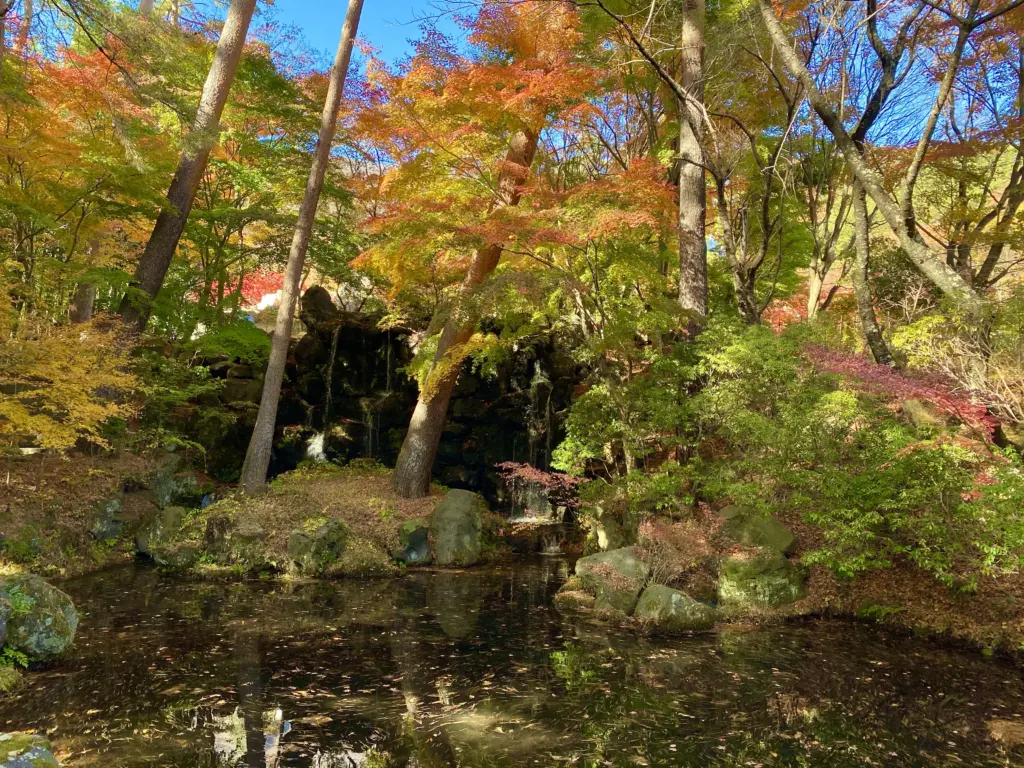
19. Go Museum-Hopping
From classic art to innovative displays, Kawaguchiko is packed with museums. Here’s a look at some of the top museums you can explore:
Yamanashi Gem Museum : If you’re fascinated by gemstones, this museum hosts an extensive collection of rare and beautiful gems from around the world.
Kawaguchiko Museum of Art : Showcasing contemporary Japanese and Asian art, this museum highlights local talents and offers changing exhibitions that keep the experience fresh.
Music Forest Museum : An enchanting museum that feels like stepping into a fairytale, it’s dedicated to automatic musical instruments and features beautiful gardens, live music performances, and more.
Yamanashi Prefectural Museum : This museum offers an insight into the history and cultural heritage of Yamanashi Prefecture, featuring archaeological artifacts, folklore, and more.
How to Get Around Kawaguchiko
- Bus: There are local and sightseeing buses, including the Omni, Fujikko, Mt. Fuji World Heritage Loop, and regular buses.
- Rental Car: Car rental services are recommended if you’re someone who prefers to drive and explore at the area at your own pace.
- Bicycle: As mentioned before, bikes are a great way to explore the lakeside.
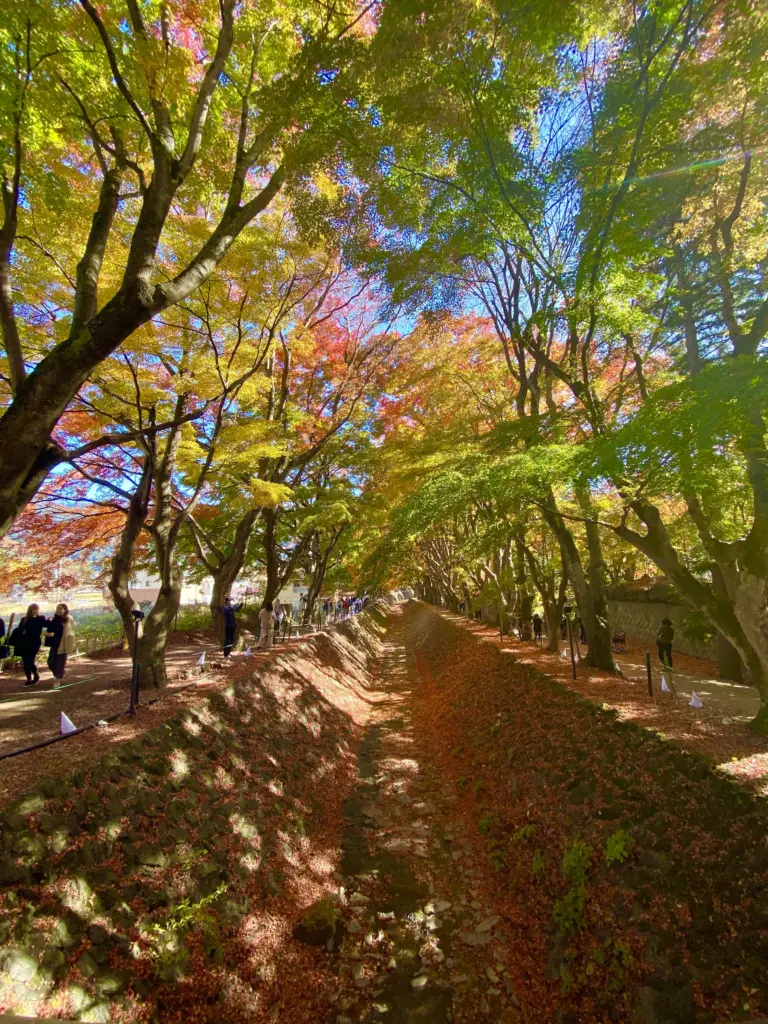
Best Time to Visit Kawaguchiko
- Spring (March to May): With cherry blossoms blooming, spring offers stunning views of Mt. Fuji paired with the colorful scenery. The temperatures are mild, and the weather is generally pleasant.
- Summer (June to August): Summer is famous for being Mt. Fuji climbing season. Plus, the area around Kawaguchiko tends to be not too hot nor humid so it’s still a good time to visit.
- Autumn (September to November): Autumn brings vibrant fall foliage, and is arguably one of the best times to visit though that just may be my biased opinion.
- Winter (December to February): Winters are cold but clear, often providing the best views of Mt. Fuji.
When planning your trip to Kawaguchiko, consider securing your journey with SafetyWing Insurance . SafetyWing offers comprehensive travel insurance that covers medical emergencies, trip cancellations, and other unexpected events. Click the link to explore their packages and ensure a safe and worry-free travel experience.
How to Get to Kawaguchiko
From Shinjuku Station: Fujikyu and Keio Bus run about two direct buses per hour from Shinjuku Bus Terminal to Kawaguchiko Station. The trip takes slightly under 2 hours and costs 2000 yen. Buses may also continue to Lake Yamanakako.
From Tokyo Station: Buses operated by Fujikyu and JR Kanto Bus connect Tokyo Station (Yaesu South Exit) with Kawaguchiko Station, about 1 to 2 times per hour. The journey is 2 hours long and costs 2000 yen.
From Shibuya Station: Fujikyu offers a service every two hours from Shibuya (Mark City) to Kawaguchiko Station, Fuji Q Highland, and Fujisan Station. Expect a 2 to 2.5-hour trip, costing 2000 yen.
From Shinjuku Station: Start by taking the JR Chuo Line to Otsuki Station (70 minutes, 2360 yen for direct limited express; 100 minutes, 1340 yen for local trains). Then transfer to the Fujikyu Railway Line to reach Kawaguchiko Station (55 minutes, 1170 yen).
Direct Limited Express Trains: A few direct limited express trains operate daily between Shinjuku and Kawaguchiko. These take about 2 hours, costing around 4000 yen, and seat reservations are mandatory.
Alternatively, you can also join tours departing from Tokyo that will take you to Mt. Fuji and Kawaguchiko such as this 1-Day Scenic Bus Tour .
- There is also a Private Tour available for a more intimate experience.
Plan Your Trip to Japan | Best Travel Resources
Book Your Accommodations
- Booking.com – the world’s leading online booking platform for accomodations around the world, they have an extensive amount of available listings with zero booking fees and best price guarantees.
- Hostelworld – a backpacker’s best friend, Hostelworld has the largest collection of hostels and guesthouses for affordable prices.
Don’t Forget Insurance
- SafetyWing – from Nomad Insurance, an insurance by nomads for nomads. They understand our lifestyle well and have really comprehensive and flexible plans that cater to any traveler.
Find Cheap Flights
- Kiwi.com – my go-to for booking and finding the cheapest flights and it’s helped me save tons of money. They do virtual interlining which is connecting flights from airlines that do not codeshare, so you can find routes that you wouldn’t be able to find normally.
Join Tours & Activities
- GetYourGuide – is one of the best places to find unique tours and activities. I found that it’s an excellent way to meet fellow travelers and create fond memories. They are not only limited to tours as they also offer niche services such as skip-the-line tickets or private transfers.
Catch a Ride
- Rentalcars.com – nothing beats the freedom of the road, Rentalcars.com is the world’s largest online car rental service. They operate across 160 countries so they’re the perfect partner to work with if you find yourself wanting a ride.
SHARE THIS POST
Read this next.
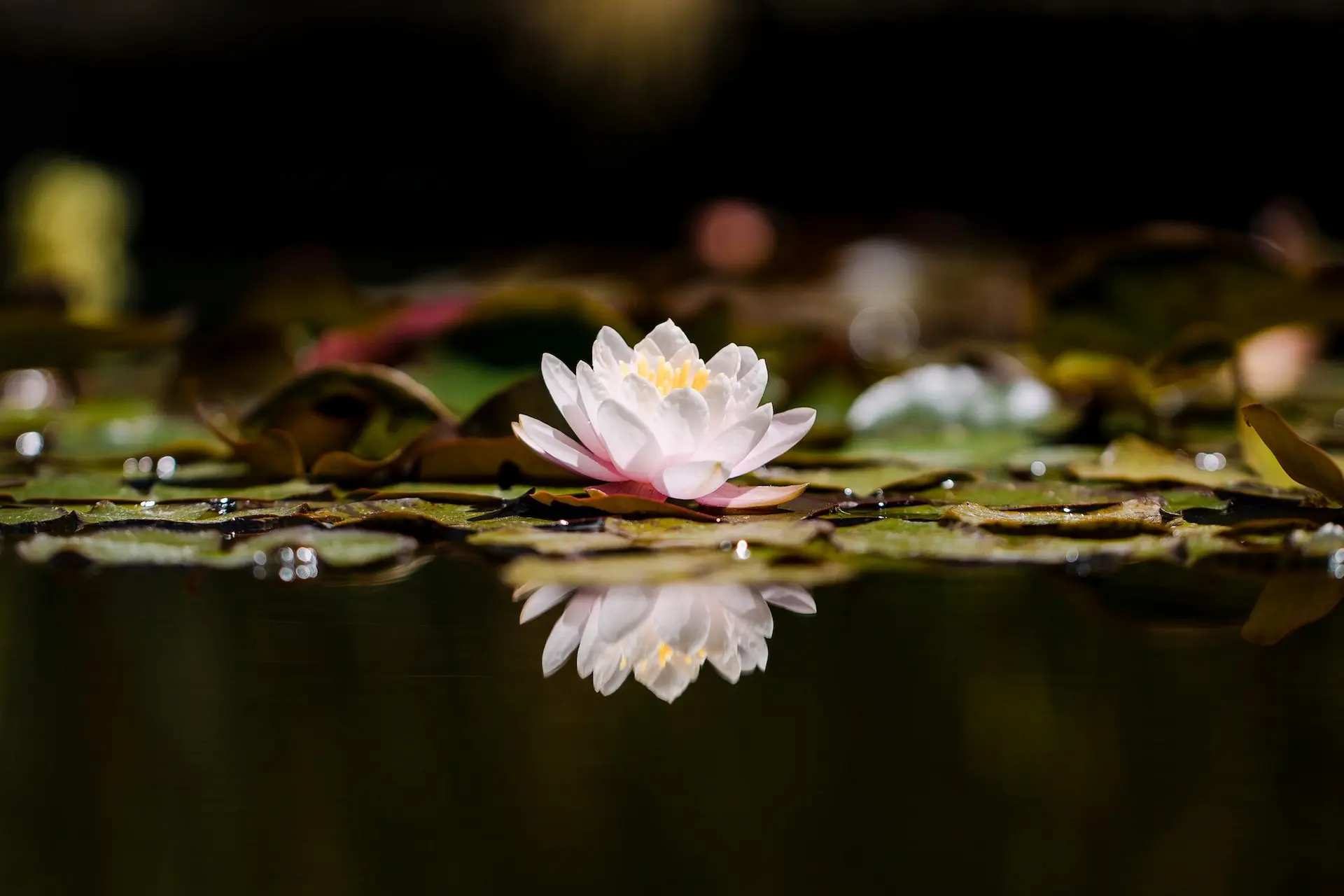
The Symbolism & Significance of the Lotus Across Cultures
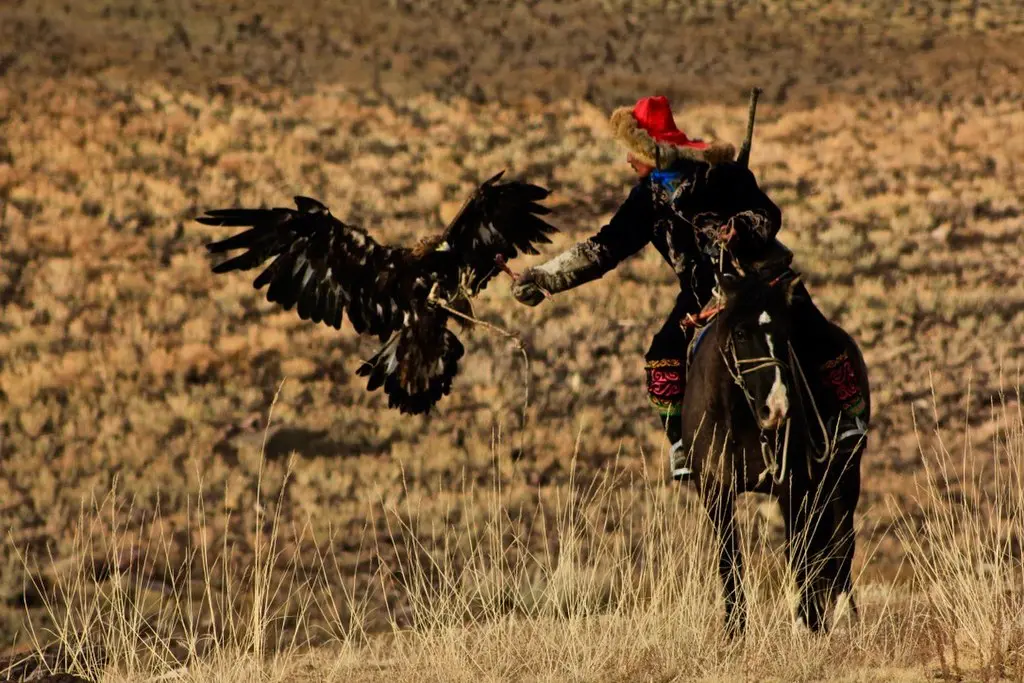
Mongolian Nomadic Culture | Traditions, Customs & Etiquette
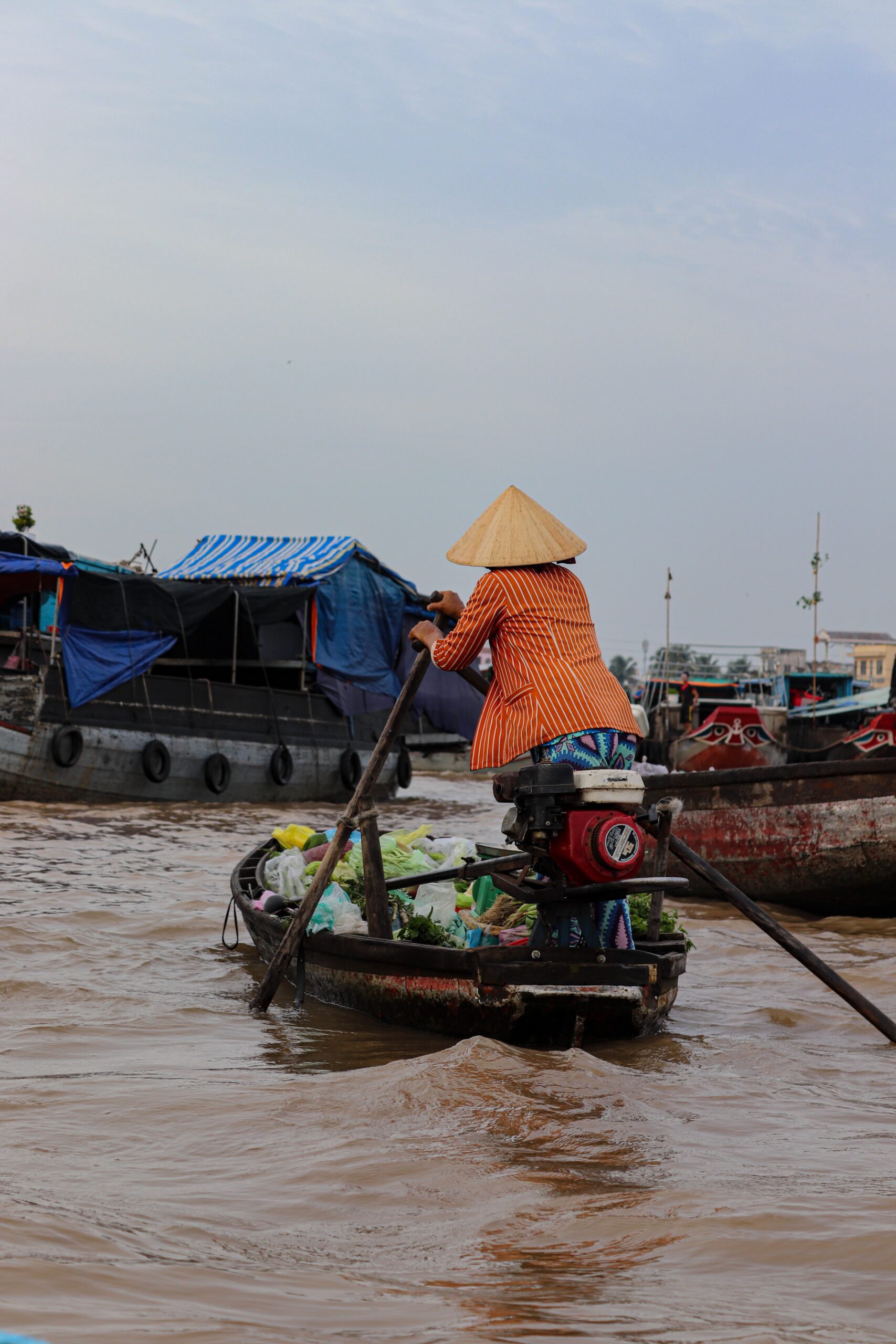
What to Know About Vietnamese Culture | from Food to Customs

Leave a Reply Cancel reply
Your email address will not be published. Required fields are marked *
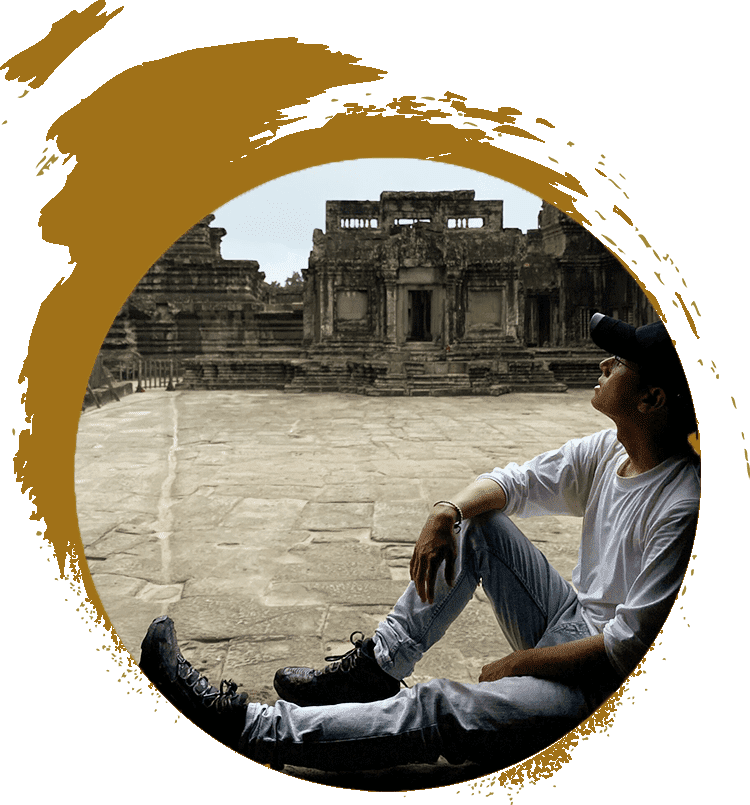
Hi, I’m Brandon
A conscious globe-trotter and an avid dreamer, I created this blog to inspire you to walk the Earth.
Through tales of travel, cultural appreciation, and spiritual insights, let’s dive into the Human Experience.
RECENT ARTICLES
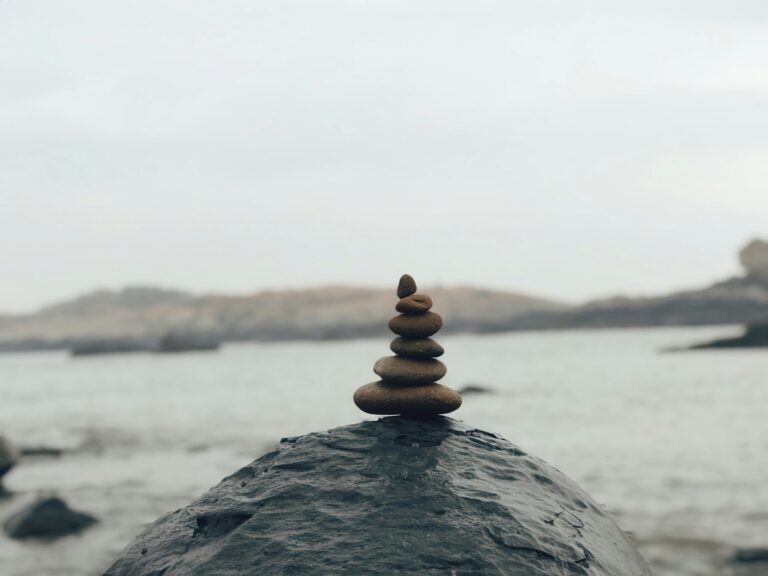
The Spiritual Meaning of Stacking Stones & Why People Do It
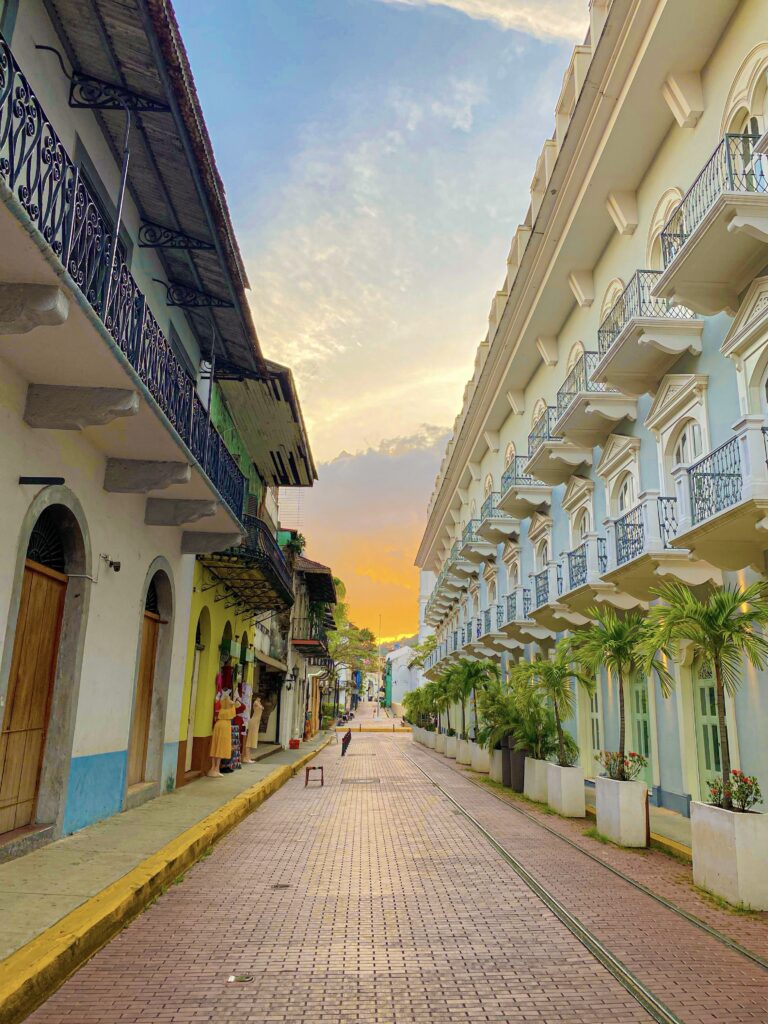
12 Awesome Things to Do in Casco Viejo, Panama
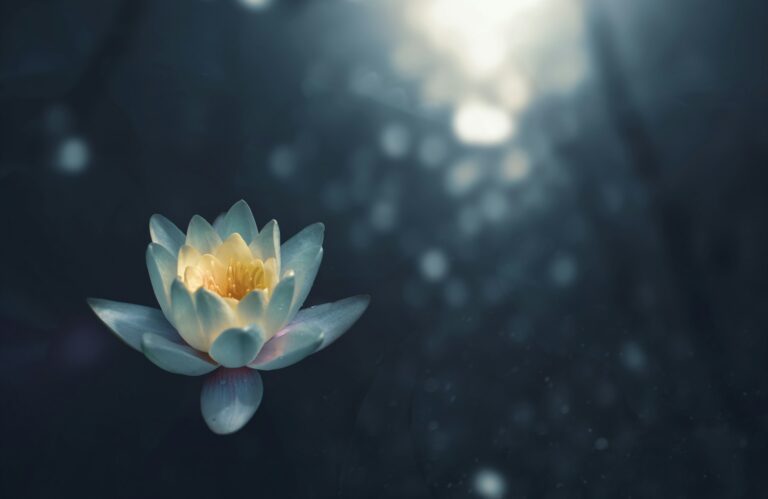
5 Easy Steps to Create a Meaningful Sankalpa
Popular articles.
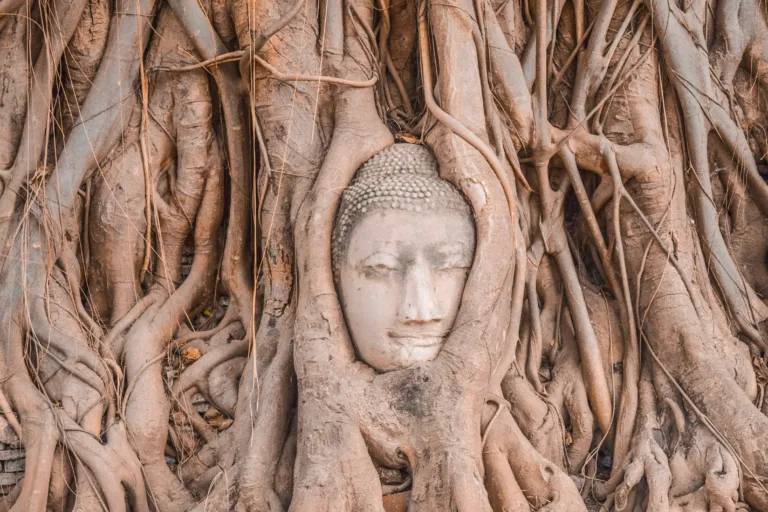
3 Schools of Buddhism | Theravada vs Mahayana vs Vajrayana

How to Balance Your Chakras: A Guide to Our 7 Energy Centers
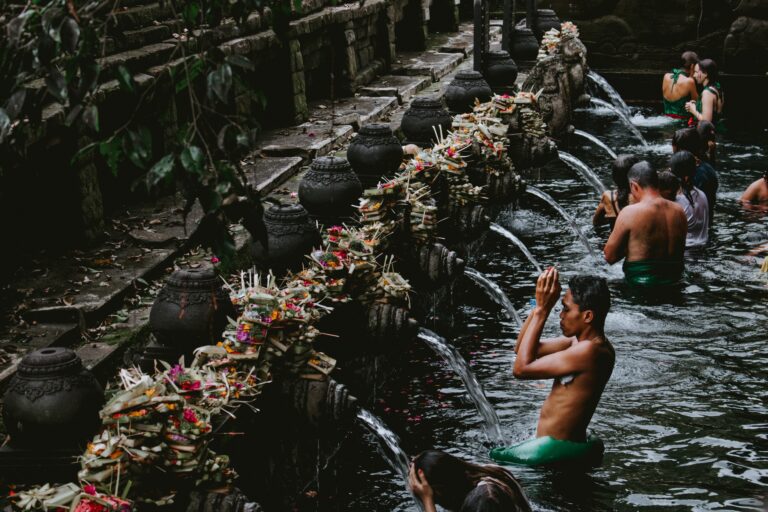
22 Wonderful Things to Do in Ubud | Ultimate Travel Guide
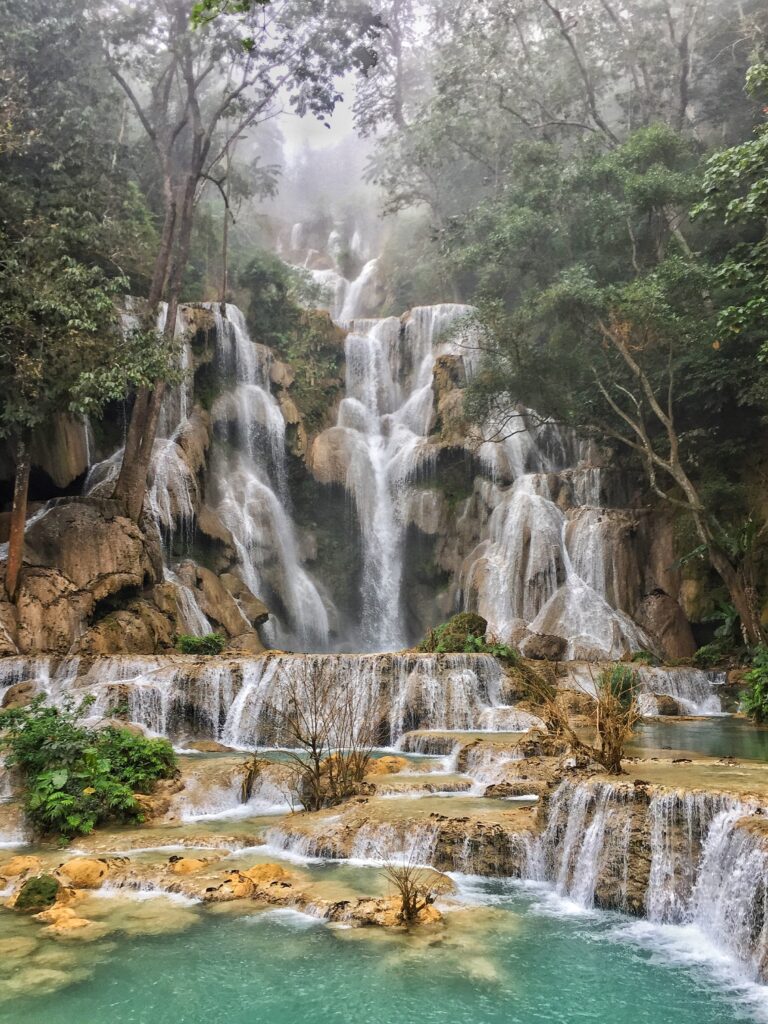
Discover the Best of Laos: Your Ultimate Travel Guide (2024)
Subscribe for the latest blog drops, photography tips, and curious insights about the world.

© 2023 ALL RIGHTS RESERVED.
- Destinations
- Privacy Policy
Want to get in touch? Feel free to fill in the form below or drop me an e-mail at [email protected]
Truly Tokyo
A Tokyo Travel Guide
A Day Trip to the Mt. Fuji Area: Lake Kawaguchiko
There are a number of places to enjoy stunning views of Mt. Fuji, and one of the most accessible from Tokyo is Lake Kawaguchiko. Make the most of a day trip out to the area with this one-day itinerary.

There are many places to enjoy stunning views of Mt. Fuji, but few are as picturesque an area as Lake Kawaguchiko. Not only is it remarkably beautiful, there’s plenty to do in the area too. Active folks will want to cycle, hike, or go fishing; while those who prefer more leisurely activities might like to explore the many museums surrounding the lake.

Our itinerary takes you on a leisurely exploration of some great sights in the Lake Kawaguchiko area - with plenty of opportunities to enjoy the view of Mt. Fuji.

Notes Before You Go
- One of the most economical ways to travel to and from the Mt Fuji area is by highway bus from Shinjuku Station to Kawaguchiko Station. A single journey is JPY1750 and takes approximately 1 hour 45 minutes from the Shinjuku Bus Terminal. Return or one-way tickets can be booked online on the Highway Buses Japan site. You can also buy your ticket back to Shinjuku at Kawaguchiko Station once you’re there, though you may have fewer options on the day itself.
- We suggest taking an early morning bus - departing around 7:30am or so - to arrive at around 9:30am. This will give you a full day in the area.
- Bear in mind that the bus journey returning to Tokyo in the evening can coincide with rush hour, depending on your timing. Traffic conditions can slow down the journey considerably and take up to 3 hours. If you’d rather get back to Tokyo faster and don’t mind paying a little extra, consider taking the train.

- For getting around the Lake Kawaguchiko Area, we recommend purchasing a bus pass that gives you unlimited rides on the “Retro Bus” sightseeing bus lines. (A PDF version of the bus map can be found here and saved to your phone for easy access.) The stop numbers in this itinerary refer to the map of the Red Line in this PDF. Buses along the line operate at 15-minute intervals, so you’re never left waiting long before the next one comes along.
- The pass costs just JPY1500 and is valid for two days. It’s fantastic value even if you’re not staying overnight in the area. A one-way ride from the first stop to the last stop on the Red Line, for instance, costs JPY480. On a day trip, it’s entirely possible to recoup the cost if you use it frequently enough. Just show this pass to your driver every time you alight.

- An alternative if you’d rather have a more active day is to rent bicycles from the shop near Kawaguchiko Station. A non-electric bicycle costs JPY1500 to rent for the day, and you could easily do this itinerary on a bike rather than taking the bus. On a clear, cool day, this might be a good choice for the more athletic traveler. There aren’t dedicated cycle paths, however, so you’ll either be on normal roads or the pavements.
- Itinerary timings are approximate. Adjust them to suit your schedule. Add or subtract places from this itinerary as you prefer, but it’s generally better to enjoy a few places properly than to sprint through many places. The most important thing is to ensure that you’re back at Kawaguchiko Station in good time to catch your bus back to Shinjuku.

7:45am Shinjuku Bus Terminal
The easiest way is to find the Shinjuku Bus Terminal is to take the South Exit 南口 from JR Shinjuku Station. Once you’re outside the ticket gates, walk outside to street level.

You’ll see a building opposite the South Exit that looks like this. Cross the road and take the elevator up to the 4th floor as indicated in the photo (or the escalators).

Once you emerge from the escalator, there’ll be a map a little to your left showing you where the various bus stops are. Buses to the Mt. Fuji area typically depart from stops B5 or B6.
Sometimes it won’t be entirely clear which bus stop it is, but just bring your ticket to the bus station attendant and check with them. For this reason, it’s best to arrive at least half an hour before your bus is due to leave to give yourself extra time for the last minute things - like an extra cup of coffee from Family Mart.

9:30am Arrive Kawaguchiko Station
Once you alight at Kawaguchiko Station, the first thing you should do is to pick up a bus pass. You’ll want the 2-day sightseeing pass that’s valid across all lines - whether it’s the red, green, or blue lines.

While optional, you could pick up a copy of this tourist booklet. There are short guides to sights and restaurants in the area, and an overall map of the area at the back of the booklet. You’ll find this at the tourist information counter.

10:00am Mt. Kachikachi Ropeway to Tenjoyama Park
The cable car up to Tenjoyama Park, from where you’ll see a super view of Mt. Fuji, is actually about a 15-minute walk from Kawaguchiko Station. Since it’s the 11th stop on the line, riding the bus will take you on a more circuitous route. Both the bus ride and the walk are about 15 minutes. Alight at Stop 11.

On busier days, there might be a long queue snaking up the staircase. Have someone else in your group wait in line while you head upstairs to buy cable car tickets at the machine - it’s a JPY800 return journey. Cable cars run every 5-10 minutes, so you shouldn’t have to wait too long. It’s a 3-minute ride to the top of Mt. Tenjoyama.

On a clear day, the view from the observatory deck is pretty impressive - even if the top of Mt. Fuji happens to be obscured by a passing cloud.

Take a few minutes to poke around the kitschy rabbit and tanuki-themed shrines and souvenir shop before heading back down. For the energetic, there’s a gentle 40-minute hiking trail leading down from the top of the mountain, which is particularly pleasant in cooler weather.

11:30am Lunch at Hōtō Fudō
Once you’re done with the pretty views, take the cable car back down and return to Stop 11. Take the bus to Stop 17, which is outside the Music Forest Museum.

Cross the road and head towards the nearest intersection as pictured above. Cross the road and take the small path running parallel to the main road. You’ll pass through some fields and a few standalone houses. Hōtō Fudō is the large restaurant across the road at the end of the path.

You’ll be eating Hōtō noodles here. There's almost nothing else on the menu, save for some decent simmered intestines, inarizushi (rice in tofu pockets), and Japanese pickles. These noodles are a local Yamanashi specialty, consisting of thick, chewy wheat noodles (texturally rather like rustic dumplings, or knife-cut Chinese noodles) and simmered seasonal vegetables in a rich miso-based broth. Don’t forget to stir in some shichimi chili powder.

Diners have the option of tatami mat or table seating. We suggest asking for seats by the window - the cool breeze blowing in makes the hot noodles go down a treat.
If you’re not keen on wheat noodles for lunch, skip this and head straight to the next stop. There’s a cafe at the Kawaguchiko Natural Living Center with curry rice options.

12:45pm Kawaguchiko Natural Living Center
Walk back to Stop 17. It’s a short 10-minute ride to the end of the line - the Kawaguchiko Natural Living Center.

Skip the souvenir shop and walk around the flower gardens - you’ll see all kinds of blooms across the seasons, from lavender and hydrangeas to bellflowers and roses.

It’s a heavily manicured garden, with plants in overly-neat, fussy rows. Still, it’s quite picturesque if you enjoy this style of garden. Plus, there's a magnificent view of Mt. Fuji with the lake in the foreground. Have an ice cream. Take some time to enjoy the surroundings.
During the summer, you can also sign up for a fruit picking session. This will vary with the weeks, but options might include cherries, blueberries, and cherry tomatoes. While the fruit farms aren’t located on the grounds of the center, the staff provide free transport to and from the farms after you sign up for a session (approximately 40 minutes of picking and eating). If you decide to include this in your itinerary, budget around an hour to an hour and a half spent at the center.

2:15pm Itchiku Kubota Art Museum
Hop back on the bus, this time heading back towards Kawaguchiko Station. Alight at Stop 19 for the Itchiku Kubota Art Museum.
Even if you’re not a huge fan of art museums, this one is worth visiting for the natural space it's in. The doorway to the museum looks like the entrance to hidden ancient ruins of some kind. Walk through and you'll find a gorgeous little waterfall with benches at the side. It's a wonderful place to lie down on a bench and nap - or stare at the shifting sunlight in the maple boughs above.

Entrance to the museum proper is JPY1,300 per person. The buildings are made of Okinawan corals and limestones, and they're almost more interesting than the objects they house - an eclectic collection of primitive art and Itchiku Kubota's beautiful tie-dyed painted silk kimono. With one exception, photography inside the museum is not allowed.

The tea room on the second floor of the main museum building is worth spending some time in. This looks out into a small waterfall and pond in an overgrown grove. The view is even prettier in the autumn when the fall colours are out. It's a lovely place to enjoy a cup of tea and some sweets; and photography is allowed here. When there are few visitors around, the staff won't mind if you take a seat to enjoy the view.

Don’t forget to explore the north side of the main building. Turn right as you exit and follow the path up into the forest. It’ll lead you to a mildly eerie, dimly-lit cave with a few statues inside - the source of the ice cold water streaming down the mountainside.

3:15pm Maple Corridor
After you’re finished with the museum, walk back to the main road, and through the Maple Corridor. It’s a short path flanked by maple trees on either side. It's best visited in autumn for the fall foliage.

3:30pm Ubuyagasaki Cape and Crossing Kawaguchiko-ohashi Bridge
Make your way back out to the main road and back to the same bus stop from before (Stop 19). Alight at Stop 15. Cross the road, heading to the lakeside walking path. The views of the lake and Mt. Fuji are fabulous.

Follow the path, all the while skirting the edges of the lake. Turn into the canopied walking path.

Further along, you’ll encounter a set of stone steps. Climb up.

You're now on Ubuyagasaki Cape, where you’ll see another view of Mt. Fuji.

Go back down and find your way onto the bridge. Walk across to the other side of the lake. It's a leisurely stroll that shouldn't take more than 15 - 20 minutes. If it's hot and sunny, we recommend parasols and plenty of water.

We recommend walking down to the lake shore after you reach the other side. Spend some time enjoying the waters - and the fabulous views.

4:15pm Tea time
It's time for a mid-afternoon pick-me-up. Find your way back to the main road from the lake shore. Turn left and walk up the road. The nearest stop is Stop 8, further up the road opposite the Yamanashi Gem Museum.
Ride the bus to Stop 10. Directly outside this bus stop opposite the road is a charming cafe with a frontal view of the lake - coffee and sweets.

Alternatively, ride the bus to Stop 11. Walk back the direction the bus came in until you see Cheesecake Garden on your left across the road. As the name suggests, it’s all about the cheesecake. There are around a dozen different kinds of cheesecake available, and every slice comes with a free cup of coffee.
5:30pm Kawaguchiko Station
Head back to Kawaguchiko Station in time for your bus back to Shinjuku Station. Generally it's best to time your arrival a little earlier than your intended departure time. Things can get a little chaotic around the bus stops, since traffic along the highway can cause bus delays. If that happens, it's best to show the bus attendants your ticket every time a bus to Shinjuku appears.
Mt. Fuji Area - Lake Kawaguchiko Day Trip Map
View the full size version of our Lake Kawaguchiko map which has each of the places discussed above marked on it.
Climbing or Visiting Mount Fuji from Tokyo
For more information about climbing Mount Fuji or other ways to enjoy the area, read our Climbing Or Visiting Mount Fuji guide here.
Check Hotel Availability
Destination, check-in date, check-out date.

Tokyo Vacation Checklist
- For all the essentials in a brief overview, see my First Time In Tokyo guide
- Check Tokyo accommodation availability and pricing on Booking.com and Agoda.com - often you can book with no upfront payment and free cancellation
- Need tips on where to stay? See my one page guide Where To Stay In Tokyo
- You can buy shinkansen (bullet train) tickets online from Klook - popular routes include Tokyo to Kyoto , Tokyo to Osaka and Tokyo to Hiroshima
- You can buy a Japan SIM card online for collection on arrival at Tokyo Narita or Haneda airports. Or rent an unlimited data pocket wifi router
- See my comprehensive Packing List For Japan
- Compare airline flight prices and timings for the best Japan flight deals . Check my guides to arriving at Narita Airport and at Haneda Airport .
- If you're visiting more than one city, you might save money with a Japan Rail Pass – see if it's worth it for you
- A prepaid Welcome Suica card makes travelling around Tokyo much easier - here's how
- World Nomads offers simple and flexible travel insurance. Buy at home or while traveling and claim online from anywhere in the world
Tokyo District Map

- Imperial Palace Area
- Tokyo Station
- Shimbashi Shiodome Hamamatsucho Shinagawa
- Akihabara Kanda
- Roppongi Akasaka
- Harajuku Aoyama
- Ebisu Daikanyama Meguro
Disclosure: trulytokyo.com is a participant in the Amazon Services LLC Associates Program, an affiliate advertising program designed to provide a means for sites to earn advertising fees by advertising and linking to amazon.com and amazon.co.uk. World Nomads provides travel insurance for travellers in over 100 countries. As an affiliate, we receive a fee when you get a quote from World Nomads using this link. We do not represent World Nomads. This is information only and not a recommendation to buy travel insurance.
Niigata's Murakami City: Enjoy Fun Events, Sightseeing, and Local Cuisine!
We use cookies to improve our contents. Check the detail and update your settings here .
We use cookies to improve our services.
For more details, please click here .

- Change setting
- Food & Drink
- Accommodation
- Things To Do
- All the categories
Transportation
- Weather & Seasons
- Long-Term Stay
- Travel Tips
- Event Tickets
- About MATCHA
- Company Profile
- Things To Do in Yamanashi
- Food & Drink in Yamanashi
- MATCHA Special Features
Near Mt. Fuji! 8 Things to Do by Lake Kawaguchiko

Lake Kawaguchiko is located at the foot of Mt. Fuji and can be easily accessed from Tokyo. Read on to find out fun things to do in this area, along with food, hotels, and transportation tips.
Lake Kawaguchiko: A Resort by Mt. Fuji Near Tokyo
The Lake Kawaguchiko area is a resort in Yamanashi Prefecture that is not far from Tokyo. It is located at the foot of Mt. Fuji —the highest mountain in Japan—and sits at the center of the Fuji Five Lakes with beautiful nature, lakes, and various leisure activities to enjoy.
The main highlight of the area is the immense Lake Kawaguchiko and the breathtaking scenery of Mt. Fuji . Many leisure centers, restaurants, and hotels are located around the lake. This area can be reached in only one hour and a half by highway bus from Shinjuku in Tokyo.
Find a hotel room by Lake Kawaguchiko on Booking.com

Lake Kawaguchi / Fujiyoshida
8 Things to Do by Lake Kawaguchiko
1. Viewing Mt. Fuji from Various Angles 2. Mt. Fuji Panorama Ropeway 3. Cruise on Lake Kawaguchiko 4. Music Forest Museum 5. Itchiku Kubota Art Museum 6. Fuji-Q Highland Amusement Park 7. Arakurayama Sengen Park and Chureito Pagoda 8. Narusawa Ice Cave Local Foods to Try at Lake Kawaguchiko Sample Itineraries around Lake Kawaguchiko Seasonal Events at Lake Kawaguchiko How to Access Lake Kawaguchiko and Ticket Deals Hotels in the Lake Kawaguchiko Area

Gotemba / Fuji

1. Viewing Mt. Fuji from Various Angles

Picture courtesy of Yamanashi Tourism Organization
There are a number of viewing spots that give you a clear, stunning view of Mt. Fuji.
The first spot is Kawaguchiko Enkei Hall on the northern bank of Lake Kawaguchiko. You can capture the perfect shot of Kawaguchiko Bridge and Mt. Fuji near this hall.
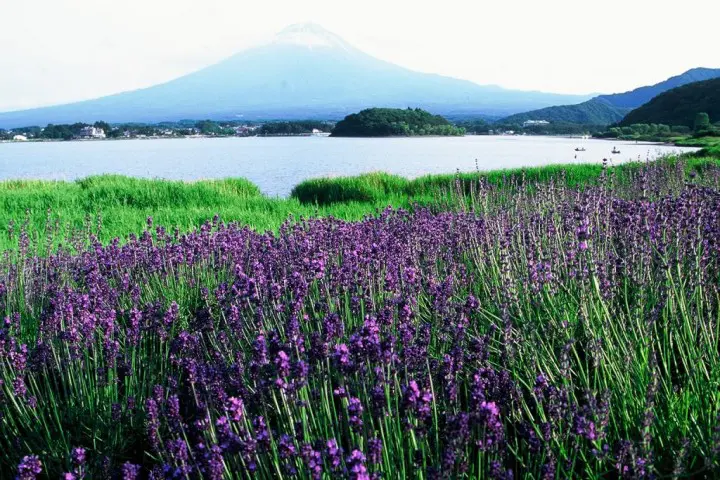
Oishi Park , located a little further towards Lake Saiko, is another popular spot. You can marvel at the view of Mt. Fuji, seen from beyond Lake Kawaguchiko, together with fields of seasonal flowers. The lavenders in particular can be seen going into full bloom (pictured) across the entire field between June to July.
There are many places with great scenery on the northern side of Lake Kawaguchiko. We recommend taking a stroll to find your favorite photo spot.

Kawaguchiko Circular Hall

↑ Return to the top of article.
2. Mt. Fuji Panorama Ropeway
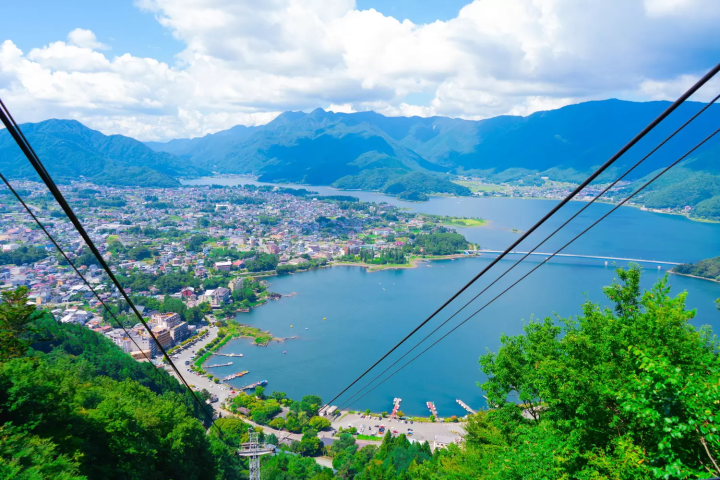
Photo by Pixta
The Mt. Fuji Panorama Ropeway (Japanese) provides a view of Mt. Fuji and Lake Kawaguchiko from a slightly different perspective. The ropeway was previously known as the Kachi Kachi Ropeway. This was because Mt. Tenjo, the mountain peak where the ropeway will take you, is said to be where the Japanese folktale “Kachi Kachi Yama” took place.
Take your time going up the mountain by ropeway, then head to the observation deck on the summit. You can enjoy a large panorama of Mt. Fuji alongside the foot of the mountain. The heart-shaped Bell of Tenjo is another popular photo spot. Feeling tired? We recommend snacking on dango (sweet rice dumplings) or a light meal at Tanuki Chaya Teahouse .

Lake Kawaguchiko Fuji Panorama Ropeway
3. Lake Kawaguchiko Cruise

Picture courtesy of Ensoleille It’s possible to take a cruise boat to enjoy the gorgeous scenery of Mt. Fuji from Lake Kawaguchiko.

Kawaguchiko Pleasure Boat Tensei
4. Music Forest Museum
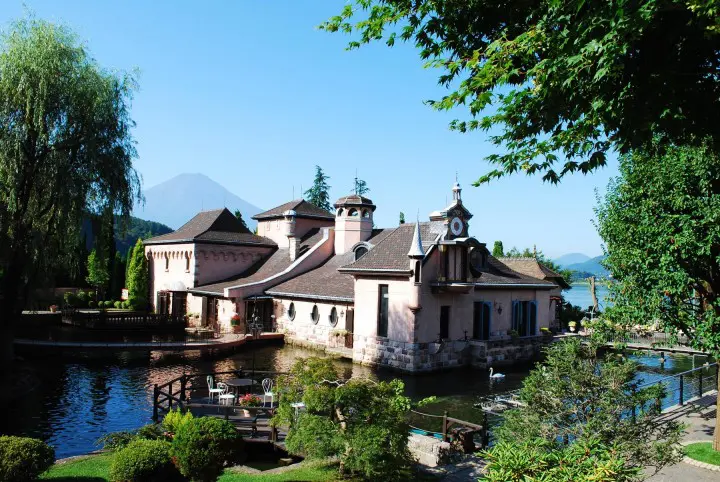
Picture courtesy of Music Forest Museum
The Music Forest Museum is situated in an expansive garden and has eye-catching Western-style architecture.
There are several things to see at this museum. A large music box that supposedly was to be installed on the infamous Titanic is exhibited here. There are also concerts with sand-painting performances , the practice of depicting a story through sand paintings accompanied by music, held three times a day.
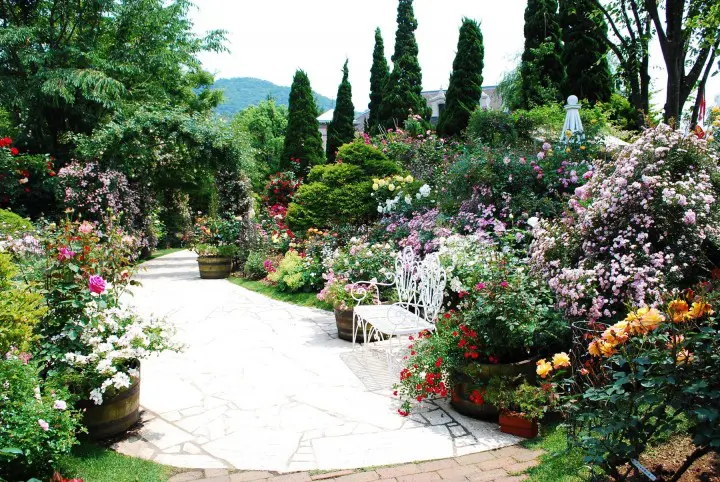
On sunny days, head over to the Rose Garden where you can enjoy roses in a multitude of colors. In June, the best time to see the flowers, you can enjoy up to 720 varieties of roses blooming in profusion.

Kawaguchiko Music Forest Museum
5. Itchiku Kubota Art Museum

Picture courtesy of Itchiku Kubota Art Museum
The Itchiku Kubota Art Museum was awarded three stars in the 2009 Michelin Travel Guide. Artworks and kimonos designed by Itchiku Kubota, a textile-dyeing artist, are exhibited inside splendid Japanese architecture.
Itchiku Kubota is famous for reviving a long-lost dyeing technique called "tsujigahana" with his own unique interpretation and skills. A glass beads gallery, museum shop, and teahouse are also located on the same premises as the museum.

This art museum’s distinct features are not only found inside the museum but also outside where you can enjoy the scenery. The Japanese garden, a collaboration between nature and human ingenuity, changes seasonally in appearance. In particular, autumn mesmerizes those who visit with its magnificent autumn leaves.

Itchiku Kubota Museum

6. Fuji-Q Highland

Fuji-Q Highland is a popular amusement park among youth and young adults from Japan and overseas. Its biggest feature is the array of thrilling attractions! The amusement park is teeming with roller coasters like FUJIYAMA, Takabisha, and Eejanaika—all of which have been recorded in the Guinness World Records for the tallest height, fastest speed, and steepest inclination in no particular order.
Other attractions include a massive maze, a haunted house, and areas like La Ville de Gaspard Et Lisa inspired by a French picture book. Hotels and restaurants are also located near and inside the amusement park. It might be a great idea to make use of these facilities during your visit.
Book the FujiQ Highland Ticket

Fuji-Q Highland

7. Arakurayama Sengen Park and Chureito Pagoda

The Chureito Pagoda in Arakurayama Sengen Park is known as a picturesque view near Lake Kawaguchiko.
Here, you can get a panoramic view of the townscape, five-storied pagoda, and Mt. Fuji’s beautiful figure all from an observation deck located up 398 flights of stairs. The cherry blossom and snowy seasons are immensely popular times to visit.

Arakurayama Sengen Park
8. Narusawa Ice Cave

Narusawa Ice Cave is a cavern that was formed by oozing lava from a volcano that erupted near Mt. Fuji in 864. The average temperature in the cave is 3℃ (37.4°F) and is covered in ice all year round.
The ice pillars inside the cave are especially famous. Depending on the year, the pillars will sometimes reach 50 centimeters in diameter and 3 meters in height.
Narusawa Ice Cave
Local Foods to Try at Lake Kawaguchiko

If you'd like to try food that’s unique to Lake Kawaguchiko, we recommend hoto noodles.
Hoto is a local dish from Yamanashi that consists of wide wheat noodles, pumpkin, and other vegetables simmered in miso (soybean paste) soup. The savoriness of the dashi broth and the sweetness of the vegetables go well together. It has a delicious flavor that will especially hit the spot during the chilly seasons. Restaurants like Houtou Fudou and Koshu Hoto Kosaku are popular options in the Kawaguchiko Station area.
Aside from hoto, there are several other unique foods that are local to the region like Fujizakura Heights Beer. This beer uses spring water sourced from the area surrounding Mt. Fuji.

Suggested Itineraries around Lake Kawaguchiko
Next, we’ll recommend itineraries that include the spots we just introduced. You can hit all the major spots in Lake Kawaguchiko in only one or two days . But if you have the extra time, you should be able to leisurely experience the charms in the area in two nights.
After you’ve arrived at Kawaguchiko Station by highway bus or railway, the first place you should head to is the Mt. Fuji Panorama Ropeway . Gaze at the spectacular scenery, then travel by route bus to have hoto , a Yamanashi specialty, or udon for lunch.
In the afternoon, take it slow by visiting the art museums . Check in early if you’re staying at a hotel with a hot spring or ryokan (traditional Japanese inn) and take your time unwinding from the day.
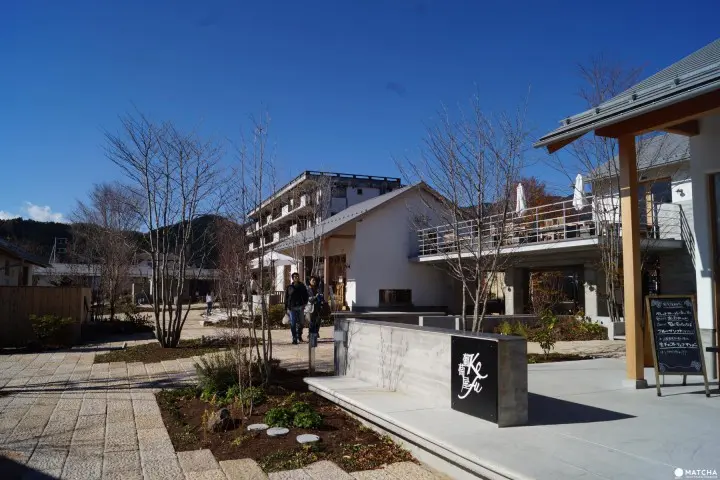
Hana Terrace is a complex with an open view of Mt. Fuji from the lakeside of Lake Kawaguchiko
On the second day, take a walk around Oishi Park . If you’re feeling tired, then take a break at a cafe or enjoy some shopping at Hana Terrace . There are several shops that sell items like trendy Japanese goods and desserts made with Yamanashi fruits. If that doesn’t sound appealing, then another great option is to play hard from the morning at Fuji-Q Highland .
If you’re looking to buy souvenirs, then we recommend the souvenir shops adjacent to Kawaguchiko Station, Fujisan Station, and the Fuji-Q Highland bus stop.
If you’re staying for another night, then how about going out a little further to Lake Saiko to the west of Lake Kawaguchiko or Fujiyoshida ?
Jukai is a nature-rich forest in the Lake Saiko area. Routes and guided tours are available for visitors to fully take in the forest while walking.
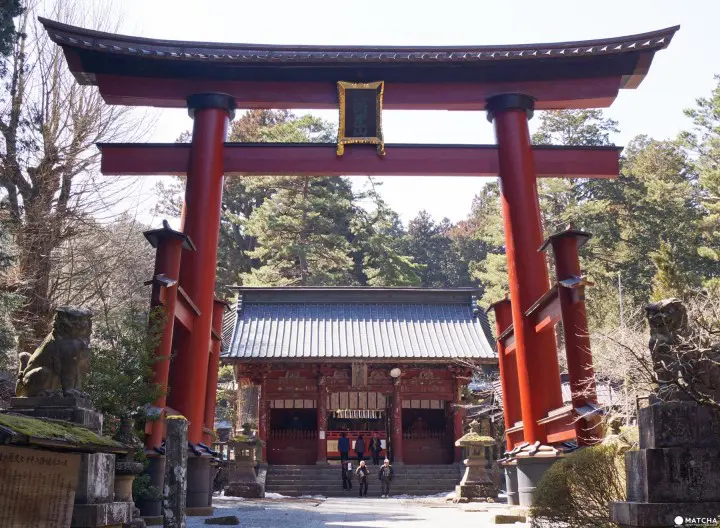
Kitaguchi Hongu Fuji Sengen Shrine doubles as the entrance to the Mt. Fuji trailhead

Seasonal Events at Lake Kawaguchiko
Lastly, we’ll dive into information on events. Various festivities are held in each season during the peak blooms for flowers and autumn leaves.
April: Fuji Kawaguchiko Cherry Blossom Festival

Photo by Pixta The best time to see the cherry blossoms at Lake Kawaguchiko is around mid-April every year.
You’ll find rows of cherry blossom trees along the lakeshore that line the walking trail near Kawaguchiko Enkei Hall. Food stalls are set up along the trail during the festivities for visitors to eat and snack on.
April - May: Fuji Shibazakura Festival

June - July: Herb Festival (Yagizaki Park, Oishi Park)

Lavender flowers reach their peak bloom between June to July at Yagizaki Park (Japanese) and Oishi Park. Both parks are known photo spots where you can admire the magnificent view of Mt. Fuji.
November: Fall Foliage Festival - The Maple Corridor

The autumn leaves turn red slightly earlier than in flatland areas like Tokyo between late October to November. During this time, rows of food stalls are set up near the Maple Corridor on Lake Kawaguchiko’s northern bank and it becomes crowded with people.
By the way, the Lake Kawaguchiko area sits at a high elevation so winters get extremely cold. However, it is thanks to these conditions that you are all the more able to see a breathtaking view of Mt. Fuji. The snow on Mt. Fuji melts between June to September in the summer, so we recommend any other season outside of summer if you want to see a snow-capped Mt. Fuji.
How to Access Lake Kawaguchiko and Ticket Deals
If you are traveling from Tokyo to Lake Kawaguchiko, then you can take the highway bus or train.
Highway Bus
You can get to Kawaguchiko Station by highway bus without any transfers from Shinjuku, Narita Airport, Haneda Airport, Tokyo Station, Shinagawa, Shibuya, or Yokohama. This is most recommended for first-time visitors. If there’s no traffic, then you can arrive at your destination within two hours from Shinjuku or Shinagawa.
Book a Highway Bus now! kosokubus
If you plan to walk around the Lake Kawaguchiko area, then it would be very convenient to use the Kawaguchiko Sightseeing Bus. The Mt. Fuji and Fuji Five Lakes Passport (2-Days) (adults 2,600 yen, children 1,300 yen) is a great option if you want access to unlimited rides and is valid for two days. The pass is sold at the Fujikyu Bus ticket counter in Kawaguchiko Station.
Aside from these deals, there are various other discount tickets available. Please check out the official Fujikyu Bus website (Japanese) for details.
If traveling by train, take the JR Chuo Line to Otsuki Station, then transfer to the Fujikyuko Line to get to Kawaguchiko Station. Total travel time is about three hours from Tokyo Station and costs around 2,700 yen.
The FUJI EXCURSION , a service that connects Shinjuku to Lake Kawaguchiko in an hour and 56 minutes, began its daily morning and night departures in 2019. Are you an international visitor? Then take advantage of JR ride passes like the Japan Rail Pass or the JR TOKYO Wide Pass to get on the train (additional fees will apply for reserved seating).
The Japan Rail Pass and JR TOKYO Wide Pass are very valuable passes to have when traveling around Tokyo or other parts of the country, so please do check them out.
Book the Japan Rail Pass
Book the JR TOKYO Wide Pass
A car is also recommended for traveling to Lake Kawaguchiko. By using the expressway, you can get to Lake Kawaguchiko from Tokyo in about an hour and 30 to 40 minutes.
It would be easier to travel around by car as the Lake Kawaguchiko area does have many sights to see. If you plan to travel long distances with a large party, then it would be cheaper in some cases to rent a car rather than taking the bus or train.
MATCHA offers a 10% discount coupon when renting a car from Nippon Rent-A-Car, a major Japanese car rental company, that is exclusive to international visitors. Be sure to check it out if you’re considering renting a car!
Nippon Rent-A-Car 10% Off Coupon

Shinjuku / Yotsuya
Hotels in the Lake Kawaguchiko Area
The next section introduces our recommended hotels and accommodations for admiring the magnificent scenery of Mt. Fuji and the great outdoors.
PICA Fujiyama
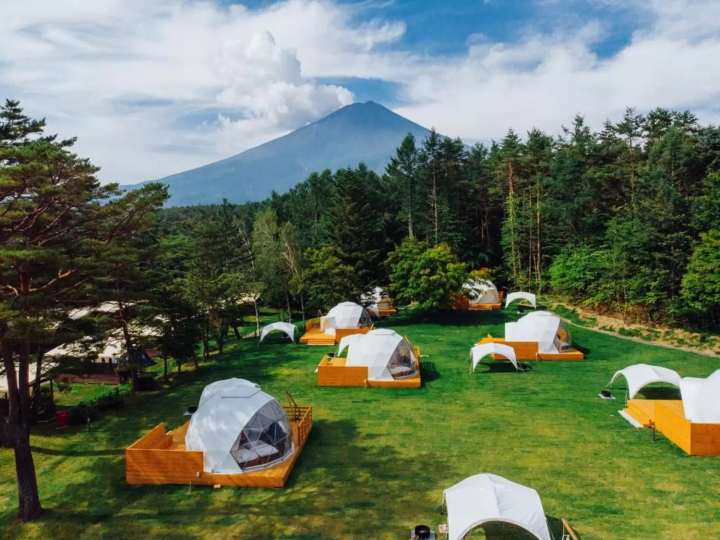
Pictures courtesy of Booking.com PICA Fujiyama is a popular glamping spot near Lake Kawaguchiko. Spend your stay comfortably in a white, elegant half-dome tent that is one with nature.
Book lodging at PICA Fujiyama
Fuji Lake Hotel

Pictures courtesy of Booking.com
Fuji Lake Hotel is an established hotel that opened in 1932. The hotel offers private baths with a view of both Mt. Fuji and Lake Kawaguchiko. There is also a public bath where guests can enjoy a hot spring with water sourced from beneath Mt. Fuji.
Book a room at Fuji Lake Hotel
SUPER HOTEL Fuji Kawaguchiko Natural Hot Spring

If you want to enjoy your stay comfortably at a reasonable price, then we recommend SUPER HOTEL Fuji Kawaguchiko Natural Hot Spring. A stay at the hotel comes with free breakfast and a natural hot spring.
Book a room at SUPER HOTEL Fuji Kawaguchiko Natural Hot Spring
Enjoy Lake Kawaguchiko in Every Season!
This was our list of must-visit spots in Lake Kawaguchiko and how to enjoy them. There are many things to do near Mt. Fuji from appreciating the natural landscapes and fine arts to enjoying the local foods and thrilling attractions, all while being in a convenient to access location from Tokyo.
There are still many more sights and charms to see in the Fuji Five Lakes area, including the nearby Lake Yamanakako and Lake Saiko. Take your time to truly take in the area together with the seasonal scenery.
What's the best way to get to Lake Kawaguchiko from Tokyo?
The most convenient way to travel from Tokyo to Lake Kawaguchiko is by taking a train from Tokyo Station to Otsuki Station via the JR Chuo Line, followed by transferring to the Fujikyu Railway Line to reach Kawaguchiko Station. From there, it's a short walk or bus ride to Lake Kawaguchiko. An alternative option is to consider a direct highway bus from Tokyo to Lake Kawaguchiko, offering a more straightforward journey without transfers.
Is Lake Kawaguchiko worth visiting?
Lake Kawaguchiko is a must-visit destination for its breathtaking views of Mount Fuji and the surrounding scenic beauty, drawing in visitors and photographers alike. This picturesque spot offers a range of outdoor activities such as boat cruises, fishing, cycling, and hiking, allowing guests to immerse themselves in nature's tranquility. The region is also renowned for its hot springs, providing a relaxing retreat, while cultural attractions like museums, art galleries, and temples offer insights into the area's heritage.
Which is better Lake Kawaguchiko or Hakone?
Choosing between Lake Kawaguchiko and Hakone depends on your preferences. Lake Kawaguchiko is ideal for Mount Fuji views, outdoor activities, and relaxation in hot springs, while Hakone is known for its onsens, art spaces like the Hakone Open-Air Museum, and convenient access from Tokyo and Yokohama. Kawaguchiko offers natural beauty and cultural sites, and Hakone focuses on onsens, art, and volcanic landscapes. Choose Kawaguchiko for nature and mountain vistas, or Hakone for a blend of hot springs, art, and cultural exploration in a volcanic setting.
What is Fujikawaguchiko known for?
Fujikawaguchiko near Lake Kawaguchiko is prized for its stunning Mount Fuji vistas, diverse outdoor activities, relaxing hot springs, cultural attractions, and proximity to Mount Fuji, making it an ideal destination for nature lovers, adventurers, and those seeking a rejuvenating retreat with a backdrop of Japan's most iconic peak.
Can you walk around Lake Kawaguchi?
Yes, it is possible to walk around Lake Kawaguchi. The lake has a walking and cycling path that encircles its perimeter, providing visitors with the opportunity to enjoy a leisurely stroll while taking in the scenic views of Mount Fuji and the surrounding landscapes. Walking or cycling around Lake Kawaguchi allows you to appreciate the natural beauty of the area, explore different vantage points, and immerse yourself in the tranquil atmosphere that the lake offers.
Can you use Suica in Kawaguchiko?
Yes, Suica cards are accepted in Kawaguchiko, providing a convenient payment option for travelers using public transportation in the area. This allows visitors to easily access and pay for transportation services using their Suica cards, offering a seamless and efficient way to navigate around Lake Kawaguchi and its surroundings. It's recommended to confirm the current status of Suica card usability in Kawaguchiko before relying on them for transportation payments.

Main image by Pixta
Born in Yamagata Prefecture. I have experience working in community development at the foot of Mt. Fuji and PR for local products across the country, and am currently working in Tokyo to disseminate information about Yamanashi Prefecture. A mother of one who loves local gourmet food and alcohol.
Related topics
Top articles, related article.

Top 45 Cherry Blossom Spots in Japan - 2024 Guide

Tokyo Travel Guide 2024: Top 35 Things to Do

Asakusa Travel Guide: 50 Places to Visit, Dining, Access, and Other Tips

Fuji-Q Highland: The Best Rides, Access From Tokyo, and Tickets

Mt. Fuji Area - 8 Fun Things To See And Do At Lake Yamanakako

Fuji Five Lakes - Enjoy Mt. Fuji, Lake Kawaguchiko, And Lake Yamanakako!

12 Things To Do And See In Yamanashi - Mt. Fuji, Lakes, And Gourmet Dining

From Tokyo Straight To Mt. Fuji! 3 Reasons To Ride The FUJI EXCURSION
Start planning your trip
Special Features

Popular Searches
Latest news.

Floral Desserts in Kyoto! Itoh Kyuemon's Uji Matcha and Hydrangea Festival

Discover Kyoto's Elegant Geisha Culture at the Gion Kagai Art Museum

Showa Kinen Park Flower Festival 2024: Enjoy Nemophila, Tulips, and More!

A Must for Nature Lovers! Win a Free Stay at Unzen Amakusa National Park

A World of Light and Color! Van Gogh Alive in Japan 2024

Japan's Public Holidays and Long Weekends in 2024

Aeon Mall Okinawa Rycom: A Shopping Mall Featuring a Resort Aura

Suica and Pasmo IC Cards: Prepaid Transportation Passes in Japan

Riding Taxis in Japan: The 6 Best Apps to Grab a Cab

How to Travel to Kyoto From Osaka: The Fastest and Cheapest Ways
New articles.

Yu-Rah villa & gallery in Ehime: where you can enjoy the spectacular view of Shimanami Kaido

[2024 Latest] Must-see spots when you come to Osaka! "Kaiyukan", "Tempozan Ferris Wheel", "Tempozan Marketplace" - A summary of Tempozan tourist information

Tokyo Gyoza: 5 Restaurants With Delicious Dumplings

The 42nd Daikokuji Temple and Tanba Tea Festival will be held in Tanba Sasayama

[Departures between May and September 2024, Meet in Nagoya] Introducing the "Ride the Kintetsu Limited Express "SHIMAKAZE", "AONIYOSHI", and "HINOTORI"! 2-day tour of Ise, Kyoto, and Nara"!
Kawaguchiko: Best Things to Do around Mt.Fuji
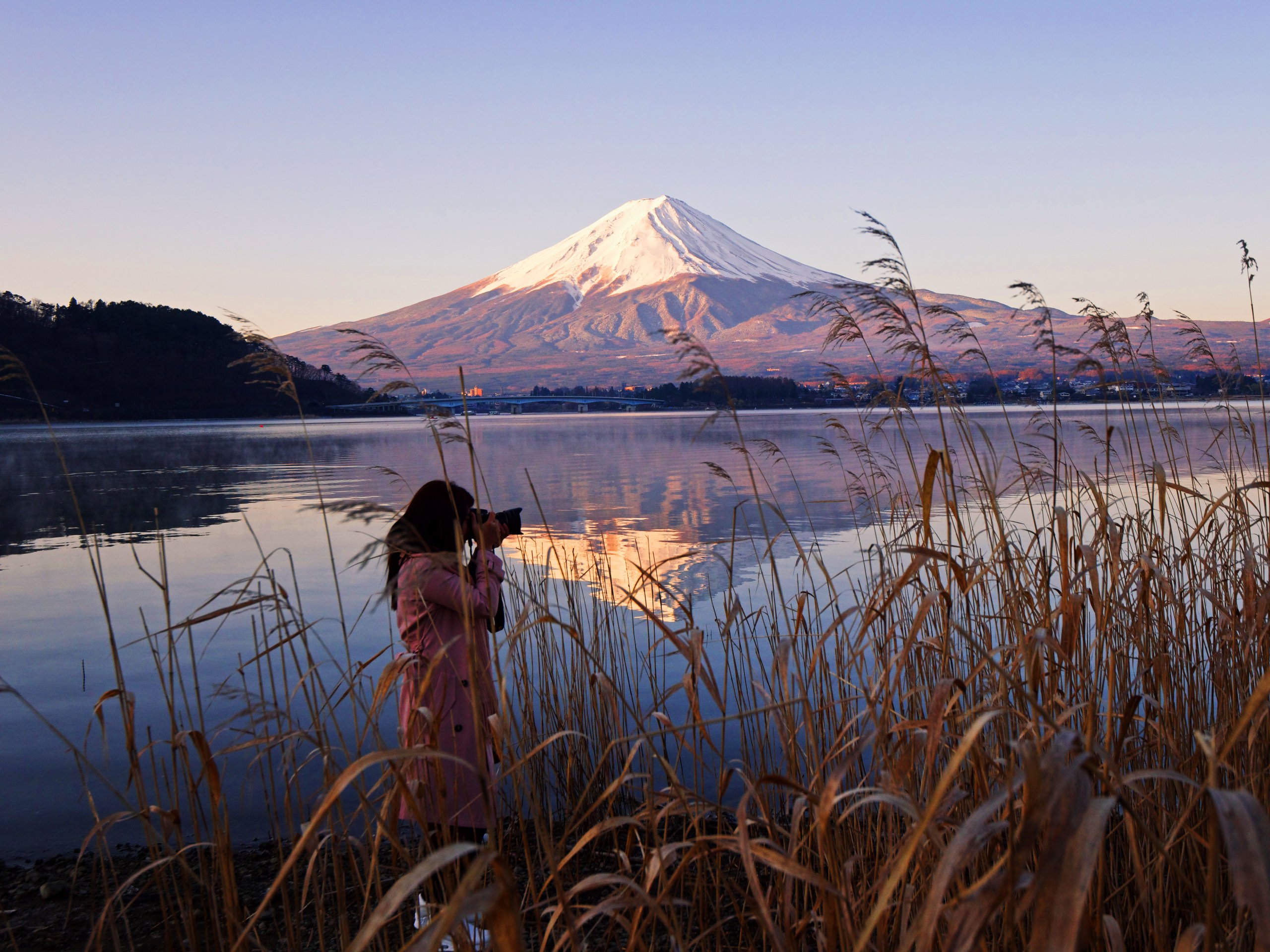
In the Kawaguchiko area, you can have magnificent views of Mount Fuji . Especially across the Kawaguchiko Lake, one of the five lakes in the surroundings of the Mount Fuji area, the mountain is beautifully portrayed on a clear day. It is also one of the easiest accessible places from Tokyo, with direct bus and train connections. The area is great for a day trip, but with all the many interesting and fun things to do in the Kawaguchiko area, a weekend trip here is definitely a perfect idea to do!
Recommended tour: Mt. Fuji Day Trip from Tokyo Bus Tour
How to Get There and Around
Enjoy stunning views at kawaguchiko 5th station, arakurayama sengen shrine, kitaguchi hongu sengen shrine, lake kawaguchi mt. tenjō ropeway, aokigahara-jukai forest and lava caves, ide shuzo sake brewery, oshino hakkai springs, thrilling ar night walk adventure, 1. highlights cycling route, 2. 5th station and secret forest route bus route, 3. national treasure bus route, recommended mt. fuji tour, recommended hotels with mt fuji views:, other articles you might like.
If you’re looking to travel to Kawaguchiko from Tokyo, the most convenient option is taking a bus. It typically takes around 2 hours and costs between 2,000 to 2,500 yen. Buses depart from several locations in central Tokyo, such as Shinjuku Station and Tokyo Station. Alternatively, you can opt for a JR train from Shinjuku Station which will take 2-3 hours. For more information on traveling to and around Kawaguchiko, we have an article that covers everything you need to know.
Things to Do in the Kawaguchiko Area
From Kawaguchiko station, you can take a bus to the Fuji Subaru Line Gogōme, also known as Yoshidaguchi 5th Station or Kawaguchiko 5th Station. This station is a popular starting point for people climbing Mount Fuji, in fact, it is the most used of all four stations. With easy access from Tokyo, many people also just go there to watch Mt. Fuji, without climbing it. From the station, you also have great views of the Five Mount Fuji Lakes. The station is accessible almost all year round, snow conditions permitting, making it a popular sightseeing spot even outside of the climbing season.
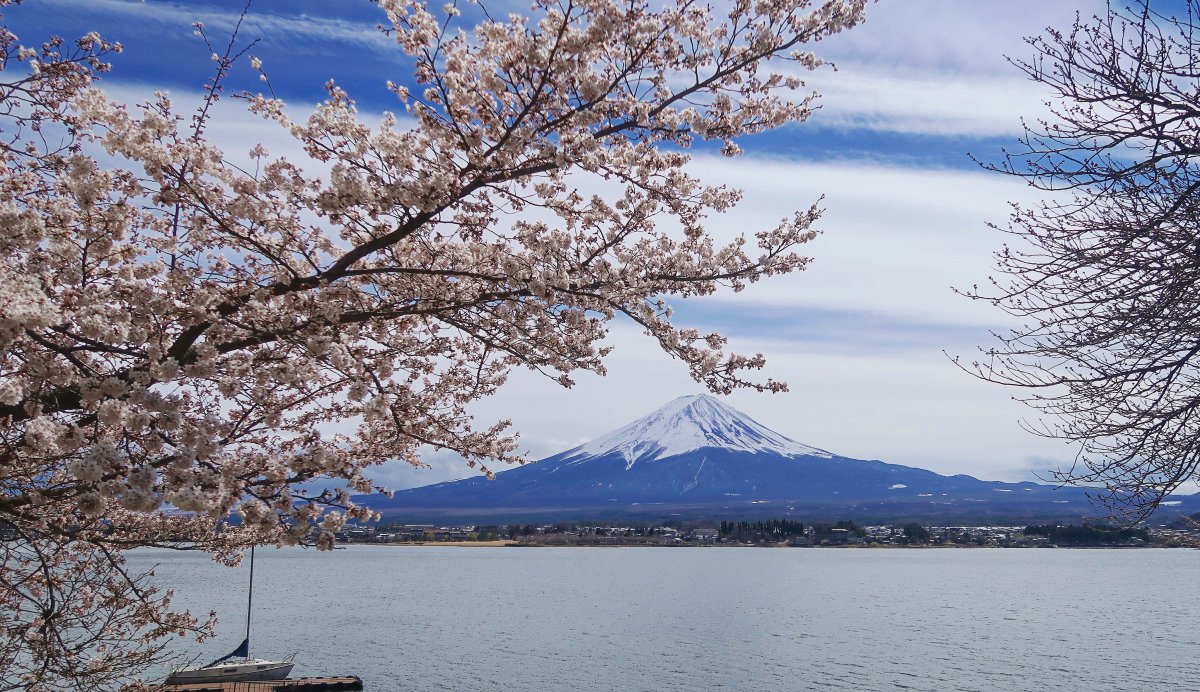
For those of you wanting to climb Mount Fuji, this station is a good starting point. At the station you will find some restaurants and shops, to gear up properly before you start the journey to the summit. We always advise you to climb Mount Fuji during the season and with a guide, read more about these options here. ▶ Mt. Fuji Pilgrim Hiking (1st to 5th Station)
Mt. Fuji 5th station The bus from Kawaguchi station to the fifth station will take about 50 minutes one way, and cost you ¥1,570 for a one way ticket or ¥2,300 yen for a round trip.
When you head east from Kawaguchiko station for about 4 km, you will find Arakura Sengen Shrine. What makes this shrine extra special is the panoramic view from the top, from there you can see Mt. Fuji along with 5 storied Chureito Pagoda.
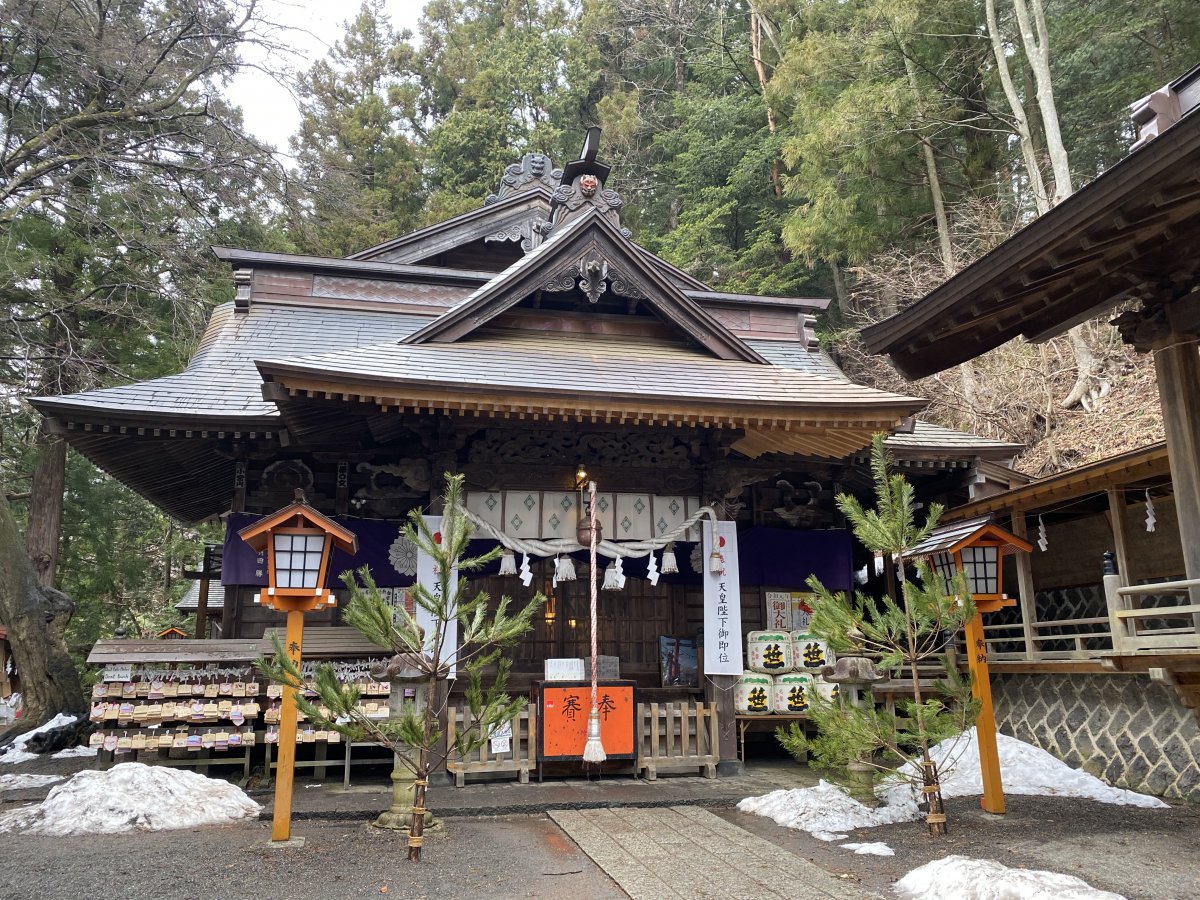
From the Arakurayama Sengen Shrine, 398 steps lead you to the top, where you will find the Chureito Pagoda. This great view is quite famous and has been featured in many guidebooks. Especially during the spring season, when the sakura blossoms are flowering, this place feels almost magical.
Finish off your perfect day and watch the sunset from here!
At the starting point of the Yoshida trail, you will find the Kitaguchi Hongu Sengen Shrine, also known today as the Fujiyoshida Sengen Shrine. The Yoshida trail leads all to way to the top of Mount Fuji, though, few climbers begin their hike from here now. Many climbers do still visit the shrine before their ascent to pray for a safe climb.
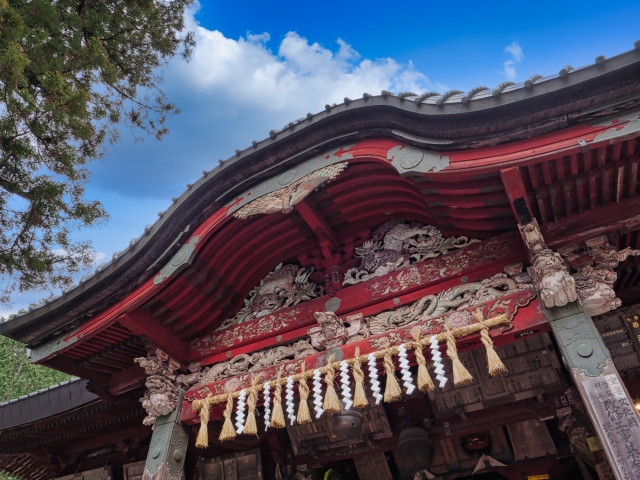
Each year, the shrine is the center stage for one of the three “most unique festivals in Japan”. The Yoshida Fire Festival is celebrated to mark the end of the Mount Fuji climbing season and to praise the gods. During the festival about 70 large torches are lit throughout the city, turning the main street into what looks like a river of fire.
Official website Kitaguchi Hongu Sengen Shrine Free admission
This cable car is located on the lakeside of Kawaguchiko. There are two cable cars and you can see the lake and Mt. Fuji from the top. Especially in the autumn season, you can see the beautiful autumn colors of the tree leaves in this area while riding on the cable car. The three minutes to the top will literally fly by!
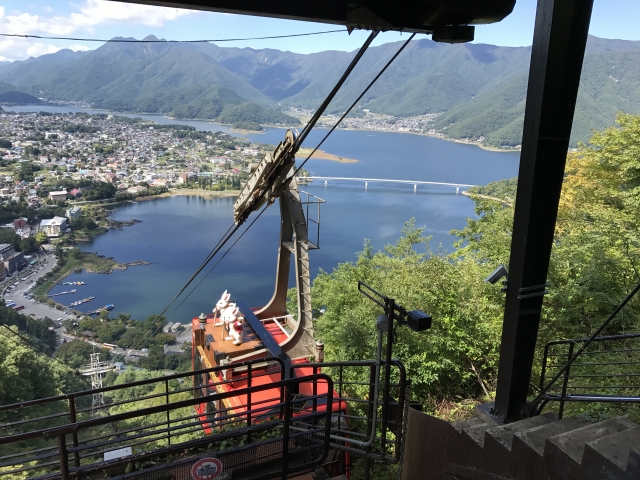
Kachi Kachi yama Admission ¥900 yen for round trip
From this beautiful park located on the north side of Kawaguchiko Lake, you can see the beautiful Mt. Fuji and its reflection in the lake. In spring and summertime, when many flowers are blossoming at Oishi Park, the views are amazing. Especially from late June to early July, when the lavender flowers are in bloom and make the place look like it has a purple carpet, many people visit this picturesque spot. At Oishi Park there are several restaurants and shops, making it a great spot for a break after a hike.
Oishi Park Free admission
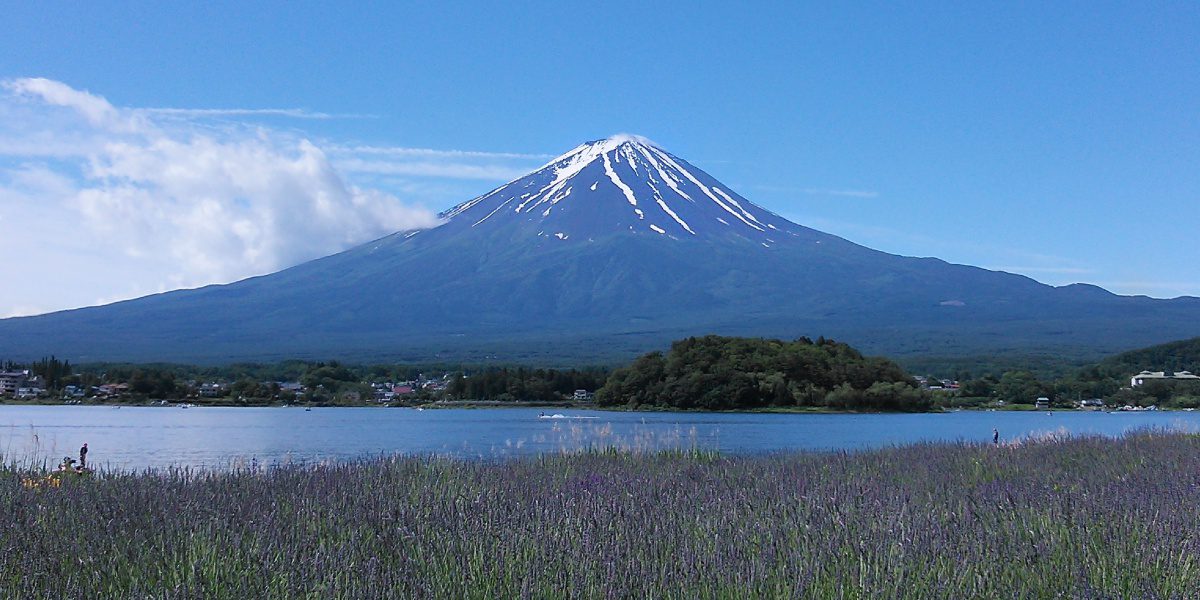
Aokigahara forest is a beautiful forest on the northern foot of Mt.Fuji. The Japanese name of the forest is Aokigahara-jukai, jukai means a sea of trees. The forest was formed on the lava plateau after the eruption of Mount Fuji in 864. It can be difficult to navigate your way as the forest is very dense. Because of the high density of trees you will hardly feel any raindrops, the forest will protect you from rain, wind, and snow! Sadly for this reason and the remoteness of this forest, this place is also known as the suicide forest. However, it is a very beautiful place to go hiking, just make sure you don’t get off the trails, and is recommended to go with a guide . Recommended tour: Trekking Experience of Aokigahara Sea Of Trees and Caves Exploration
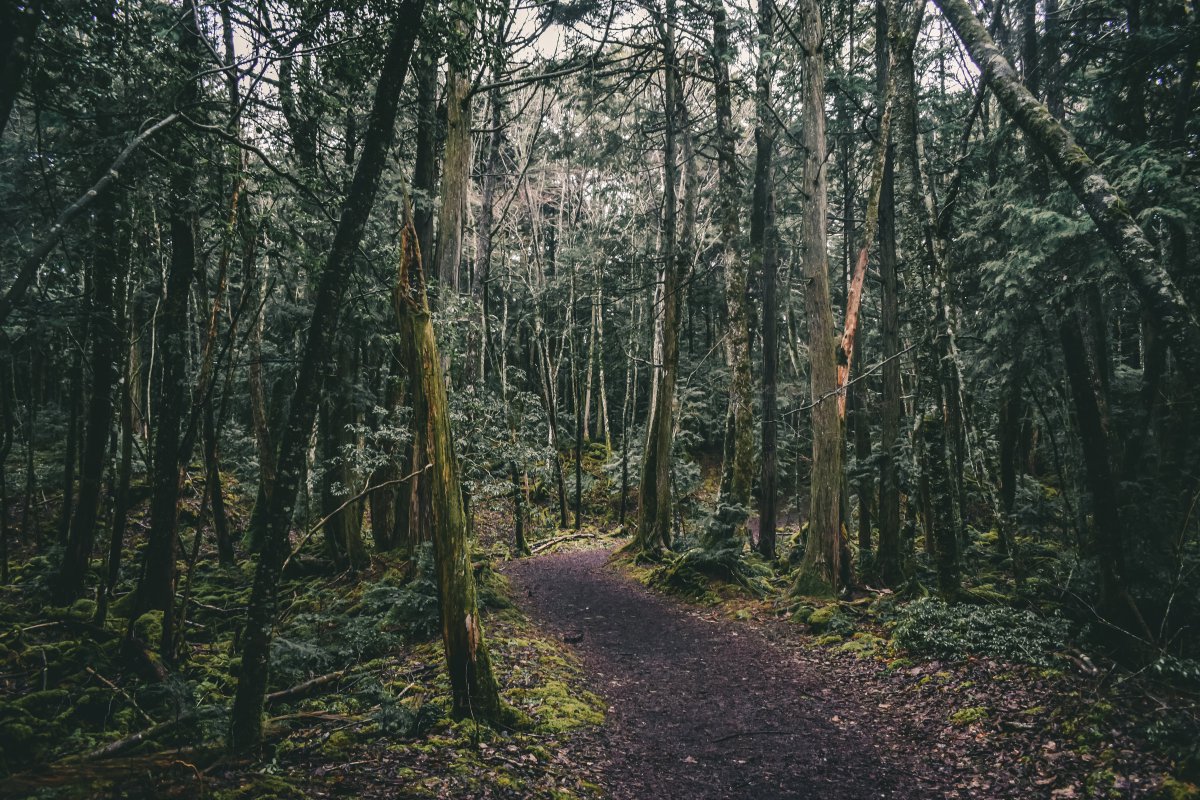
In the vicinity of the Aokigahara forest, there are some deep lava caves, such as the Fugaku Wind Cave and the Narusawa Ice Cave. When you are in the area, visiting these famous caves is a must. The temperature in both caves is somewhere between zero and three degrees all year round, but don’t let that stop you from witnessing these miracles of mother nature.
Aokigahara Admission ¥350
Very close to Kawaguchiko station, there is a sake brewery called Ide shuzo . This small family-run brewery has been making sake for 21 generations, using water from Mount Fuji. At the brewery, you can learn more about the process of making sake, or just sample the finished product!
A tour is offered in English twice every day at 9:30am or 3pm and a reservation is required. The reservation can be made online for ¥800 per person (including sake tasting).
Ide shuzo Sake tour ¥800 (including sake tasting) Sake tasting ¥500
Hakkai means eight seas, referring to eight clear spring water ponds at the foot of Mount Fuji that Oshino Hakkai is famous for. It is located between Kwaguchiko and Yamanakako, on the bottom of the former 6th lake of the area. The water from the ponds is of very good quality, containing some of the nation’s best spring water! You can even drink water from one of the pools.
Most of the pools are filled by melted snow that has run down from Mount Fuji and some are inhabited by koi fishes. Around the pond, there are many traditional Japanese houses and a museum that is also worth visiting! Oshino Hakkai is also a popular destination for cherry blossom viewing, and usually, the best viewing time takes from early to mid-April.
Oshino Hakkai Admission free
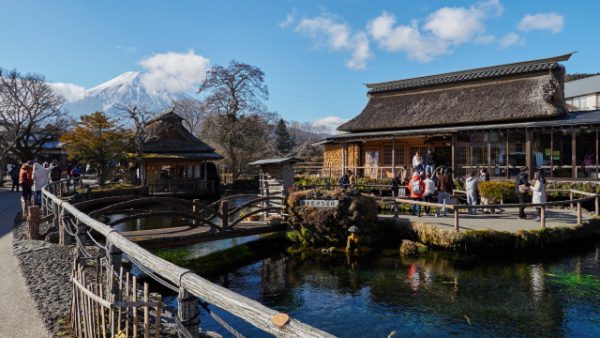
Looking for a unique experience that’s fun for the whole family? This augmented reality adventure takes you through an illuminated forest on a quest to catch ghosts. The experience is a great way to enjoy the area in the evening, and is perfect for families with kids. Have a look below for more info!
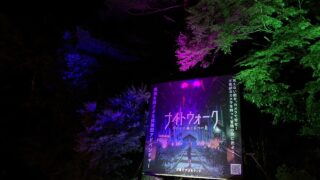
If you are interested in a tour around the Kawaguchiko area, please contact us!
Suggested Routes in the Kawaguchi Area
Many of the accommodations in the area offer bicycles for rent, sometimes it is even included in the price. The area around Lake Kawaguchi is great to discover by bike. A suggested itinerary is below.
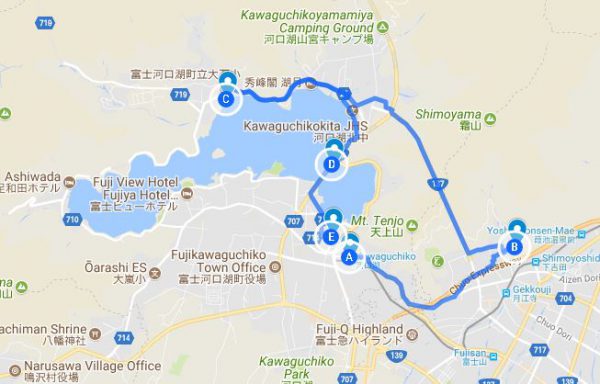
Duration: Approx. 7 hours A: Kawaguchiko Station B: Arakurayama Sengen Shrine C: Oishi Land D: Ubuyagasaki Shrine E: Sake brewery
To fully experience the area and discover hidden gems that only locals know, it is highly recommended to book a guided cycling tour. Not only does it provide insurance coverage, but it also includes the convenience of a support car in case you become tired or need to transport heavy luggage. Don’t miss out on the opportunity to make the most of your adventure by booking a guided tour !
This route covers the 5th station, Aokigahara forest and Narusawa Ice cave. But if you have time, you can combine it with the sake brewery or the ropeway!

Duration: Approx. 7 hours Costs: About ¥3,600 for transportation + ¥350 per person for the ice cave B: Kawaguchiko 5th station C: Kawaguchiko station D: Aokigahara and Narusawa Ice Cave
How about going to National treasures? On this route, you will visit Kitaguchi Hongu Sengen Shrine and Oshino Hakkai first. Then head back to Kawaguchiko and go to Mt. Tenjō Ropeway.
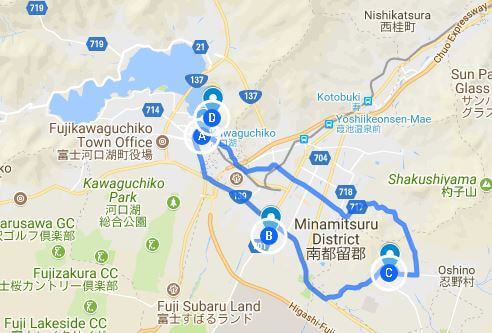
Duration: 7 hours Costs: ¥1,030 yen for the bus + ¥900 yen per person for the ropeway A: Kawaguchiko station B: Kitaguchi Hongu Sengen Shrine C: Oshino Hakkai D: Mt. Tenjō Ropeway
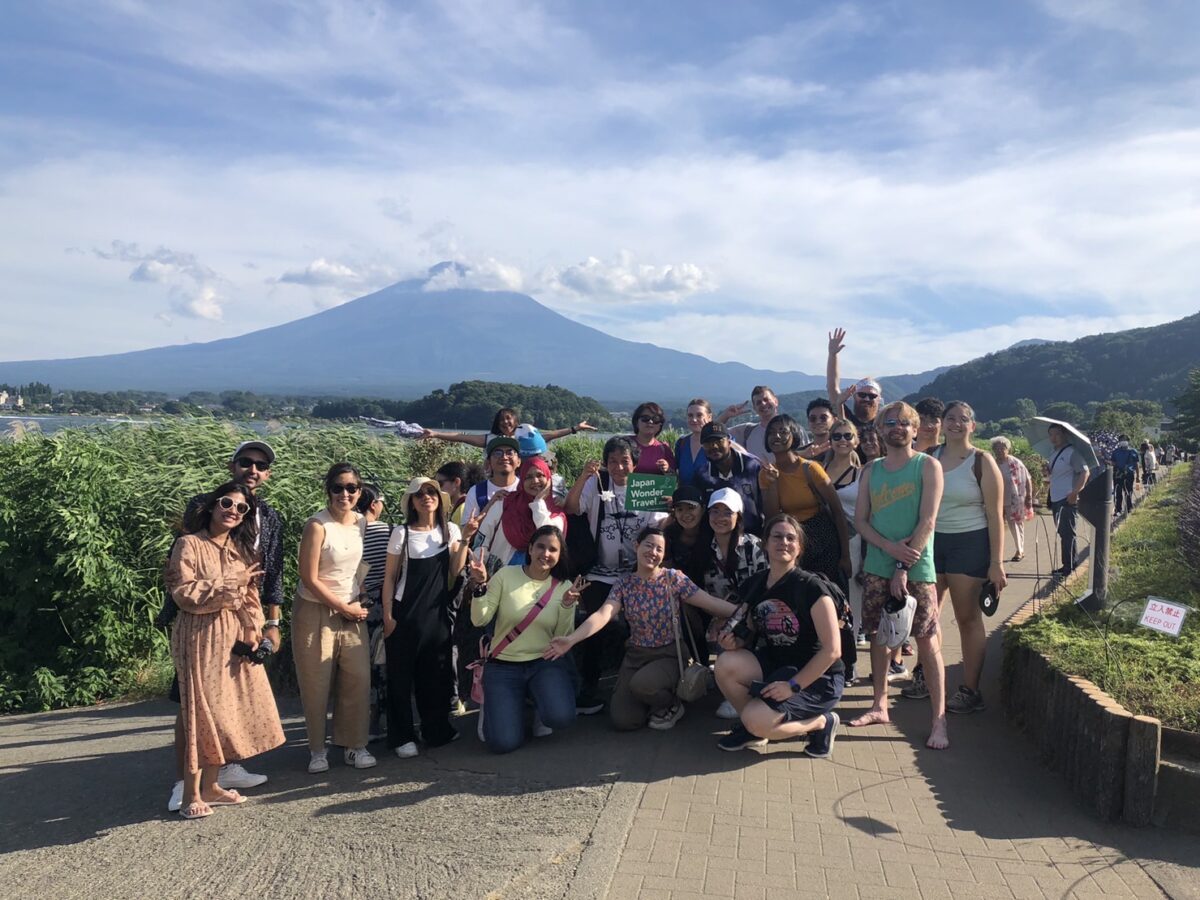
If you’re interested in a guided tour of the Kawaguchiko area and want to visit some of the local attractions, we’ve got a day trip tour available from Tokyo! Simply meet up with your guide at Shinjuku Station, get on a bus, and enjoy a comfortable ride to the Mt. Fuji area. You can explore various places to see the stunning view of Mt. Fuji, sample delicious specialty foods, and visit the Aokigahara Forest to see the wind cave. This Mt. Fuji Day Trip Tour covers all the must-visit spots in the area, providing you with a chance to enjoy the breathtaking view of Mt. Fuji!
Itinerary 8:00 Depart from Shinjuku Station – Chureito Pagoda – Hoto Fudo – Mt. Fuji World Heritage Centre, Yamanashi -Fugaku Fuketsu Wind Cave (Aokigahara forest) -Oishi Park 16:00 Head back to Tokyo 18:00~18:30 Arrive in Shinjuku (the scheduled end time of the tour may be subject to change due to traffic)
▶ Mt. Fuji Day Trip from Tokyo Bus Tour
- HOSHINOYA Fuji
- Shuhokaku Kogetsu
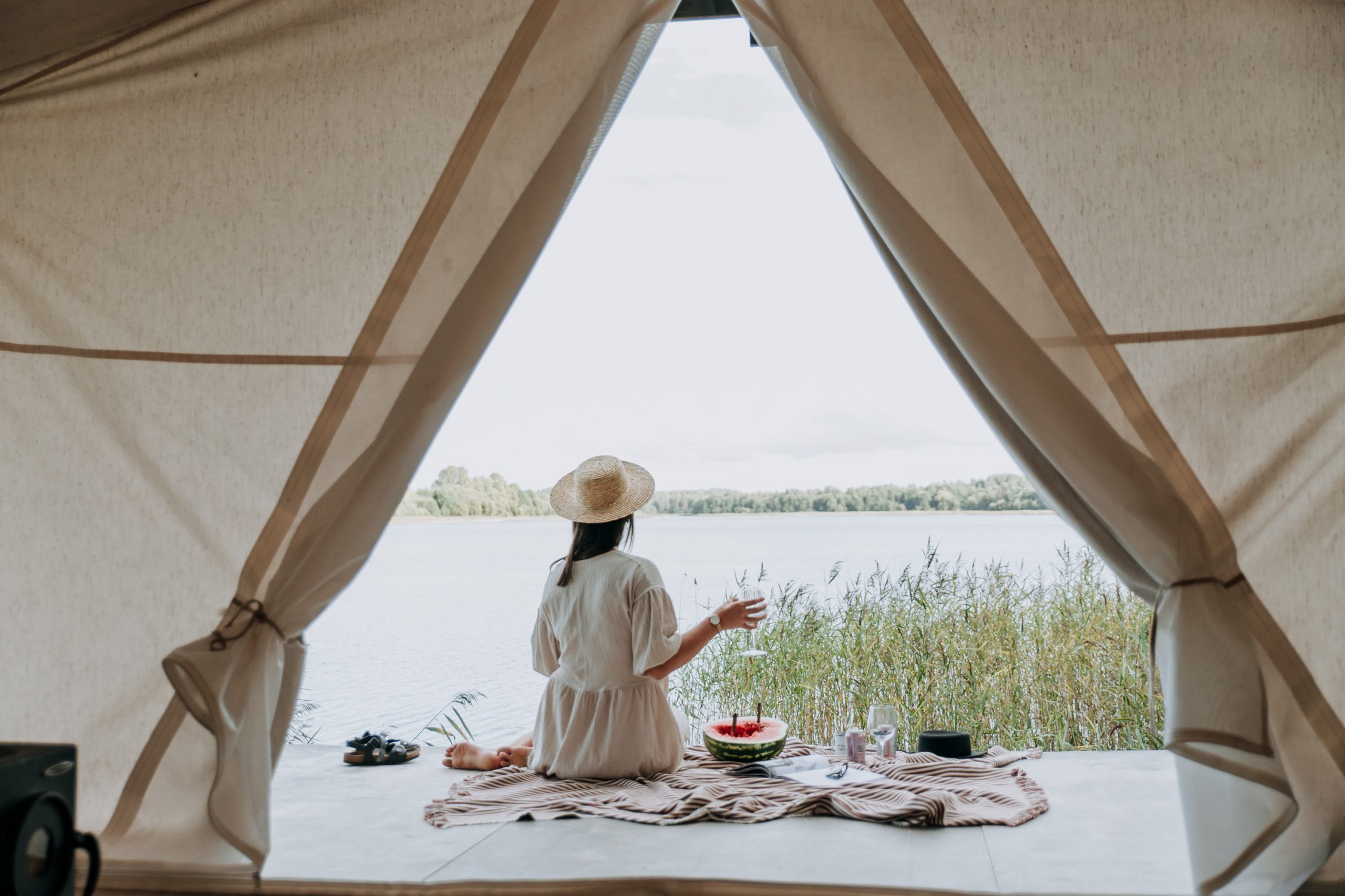
These are our recommendations for the Kawaguchiko area, what do you think of them? Any places we missed out, on that you can recommend; let us know! What is your favorite place or activity in the area? Let us know in the comments!
For more information, check out our complete guide to Mt. Fuji below!
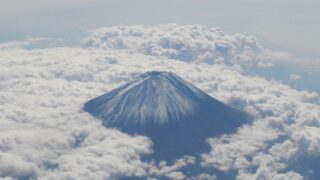
Follow us on Instagram , Facebook and Twitter for more travel inspiration. Or tag us to get featured!
Happy traveling!
Stay informed of the best travel tips to Japan, the most exciting things to do and see, and the top experiences to have with the Japan Wonder Travel Newsletter. Once every two weeks we will introduce you to our latest content.
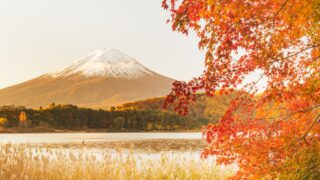
This post may contain some affiliate links. When you click through and make a purchase we may receive some commission, at no extra costs to you.
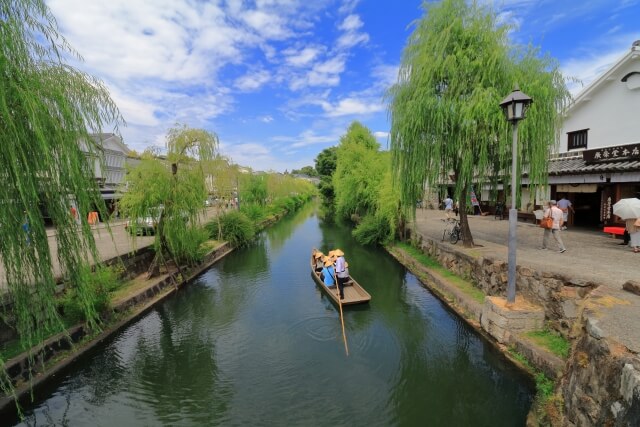
An impressive share! I have just forwarded this onto a coworker who has been conducting a little homework on this. And he actually bought me dinner due to the fact that I found it for him… lol. So allow me to reword this…. Thank YOU for the meal!! But yeah, thanx for spending some time to discuss this subject here on your blog.
That’s great, happy to have helped you out. Hope your enjoyed your dinner :)
- Popular destinations
- Hidden places in Japan
- Tours and workshop
- Food and drink in Japan
- Itinerary in Japan
- Places to visit in Tokyo
- Food and drink in Tokyo
- Seasonal events
- Tours & workshops
- Tokyo This Week
- Day trip from Tokyo
- Itinerary in Tokyo
- Places to visit in Kyoto
- Food and drink in Kyoto
- Itinerary in Kyoto
- Day trip from Kyoto
- Travel tips
- Accommodation
- Cultural tips
- Transportation
- Tokyo Tours
- Kyoto Tours
- Kimono Rental
- Fukushima Tours
- Mount Fuji Tours
- Tour Package
- Media Kit(English/日本語)
- Media & Industry
- Meetings & Events
- Select Language 简体中文 繁體中文(香港) 繁體中文(臺灣) India (English) Bahasa Indonesia 한국어 ภาษาไทย Tiếng Việt Singapore (English) Philippines (English) Malaysia (English) Australia/New Zealand (English) Français Deutsch Italiano Español United Kingdom (English) Nordic countries(English) Canada (English) Canada (Français) United States (English) Mexico (español) Português العربية Japan(日本語) Global (English)
- India (English)
- Bahasa Indonesia
- Singapore (English)
- Philippines (English)
- Malaysia (English)
- Australia/New Zealand (English)
- United Kingdom (English)
- Nordic countries(English)
- Canada (English)
- Canada (Français)
- United States (English)
- Mexico (español)
- Global (English)
- Fujiyoshida
- Shimonoseki
- Ishigaki Island
- Miyako Island
- Kerama Island
- Tokyo Island
- Koka & Shigaraki
- Hida Takayama
- Ginza, Nihonbashi
- Beppu & Yufuin (Onsen)
- Ginzan Onsen
- Nagasaki Islands

- Kumano Kodo
- Shikoku Karst
- Amami Oshima
- Hachimantai
- Omihachiman
- Aizuwakamatsu

- Diving in Japan
- Skiing in Japan
- Seasonal Flowers in Japan
- Sustainable Outdoors
- Off the Beaten Track in Japan
- Scenic Spots
- World Heritage
- Home Stays & Farm Stays

- Japanese Gardens
- Japanese Crafts
- Temple Stays
- Heritage Stays
- Festivals and Events
- Theater in Japan
- Japanese Tea Ceremony
- Cultural Experiences in Japan
- Culture in Japan

- Local Cuisine Eastern Japan
- Local Cuisine Western Japan
- Local Street Food
- Japan's Local Ekiben
- Japanese Whisky
- Vegetarian and Vegan Guide
- Sushi in Japan Guide
- Japanese Sake Breweries

- Art Museums
- Architecture
- Performing Arts
- Art Festivals
- Japanese Anime and Comics
- Japanese Ceramics
- Local Crafts

- Scenic Night Views
- Natural Wonders
- Theme Parks
- Samurai & Ninja
- Iconic Architecture

- Wellness Travel in Japan
- Japanese Ryokan Guide
- A Guide to Stargazing in Japan
- Relaxation in Japan
- Forest Bathing (Shinrin-yoku)

- Experiences in Japan
- Enjoy my Japan
- National Parks
- Japan's Local Treasures
- Japan Heritage
- Snow Like No Other
- Wonder Around Japan

- Visa Information
- Getting to Japan
- Airport Access
- COVID-19: Practical Information for Traveling to Japan
- Anime Tourism
- Countryside Stays
- Accessible Tourism
- Hokkaido Great Outdoors
- Scenic World Heritage in Tohoku
- Shikoku’s Nature and Traditions
- Southern Kyushu by Rail

- Traveling by Rail
- How to Travel by Train and Bus
- JR Rail Passes
- Scenic Railways
- Renting a Car
- Sustainable Travel in Japan
- Travel Brochures
- Useful Apps
- Online Reservation Sites
- Eco-friendly Accommodation
- Luxury Accommodations
- Traveling With a Disability
- Hands-free Travel
- How to Book a Certified Tour Guide
- Volunteer Guides
- Tourist Information Center

- Japanese Manners
- Spring in Japan
- Summer in Japan
- Autumn in Japan
- Winter in Japan
- Cherry Blossom Forecast
- Autumn Leaves Forecast

- Japan Visitor Hotline
- Travel Insurance in Japan
- Japan Safe Travel Information
- Accessibility in Japan
- Vegetarian Guide
- Muslim Travelers
- Safety Tips

- JAPAN Monthly Web Magazine
- Arts & Cultures
- Nature & Outdoor
- Festivals & Events
- Insider Blog
- Things to do
- Local Guides
- Food & drink
- Traditional
- Hokuriku Shinetsu

My Favorites
${v.desc | trunc(25)}
Planning a Trip to Japan?
Share your travel photos with us by hashtagging your images with #visitjapanjp
- Fuji Five Lakes Area
- Lake Kawaguchi
Lake Kawaguchi 河口湖
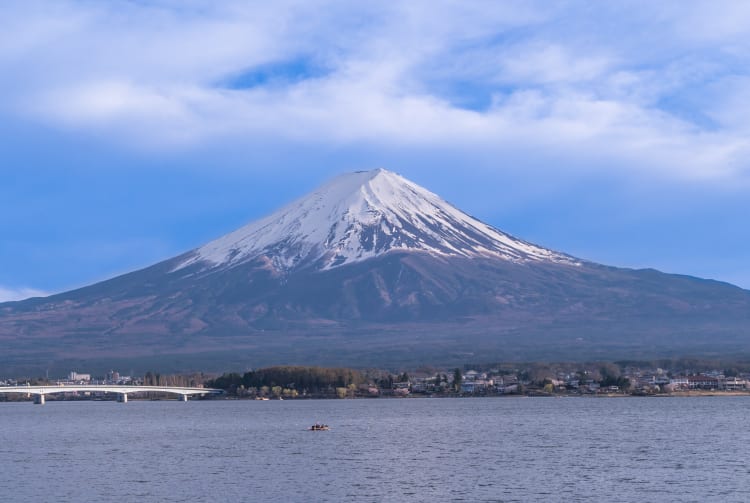
Minamitsuru-gun, Yamanashi-ken
- View on Google Maps
- Get Transit Info
Hot springs, challenging trail runs, offbeat museums and panoramic views
- Renting a bicycle or hopping on the bus to visit the museums and art galleries around the lake
- Taking a cruise around the lake for incredible views of Mt. Fuji
- Riding the ropeway up Mt. Tenjo for sweeping views over the lake and of course of Mt. Fuji
- Viewing Mt. Fuji from the comfort of a steaming bath at one of the area's hot spring hotels
How to Get There
Lake Kawaguchi is in southeastern Yamanashi near the border with Shizuoka. You can take a train or a highway bus from Tokyo.
Take a train from JR Shinjuku Station to JR Otsuki Station on the JR Chuo Line (about an hour). Change to the Fuji Kyuko Line for Kawaguchiko Station (JR Rail Pass not accepted).
You can also get to Kawaguchiko Station by bus from Shinjuku Expressway Bus Terminal in just under 2 hours.
The art of museum hopping
Four seasons of charm.
In spring, the lake is ringed with cherry blossom trees, and the trees on the northern shore are illuminated at night for the Fuji-Kawaguchiko Cherry Blossom Festival in mid-April. In summer, the Kawaguchiko Herb Festival is held, and purple lavender colors secrtions of the shore from late June to the middle of July.
The Fuji-Kawaguchiko Autumn Leaves Festival also held on the northern shore of the lake, takes place from November 1 throughout the month, with classic views of Mt Fuji framed by maple leaves. Winter is the best time to see Mt. Fuji clearly.
Spectacular photo opportunities
Another great photo spot is Tenjoyama Park on the Kachi Kachi Ropeway, located at the southeast corner of the lake.
Fresh air fun
Whether you want to enjoy a casual stroll, ride a bike or challenge yourself to an ultra trail run over two days, the Kawaguchiko area provides ample opportunity to fill your lungs with the clean air around Mt. Fuji. Serious road warriors should try the Ultra Trail Mount Fuji run, which is now part of the trail running World Tour.
* The information on this page may be subject to change due to COVID-19.
- Scenic Spot
Recommended for You

Please Choose Your Language
Browse the JNTO site in one of multiple languages

15 BEST THINGS TO SEE AT LAKE KAWAGUCHI [JAPAN GUIDE]
WHAT ARE THE BEST THINGS TO DO AT LAKE KAWAGUCHI?
This is our ultimate guide about Lake Kawaguchi in Japan . One of the best places to see Mount Fuji . This is one of the main highlights during our 2 months trip through Japan!
When traveling in Japan, a day trip or weekend trip to Lake Kawaguchi to see Mount Fuji is simply a must! Lake Kawaguchi is located in a region called the Five Lakes.
Lake Kawaguchi is the most visited out of the 5 lakes ( Yamanaka , Kawaguchi, Sai, Shoji and Motosu ), partly because it is the most accessible by public transport from Tokyo.

Key Takeaways from a Visit to Kawaguchiko
– Stunning Views of Mount Fuji : This is one of THE MOST SCENIC spots in Japan. – Rich Cultural Experience : The area around Lake Kawaguchi is steeped in Japanese culture. – Outdoor Activities : The lake offers a variety of outdoor activities, such as boating, fishing, and camping. There are also numerous hiking trails. – Chureito Pagoda : Make sure to visit the famous Chureito Pagoda with its incredible view! – Seasonal Beauty : Each season brings a different charm to Lake Kawaguchi. Cherry blossoms in spring, lush greenery in summer, vibrant autumn leaves, and the snowy landscape in winter all offer unique experiences. – Although many people will only visit Kawaguchiko during a day trip to see the main highlights, we recommend 2 full days to fully discover the area and to take your time to appreciate the views of Mount Fuji.
A SNEAK PEEK OF WHAT TO EXPECT AT LAKE KAWAGUCHI
THINGS TO SEE AT LAKE KAWAGUCHI
1. start your visit at the famous chureito pagoda for the best view of mount fuji.

We have many memories of our trip to Japan, however watching Mount Fuji from the Chureito Pagoda, was like a dream come true! We saw so many photos of this place before traveling to Japan and couldn’t wait to see it for ourselves!
And it did not disappoint, IT EVEN EXCEEDED OUR EXPECTATIONS !
Chureito pagoda is part of the Arakura Fuji Sengen Shrine. To get to the pagoda a set of 400 steps awaits you! BE READY!

Remember to turn around regularly: the view gets prettier with each new step! Once at the top head to the viewing platform behind the Pagoda! Ta-Da! Here you have one of the viewpoint in the whole of Japan!
It’s just incredible.
Especially on a clear day with the Mount Fuji in the background.

Do check out the Arakura Fuji Sengen shrine before leaving. This is beautiful shrine nestled in the forest.
- Location: HERE
- Admission fee: FREE
How to reach Chureito Pagoda?
If you have car, then it would be very easy. It’s a 10min drive. There is a pretty big parking once you arrive.
With public transportation, the easiest way is to take the train from Kawaguchi station and stop at Shimoyoshida Station. From there it’s a short walk to reach the shrine and Chureito pagoda.
2. Take Mt. Fuji Panoramic Ropeway, for another stunning view of Mt. Fuji at Lake Kawaguchi

This is another stunning view of Mount Fuji!
Take the ropeway at Lake Kawaguchi (beware there could be a long queue on weekend), and head to Kawaguchiko Tenjozan Park. This hillside park offers incredible view of Mount Fuji.
There is also a small shrine at the top: Tenjosan Komitake Shrine
The departure of the ropeway is right by the lake.
- Admission: 900 yen for adults and 450 for children (round trip)
- Website: HERE
3. Enjoy a walk by Lake Kawaguchi

One of our favorite areas around Lake Kawaguchi to take a walk is around Kawaguchiko Music Forest Museum ( HERE ). From this area there is a nice promenade along the lake with a direct view of Mount Fuji.
To complement this postcard view, there are lots of cherry trees, which is perfect during the Sakura season in spring, and lots of Mapple Trees (Momiji in Japanese), which turn in vivid yellow and red colors in autumn.

Enjoy a coffee at Cafe Mimi, right by the lake. The view from the terrace is stunning ( location )!
4. Take plenty of great photos at Momiji Corridor

Still in the same area, continue your promenade all the way to the Momiji Corridor.
This is a wonderful place to enjoy the colorful autumn trees… there are red and yellow Momiji everywhere along a beautiful water canal.

This place is especially beautiful in Autumn. There is also a festival in Autumn around this area, with lots of stands serving many kind of different food.
This is another best things to see in Lake Kawaguchi.
- Admission: FREE
5. Continue your visit at Oichi Park one of the best things to see at Lake Kawaguchi

This is one of the most famous viewpoint to see Mt. Fuji from Lake Kawaguchi! Make sure to check it out during your trip.
At Oichi park you can observe a gorgeous garden changing by the season. Another postcard moment in Lake Kawaguchi! This view is amazing!
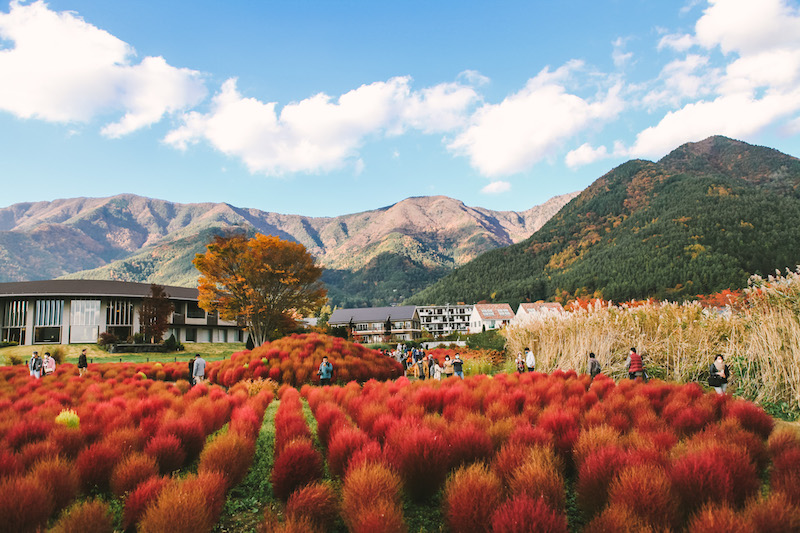
There is also a souvenir shops and other shops selling local produce (sweet potatoes, grapes, vegetables, etc). There are also a few ice-cream stands (you gotta try ice creams in Japan, it’s really delicious).
6. Enjoy a boat tour at Lake Kawaguchi

Another best things to do in Lake Kawaguchi is to go on a boat tour.
On a sunny day you will have a wonderful view of Mt. Fuji from the lake. The boat company is Ensoleille Excursion Ship. You can board the ship from HERE .
- Duration of the tour: ~20 minutes
- Admission fee: 1,000 yen for adults and 500 yen for children
Another fun activity on Lake Kawaguchi is to go on swan looking pedal boat. There are many places around the lake where you rent a pedal boat.
7. Visit Kawaguchi Asama Shrine (Tenku no torii), for one of the most scenic view of Mt. Fuji
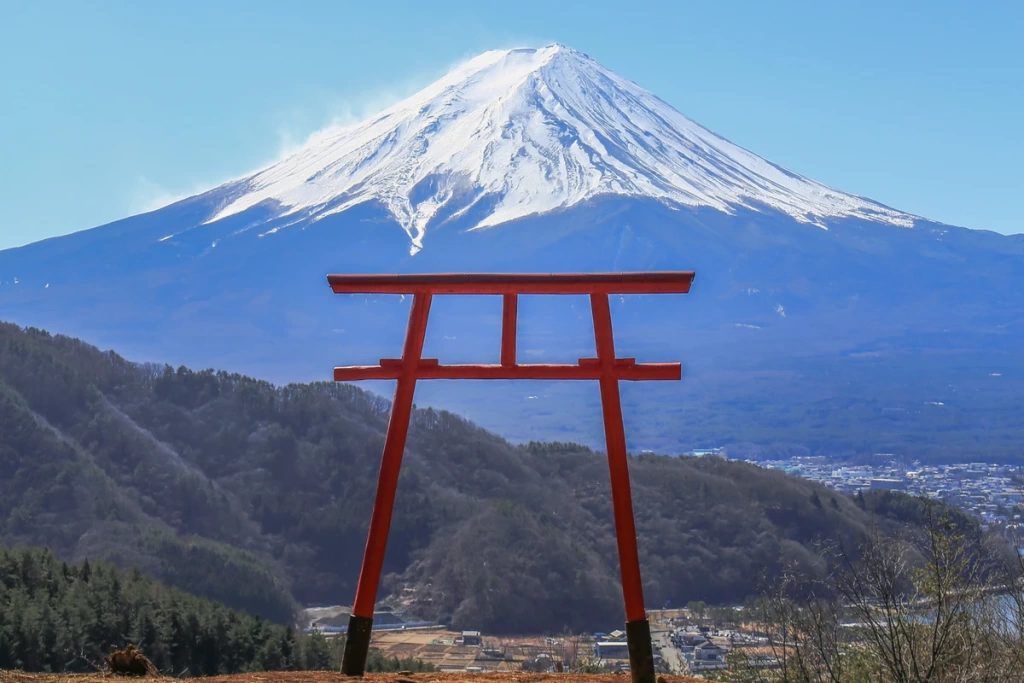
This is one of the most instagrammable places around Lake Kawaguchi ( check out this IG post ). However to get there, you will need a car, or be prepared for a long uphill walk.
At the end, it’s all worth it! The view from up there is incredible.
There is a torii gate right in front of the viewpoint which makes it magical. And of course, you guessed it, in the background you can see the spectacular Mount Fuji!
However, don’t go there at midway, as the sun will be directly in front of you. Early morning or late afternoon would be much better to take photos!

We love the view from Tenku no torii. With Chureito Pagoda, this is one of our favorite viewpoints to see Mount Fuji.
- Admission: there is a small donation box, as this shrine was placed on a private land.
At the bottom of the hill, don’t miss the visit of Kawaguchi Asama Shrine, the main temple. It’s an impressive and beautiful temple surrounded by massive trees! Worth a visit!
8. Visit the traditional and charming village of Iyashi no Sato, one of the best things to see near Lake Kawaguchi

A visit of the village of Iyashi no Sato is one of the best things to do at Lake Kawaguchi!
Iyashi no Sato is a village-museum located near Lake Kawaguchi. Here you can see traditional houses with thatched roofs .
It’s like an open air museum.
Everything at Iyashi no Sato is dedicated to local craft. The houses are home to workshops (washi paper, soba noodles, basketry), art galleries, restaurants, local craft shops (pottery, kimono, jewelry). It’s a nice place to spend half a day.
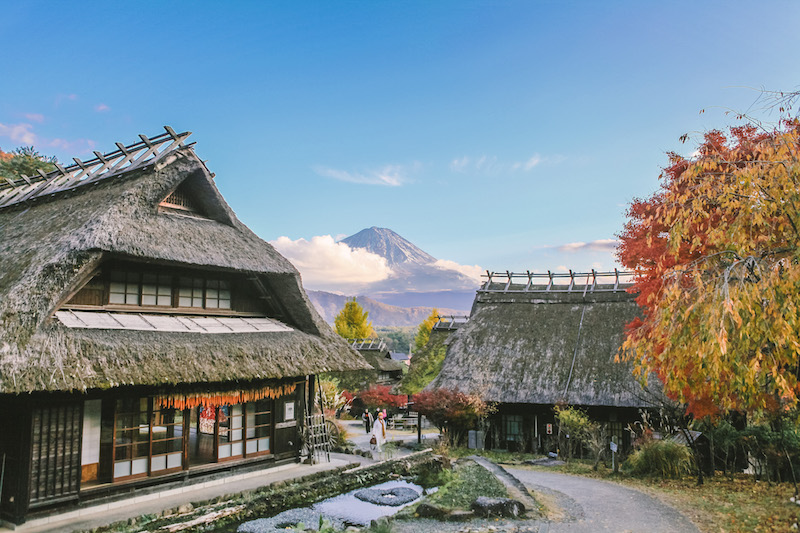
And the cherry on top of the cake, is that in the background you can see the beautiful Mt. Fuji. This is one of our favorite places to visit in Kawaguchi!
- Admission: 500 yen for adults and 250 yen for children
9. Explore an ice cave near Lake Kawaguchi
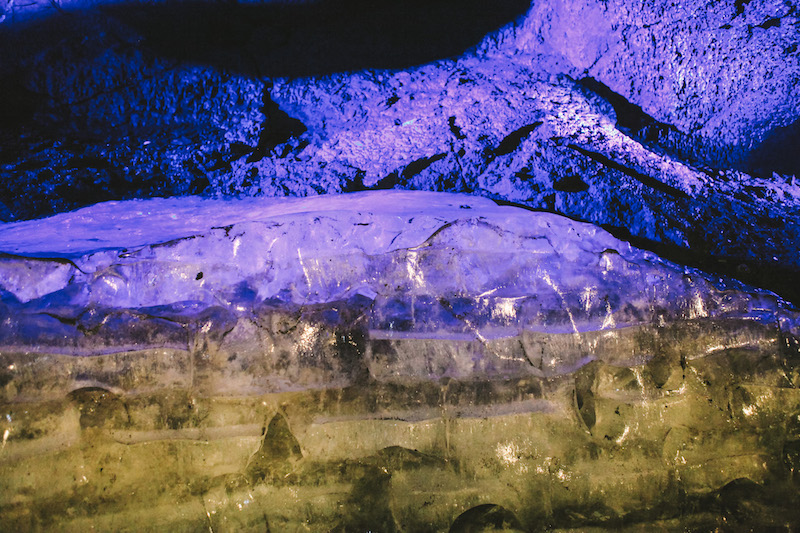
An Ice Cave? Yes, you read that right!
Head to Narusawa Ice Cave, near Lake Kawaguchi. Here you go deep down the cave to the see ice formation.
Prepare a jacket as it gets really cold down the cave. Some part of the cave are extremely low, you need to squat down to go through it . Once you reach the bottom of the cave you see lots of ice. It’s really interesting!

Visiting Narusawa Ice Cave is one of the best things to do around Lake Kawaguchi.
- Admission: 350 yen for adults and 200 yen for children
BOOK: FULL DAY SAKE BREWERIES GUIDED TOUR AT LAKE KAWAGUCHI
Fugaku Wind Cave is another cave which can be visited near Narusawa Ice Cave. Winter is obviously the best time of the year to observe the ice inside the caves. Both caves are really impressive. Fugaku Wind Cave is slightly easier to explore.
10. Walk through Aokigahara Forest, near Narusawa Ice Cave

Aokigahara Forest is a very dense forest with several trails. The particularity of this forest is that it grew on top of lava flow from Mount Fuji after an eruption in 864.
Today visiting the Aokigahara Forest is one of the best things to do in Lake Kawaguchi.
Because of its dense landscapes, rocky volcanic soil, thousand-year-old trees and winding paths, Aokigahara Forest has the reputation of being cursed … It is even believed to have demons.
Those “legends” aside, this forest is absolutely stunning. Venture in one of the trails to enjoy a relaxed walk in the nature.
BOOK: GUIDED TREKKING EXPERIENCE AT AOKIGAHARA FOREST + CAVE EXPLORATION
11. Learn more about sake at Ide Sake Brewery

Ever tried sake in Japan? Or ever wonder how sake is made?
Why not joining a Sake Brewery tour where you can also taste various sakes.
We recommend the Ide Sake Brewery at Lake Kawaguchi. This family owned brewery offer english guided tour and free tasting !
Reservation is required 1 day before, HERE .
12. Enjoy a delicious meal at Sanrokuen, a 150 years old restaurant at Lake Kawaguchi
To complete your visit of Lake Kawaguchi, enjoy a fantastic meal at one of the oldest restaurants in the area : Sanrokuen
This could well be one of the most traditional Japanese dining experience we had during our 2 months road trip. Everything is done the traditional way here. The food is super fresh and absolutely delicious!
We highly recommend this place if you are visiting Lake Kawaguchi. You won’t regret it.
13. Check out Oshino Hakkai village near Lake Kawaguchi
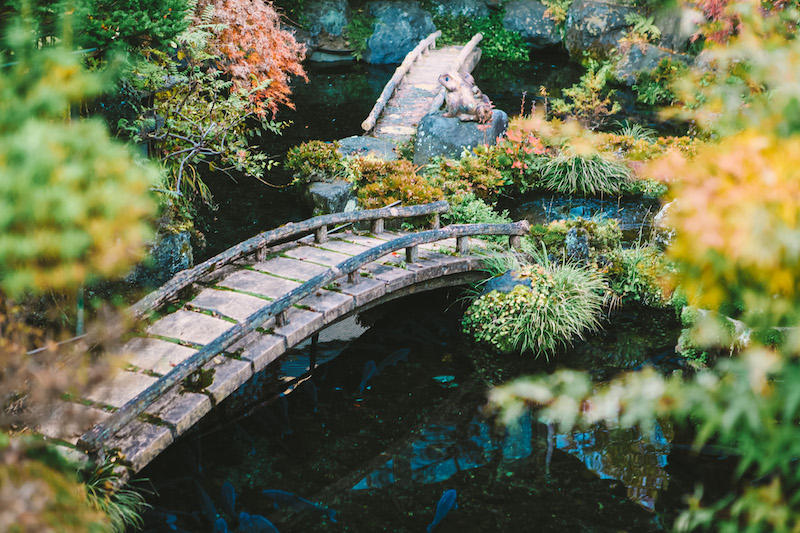
Oshino Hakkai Village is located between Lake Kawaguchi and Lake Yamanaka . This is one of our favorite places to visit in this area!
Make sure to check it out as this is one of the cutest places to visit in Japan !
At Oshino Hakkai Village, there are many scenic ponds , with plenty of restaurants, cafes, and snacks around. The village is really cute and worth spending a few hours wandering through the various alleys and finding all the water ponds!

Deguchi Pond, Okama Pond, Choshi Pond, Sokonashi Pond, Nigori Pond, Waku Pond, Kagami Pond, and Shobu Pond, each with its own history of Fuji worship.
You can also combined your visit of Oshino Hakkai Village with Lake Yamanaka, which is another place with the best viewpoint of Mt. Fuji.
READ: 10 BEST THINGS TO SEE AT LAKE YAMANAKA
- Location: HERE
- Admission: FREE
HOW TO GET TO OSHINO HAKKAI VILLAGE FROM LAKE KAWAGUCHI?
If you have car, then it will take around 20min to get there. There are plenty of parking spaces around the village.
By public transport from Lake Kawaguchi you can also catch a bus. It takes about 30min.
14. Enjoy a visit of Kawaguchi Forest Museum

There are many museums around Lake Kawaguchi. Our favorite one is Kawaguchi Forest Museum.
This museum is a beautiful place with a magical scenery. Especially on clear day when Mt. Fuji is visible.
The garden is our favorite part, especially the rose garden.
There is also a cool playground and show for kids, which makes it the perfect place to visit as a family.
- Admission: 1800 yen for adults / 1200 yen for children
15. Relax at an onsen with a view of Mt. Fuji is one of the best things to do at Lake Kawaguchi after a full day of visit
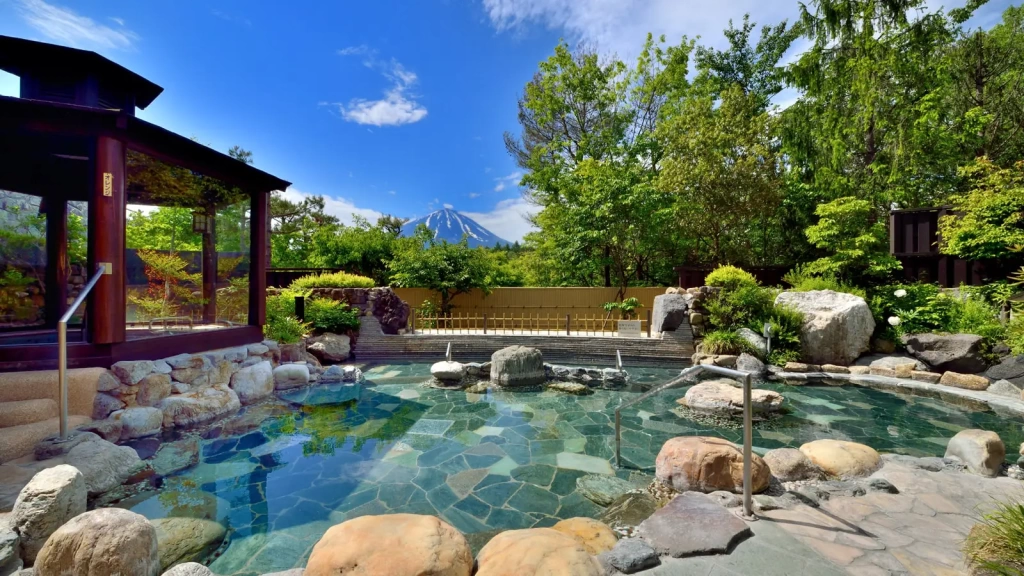
Head to Fuji Yurari Hot Spring for one of the most beautiful onsen experience at Lake Kawaguchi. The outdoor onsen has a view of Mt. Fuji. The whole area is nestled deep in the nature.
We absolutely love this place.
This is a public onsen, meaning you do not need to stay at the hotel, you can simply buy a pass to access the onsen.
How to get to Lake Kawaguchi from Tokyo?
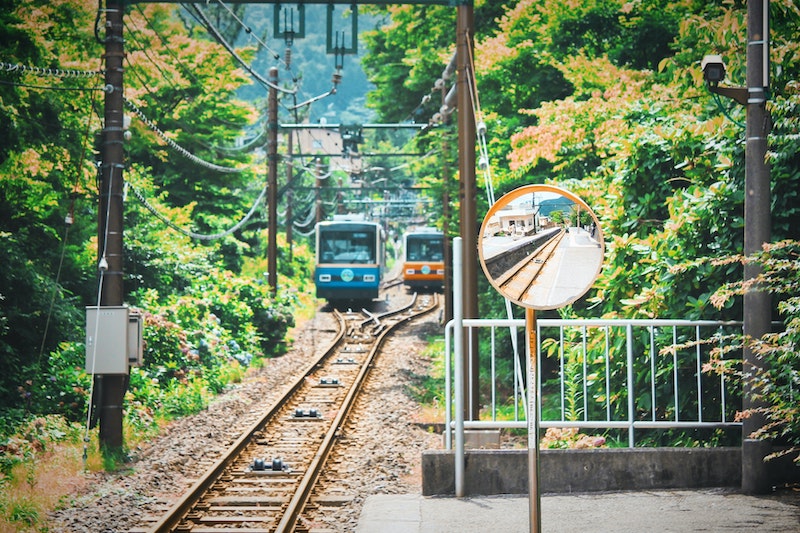
Three options are possible to get to Lake Kawaguchi from Tokyo.
1. Reach Kawaguchi by train
The train with the JR lines: From Shinjuku change trains at Otsuki station al the way to Kawaguchi. However, we do do recommend this option, as the train from Otsuki is very crowded.
2. Reach Kawaguchi by bus
Taking the bus from Tokyo is the cheapest and most practical option in our opinion. Not only can you book in advance on the Highway Bus website , but the bus is also direct! Just seat down and relax until you reach Kawaguchi.
3. Getting to Kawaguchi by car
If you have a car, or decided to rent a car during your visit of Japan, then you can easily get to Kawugachi. The journey from Tokyo takes about 1h30min (depending on traffic).
We highly recommend Nippon-Rent-A-Car in Japan when renting a car in Japan. We always use them, their service is top notch!
4. Private Transfer
If you are a group of people traveling to Japan, it makes sense to hire a private transfer from Tokyo. This is a 1 day trip with a guide. The tour will take you around Kawaguchi and Hakone. This is the most efficient way if you only have 1 day to see Mt. Fuji. BOOK HERE
5. Join a tour group
How to get around at lake kawaguchi.

The good part about traveling to Lake Kawaguchi, is that there are many public buses which will take to the main sights. The buses are very frequent too, which is very convenient!
There are three lines starting from Kawaguchiko Station : the red Kawaguchiko Line (buses every 20 minutes) runs along the eastern and northern shores.
The green Saiko Line (hourly) runs along the southern shore of Lake Kawaguchiko and around Lake Saiko.
The blue Narusawa Shojiko Motosuko Line (every 2-4 hours) serves Lake Shoiko and Lake Motosuko. A pass for unlimited use of all three lines on two consecutive calendar days costs 1500 yen.
If you only want to see the main highlights in a day, the red line would be sufficient!
How many days to visit Lake Kawaguchi?

We recommend 2 full days to cover the best things to see in Kawaguchi!
You can visit Kawaguchi during a day trip, which is very common from Tokyo, however, you will have to skip a few things!
Where to stay at Lake Kawaguchi? Which are the best hotels around Kawaguchi?
1. fuji lake hotel (best seller).

Fuji Lake Hotel is one of the best hotels around Lake Kawaguchi. You can enjoy a private onsen with the view of Mt. Fuji! How cool is that?
The hotel is close to Kawaguchiko Station and just a few minutes walk to the bus stop. Which makes it a perfect place to stay if you do not have a car.
Fuji Lake Hotel is often ranked as the best hotel around Lake Kawaguchi.
2. KORYU HOTEL (BEST VALUE)

In terms of best value for money, Koryu Hotel is the best option! This hotel is right by the lake and offer multiple onsen options. It is located walking distance to Mt. Fuji ropeway.
Perhaps the only con, is that there is no view of Mt. Fuji from the hotel. It didn’t bother us at all when staying there as we could see Mt. Fuji the whole day already.
Best time to visit Kawaguchiko?
One of the main point for a visit of Kawaguchi is to see Mount Fuji. Now, beware that Mount Fuji is very often covered by a thick cloud… sadly.
However, you will have more chances to see Mt. Fuji in Winter or in the colder days of Autumn and Spring. But you can also have beautiful clear days in summer. It’s just that the humidity will be higher and the chances of being cloudy higher too.
All and all we recommend Spring for the Sakura and Autumn to see the fall foliage.
Other things to see near Lake Kawaguchi?
1. lake yamanaka.
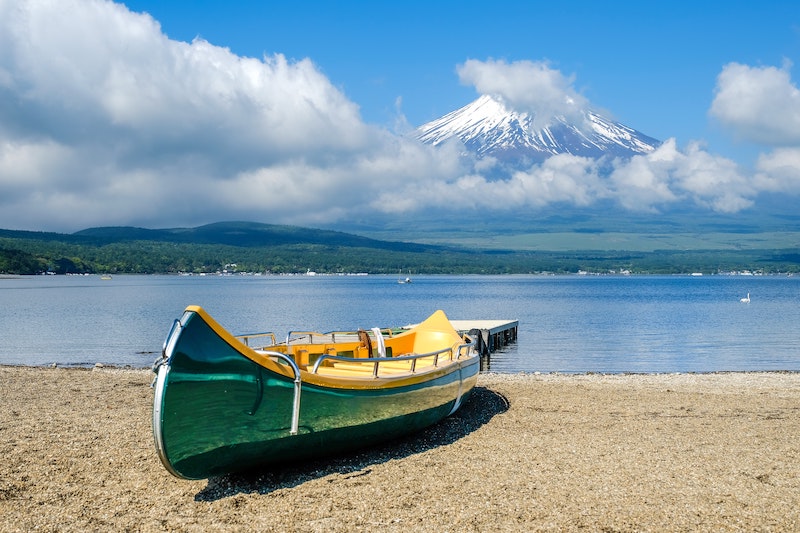
Lake Yamanaka is one of our favorite places to admire Mount Fuji.
This is another excellent day trip from Tokyo as it’s only located 1 hour from the capital. At Lake Yamanak a, besides the amazing view of Mount Fuji, you can do plenty of outdoor activities. Hike, Canoe, Cycling etc. It’s also a great spot for camping.
From Hakone, it takes about 1h to drive to Yamanaka . By public transportations it’s a tiny bit more complicated, as it takes about 3h. You will then to change bus twice.
READ: 10 BEST THINGS TO SEE IN LAKE YAMANAKA
2. HAKONE, ONE OF THE BEST PLACES IN JAPAN TO SEE MT. FUJI

Hakone is one of the best places to visit in Japan . It’s a region with significant geothermal activity. There are therefore many onsen (Japanese hot springs).
Around Lake Ashi, you can also visit the famous and stunning Hakone Shrine, the Hakone Checkpoint and admire Mount Fuji of course!
A visit to Hakone is a must if your are in visiting in Japan. For people living in Tokyo, Hakone is also one of the best day trip or weekend trip from the capital
READ: 15 AWESOME THINGS TO SEE IN HAKONE
Related posts
- VISIT LAKE YAMANAKA NEAR MT. FUJI
- 15 BEST THINGS TO SEE IN HAKONE
- 10 BEST PLACES TO SEE MOUNT FUJI
- VISIT NARAI-JUKU ALONG NAKASENDO
- 10 BEST THINGS TO SEE IN MATSUMOTO
- 20 BEST THINGS TO VISIT IN HOKKAIDO
- BEST THINGS TO SEE IN KYOTO
We are Hammer and Guillaume, a fun couple traveling the world. We will take you to some of the most amazing places on earth. Hammer is a yoga instructor and Guillaume a true water baby, enjoying all kinds of water sports. Follow-us to get the latest update about our travels.
Similar Posts
![kawaguchiko travel guide TOP 6 SKI RESORTS IN HOKKAIDO [2024]](https://afuncouple.com/wp-content/uploads/2020/04/wdbqhciisiw-768x516.jpg)
TOP 6 SKI RESORTS IN HOKKAIDO [2024]
Here are the best ski resorts in Hokkaido: Niseko, Furano, Kiroro, Rusutsu, Tomamu and Kamui Ski. And we added a bonus resort. Check it out
![kawaguchiko travel guide 10 BEST THINGS TO DO IN GANGNAM [GUIDE]](https://afuncouple.com/wp-content/uploads/2021/01/Gangnam-14-768x468.jpg)
10 BEST THINGS TO DO IN GANGNAM [GUIDE]
Gangnam is Seoul’s most modern district. If you visit Seoul make sure to visit Gangnam, to experience another side of the Korean culture.
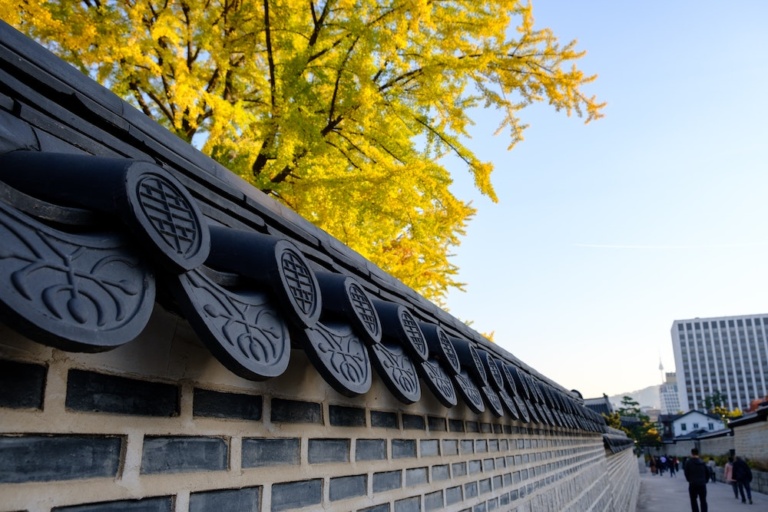
THE BEST TIME TO VISIT SOUTH KOREA
The best time to visit South Korea is in Autumn during September and October and spring during April and May. Here is your full guide.
![kawaguchiko travel guide BOSEONG GREEN TEA FIELDS – COMPLETE GUIDE [VISIT KOREA]](https://afuncouple.com/wp-content/uploads/2020/08/Boseong-1-768x516.jpg)
BOSEONG GREEN TEA FIELDS – COMPLETE GUIDE [VISIT KOREA]
Boseong is famous for its beautiful green tea plantations. Head to Daehan Dawon tea estates to visit the tea terraces! A must-see in Korea.

ALPACA WORLD KOREA – ULTIMATE GUIDE
The Alpaca World is the largest ranch in Korea. The perfect place to see Alpacas, Goats, Birds, Deer, Camel, Ostrichs and so much more.

MOKPO IN SOUTH KOREA – BEST THINGS TO DO
Mokpo is located in the extreme southwest of Korea. Mokpo is a city surrounded by the sea. Check out the. most amazing things to do in Mokpo
Leave a Reply Cancel reply
Your email address will not be published. Required fields are marked *
- South Africa
- Afghanistan
- North Korea
- Adventure + Outdoors
- Amusement Parks
- Backpacking Trips
- Boating + Cruises
- Budget Travel
- Bus + Train Travel
- Coasts + Islands
- Country Trips
- Fall Vacations
- Family Vacations
- Green Travel
- Heritage + History
- Honeymoons + Romance
- Inspiration + Guide
- Landmarks + Attractions
- LGBT Travel
- Markets + Bazaars
- National Parks + Reserves
- Nature + Wildlife
- Parks + Gardens
- Pets + Animals
- Photography
- Airlines + Airports
- Budgeting + Currency
- Business Travel
- Celebrity Travel
- Customs + Immigration
- Deals + Rewards
- Family Travel
- Hotels + Resorts
- Luggage + Packing Tips
- Offbeat News
- Photography Tips
- Responsible Travel
- Solo Travel
- Tech + Gear
- Travel Etiquette
- Travel Warnings
- Bars + Clubs
- Celebrity Chefs
- Restaurants + Cafés
- Wine + Vineyards
- Beach Hotels
- Boutique Hotels
- Hotel Openings
- Hotel Reviews
- Luxury Hotels
- Mountain + Ski Resorts
- Spa Resorts
- Vacation Rentals
- Asia Cruises
- European Cruises
- Festivals + Events
- Museums + Galleries
- Style + Design
- Travel’s Best
- Hotel with Agoda.com
- Hotel with Booking.com

What to eat in Laos? — 15+ famous, most popular &…
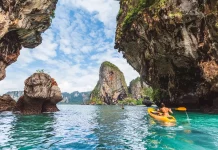
Krabi itinerary 4 days — What to do in Krabi for…
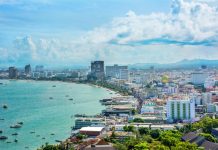
Pattaya travel blog — The fullest Pattaya guide for first-timers
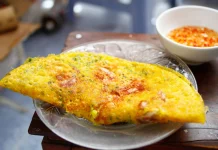
Must eat in Saigon. 31+ must-try & best street food in…
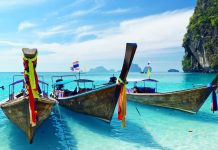
Bangkok to Krabi — How to get to Krabi from…
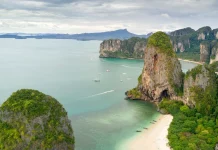
Krabi travel blog: The ultimate Krabi travel guide & suggested Krabi…
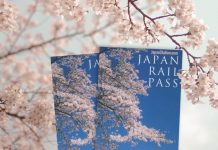
JR Rail Pass Guide. All things you need to know, how…
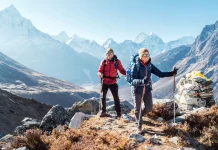
How to prepare for trekking in Nepal? — 10+ Nepal trekking…
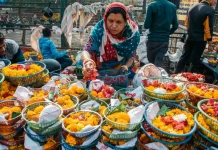
India trip tips — 9+ things to know before going to…
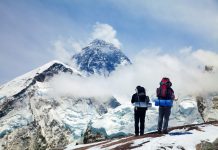
All about tips in Nepal — How much to tip in…
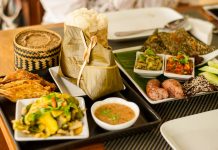
Where to eat in Luang Prabang? — Top 5 most famous…
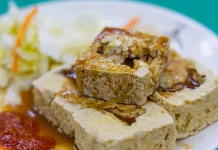
What to eat in Taiwan? — 24+ most popular food to…
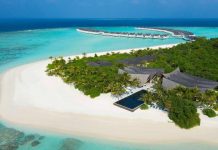
Mövenpick Resort Kuredhivaru Maldives reviews. The detailed review of my vacation…
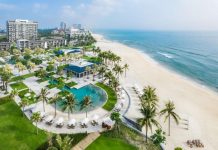
Hyatt Regency Danang Resort and Spa reviews. The resort is highly…
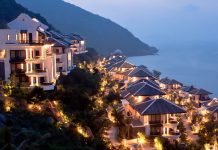
+7 luxury resorts you must stay in Danang, Vietnam
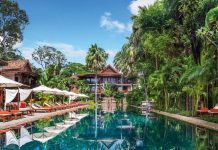
Top hotels in Siem Reap — 8+ best places to stay…
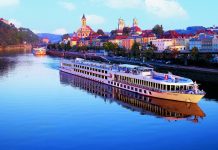
10 must-know things for your best first time European river cruise
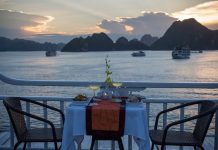
Top 3 best luxury cruises in Halong Bay, Vietnam
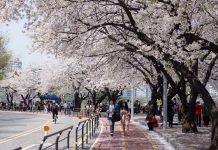
Cherry blossom festival Korea 2024 — Top 5 cherry blossom festivals…
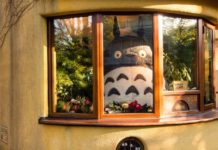
Ghibli museum blog — The fullest Ghibli museum guide for first-timers
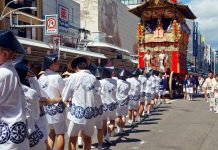
Kyoto festival — Top 10 best events & most famous festivals…

National Palace Museum Taipei blog — What to see in National…

Japanese waterfall — Top 10 most beautiful waterfalls in Japan in…

19+ most beautiful towns in Europe every tourist need to visit…

Georgia travel photos — 20+ captivating photos show Georgia is heaven…
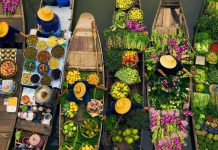
Explore Damnoen Floating Market — The oldest floating market of Thailand
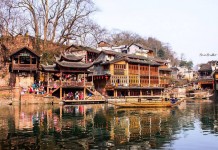
Visiting Fenghuang Ancient Town — One of the most charming ancient…

Mekong Delta travel blog — Beyond rivers of Southwestern Vietnam

14 reasons why you should travel when you are young

Shigaraki Tanuki – An animal symbol of good luck in Japan

Living in the charms of cave houses in Andalucia, Southern Spain

20+ jaw-dropping tiny homes around the world
Kawaguchiko travel blog — the fullest kawaguchiko travel guide & lake kawaguchiko itinerary 2 days for the first-timers.
I ate at an eatery that opposite Kawaguchi station and close to my hotel. However, this shop is only open in the morning, and it only open from 9 – 9:30am. Houtou noodle is quite similar to the cold soba noodle which I ate in Kyoto. In addition to this shop, you can refer to another famous restaurant, Houtou Fudou (Address: 2458 Funatsu Higashikoiji, Fujikawaguchiko-machi, Minamitsuru-gun 401-0301, Yamanashi Prefecture / Hours: 11AM–8PM / Phone: +81 555-72-8511) , but it is located a bit far from Kawaguchi station.
- JR Rail Pass Guide. All things you need to know, how to buy, how to use along with Japan Rail Pass FAQs
- What to buy in Kyoto? — 31+ must-buy Kyoto souvenirs, gifts & best things to buy in Kyoto
- What to buy in Japan? — Top 23+ must-buy souvenirs & best things to buy in Japan
- Arashiyama travel blog — The fullest Arashiyama travel guide with top things to do in Arashiyama
- Where to buy souvenirs in Kyoto? — Top 11+ best places to shop in Kyoto & what to buy in Kyoto
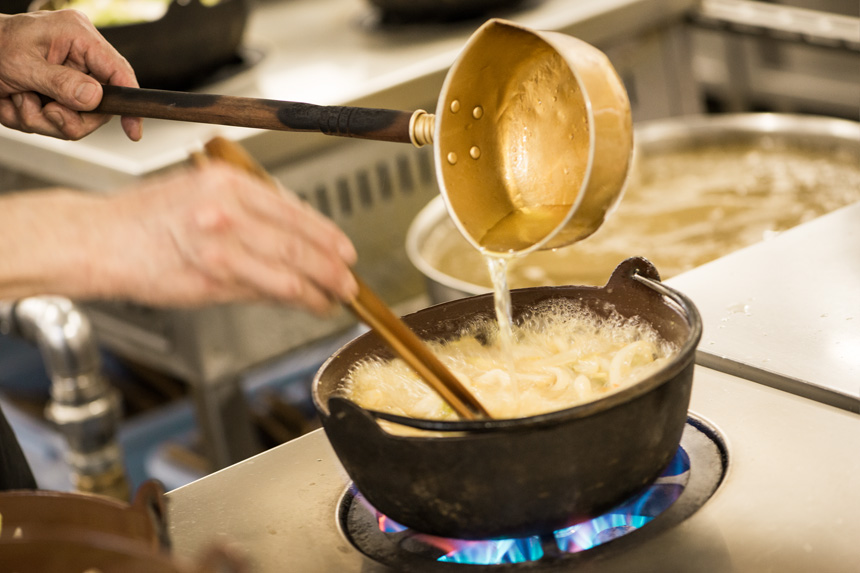
There are many eateries and restaurants around Kawaguchiko station. However, in the evening they closed quite early, especially traditional food stores. For dinner I went looking for a long time, finally eating in a restaurant a bit far away from the station, called Tetsuyaki (Address: 3486 Funatsu, Fujikawaguchiko, Minamitsuru District, Yamanashi 401-0301, Japan / Hours: 12–2PM, 5–9:30PM; Sunday: Closed / Phone: +81 70-4075-1683) . Later at night, there was a fairly large Tempura restaurant open, but I didn’t like to eat tempura very much.
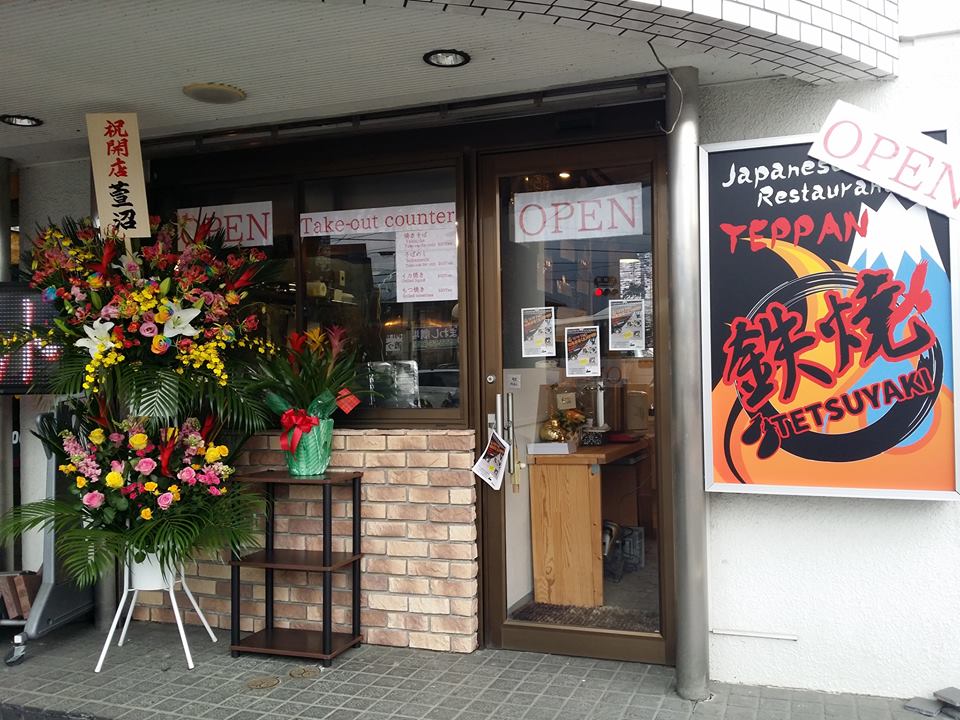
My meal is a stir-fried squid dish and battered deep fried fish. Overall quite delicious, there are many Western tourist and Japanese people eating here, mostly are tourist couples. The price for the meal is 1.800JPY ($16.56).
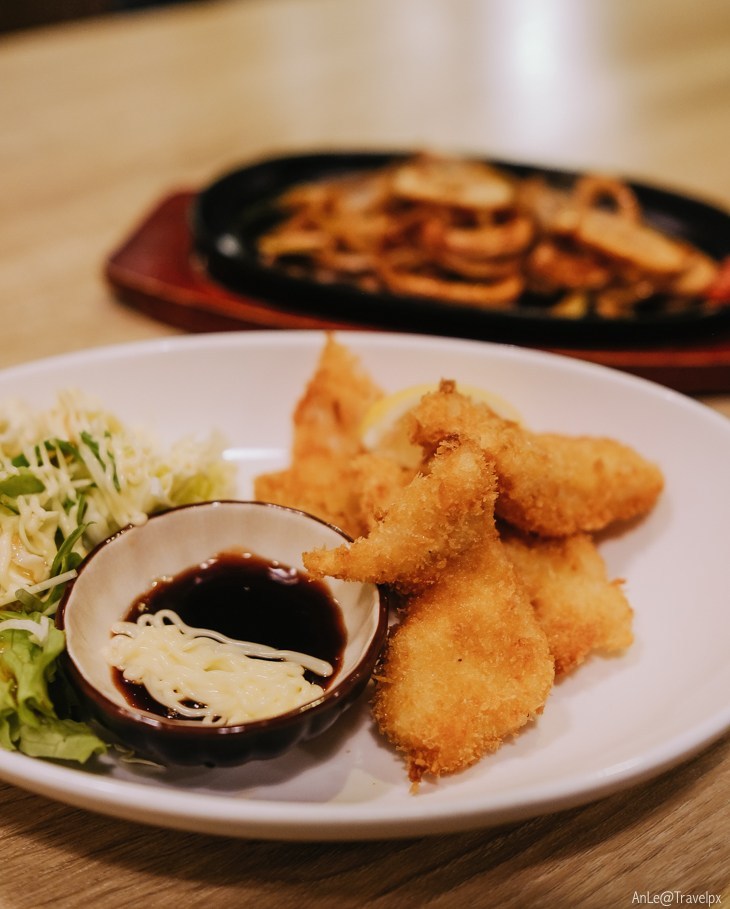
Lake Kawaguchiko itinerary: What to do in Kawaguchiko and how to spend 2 days in Lake Kawaguchiko?
2 days in kawaguchiko — day 1.
Take the train from Tokyo to Kawaguchiko
6 AM: Go to Tokyo Station to take a bus to Lake Kawaguchiko.
8:30 AM: The bus arrives at Kawaguchi station, get off the bus and go to the hotel to send my luggage. Then go to breakfast – Houtou noodles at Houtou Restaurant nearby.
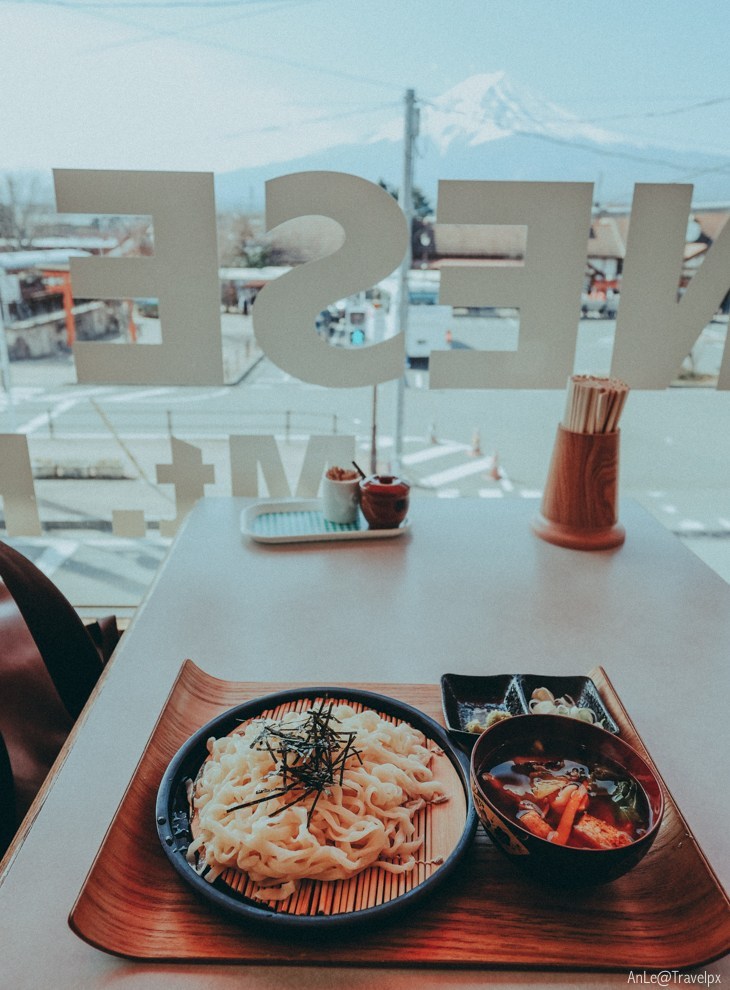
9:30 AM: Line up to buy 2 Day Pass in Kawaguchi to use sightseeing tourist bus. The first destination is Arakurayama Sengen Park, but there is no bus until 11:00 AM, so I take the train to avoid waiting. The train in Kawaguchiko is very beautiful with many colors outside, inside the cabin is also very cool and cure.
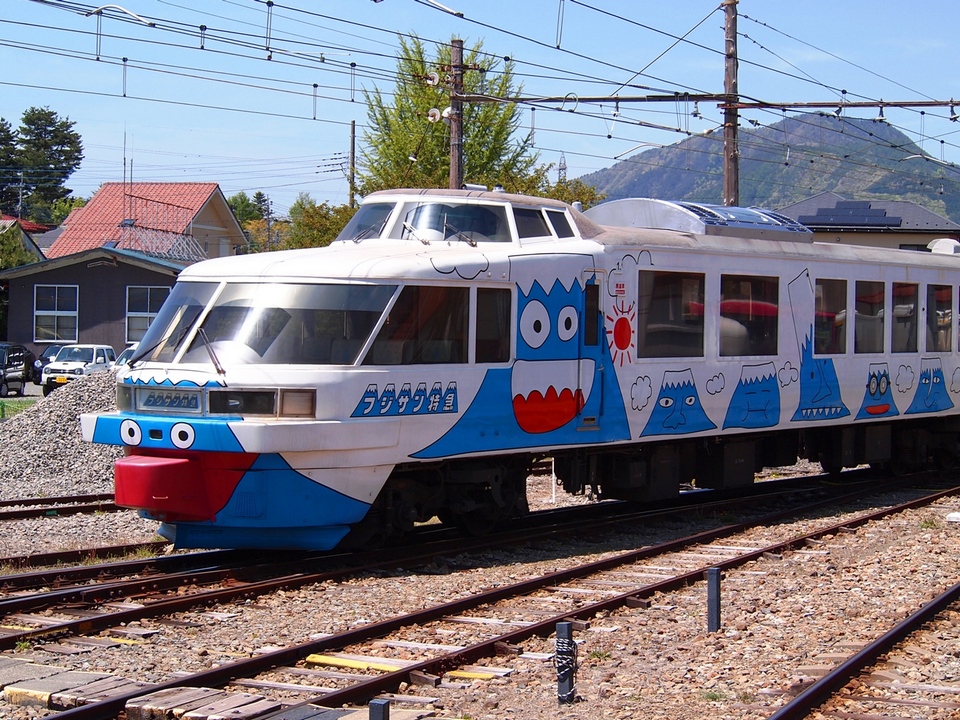
Arakurayama Sengen Park

10:30 AM: The train arrives Shimoyoshida station, walking about 10 minutes to reach the foot of the mountain. From here, I climbed the mountain for 15-20 minutes to reach the top of Arakurayama Sengen Park. The way up has quite a lot of rest and dining points, and any spot can be viewed directly to Mount Fuji.
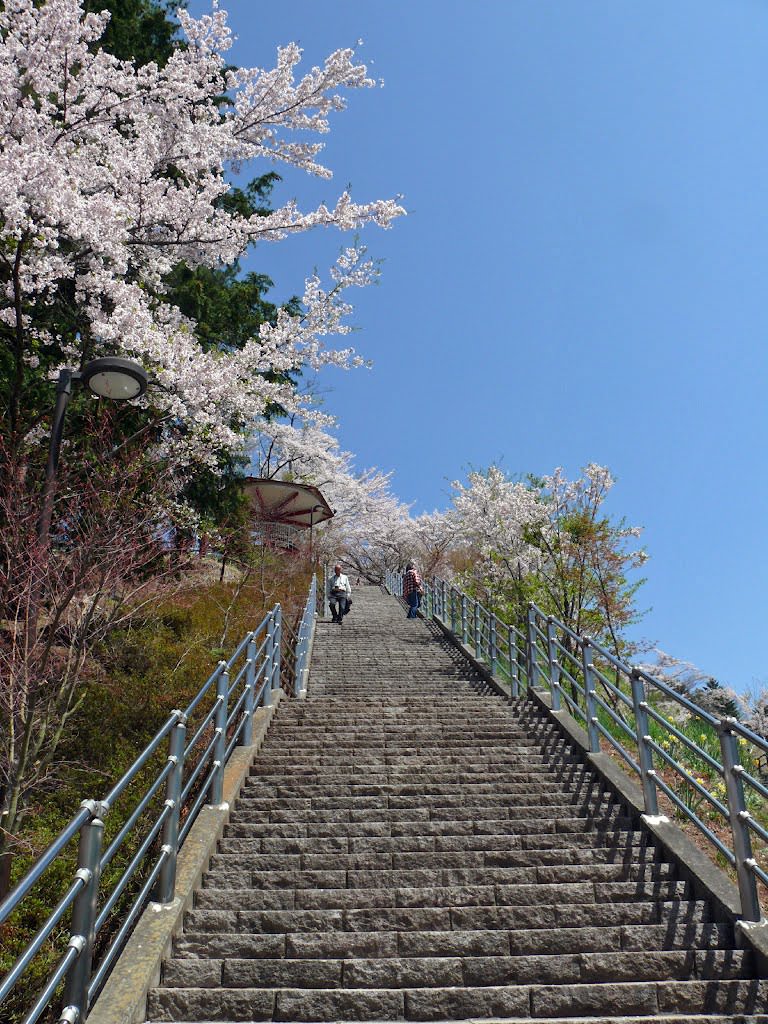
However, the best spot to see Mt. Fuji is still the peak of Arakurayama Sengen, with a small beautiful pagoda called Chureito that is painted in red, very nice. If you come here in the season of cherry blossoms, the flowers bloom will create even more spectacular scene.
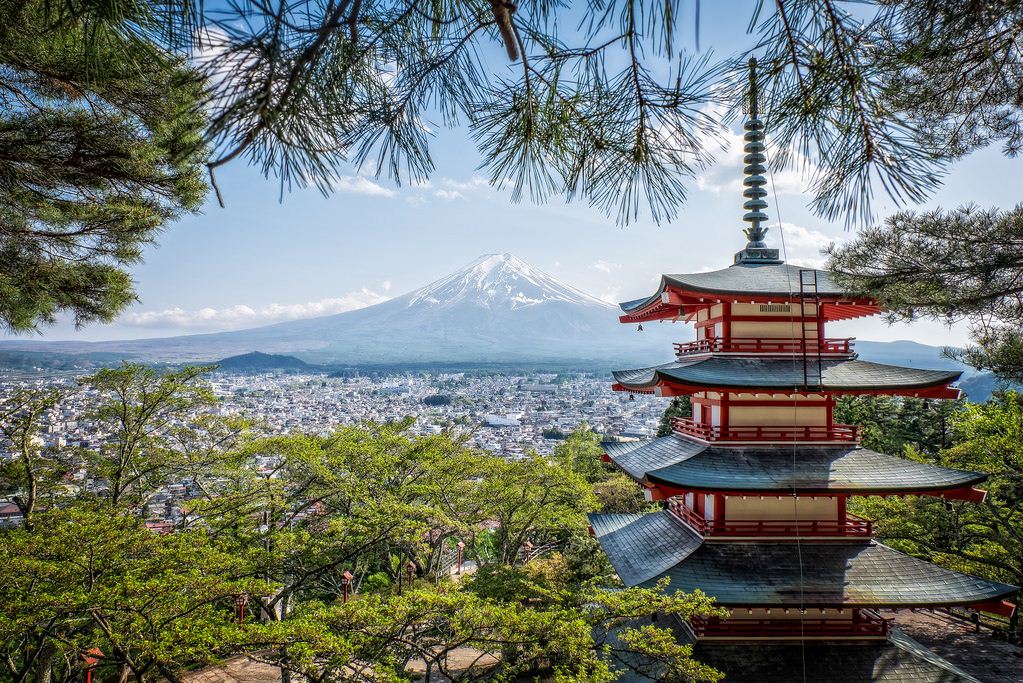
Address: 3353-1 Arakura, Fujiyoshida 403-0011, Yamanashi Prefecture Hours: Open 24 hours Phone: +81 555-22-1111
Take the bus around Lake Kawaguchiko
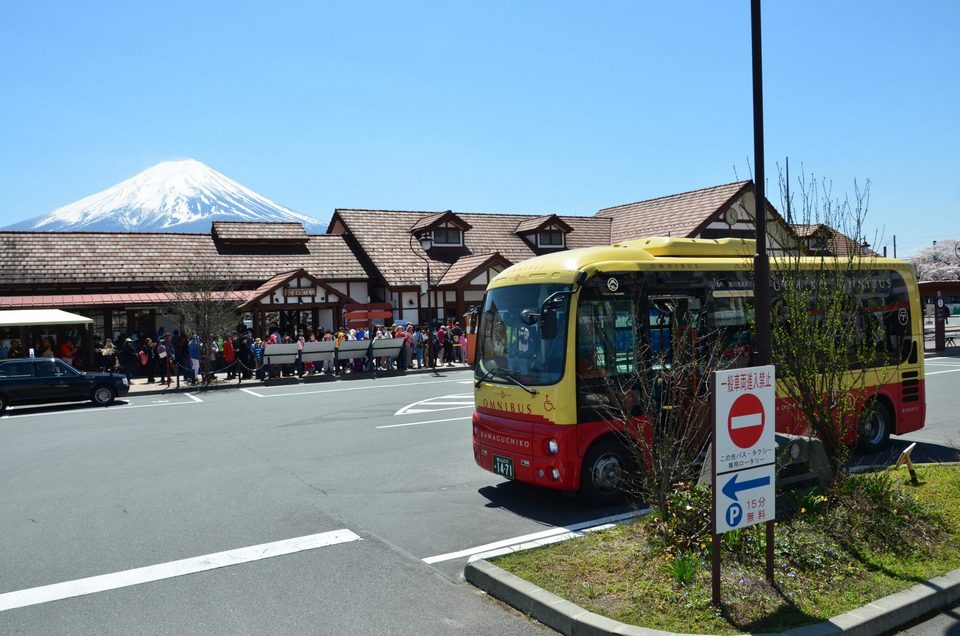
At 12:00 AM, I returned to Kawaguchiko central station, taking a red line bus to get around the lake for sightseeing. The area around the lake has a lot of attractions and buses will stop at every point so visitors can get off, want to continue, wait for another bus to pick up, it is a hop-on and hop-off bus.
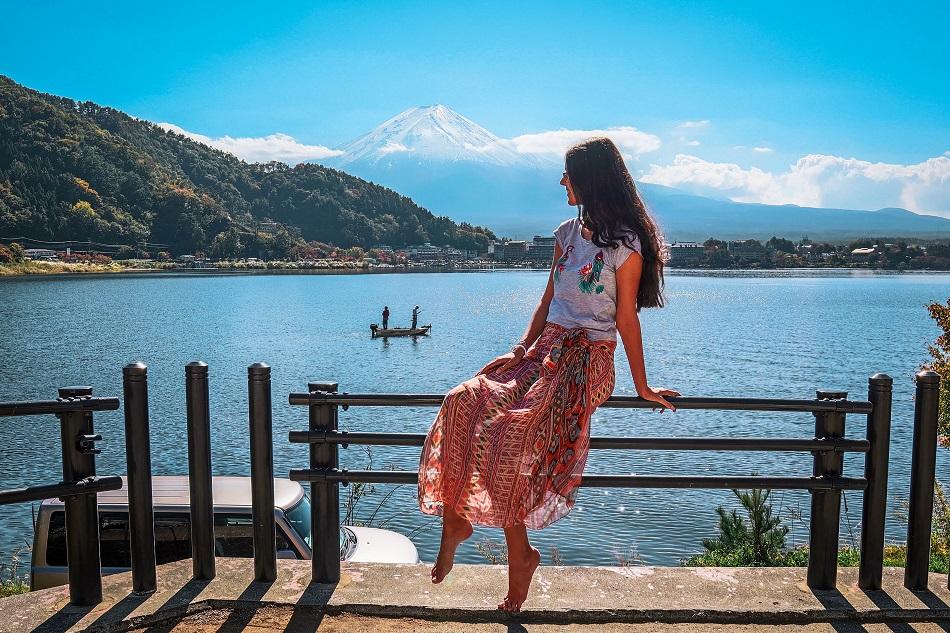
Attractions around Lake Kawaguchiko such as:
Lake Kawaguchiko Ohashi Bridge (Fujikawaguchiko-machi): Many young people gather here, you can walk across the bridge, or wander around on the riverside road.

Mt. Fuji Panoramic Ropeway: Sitting in a cable car you can see both Mount Fuji and Lake Kawaguchi, up to the top is Mount Tenjo – which is mentioned in the context of Kachi Kachi Yama fairy tale. Remember to take a picture with the heart-shaped Tenjo no Kane bell.
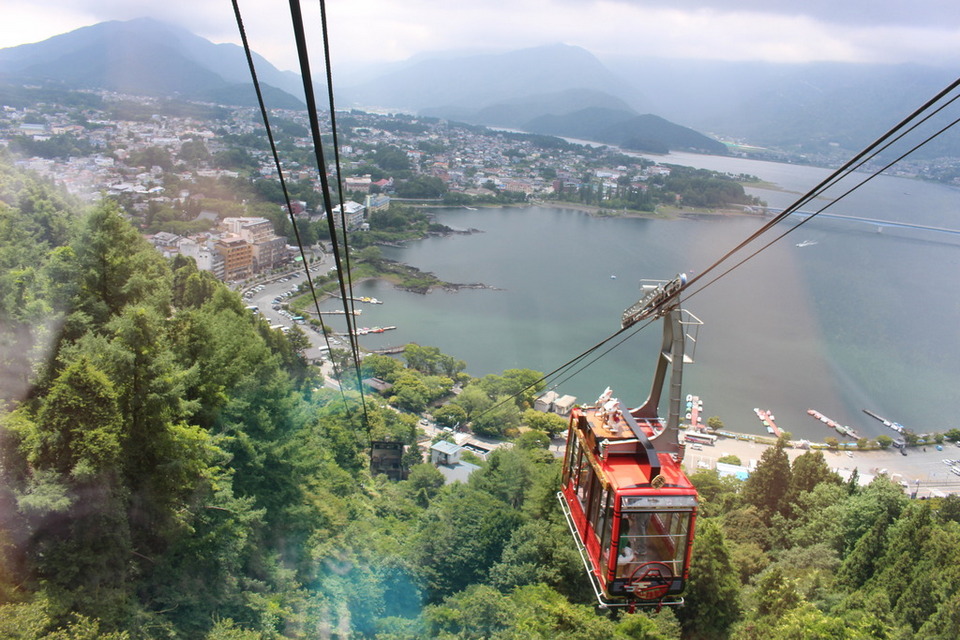
Kawaguchiko Music Forest Museum: This European-style museum is located in a garden. If you go walking around, it is free, and step inside to visit you have to pay admission fee.
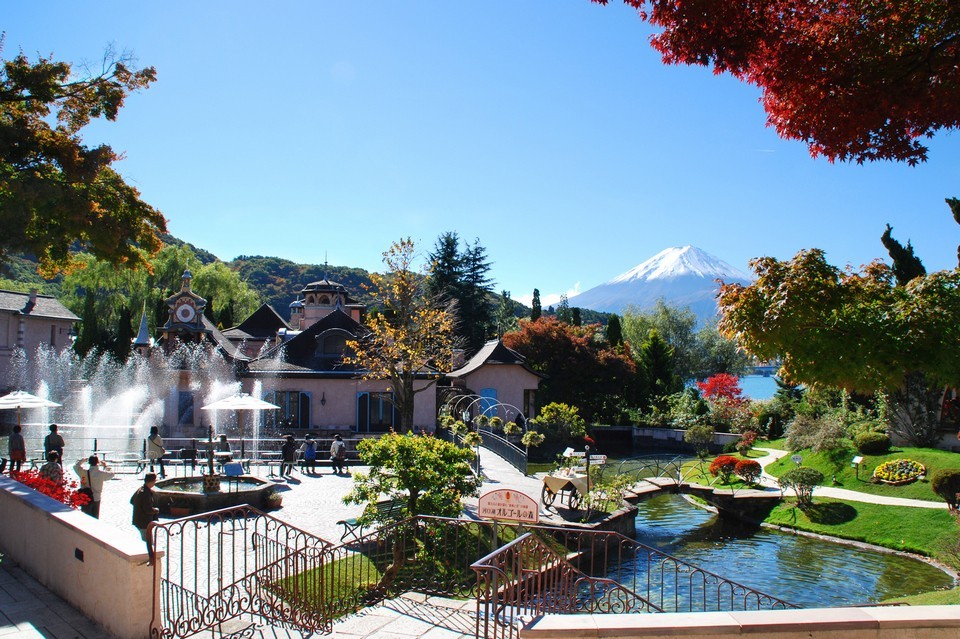
Oishi Park: The last point of the red line bus, this park is a massive complex that views straight to Mt. Fuji. Oishi is also a huge flower garden with lots of colorful flowers. The services at the park are also diverse, including restaurants, food stores, shopping malls, cafes, ..
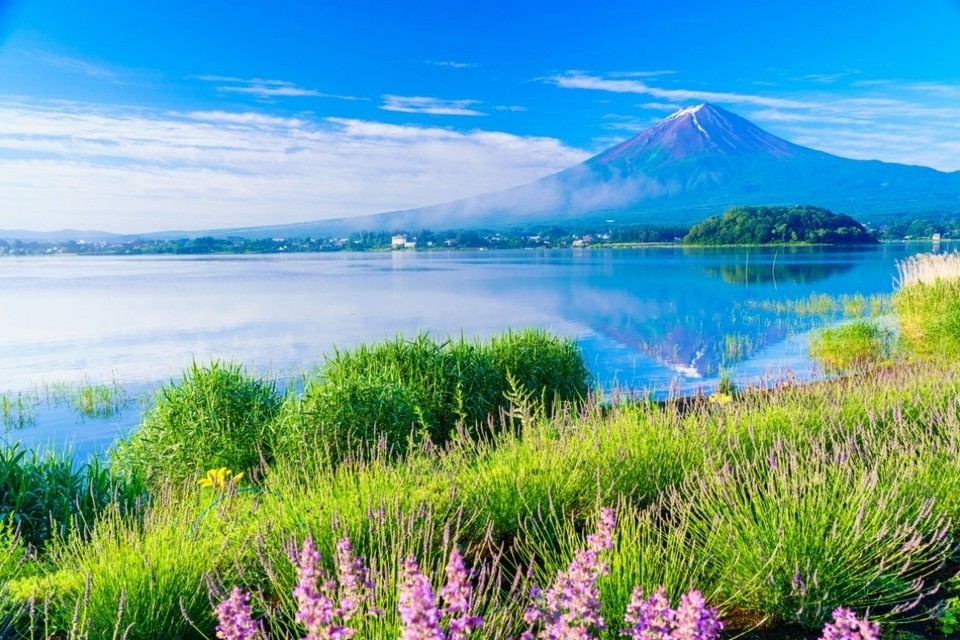
Getting to the town to see the beautiful Mt. Fuji at sunset

After finishing the sightseeing bus tour around lake Kawaguchiko with the Red Line bus, I returned to Kawaguchiko central station and continued to catch the train to Mt. Fuji Station. From here I wandered into the town center. There are no places to visit here, but it is a living area of indigenous people, full of services, shops, stores, and supermarkets.
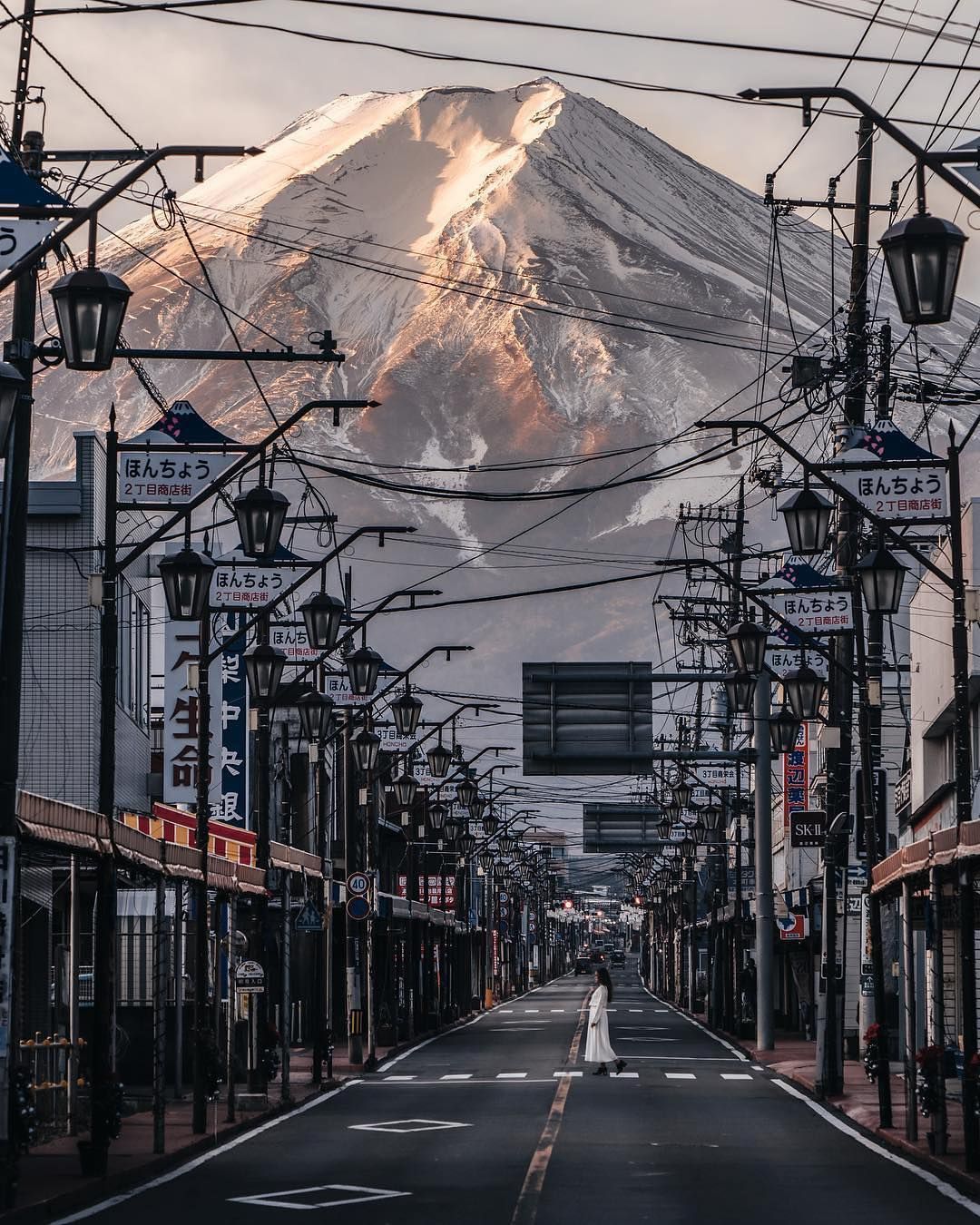
A best spot where you can see Mount Fuji at sunset is the town center, with both sides of the street lights up. The spectacle is like Mt. Fuji is devouring a neighborhood, so majestic.
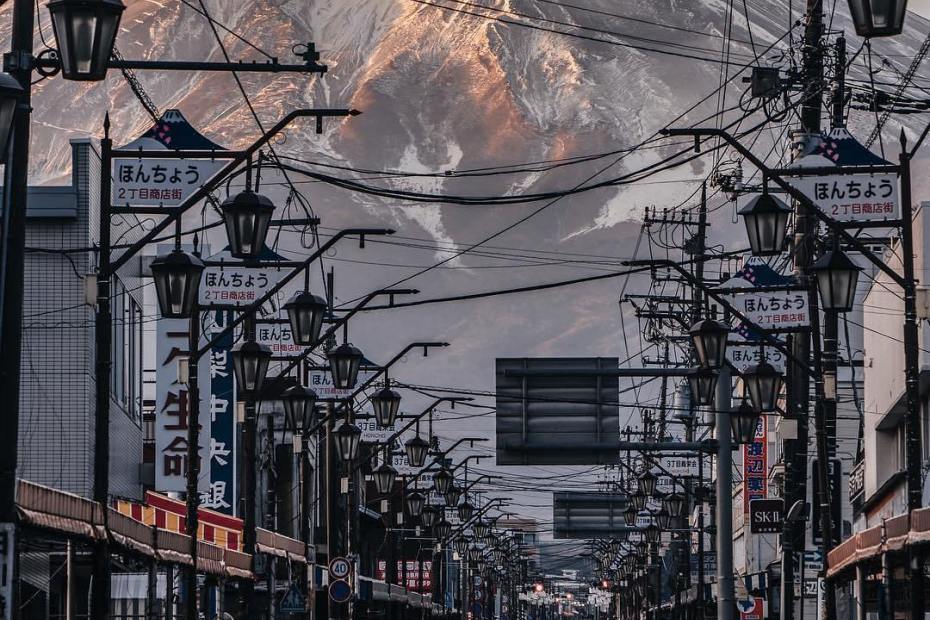
Kawaguchiko itinerary — Day 2
Saiko iyashino-sato nenba (ancient japanese village).
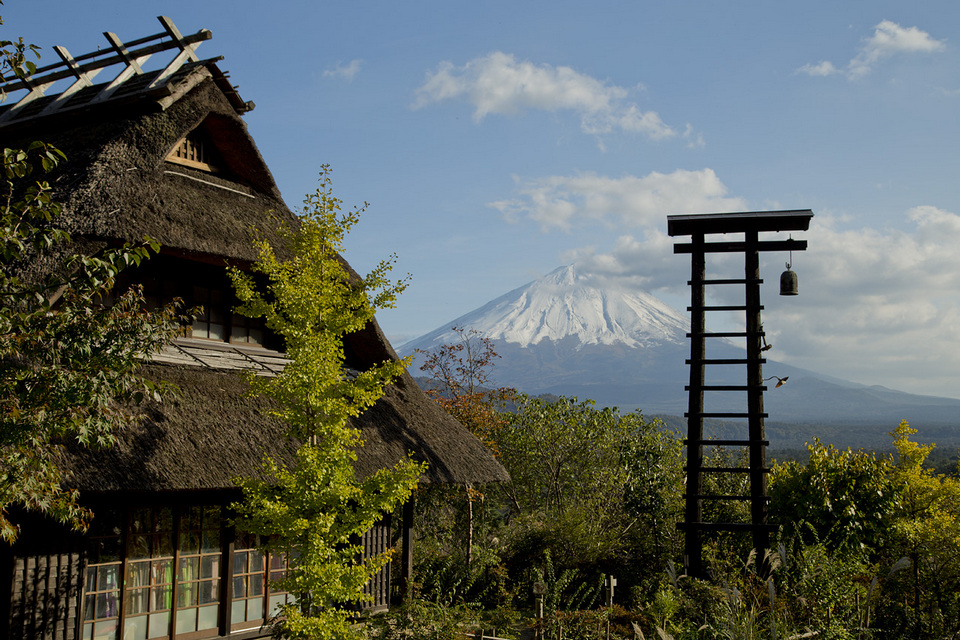
This village located next to Lake Saiko is quite far from Kawaguchi central station. The earliest bus route departs at 9.30am, so if you wake up early, you can cycle around Lake Kawaguchi to breathe fresh air in the morning.
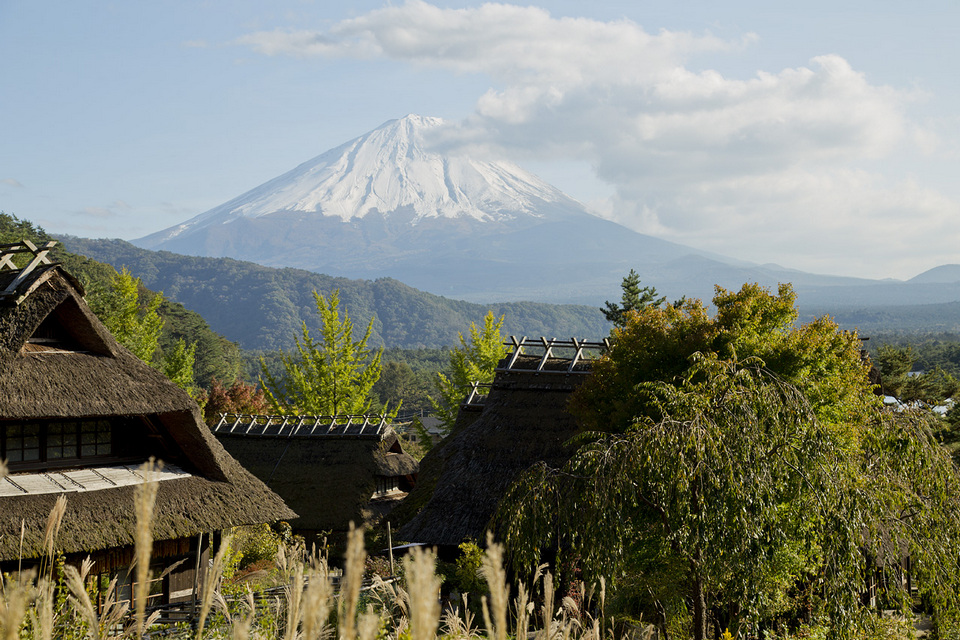
It takes about 45 minutes to travel from Kawaguchiko to Iyashi no Sato village, the way passes through both Lake Kawaguchi and Lake Saiko. The roadside scenery is beautiful and if you have time, you should stop on the road to enjoy it.
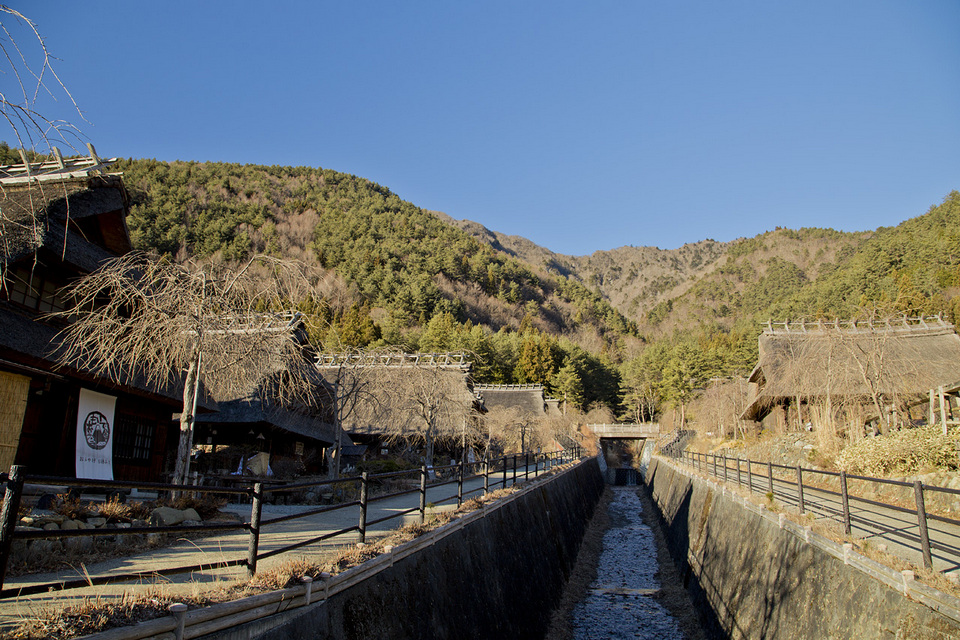
Iyashi no Sato Village originated as an old village located in the west of Saiko Lake. It was destroyed by a landslide and many years later, houses with traditional thatched roofs were rebuilt. They rebuilt it and make it become an outdoor museum and traditional craft village with local handicraft products.
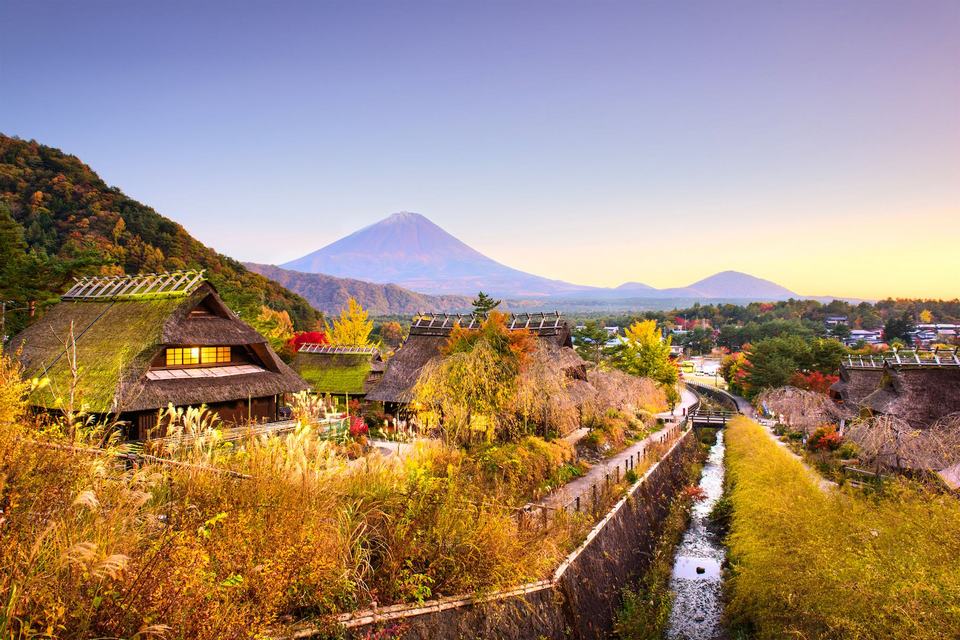
Admission is 350 JPY ($3.22), it will take about 1 hour to visit the village. From here view Mount Fuji is also very beautiful, very suitable for those who like to take pictures.
Address: 2710 Saikonemba, Fujikawaguchiko-machi, Minamitsuru-gun 401-0332, Yamanashi Prefecture Hours: 9AM–5PM Phone: +81 555-20-4677
Return to Lake Kawaguchi
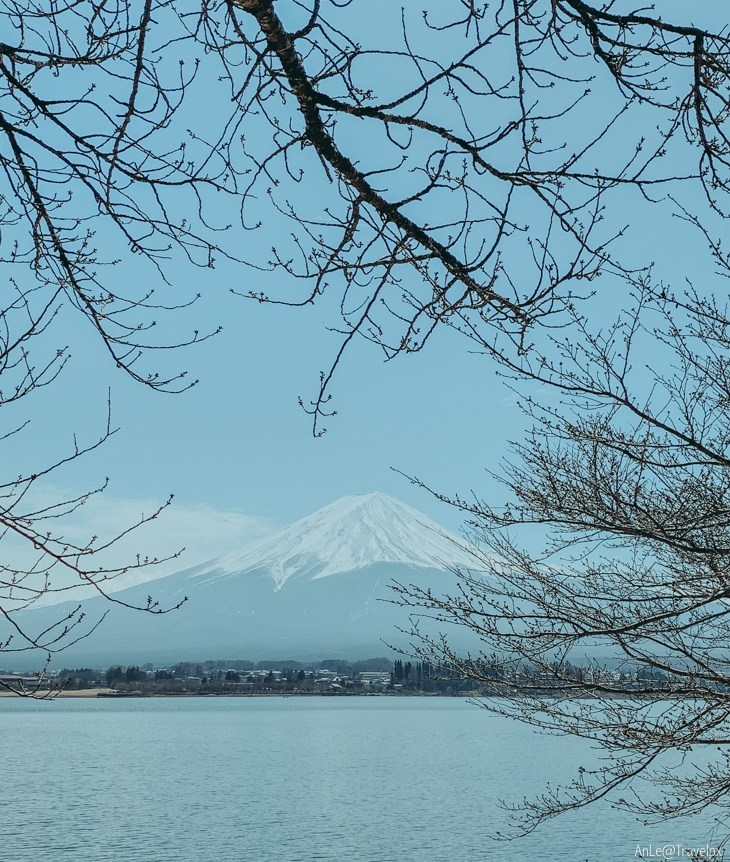
Actually, the first day I went around Lake Kawaguchi but it was still not very satisfying, because that day was murky. On the 2nd day, the sun was beautiful, and I decided to go back to Lake Kawaguchi to take photos. The lake surface is also greener and clear clouds to see the best of Mount Fuji.
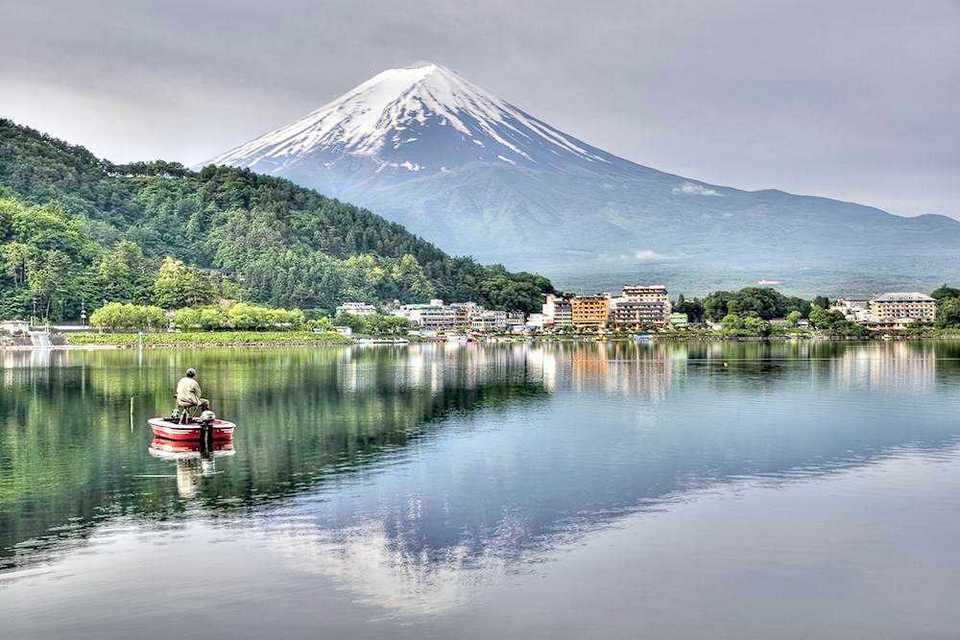
You can stop at the opposite point of Mt. Fuji, about 2 km from Oishi park. It often has early blooming cherry blossoms, along with a small gravel-lined street for walking, very beautiful.
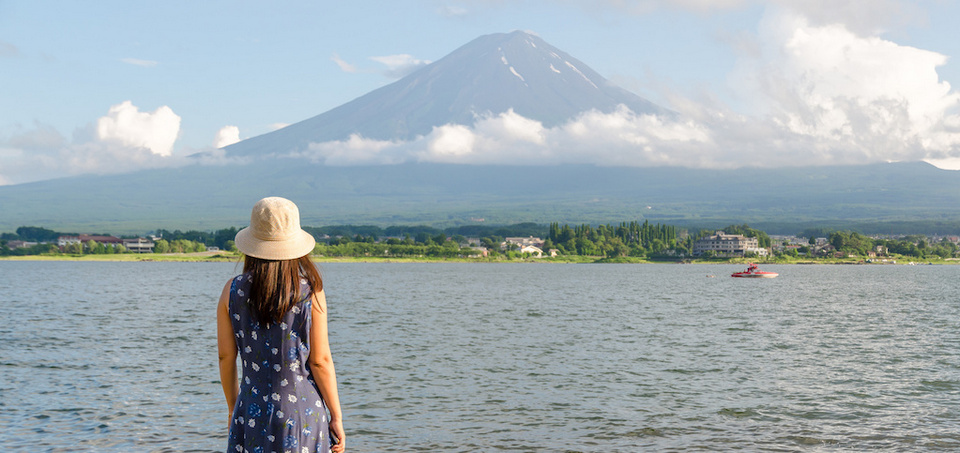
In addition to the attractions in the Lake Kawaguchiko itinerary for 2 days above, if you have more time, you can visit some other attractions like Itchiku Kubota Art Museum . Or spend half a day or full day for playing at Fuji-Q Highland amusement park .

Usually, people will combine to visit both Kawaguchiko and Hakone, which is famous for its onsen bathing resorts. We had a very detailed guide about Hakone here: Hakone travel blog — The Hakone travel guide & how to spend 2 days in Hakone for the first-timers.
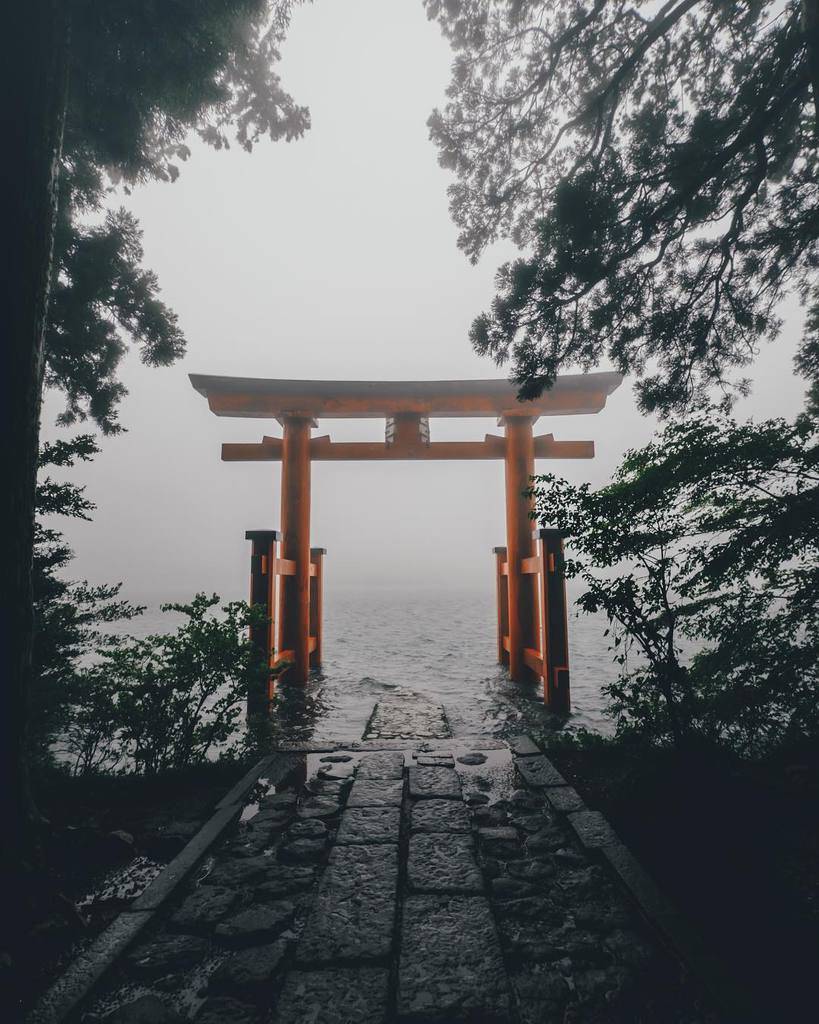
Some best day tours, trips, activities and transfer services, tickets in, from and to Lake Kawaguchi you can refer to
- Mt. Fuji and Lake Kawaguchi Scenic Spots Day Tour from Tokyo
- Mt Fuji Day Tour from Tokyo
- [Klook Exclusive] Mt. Fuji, Lake Kawaguchi, and Seasonal Fruits Day Trip
- Lake Kawaguchi, Arakura Mountain Sengen Park, and Yamanakako Onsen Experience Full Day Trip from Tokyo
- Mt. Fuji, Hakone, Lake Yamanaka, and Lake Kawaguchi Tour from Tokyo (with a Chinese-speaking Guide)
- Mt. Fuji, Oshino Hakkai and Lake Kawaguchi Day Tour with Matcha Experience from Tokyo
- Tokyo Subway Ticket (24, 48, or 72 Hours)
- Tokyo Skyliner and Tokyo Subway Ticket
- Shuttle Bus Transfers (One Way/Round Trip) from Shinjuku/Ikebukuro to Tokyo Disneyland or Tokyo DisneySea
- Sky Hop-on and Hop-off Bus Pass
- 4G Prepaid Sim Card (JP Airports Pick Up) for Japan
- 4G WiFi (Japan Pick Up) for Japan
- JR Pass for Whole Japan (7, 14, or 21 Days)
Are you looking for more top things to do around Mount Fuji: Tours, activities, attractions and other things? Read more: Mount Fuji places to visit — Top 10 most beautiful places to visit near MT Fuji . And Mount Fuji day trip blog — How to spend one perfect day itinerary in Mt Fuji ?
Related articles

RELATED ARTICLES MORE FROM AUTHOR
Krabi itinerary 4 days — what to do in krabi for 4 days, bangkok to krabi — how to get to krabi from bangkok, krabi travel blog: the ultimate krabi travel guide & suggested krabi itinerary 4 days perfectly.
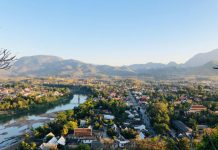
Luang Prabang travel blog. The latest guide to Luang Prabang
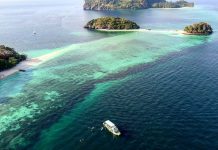
Bangkok Krabi itinerary 8 days. How to spend 8 days in Thailand to visit Krabi and Bangkok?
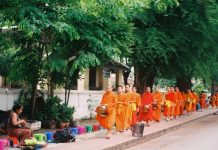
What to do in Luang Prabang? 9+ best things to do in Luang Prabang
Where to eat in luang prabang — top 5 most famous & best restaurants in luang prabang.
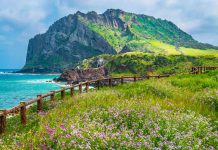
Jeju blog: The latest complete Jeju island travel guide
Editor picks.

What to eat in Laos? — 15+ famous, most popular &...

Krabi itinerary 4 days — What to do in Krabi for...

POPULAR POSTS

What to buy in USA? — 17+ must buy in USA...

What to buy in Korea? — Top +23 cheap, famous &...

Must buy souvenir in Taiwan — Top 17+ most famous, cheap...
Popular category.
- Inspiration + Guide 1468
- Trip Inspiration 468
- Food + Drink 215
- Thailand 210
- Coasts + Islands 194
- Vietnam 171
- South Korea 169
- Travel Photos 144
- Work for Us
- Terms & Conditions
- Privacy Policy

IMAGES
VIDEO
COMMENTS
Lake Kawaguchiko (河口湖) is the most easily accessible of the Fuji Five Lakes with train and direct bus connections to Tokyo. A hot spring resort town with various tourist attractions and views of Mount Fuji is located around the lake's eastern end, while the northern and western shores are mostly undeveloped. The best views of Mount Fuji ...
If you are planning to travel to these areas, maybe these articles can help you find some unique experiences. ! More Mt. Fuji and Hakone travel information. Mount Fuji area. Mount Fuji hot spring hotel recommendation: Hotel Room with Hot Spring, Private Bath and Exclusive View on Mount Fuji! Bus Route Guide to Mount Fuji Kawaguchiko Station!
A nice art museum where you can enjoy an excellent collection of Mt Fuji paintings by famous Japanese artists. Where is it: Just outside the entrance to Fuji-Q Highland amusement park, close to Kawaguchiko Station. Opening hours: 09:00 (9 am) - 17:00 (5 pm), until 20:30 (8:30 pm) on Saturdays and Sundays. Ticket price:
Learn how to visit Kawaguchiko, the second-largest lake of the Fuji Five Lakes, and enjoy the stunning views of Mt. Fuji. Find out the best ways to get there, get around, and what to see and do in this comprehensive guide.
The Ultimate Lake Kawaguchi Guide (2024) 05/12/2024 by Kristin Addis 4 Comments. The world-famous volcano rises up like a giant over the island, the iconic slope wearing a hat of snow. Visible from the north end of Lake Kawaguchi, I know I've picked the perfect place to watch Mt. Fuji from. My days are spent relaxing, eating amazing food, and ...
The small town of Kawaguchiko is the main home base for travelers looking to summit the majestic Mount Fuji, but there's much more to do than just visit Japan's tallest peak. Kawaguchiko centers around the lake of the same name, with plenty of hiking and biking trails, and beautiful places to visit. My time here felt like one of those ...
Lake Kawaguchiko. By far the most visited of the Fuji Five Lakes, Lake Kawaguchiko serves as the main point of entry to this famous lake region. It is the second largest of the Five Lakes in terms of surface area and the second most shallow with a depth of only 14.6 meters. It has a surface elevation of approximately 830 meters, which accounts ...
Embarking on a Mount Fuji day trip offers the chance to enjoy Japan's tallest and most revered mountain up close. Mt. Fuji's magnificence draws numerous visitors from across the globe, making it a significant destination. The popularity of Mt. Fuji and its surrounding area of Lake Kawaguchiko continues to soar, with a steady rise in tourist numbers, reaching a staggering 4.5 million visitors ...
The area comprises five lakes: Lake Kawaguchiko, Saiko, Yamanakako, Shojiko, and Motosuko. These lakes all offer stunning views of Mount Fuji. Most visitors to the area stay in Kawaguchiko, as it is the most developed and accessible for tourists. Lake Yamanakako is the largest of the five Fuji lakes and has a small number of accommodation lodgings.
Bus. To avoid the inevitable line at Kawaguchiko Station, you could catch a highway bus from stations across Tokyo, including Shinjuku, Shibuya, and Tokyo. Tickets start around US$13.21 *. and the ride takes about two hours, stopping at Fuji Q Highland on the way. You can book the return trip here.
By bus-- terminus of the Keio Line from Shinjuku west or Tokyo station (price: ¥1,800 / ~US$11.75 one way - duration: 1h45 to 2 hours), leaving every half hour.Discount for the purchase of 4 tickets (for example 2 round trips): ¥1,540 / ~US$10.05 each. By train-- terminus of the Fujikyu line:. In less than 2 hours with the FUJI EXCURSION Line, from Shinjuku to Kawaguchiko (section Shinjuku ...
SIGHTSEEING BOAT TOUR ON KAWAGUCHIKO LAKE. Last but not least on this list of things to do in Kawaguchiko is a sightseeing boat tour on the lake. It's a short 20-minute boat ride that departs from the shores of Lake Kawaguchi and will take you across the lake for breathtaking views of Mount Fuji and the surrounding landscapes.
13. Take Beautiful Photos of Mt. Fuji. Capturing the grandeur of Mt. Fuji is an experience that many travelers to Kawaguchiko yearn for, and it's easy to see why. As Japan's highest peak and an iconic symbol of the country, Mt. Fuji presents a majestic sight that inspires anyone who catches a glimpse of it.
One of the most economical ways to travel to and from the Mt Fuji area is by highway bus from Shinjuku Station to Kawaguchiko Station. A single journey is JPY1750 and takes approximately 1 hour 45 minutes from the Shinjuku Bus Terminal. Return or one-way tickets can be booked online on the Highway Buses Japan site.
Kawaguchiko Lake in autumn Perfect place for resting and meditation. Kawaguchiko travel guide: How to get to Lake Kawaguchiko from Tokyo? Fuji Mount seen from the downtown of Tokyo. Usually those who plan to go to Kawaguchiko often depart from Tokyo, because of convenient transportation and Tokyo is the largest city near Kawaguchiko.
The Itchiku Kubota Art Museum was awarded three stars in the 2009 Michelin Travel Guide. Artworks and kimonos designed by Itchiku Kubota, a textile-dyeing artist, are exhibited inside splendid Japanese architecture. ... then transfer to the Fujikyuko Line to get to Kawaguchiko Station. Total travel time is about three hours from Tokyo Station ...
If you're looking to travel to Kawaguchiko from Tokyo, the most convenient option is taking a bus. It typically takes around 2 hours and costs between 2,000 to 2,500 yen. ... Simply meet up with your guide at Shinjuku Station, get on a bus, and enjoy a comfortable ride to the Mt. Fuji area. You can explore various places to see the stunning ...
Lake Kawaguchiko Travel Guide Source: Shutterstock. The landmark of Japan Mount Fuji attracts hundreds of thousands of visitors each year to come to Yamanashi. Fuji Five Lake is the region best known for viewing Mount Fuji from a fairly close distance. Among all the five lakes (Lake Kawaguchi, Lake Yamanaka, , Lake Saiko, Lake Motosu, Lake ...
Lake Kawaguchi is in southeastern Yamanashi near the border with Shizuoka. You can take a train or a highway bus from Tokyo. Take a train from JR Shinjuku Station to JR Otsuki Station on the JR Chuo Line (about an hour). Change to the Fuji Kyuko Line for Kawaguchiko Station (JR Rail Pass not accepted). You can also get to Kawaguchiko Station by ...
6. Enjoy a boat tour at Lake Kawaguchi. 7. Visit Kawaguchi Asama Shrine (Tenku no torii), for one of the most scenic view of Mt. Fuji. 8. Visit the traditional and charming village of Iyashi no Sato, one of the best things to see near Lake Kawaguchi. 9.
Colorful in Autumn | lake kawaguchiko travel blog Lake Saiko | lake kawaguchiko travel blog | lake kawaguchiko travel blog Cherry blossoms. Admission is 350 JPY ($3.22), it will take about 1 hour to visit the village. From here view Mount Fuji is also very beautiful, very suitable for those who like to take pictures.